|
| Book of condolence |
|
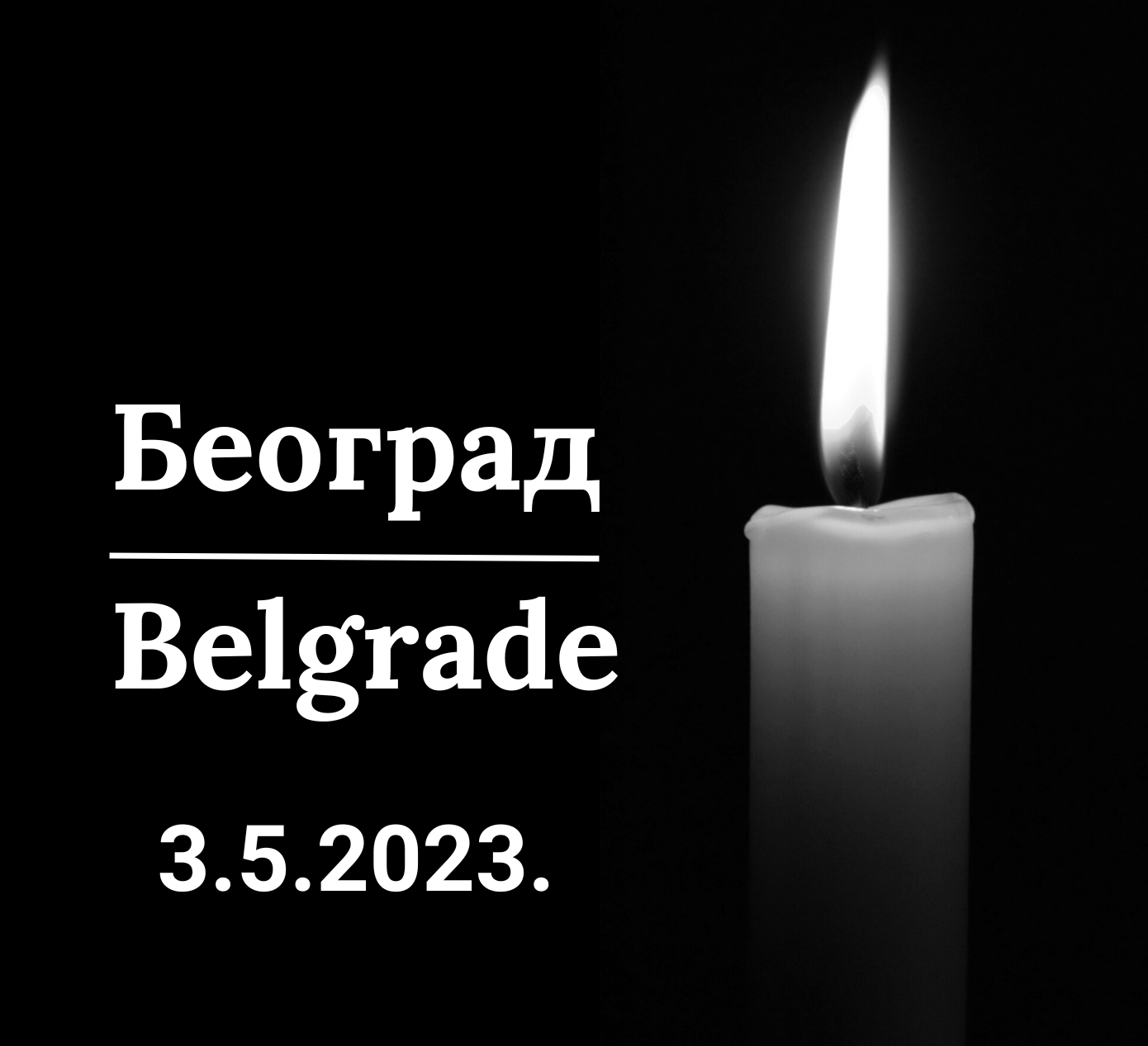
Following the tragic loss of lives at the “Vladislav Ribnikar” Elementary School shooting in Belgrade on 3 May 2023, the Government of Serbia has declared three days of national mourning, from 5 May to 7 May 2023. The Permanent Mission of the Republic of Serbia to the Council of Europe is grateful for all the messages of support we have received. A book of condolence will open in the room “Berlin” (1st floor) at the Council of Europe, Friday, 5 May 2023 at 9:00 – 13:00 and 15:00 – 17:00 hours.
|
|
|
| SERBIA BECOMES FIRST COUNTRY TO RATIFY THE SECOND ADDITIONAL PROTOCOL TO THE CONVENTION ON CYBERCRIME ON ENHANCED CO-OPERATION AND DISCLOSURE OF ELECTRONIC EVIDENCE |
|
COUNCIL OF EUROPE, STRASBOURG, FRANCE, 9 February 2023 - The Permanent Representative of the Republic of Serbia to the Council of Europe, H.E. Ambassador Aleksandra Đurović, handed over to Mr. Bjørn Berge, the Council of Europe’s Deputy Secretary General, the Instrument of ratification of the Second Additional Protocol to the Convention on Cybercrime on enhanced co-operation and disclosure of electronic evidence.
Among 34 states that signed the Second Additional Protocol so far, the Republic of Serbia becomes first country to ratify it.
The Second Protocol aims to create common norms, at the international level, to strengthen cooperation in fighting cybercrime and in collecting electronic evidence in connection with criminal investigations or proceedings.
The Protocol provides tools for enhanced co-operation and disclosure of electronic evidence, that are subject to a system of human rights and rule of law, including data protection safeguards.
The Second Additional Protocol to the Convention on Cybercrime on enhanced co-operation and disclosure of electronic evidence was adopted by the Committee of Ministers of the Council of Europe at its 1417bis meeting (17 November 2021) of the Ministers’ Deputies and was opened for signature in Strasbourg on 12 May 2022.
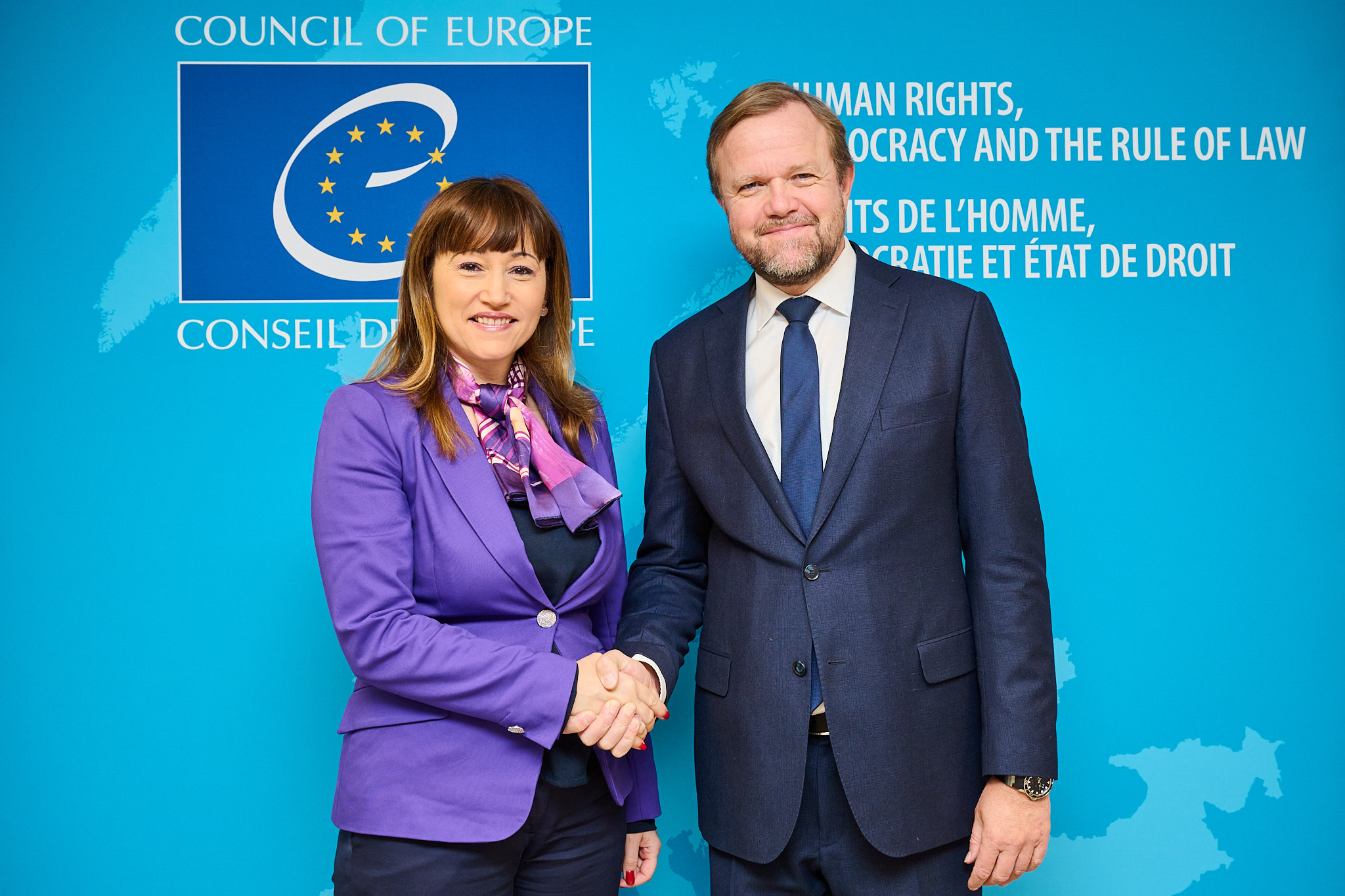
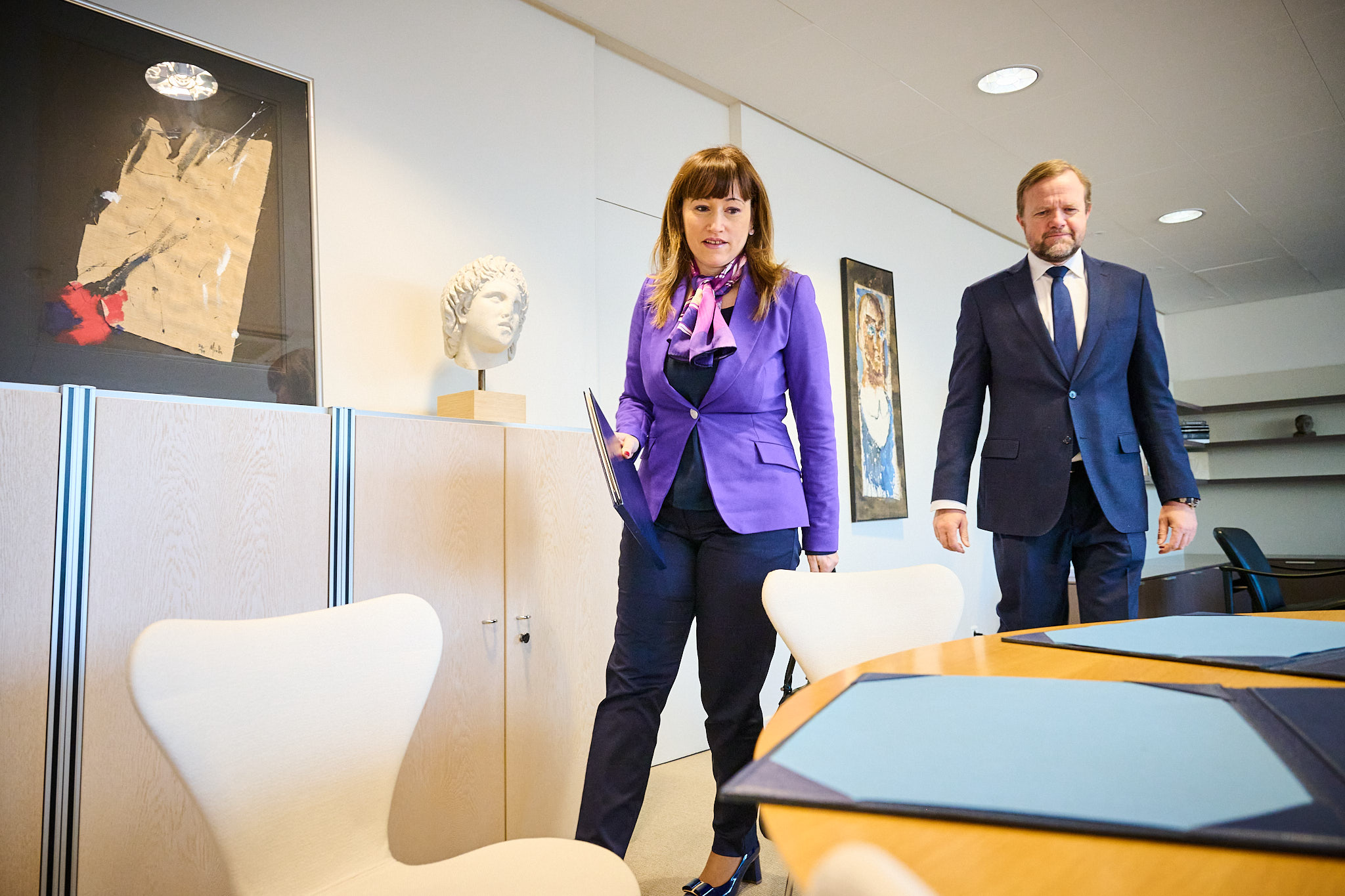
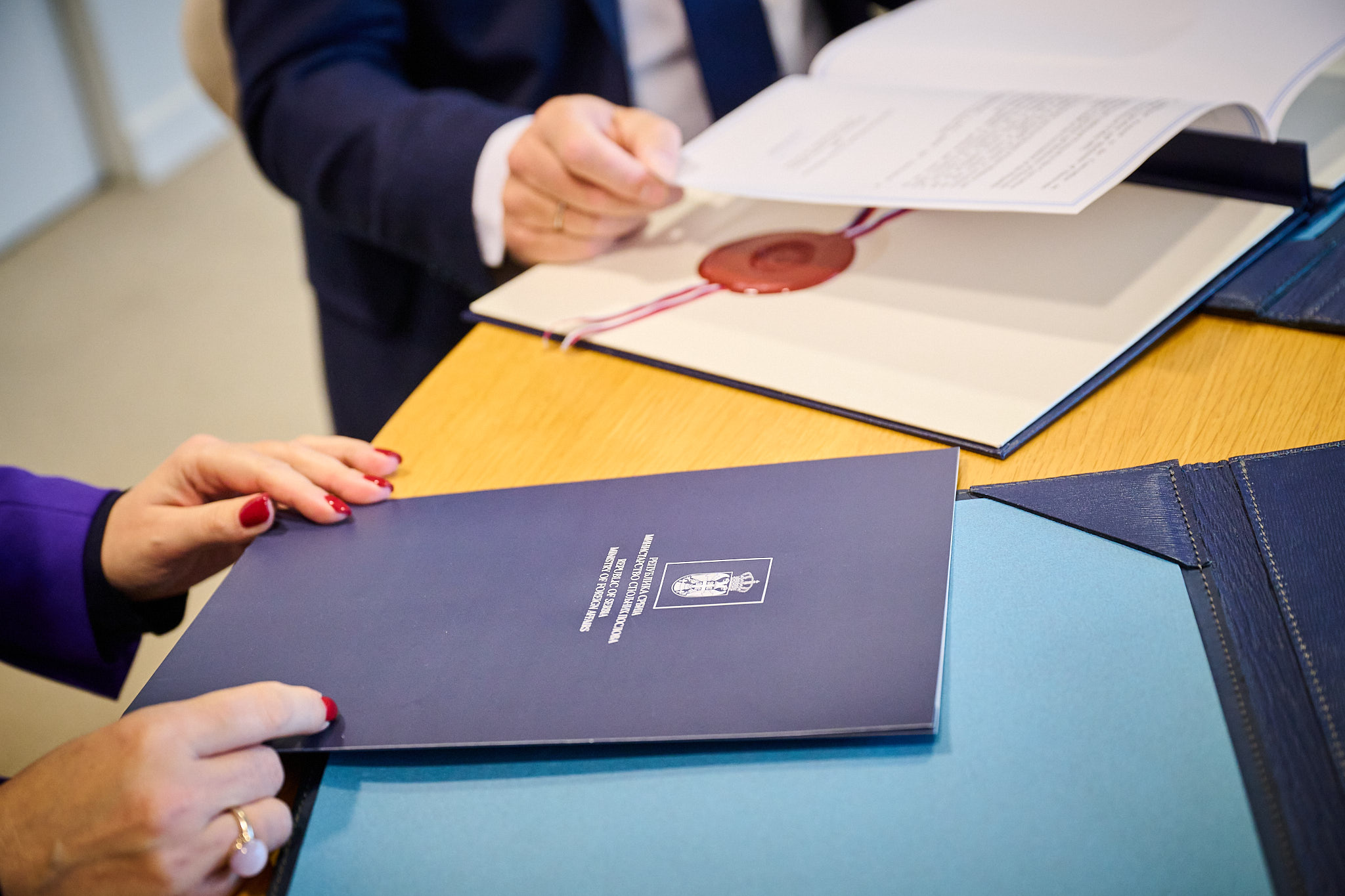
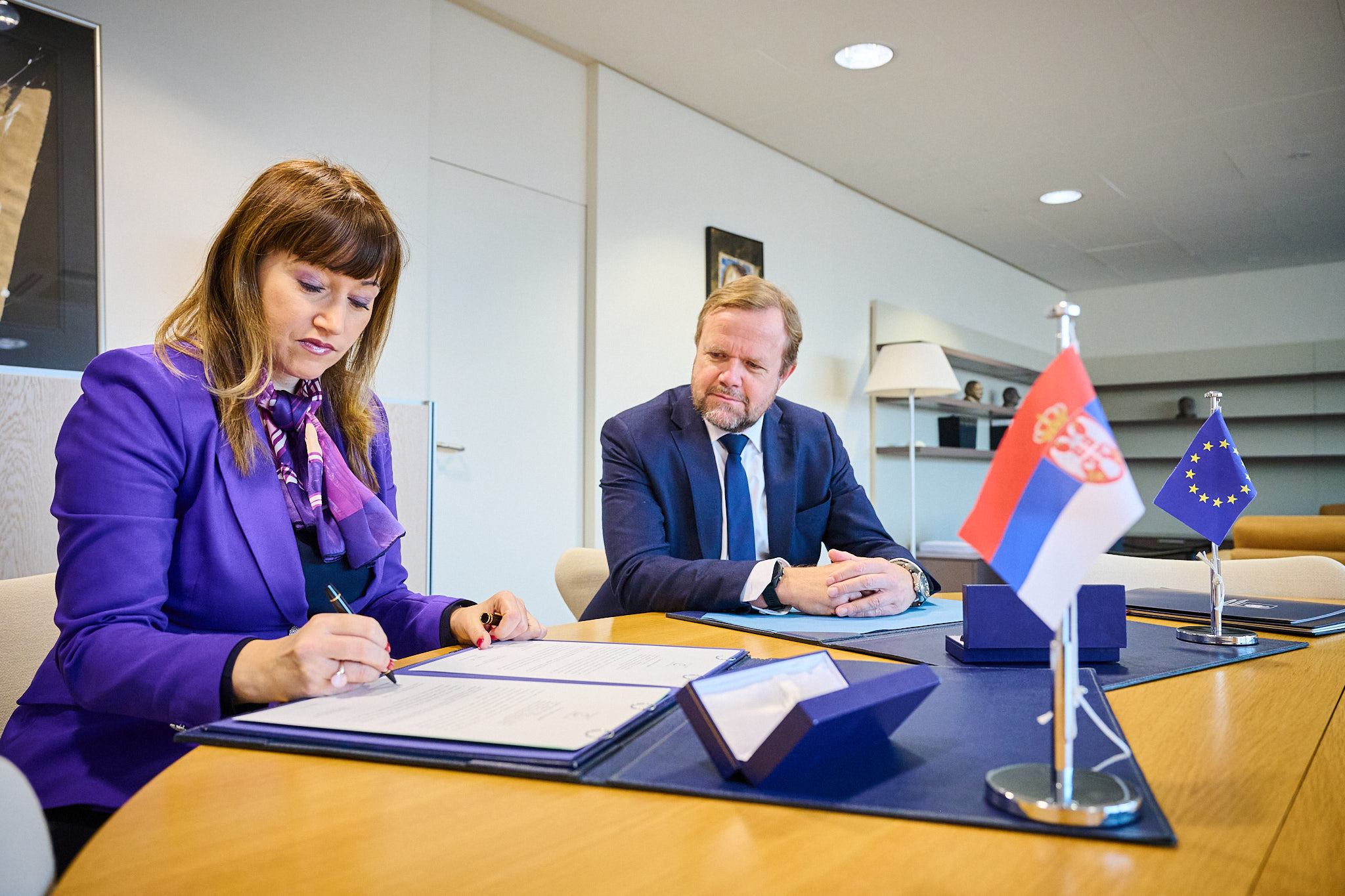 |
|
|
| 18. Oct 2022. - Statement by Minister of Foreign Affairs of the Republic of Serbia Nikola Selaković at the meeting of the UN Security Council on the report on the work of UNMIK |
|
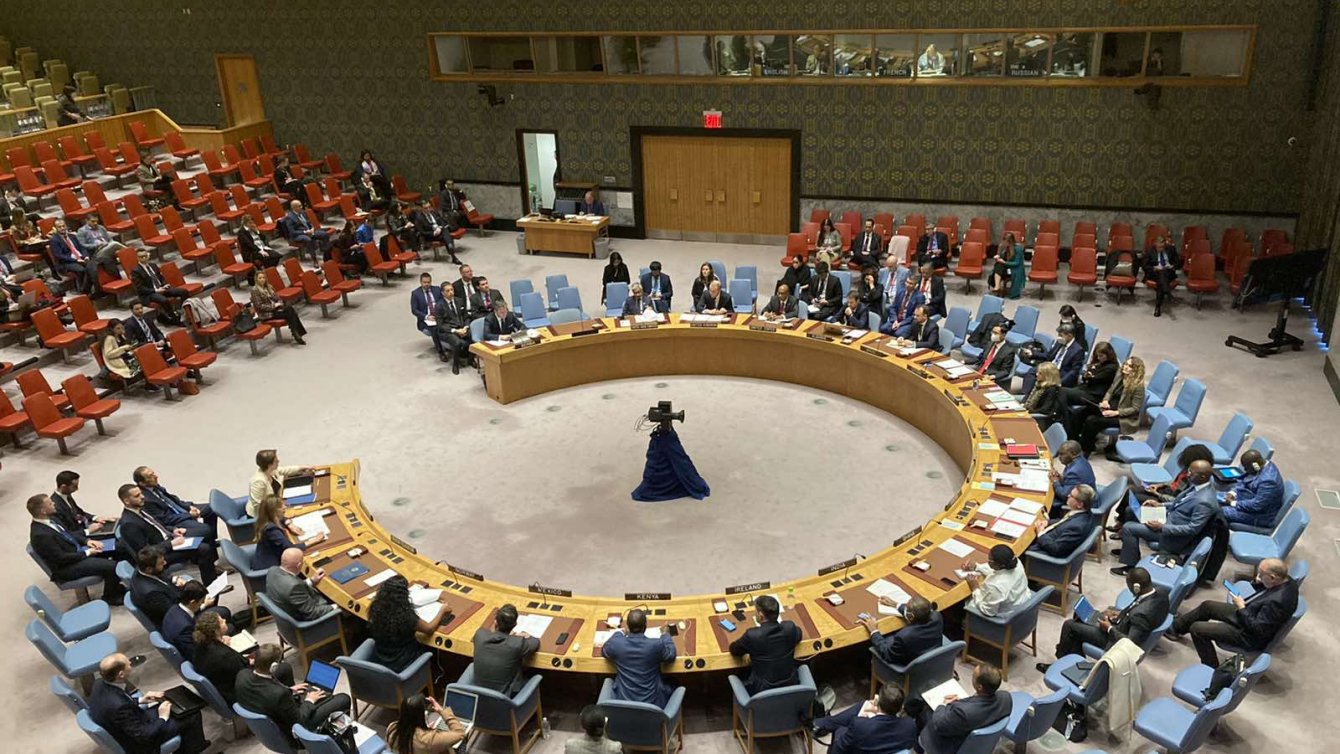
Mr. President,
Madam Special Representative,
Ladies and gentleman,
It gives me honor to address this distinguished body once again and to discuss the latest report of the Secretary-General on the work of the UNMIK.
I would like to thank the Secretary-General and the Special Representative for submitting the report. We take note of the efforts that Ms. Ziadeh makes in performing this very responsible duty, especially bearing in mind the necessity of a comprehensive overview and the complexity of the situation on the ground.
I also take this opportunity to underline that the Republic of Serbia highly values the activities of UNMIK in Kosovo and Metohija, established under UN Security Council Resolution 1244. We advocate for its continued operation in an unchanged and undiminished scope and capacity, especially bearing in mind that the Mission has not yet achieved the main goal of its mandate - a peaceful and normal life for all citizens of our southern province.
Ladies and gentlemen,
Unfortunately, the last few months have not brought more stability in Kosovo and Metohija and the situation in the Province is not exactly as presented in the report. Unilateral moves of Pristina continue to consciously and systematically deepen ethnic differences, causing discrimination against the non-Albanian population. To our knowledge, 105 ethnically motivated attacks have been recorded since the beginning of this year. In addition, Pristina is actively working on administrative and bureaucratic obstacles, by taking measures that were not agreed upon in the dialogue as the basic mechanism for negotiations and reaching solutions between Belgrade and Pristina. Pristina’s approach is problematic in many ways. This irresponsible conduct of Pristina is consciously sabotaging the efforts not only of Belgrade, but also of the EU and other involved parties of the international community, with the clear intention of achieving two goals - the first being to avoid the implementation of assumed commitments. The second, the ultimate and far more alarming goal is the intimidation, marginalization and persecution of Serbs.
In all previous statements before this this distinguished body, Pristina focused on what happened in the past while failing to mention, which is painful to witness, how non-Albanians in Kosovo and Metohija live today. Serbs are still intimidated in different ways, forced to leave their homes, villages and cities. Those displaced are discouraged from returning to where they were born and lived their lives. The provisional institutions work systematically to remove and erase as much as possible of the cultural and national diversity that is left. At the same time, Pristina is consciously fueling inter-ethnic tensions using all available methods.
Attending religious celebrations seems to be a crime in Kosovo and Methohija. It is the case of Nikola Nedeljković who was arrested for allegedly "inciting ethnic hatred and intolerance", but actually his imprisonment was for attending the St. Vitus Day (Vidovdan) celebration.
Nikola was sentenced to eight months in prison without any material evidence. On the other hand, let me remind you that even to this day there is not a single perpetrator held legally accountable for the more than 1,000 Serbs killed since 1999. Due to planned intimidation, almost all towns and villages in Kosovo and Metohija are ethnically cleansed. Representatives of Pristina are ignoring the suffering, insulting the open wounds of the Serbs who had to leave their ancestral homes, and I underline, there are more than 200,000 of them. Such conduct has not change for last 23 years and is in complete opposite to the democratic values and principles that the provisional institutions of self-government often promote in their statements.
Therefore, I consider it necessary to emphasize that the true political will of the involved international actors and Pristina is necessary in order to create the conditions for the beginning of the end of discrimination on a national basis and common life in the Province. Esteemed members of the Security Council, I would like to draw your attention to the rigid, problematic and extremely irresponsible conduct of the other negotiating party within the dialogue. In achieving the above-mentioned goals, Pristina applies the so-called policy of reciprocity, a well-thought-out, malicious strategy that, unfortunately, was not constructed independently. By continuously insisting on mutual recognition as a central part of the dialogue, the so-called policy of reciprocity demonstrates the essential unwillingness of the current political leadership of Pristina to find any compromise solution. Let me remind you that the talks between Belgrade and Pristina did not start with last elections in Pristina, but have been in progress for 11 years since the technical dialogue started (8 March 2011). Therefore, we assess as inadmissible attempts to disregard the current format of the dialogue, and annul the agreements only because they are not to the liking of the current political factors. It is unacceptable that the current geopolitical circumstances are being used to simply erase what has been painstakingly worked on for years. Belgrade, I underline, was institutionally involved in the dialogue from the very beginning, while the commitment of the other side has varied and continues to vary depending on the political option that is in power.
The harsher political rhetoric and narrative of the current leadership of the provisional institutions of self-government in Pristina are accompanied by concrete destabilizing steps. In the reporting period, measures on license plates were imposed, disguised as attempts at alleged integration into society. Let me remind you again, there was no agreement on such measures in the dialogue between Belgrade and Pristina.
I believe, ladies and gentlemen, that even today we will hear from the representative of Pristina that their side has fulfilled all obligations, but the decision on re-registration of license plates shows that Pristina is not only failing to fulfill what has been agreed upon, but it nullifies the results of the dialogue, creating a new crisis all over again. The effect of such forcibly imposed measures is best illustrated by the fact that since the decision was made a single-digit number of re-registered vehicles with Serbian license plates has been recorded, of which only two are Serbs from the north of Kosovo and Metohija. This is another indicator that Pristina does not enjoy full support, but that, on the other hand, it continuously provokes the natural reaction of the Serbian population, which cannot endlessly be subject to the arbitrariness of temporary institutions. I believe that even today we will hear already known narrative of representatives from Pristina who try to present every reaction of the Serbs in Kosovo and Metohija as an activity organized by Belgrade in alleged attempts at destabilization. Such claims are simply not true. Serbia, for its part, cannot in any way contain the revolt present among the non-Albanian population of Kosovo and Metohija. It is an undeniable fact that citizens' protests represent a voice against many years of institutional violence and the deprivation of rights of the non-Albanian population, which, in this case, is denied the right to peaceful enjoyment of private property acquired in a legal manner. Pristina does not cease in its attempts to confiscate property, and, as is well-known, one of the targets is the Serbian Orthodox Church. By calling into question the return of property to the Dečani Monaster Pristina paradoxically does not execute the decisions of its own so-called Constitutional Court.
Ladies and gentlemen,
I thought for a long time how to best illustrate the true picture of everyday life of the non-Albanian population in Kosovo and Metohija. I will mention only some of the facts. Numerous ethnically motivated incidents, hate speech, intimidation, violations of the right to a fair trial, threats to the right to freedom of movement and religious rights, desecration of churches and graves were recorded in the last reporting period as well. The frequent attacks on the sites of the Serbian Orthodox Church are also unacceptable, and especially the humiliating attitude towards the Serbian cultural and spiritual heritage, including the 4 monuments that have been inscribed on the UNESCO World Heritage List. Numerous administrative and technical barriers are imposed on priests and monastic communities, making it difficult and even impossible for them to survive on church properties.
When it comes to civil rights, try to imagine that the basic political and civil right to vote has been taken away from you.
This is precisely what the Serbs in the Province have experienced along with frequent intimidation and violent incursions of the ROSU special forces, which are an instrument for the implementation of Pristina's goals under the pretext of allegedly fighting crime.
In December last year Bratislav Nikolić the president of municipality of Štrpce has been detained, as suspected of the organized crime and corruption - still not charged, kept in detention unit in Podujevo, only for the reason to make additional and final pressure on the Serbian community living in the enclave of Štrpce. How can this be justified as the fight against crime when special forces are used to raid village festivals, schools and kidnap drivers of ambulance transporting infusion containers and medicines? What are the motives behind and how can one rationalize these actions? Just try to imagine and put yourself in the shoes of Ms. Dragica Gašić, the only Serbian returnee in Djakovica. Imagine that you are still not allowed to buy bread because of your origin and nationality, because you live in a municipality that the local Albanians proudly consider forbidden to non-Albanians. Imagine that as many as eleven Albanian civil society organizations demand your expulsion, as well as a ban on any non-Albanian ever returning to that town. Then you will realize the level of intimidation that Serb returnees are facing. It will be clear to you why the percentage of returnees is below 2% and why it is still one of the lowest in the world. Let me pose a question - are these the characteristics of a society that presents itself to the world as a fully fledged democracy and a factor of stability in the region?
We are aware that the dialogue has a wider dimension and that it can affect the situation in the entire region.
This is reflected in every statement given by Serbian officials, including the President of the Republic of Serbia, Aleksandar Vučić. "It is better to negotiate for a hundred years than to fight for a day" are the words of our President that best describe the policy of peace, reconciliation, and regional cooperation pursued by the Serbian leadership, which is guided by the vision of building a common and prosperous future of the Balkans.
I believe that it is a duty of today's leaders to create a clear common vision for the future generations. Such a vision was shown by the leaders of Belgrade, Skoplje and Tirana by creating Open Balkan, an initiative from the region for the region, which is already producing concrete results. Serbia has on several occasions reached out to Pristina inviting it to join this initiative. We counted on an awareness of the importance of economic connectivity and progress for the benefit of the citizens of the entire Balkans. However, our invitation was not met with understating from the other side.
Ladies and gentlemen,
We categorically reject Pristina's argumentation regarding the alleged unconstitutionality of the formation of the Community of Serb Municipalities. It is clear that Pristina's attitude towards this obligation reflects its attitude towards the Serbian people in the Province. It also indicates that Pristina is against Serbian people being organized as an ethnic community and thus exercising their collective rights. The aim of their approach, as a preferred model, is a community without Serbs, such as those in Pristina, Djakovica or Pec, or some similar localities in the Province. For our side, it is unacceptable that Pristina has refused to fulfil its obligations and discuss the formation of the Community of Serb Municipalities for as much as 3,470 days but I assure you that, regardless of this fact, Serbia will not give up on its efforts to find a compromise solution for the current situation.
I will remind you that the representatives of Pristina, although they often repeat in their statements that the case of the so-called Kosovo is a fait accompli, continue not to be recognized by the majority of UN member states for 14 years now. If the so-called Kosovo's independence is a reality, how come that we have the dialogue? And how come that Belgrade is faced with increasing pressures as regards the need for mutual recognition? What the current political leadership of Pristina refuses to accept is that Belgrade cannot be left out in the search for a final solution. The same also applies to the case of the increasingly frequent indications about Pristina's upcoming membership in international organizations. Will these moves help to create the necessary atmosphere for dialogue? Are we, in this way, rewarding Pristina's destructive behaviour and refusal of dialogue? Our view is that the attempts of the so-called Kosovo to join international organizations are an unacceptable act and Serbia will work decisively against such steps.
During the last session in April this year, we could hear the calls of some members of the UN Security Council to reduce and even terminate UNMIK, with the explanation that Pristina has its own functional institutions. However, the circumstances I have presented to you and the situation on the ground remind us again that international presence in our southern province is still necessary. In this regard, we support the efforts made by UNMIK, KFOR, EULEX and OMIK within their mandates. The Serbian and other non-Albanian population in Kosovo and Metohija has the highest confidence in the international presence and considers it a guarantor of security, which additionally confirms that international missions need to remain engaged in an undiminished scope and capacity in accordance with UN Security Council Resolution 1244.
In conclusion,
I would like to point out that lately in all international forums we keep hearing calls for respect of the principles of the UN. We support the territorial integrity of all UN member states. But, what about Serbia? I would like to ask the esteemed members of this distinguished body whether the need to implement the principles of the UN Charter applies only to some or all of its members? As a country that consistently respects international law and still suffers the consequences of it being violated, we believe that the UN Charter and international law, including the territorial integrity and sovereignty of states, should be respected by all and apply indiscriminately to all UN member states.
Ladies and gentleman,
It was this body that more than two decades ago adopted Resolution 1244, which confirmed the territorial integrity of Serbia. This fact did not prevent certain countries from recognizing the so-called “Kosovo” and thus violating the UN principles, but also the resolution that they adopted, by adjusting international law to their interests and goals. Precisely because of this, the more and more frequent mentioning of the case of "Kosovo" is an indication that the precedent made opened a Pandora's box, because the strength of each principle rests on its full and universal application and unconditional adherence.
You will notice that I posed a lot of questions in my statement and I express hope that today we will hear answers to at least some of them from you, esteemed members of the UN Security Council and representatives of Pristina, because the inhabitants of Kosovo and Metohija, of any nationality, whether they are Serbs or Albanians deserve it.
All the inhabitants of Kosovo and Metohija have every right to expect an improvement in the atmosphere and the reduction of tensions on the ethnic level, which are a prerequisite for a normal life. For such a step to be made, we need constructiveness, which is not lacking on the Serbian side, genuine support of international actors. I emphasize that Serbia has always been and remains deeply committed to finding a sustainable solution by peaceful means, for the sake of peace, stability and a common future.
Thank you. |
|
|
| 18.10.2022 - Solo exibition "Senses", artist Natalija Miladinovic |
|
.png) |
|
|
| 10.10.2022 - Đurović: la Serbie a avancé au Conseil de l'Europe des arguments de respect du droit international |
|
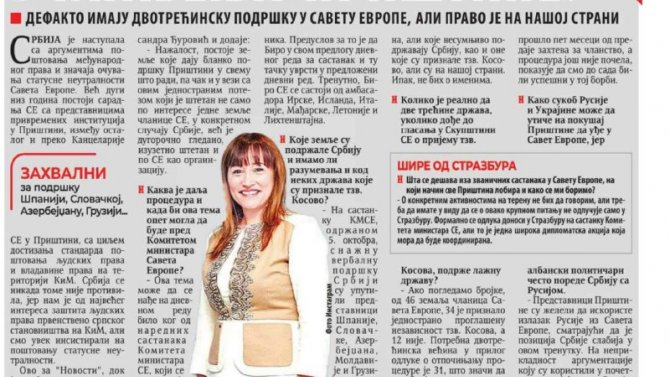
L'ambassadrice de la République de Serbie auprès du Conseil de l'Europe Aleksandra Đurović a déclaré que le Kosovo dispose de facto d'une majorité des deux tiers au Conseil de l'Europe, mais que le droit est du côté de la Serbie, rapporte «Novosti».
-La Serbie a avancé des arguments de respect du droit international et de l'intérêt de préserver la neutralité de statut du Conseil de l'Europe. Depuis de nombreuses années, il existe une coopération entre le Conseil de l’Europe et les représentants des institutions intérimaires de Priština, entre autres par l'intermédiaire du Bureau du Conseil de l'Europe de Priština, dans le but d'atteindre des normes de respect des droits de l'homme et de l'Etat de droit sur le territoire du Kosovo-Metohija. La Serbie ne s'y est jamais opposée, car notre plus grand intérêt est la protection des droits de l'homme, principalement de la population serbe au Kosovo-Metohija, mais nous avons toujours insisté sur le respect de la neutralité de statut, a dit Đurović dans une interview avec «Novosti».
Elle a ajouté que malheureusement, il y a des pays qui apportent un soutien vierge à Priština dans tout ce qu'elle fait.
-Et même concernant cet agissement unilatéral, nocif non seulement aux intérêts d'un pays membre du Conseil de l’Europe, en l’occurrence la Serbie, mais à long terme, extrêmement nocif au Conseil de l’Europe en tant qu'organisation, dit Đurović.
Quelle est la suite de la procédure et quand ce sujet pourrait-il être à nouveau devant le Comité des Ministres du Conseil de l'Europe?
Ce sujet peut être à l'ordre du jour de n'importe laquelle des prochaines réunions du Comité des Ministres du Conseil de l'Europe, qui se tiennent presque tous les mercredis à Strasbourg, au niveau des représentants permanents. La condition préalable est que le Bureau inscrive ce point à l'ordre du jour proposé pour la réunion. Actuellement, le Bureau du CE est composé d'ambassadeurs d'Irlande, d'Islande, d'Italie, de Hongrie, de Lettonie et du Liechtenstein.
Quels pays ont soutenu la Serbie et avons-nous de la compréhension aussi auprès de certains pays qui ont reconnu le Kosovo?
Lors de la réunion du Comité des ministres du CE, qui s'est tenue le 5 octobre dernier, des représentants de l'Espagne, de la Slovaquie, de l'Azerbaïdjan, de la Moldavie et de la Géorgie ont envoyé un ferme soutien verbal à la Serbie, ce dont nous les remercions. Il y a d'autres pays qui ne se sont pas manifestés ce jour-là, mais qui soutiennent sans aucun doute la Serbie, ainsi que ceux qui ont reconnu le Kosovo, mais qui sont de notre côté. Pourtant, je ne parlerais pas des noms.
Dans quelle mesure est-il réaliste que les deux tiers des Etats, s'il y a un vote à l'Assemblée du CE sur l'admission du Kosovo, soutiendront un faux Etat?
Si l'on regarde les chiffres des 46 Etats membres du Conseil de l'Europe, 34 ont reconnu l'indépendance unilatéralement proclamée du Kosovo, et 12 ne l'ont pas fait. La majorité requise des deux tiers pour soutenir la décision d'engager la procédure est de 31, ce qui signifie que les chiffres ne sont pas en notre faveur. Cependant, nous luttons pour la défense de nos intérêts nationaux avec une intense activité diplomatique, et nous ne nous arrêterons pas là. Le fait que cela fait cinq mois que la demande d'adhésion a été déposée, et que la procédure n'a pas encore commencé, montre que nous avons réussi jusqu'à présent dans ce combat.
Que se passe-t-il derrière les réunions officielles au Conseil de l'Europe, comment Priština fait du lobbying et comment nous battons-nous?
Je ne voudrais pas parler d'activités concrètes sur le terrain, mais vous devez garder à l'esprit qu'une question aussi importante ne se décide pas uniquement à Strasbourg. Formellement, la décision est prise à Strasbourg lors d'une réunion du Comité des ministres du Conseil de l'Europe, mais c'est une large action diplomatique qui doit être coordonnée.
Comment le conflit entre la Russie et l'Ukraine peut-il affecter la tentative de Priština d'adhérer au Conseil de l'Europe, car les hommes politiques albanais comparent souvent la Serbie à la Russie?
Les représentants de Priština ont voulu profiter de la sortie de la Russie du Conseil de l'Europe, considérant que la position de la Serbie est actuellement plus faible. L'inadéquation de l'argument qu'ils ont utilisé au début, faisant référence à la Russie, leur a été signalée justement par ceux qui les soutiennent le plus, alors ils ont cessé d'avancer cet argument à Strasbourg. |
|
|
| 8 March 2022 - Cooperation with Council of Europe extremely important for Serbia |
|
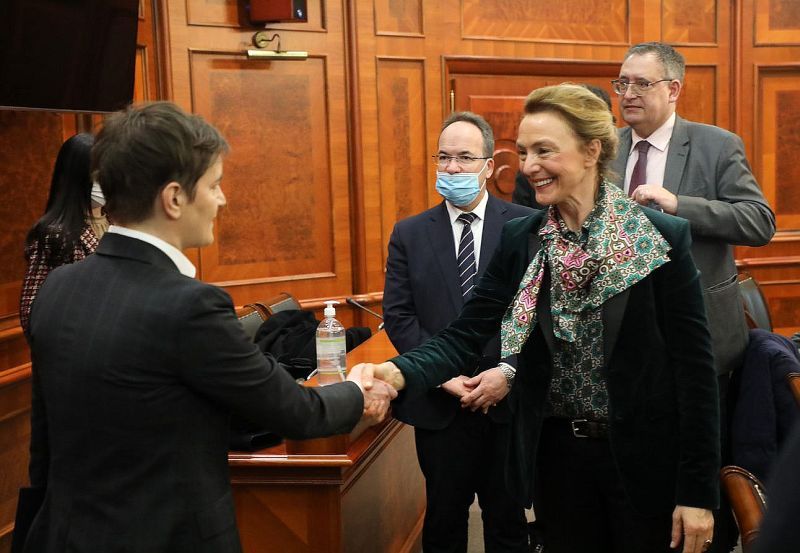
Prime Minister Ana Brnabic said today, in a conversation with Secretary General of the Council of Europe Marija Pejcinovic Buric, that cooperation with this organisation in reform processes is extremely important for Serbia, primarily through support in the field rule of law, democratisation of society and promotion of human rights.
Brnabic pointed out that our country continues to implement reforms within the framework of accession to the European Union in the field of rule of law, judiciary, improvement of media freedoms and electoral conditions.
She emphasised that Serbia will continue with the implementation of judicial changes and that the adoption of legal frameworks for amending the Constitution will follow.
The Prime Minister expressed the expectation that areas such as the rule of law, green transition and continued cooperation with the Venice Commission on the set of judicial reforms will be continued with the same intensity during the term of the next government.
The Secretary General of the Council of Europe congratulated Serbia on the reforms it has achieved in the field of justice, which, as she explained, represents the most important reform step and a key point in the rule of law and the improvement of all segments of society.
She also said that she was satisfied with Serbia's cooperation with GRECO on fulfilling the recommendations.
Brnabic assessed that Serbia has excellent cooperation with the Council of Europe Development Bank in numerous projects – from the BIO4 campus, through loans for dual education projects, student housing projects, combating the consequences of the COVID-19 pandemic, improving health infrastructure and the Regional Housing Programme.
As she stated, Serbia attaches great importance to cooperation with the Council of Europe and the implementation of the organisation's programmes in Serbia, including joint programmes between the Council of Europe and the European Union.
|
|
|
| Statehood Day of the Republic of Serbia - February 15 |
|
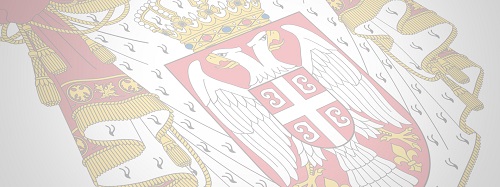
A video can be viewed here
|
|
|
| 7 February 2022 - Belgrade to get Centre for Fourth Industrial Revolution |
|
Prime Minister Ana Brnabic attended today in Geneva the signing of the Agreement on the Establishment of the World Economic Forum Centre for the Fourth Industrial Revolution in Serbia, the first of its kind in the Western Balkans.
The agreement was signed at the headquarters of that forum by Director of the Office for Information Technologies and eGovernment Mihailo Jovanovic and Managing Director and Head of the Forum's Centre for the Fourth Industrial Revolution Jeremy Jurgens.
The centre in Serbia will be the 16th in the network of centres of the World Economic Forum in the world and the first in the region of the Western Balkans.
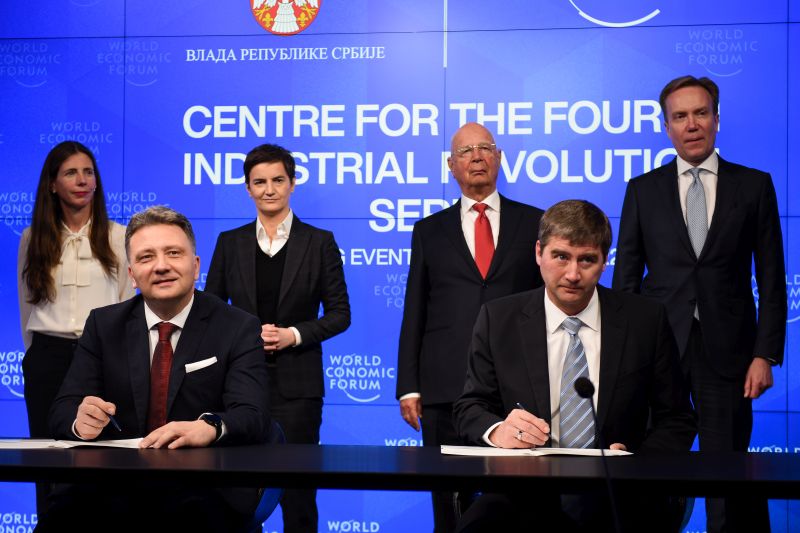
The new centre will start operating on 1 March and will function as a non-profit organisation and a platform for public-private partnership and cooperation for the Fourth Industrial Revolution, while the focus of work will be on artificial intelligence and bioengineering.
This centre will work within the Serbian government’s Office for Information Technologies and eGovernment and will cooperate with scientific institutes, state institutions and the private sector.
The signing of this document was also attended by founder and Executive Director of the World Economic Forum Klaus Schwab and President of the World Economic Forum Borge Brende, with whom Brnabic had previously met.
Addressing the press, Brnabic pointed out that this agreement is the result of many years of joint work between Serbia and the World Economic Forum.
We started talking in 2018, signed a Memorandum of Understanding, then 2020 hampered us a bit, but we continued to plan in 2021 and here we are today, she said.
According to her, the centre will be focused on the development of artificial intelligence, biomedicine and biotechnology, and on the ways in which digitalisation can raise the productivity of companies and the entire economy.
This is what further leads to higher salaries, a better standard of living, as well as to an economy that is mainly based on knowledge, creativity and innovation, Brnabic emphasised.
Today, we have received great recognition for everything that Serbia has done in the field of digitalisation, development of high technologies and paradigm shift – from an economy that was based on labour-intensive investments to digital development.
That is why this agreement shows that Serbia has been recognised as one of the leaders in the economy and IT industry in the last six years, the Prime Minister pointed out and assessed that this is the announcement of the beginning of an even closer cooperation between Serbia and WEF.
She added that they will have a joint meeting with the 16 WEF centres for the fourth industrial revolution in the world every month, at which they will talk about what each of them is doing, since each has a different focus.
That is how we will hear what everyone is doing every month, learn from each other and I am sure that the centre in Belgrade will be one of the best, the Prime Minister said.
According to her, this gives us visibility, the opportunity to further establish Serbia as an investment destination, a country good for living and investing in new technologies and knowledge.
Jovanovic said that the ecosystem formed around the centre will use the infrastructure of the National Platform for the Development of Artificial Intelligence, the Centre for Genome Sequencing and the future bioeconomic centre – BIO4 Campus.
Izvor/Foto: Tanjug
|
|
|
| Le 12 novembre 2021 - Un rôle important de l'UNESCO pour la préservation du patrimoine serbe au Kosovo-Metohija |
|
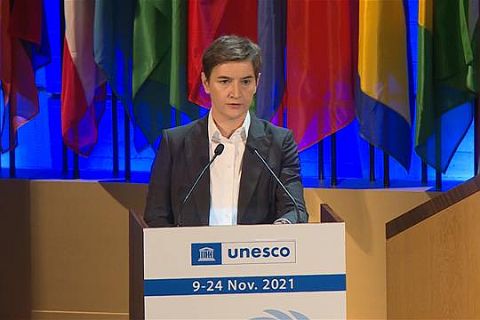
La Première ministre de la République de Serbie Ana Brnabić a déclaré aujourd'hui que les exemples graves de mise en danger du patrimoine culturel, historique et spirituel serbe au Kosovo-Metohija sont la preuve de l'importance du rôle de l'UNESCO dans la protection et la préservation du patrimoine.
Lors de la 41e session de la Conférence générale de l'UNESCO à Paris, Brnabić a souligné que quatre joyaux du patrimoine culturel médiéval serbe au Kosovo-Metohija - Visoki Dečani, le Patriarcat de Peć, Gračanica et Vierge de Leviša, ont été préservés grâce au fait qu'ils sont inscrits sur la liste du patrimoine mondial en péril, mais que des centaines d'autres sites et monuments sont menacés.
Le patrimoine serbe au Kosovo-Metohija est d'une importance incommensurable non seulement pour l'identité nationale de la Serbie, mais aussi en tant que partie du patrimoine européen et mondial précieux, a-t-elle souligné.
La Première ministre a indiqué l'attachement de la Serbie aux principes fondamentaux de l'UNESCO - le dialogue et le consensus, fondés sur la Charte des Nations Unies et l'Acte constitutif de l'UNESCO, c'est pourquoi nous plaidons continuellement pour la dépolitisation de cette organisation.
Source/Photo: www.srbija.gov.rs
|
|
|
| 12 November 2021 - UNESCO’s role extremely important for preservation of Serbian heritage in Kosovo and Metohija |
|

Prime Minister Ana Brnabic stated today that severe examples of endangering the Serbian cultural, historical and spiritual heritage in Kosovo and Metohija are proof of the important role of UNESCO in protecting and preserving heritage.
At the 41st session of the General Conference of UNESCO in Paris, Brnabic emphasized that four jewels of the Serbian medieval cultural heritage in Kosovo – Visoki Decani, Pec Patriarchate, Gracanica and Bogorodica Ljeviska, have been preserved thanks to the fact that they are inscribed on the endangered world heritage list. Hundreds of other sites and monuments are endangered.
The Serbian heritage in Kosovo and Metohija is of immeasurable importance, not only for the national identity of Serbia, but also as a part of the esteemed European and world heritage, she underlined.
Source/Photo: www.srbija.gov.rs
|
|
|
| Le 2 novembre 2021 - Discours du Président de la République de Serbie à la COP26 de Glasgow - Conférence des Nations Unies sur les changements climatiques |
|
«Excellences,
Honorables délégués,
Chère Sara,
Tout d'abord, je me vois dans l’obligation de remercier le Premier ministre Boris Johnson et le gouvernement de Sa Majesté pour leur hospitalité exceptionnelle.
J'ai le privilège de représenter la République de Serbie dans ce lieu important et au plus haut forum mondial, qui aborde le sujet le plus important d'aujourd'hui – la promotion de la sensibilisation aux enjeux climatiques.
Nous sommes tous d'accord pour dire que nous devons investir dans le climat et l'environnement.
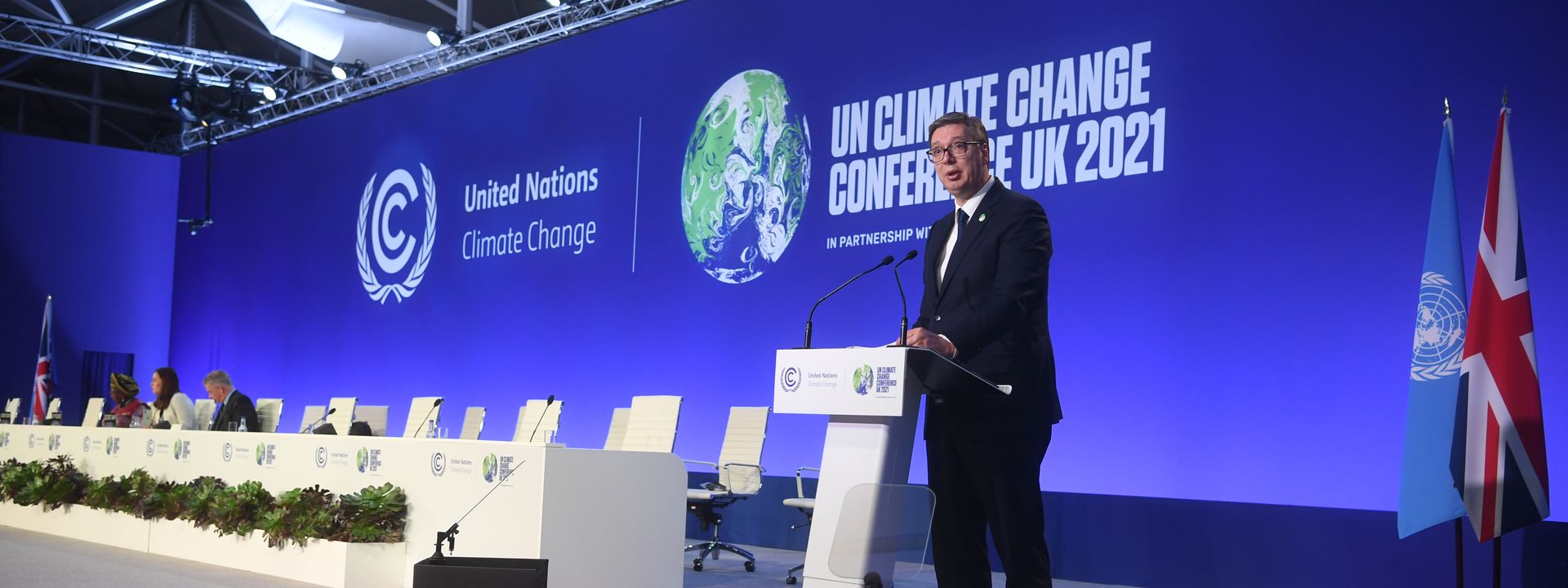
De même, nous sommes tous d'accord pour dire que les générations futures doivent être éduquées pour ne pas répéter les erreurs que nous avons commises, en détruisant la seule planète qui rende la vie possible.
Je suis extrêmement honoré que la République de Serbie copréside la Conférence de cette année en tant que représentant du groupe des pays d'Europe orientale qui ne sont pas membres de l'Union européenne.
Concrètement, nous voyons une contribution particulière de notre équipe d'experts dans l'achèvement des négociations sur l'opérationnalisation de l'article 6 de l'Accord de Paris, relatif à la mise en place de mécanismes mondiaux marchands et non marchands pour réduire les émissions de gaz à effet de serre, ainsi que les dispositions restantes concernant le cadre amélioré de la transparence et les délais communs pour les contributions déterminées au niveau national, qui sont des dispositions clés de l'accord pour lesquelles une décision n'a pas encore été prise pour être adoptée par la Conférence, c'est-à-dire tous les États membres.
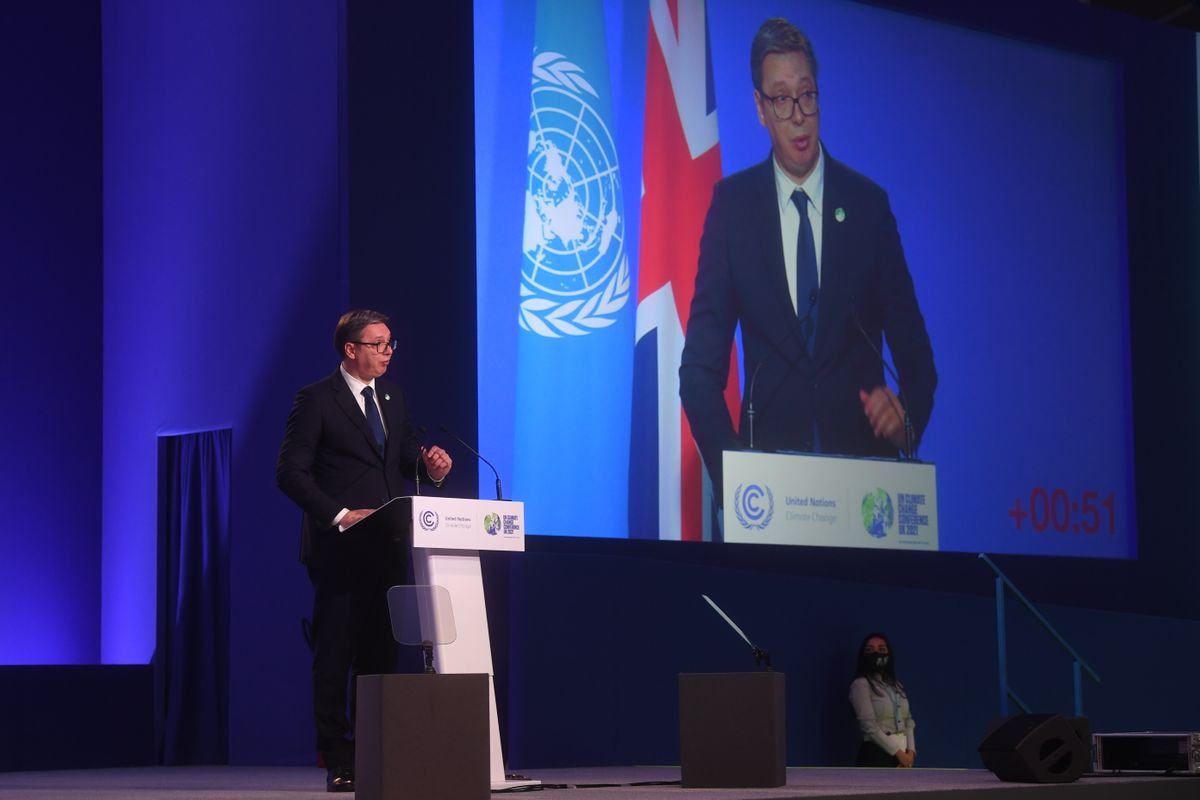
Par conséquent, nous pensons qu'il s'agit d'une occasion exceptionnelle pour la Serbie d'apporter sa pleine contribution à la finalisation des négociations, qui garantiront, nous l'espérons, la mise en œuvre pleine et entière de l'Accord de Paris.
En raison du fort développement économique modélisé pour la Serbie d'ici 2050, l'impact de la mise en œuvre de mesures environnementales sur l'emploi sera optimal, à travers la création de nouveaux emplois et la création de nouvelles industries, inexistantes jusqu’ici.
Lors de la première vente aux enchères d'obligations vertes en Serbie, un milliard d'euros ont été collectés, ce qui confirme clairement la confiance des investisseurs internationaux dans notre agenda vert, mais aussi la stabilité économique et politique de notre pays.
Nous utiliserons les revenus générés par l'émission d'obligations vertes pour financer les sources d'énergie renouvelables, l'efficacité énergétique, la gestion durable de l'eau, la prévention de la pollution et le développement d'une économie circulaire, et la préservation de la biodiversité.
Et comme vous pouvez le voir, chers amis, mes associés m'ont préparé un grand discours, mais je vais ajouter quelques mots et poser quelques questions supplémentaires pour ceux qui viennent des grandes puissances et qui n'ont pas encore répondu à quelques questions:
Le numéro un en est: comment allons-nous financer toutes ces activités?
Nous avons entendu l'histoire des milliers de milliards de dollars à notre disposition. Ma question serait: quel serait le taux d'intérêt, quelles seraient les conditions pour obtenir cet argent et comment traiterions-nous réellement ce problème ?
Numéro deux: comment allons-nous traiter les centrales nucléaires? Les fermerons-nous toutes ou les construirons-nous davantage ?
De même, comment allons-nous construire plus d'énergies renouvelables si nous avons déjà commencé à soutenir les mouvements populistes contre les parcs éoliens, les nouvelles centrales hydroélectriques, et mettrons-nous en péril le niveau de notre dette publique par rapport au PIB si nous prenons des sommes énormes d’argent?
Comment traiterons-nous le gaz naturel et comment assurerons-nous des prix décents pour le gaz naturel et l'électricité ?
De même, je suis venu ici en voiture électrique d'Édimbourg à Glasgow. Mais comment allons-nous extraire et traiter le lithium, le nickel, le cobalt et bien d'autres minéraux très importants?
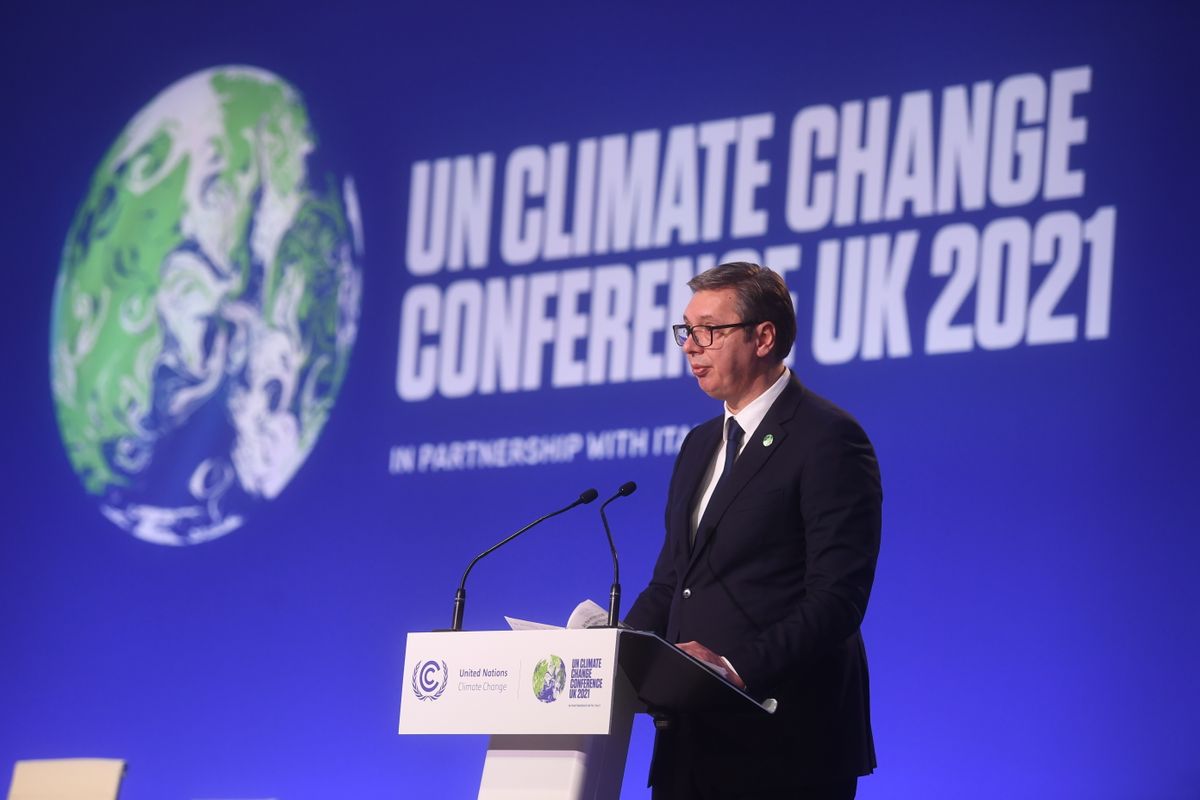
Et enfin, nous savons tous quel est notre objectif ultime, final. Mais ce n'est pas un conte de fées - nous devrons travailler dur, nous devrons être engagés à 100% et nous devrons être plus honnêtes les uns envers les autres.
La santé des personnes vivant en Serbie dépend directement de la mise en œuvre de cet agenda, tout comme la santé et la vie de chaque être vivant sur Terre dépendent de l'accord qui sera atteint ici et de la mise en œuvre de ces accords au niveau national.
C'est peut-être le bon moment pour écouter et entendre le cri de la Terre Mère, car si nous perdons cette course contre la montre, nos enfants hériteront d'une planète irrémédiablement polluée.
Merci de votre attention.»
Source: www.predsednik.rs
Photo: Dimitrije Goll |
|
|
| 2nd November 2021 - Address of the President of the Republic of Serbia at the United Nations climate change conference COP26 held in Glasgow |
|
"Your Excellences,
distinguished delegates,
dear Sarah,
At the very beginning, I feel obliged to thank Prime Minister Boris Johnson and Her Majesty’s Government for exceptional hospitality.
I feel privileged to represent the Republic of Serbia at this important place and at the highest-level world forum, in working on the most important topic of today – promoting climate awareness.
We all agree that we must make investment into climate and environment.

We all, likewise agree, that future generations must be educated in order not to repeat the mistakes we made, by hurting the only Planet that makes life possible.
I am very honoured that the Republic of Serbia is co-chairing this year’s Conference as a Non-EU representative of the Eastern Europe Group.
In concrete terms, we see the special contribution of our expert team in finalising negotiations on the implementation of Article 6 of the Paris Agreement, which refers to the establishment of the global market and non-market mechanisms for reducing greenhouse gas emissions, as well as to remaining provisions referring to advanced transparency framework and common timeframes for Nationally Determined Contributions, which are the key provisions of the Agreement that have not yet been covered by the decision that is to be adopted by the Conference, i.e. all member states.

We, therefore, believe that this is an exceptional opportunity for Serbia to give its full contribution to the finalization of negotiations, which, we hope, will secure full implementation of the Paris Agreement.
As a result of strong economic development, modelled for Serbia by 2050, the impact of the implementation of climate measures to employment will be optimal, through new jobs creation and creation of new industries which have not existed so far.
One billion euros was raised at the first green bonds auction in Serbia, which clearly confirms the trust of international investors in our green agenda, but also to the economic and political stability of our country.
Incomes from green bonds issuance will be used for financing renewables, energy efficiency, sustainable water management, prevention of pollution and circular economy development and biodiversity preservation.
And as you can see, dear friends, my people made a terrific speech for me, but I am going to add a few more words and a few more questions for those that are coming from big powers and that haven’t answered yet several questions:
Number one is: how are we going to finance all these activities?
We’ve heard the story of trillions of dollars that are at our disposal. My question would be: what would be the interest rate, what would be the terms for taking these amounts of money, and actually how are we going to tackle that issue?
Number two: how are we going to treat the nuclear power plants? Are we going to shut them all or are we going to build them more?
Then, how are we going to build more renewables if we already started endorsing populist movements against wind parks, new hydropower plants, and are we going to put in jeopardy the level of our public debt to GDP ratio if we raise huge amounts of money?
How are we going to treat natural gas, and how are we going to secure decent prices of natural gas and electricity power as well?
And, I came here using an electric car from Edinburgh to Glasgow. But, how are we going to do mining and refining of lithium, nickel, cobalt and many other very important minerals?

In the end, we all know what is our final aim, what is our final target. But, it’s not a fairytale – we’ll have to work a lot, we’ll have to be 100 per cent dedicated, and we’ll have to be more honest with each other.
The health of people living in Serbia depends directly on the implementation of this Agenda, just like the health and life of each living being on Earth depends on arrangements that will be reached here and on national implementation of the respective arrangements.
Perhaps it is the right time to listen and hear the cry of Mother Earth because if we lose this race against time, our children will inherit an irreparably polluted Planet. Thank you very much for listening to me."
Source: www.predsednik.rs
Photo: Dimitrije Goll
|
|
|
| Le 15 octobre 2021 - Selaković devant le CSNU: le dialogue et la mise en œuvre des accords atteins sont le seul bon moyen de résoudre les questions ouvertes |
|
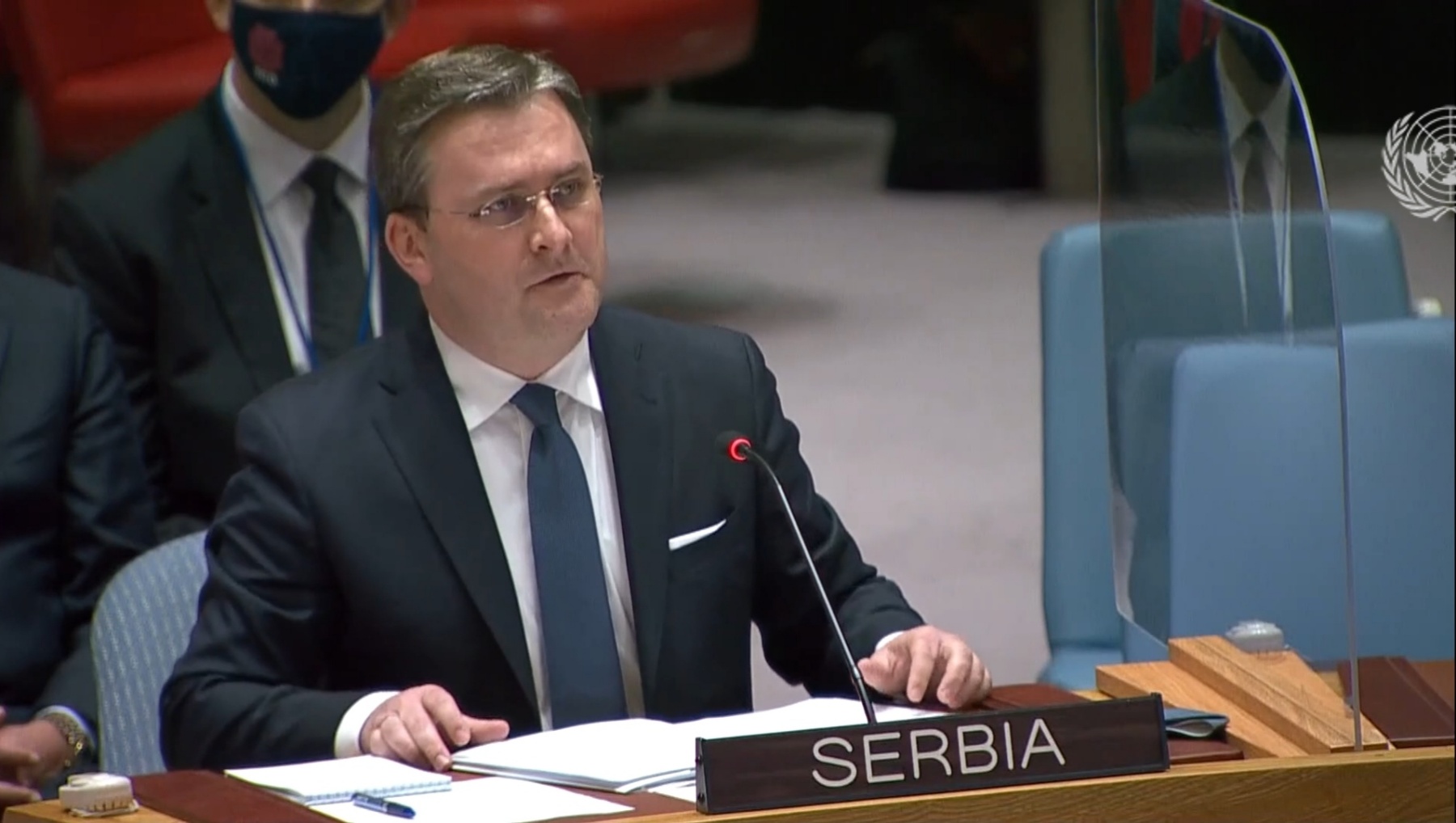
Discours du ministre serbe des Affaires étrangères Nikola Selaković lors de la session du CSNU consacrée au travail de la MINUK:
Honorable Président du Conseil de sécurité,
Honorables membres du Conseil de sécurité,
Honorable Représentant spécial,
Je tiens à remercier le Secrétaire général des Nations Unies, Guterres, et le Représentant spécial du Secrétaire général et Chef de la MINUK, Tanin, pour le rapport et les efforts déployés pour mettre en œuvre le mandat de la MINUK. Je remercie également les membres du Conseil de sécurité de l'attention constante qu'ils portent à la question du Kosovo-Metohija. La République de Serbie tient en haute estime les activités de la Mission des Nations Unies au Kosovo-Metohija et s’emploie pour son travail le plus efficace conformément à la résolution 1244 du Conseil de sécurité de l’ONU, sans en réduire la teneur, dans le but de construire et de préserver une paix, une stabilité et une sécurité durables dans la province.
Monsieur Tanin,
Recevez des expressions de notre gratitude pour l'engagement et la coopération réalisés au cours de votre mandat.
Monsieur le Président,
Le fait que la situation sécuritaire au Kosovo-Metohija au cours de la période précédante ait été marquée par un nombre croissant d'attaques et d'incidents à motivation ethnique dirigés contre les Serbes, ce qui a été également constaté dans le rapport, suscite un grand regret et une grande préoccupation; les institutions intérimaires d'administration autonome de Priština continuent de prendre des mesures unilatérales et refusent de mettre en œuvre les accords atteints dans le cadre du dialogue de Bruxelles; la discrimination institutionnelle continue contre les Serbes, les attaques contre les sites de l'Église orthodoxe serbe et on continue de saper la viabilité économique des communautés serbes de la province.
Nous témoignons qu'à un rythme accéléré, des provocations dangereuses de Priština ont lieu chaque jour, qui mettent gravement en danger la sécurité des Serbes du Kosovo-Metohija et violent directement les traités et accords atteints dans le cadre du dialogue de Bruxelles.
La dernière incursion de force des unités appelées ROSU dans la partie nord de Kosovska Mitrovica, le 13 octobre, est la neuvième incursion de ce genre. Les gaz lacrymogènes, les bombes électriques et la violence débridée deviennent le quotidien des Serbes du nord du Kosovo-Metohija, et cela doit cesser immédiatement.
Lors de la dernière attaque avec des armes à feu et des produits chimiques utilisés par les forces spéciales de Priština, Verica Đelić, 71 ans, est décédée des suites de produits chimiques utilisés dans l'intervention, 10 civils non armés ont été blessés, dont Srećko Sofronijević, 36 ans, qui était grièvement blessé dans le dos, par un fusil automatique. Un bébé de trois mois, miraculeusement resté indemne, s’est également trouvé dans le colimateur de la fusillade.
Le faux prétexte pour la dernière action unilatérale, comme l'a appelée le haut représentant de l'UE pour les affaires étrangères et la politique de sécurité, Josep Borrell, était la lutte contre la criminalité organisée et la contrebande. Mesdames et Messieurs, la Serbie est fermement opposée à la criminalité organisée et à la contrebande, mais les membres du CSNU doivent savoir qu'un objectif mondial aussi important et général, que nous partageons tous, a été cyniquement utilisé pour une attaque armée contre des civils non armés, qui a commencé par un raid aux fusils automatiques dans les pharmacies dans lesquelles les patients de nationalité serbe et d'autres nationalités se procurent des médicaments d'une importance vitale. Quatre jours avant les élections locales au Kosovo-Metohija, afin d'obtenir des votes d'une manière irresponsable et inhumaine, pleinement motivée par des objectifs séparatistes, le régime actuel des institutions intérimaires de Priština a commencé à prouver sa position sur le statut contraire à la résolution 1244 du CSNU sur les médicaments dont dépend la vie des gens.
Quelques jours plus tôt, une autre provocation de Priština a conduit à une crise dangereuse, lorsque des membres de l'unité dite ROSU, armés de longs canons et renforcés de véhicules blindés, ont été déployés aux points de passage administratifs entre la Serbie centrale et le Kosovo et Metohija - Brnjak et Jarinje - pour y retirer les plaques serbes et les remplacer par des plaques temporaires, ce qui a violemment empêché la libre circulation des citoyens.
Ces événements n'entrent pas dans la période couverte par le dernier rapport du Secrétaire général de l'ONU sur le travail de la MINUK, mais nous devons les évoquer à cette occasion pour faire comprendre à tous à quel point la situation sur le terrain est dramatique et à quel point les conséquences des agissements unilatéraux de Priština peuvent être graves.
Les incursions de formations de police de Priština lourdement armées et composées exclusivement d'Albanais dans le nord du Kosovo-Metohija, sous divers prétextes et motifs, avec un usage excessif de la force, sont des provocations qui ont un potentiel extrêmement dangereux de déstabiliser la situation sécuritaire déjà délicate sur le terrain. Le but des dernières incursions des forces spéciales de Priština dans le nord de la province était de provoquer les Serbes et de les intimider en plus par une démonstration de force, et de provoquer Belgrade à une sorte de réaction précipitée.
Il est évident que Priština avec de tels agissements veut effacer 10 ans de dialogue, qui est le seul moyen de résoudre les questions ouvertes. Ces provocations confirment une fois de plus que les institutions intérimaires de Priština, non seulement n'entendent pas mettre en œuvre tout ce qui a été convenu dans le dialogue de Bruxelles, mais que leur objectif est de nier complètement le dialogue comme moyen de résoudre les problèmes. Le manque de crédibilité de Priština et son jeu dangereux avec le feu, qui peuvent avoir des conséquences imprévisibles, ne peuvent être traités efficacement en appelant «les deux parties» à faire preuve d'esprit constructif et de retenue, ce qui est depuis longtemps un moyen de communication publique de certains facteurs importants au sein de la communauté internationale. Il n'y a qu'une source de déstabilisation, elle a un nom - elle s'appelle les institutions intérimaires d'autonomie de Priština - et après les événements du 13 octobre, il est clair qu'elle peut et doit être stoppée par une action urgente et décisive de la communauté internationale. Il est maintenant tout à fait évident qu'il ne s'agit plus de provocations sporadiques et isolées de Priština, mais qu'il s'agit d'une campagne organisée de violence à motivation ethnique et de discrimination contre les Serbes.
Nous exprimons également notre préoccupation face à la dernière imposition des taxes de Priština sur certains produits de la Serbie centrale, qui a été annoncée le 8 octobre. Nous rappelons que la décision unilatérale de Priština d'imposer des droits de douane sur les produits de la Serbie centrale en novembre 2018 a entraîné de facto un blocus commercial total et une impasse à long terme dans le dialogue entre Belgrade et Priština. Contrairement à Priština, qui cherche obstinément à établir des barrières vers la Serbie centrale par des actes unilatéraux, Belgrade s'efforce de manière persistante et constante de libéraliser les flux de personnes, de biens, de services et de capitaux, ce qui est l'intention fondamentale de notre initiative «Les Balkans ouverts».
Honorables membres du Conseil de sécurité,
Au cours de la période de mars à septembre de cette année, à laquelle se réfère le dernier rapport, près d'une centaine d'attaques à motivation ethnique ont été perpétrées contre des Serbes, leurs biens privés et les sites du patrimoine religieux et culturel. L'augmentation de la fréquence des attaques s'est accompagnée d'un renforcement de l'intensité de la violence à motivation ethnique, qui cible de plus en plus les enfants, les personnes âgées, les femmes, un petit nombre de rapatriés, ainsi que les églises et autres sites de l'Église orthodoxe serbe.
Cela renforce systématiquement le sentiment omniprésent d'insécurité des Serbes restants, mais dissuade également les rapatriés potentiels, à qui l'on dit en fait que les communautés albanaises locales peuvent les attaquer en toute impunité et les empêcher de retourner vivre dans leurs propres maisons.
L'exemple le plus édifiant de la situation des Serbes au Kosovo-Metohija est le cas de la personne déplacée Dragica Gašić, qui a de nouveau emménagé dans son appartement dans la municipalité de Đakovica début juin. Dans cette ville - que les Albanais locaux appellent fièrement l’endroit interdit aux Serbes - Mme Gašić a d'abord été agressée physiquement et verbalement par ses concitoyens albanais à son retour. Au lieu d'être protégée, cette femme gravement malade a ensuite été victime d'une persécution institutionnelle, qui a été lancée contre elle par les organes d'autonomie locale et la police. Puisqu'il s'agit d'une personne qui est le premier et le seul Serbe à rentrer à Đakovica après plus de vingt ans, il fallait s'attendre à ce qu'à ce moment-là au moins les organisations de la société civile protègent ses droits. Et pourtant, les ONG de Đakovica se sont rapidement jointes aux procédures visant à persécuter Mme Gašić, y compris celles recevant des financements de donateurs internationaux pour des projets liés au renforcement de la démocratie et de l'État de droit.
Je dois également mentionner la dernière attaque contre la maison de la seule femme serbe restante dans le centre de Peć, la professeure à la retraite Rumena Ljubić, dont les fenêtres ont été lapidées à deux reprises le 13 octobre, deux fois en seulement 24 heures.
Le sort de Dragica et Rumena est une image effrayante de l'état réel des droits de l'homme, qui attend au Kosovo-Metohija presque chacun des plus de 200.000 Serbes et non-Albanais déplacés - à condition qu'ils aient le courage de rentrer chez eux dans la province après plus de vingt ans. Je voudrais à nouveau vous rappeler que depuis 1999, seulement 1,9% environ des Serbes et autres non-Albanais déplacés à l'intérieur du pays ont effectué un retour durable au Kosovo-Metohija.
Par conséquent, je pense que ce qui est décrit encouragera les membres du Conseil de sécurité et la présence internationale sur le terrain à accorder une attention prioritaire à la question du retour des personnes déplacées, qui est une partie importante du mandat de la MINUK, prévu par la Résolution 1244 du CSNU.
Je remercie donc en particulier le Secrétaire général d'avoir maintenu cette question extrêmement importante au centre de l'attention et d'avoir réitéré, dans les conclusions de son rapport, l’appel à la création des conditions d'un retour durable des personnes déplacées à l'intérieur de leur propre pays et d'une réintégration durable des rapatriés.
Honorables membres du Conseil de sécurité,
Les monuments médiévaux serbes du Kosovo-Metohija - y compris les monuments qui figure sur la Liste du patrimoine mondial de l'UNESCO en péril en raison de leur valeur exceptionnelle, mais aussi du danger constant - font toujours partie du patrimoine culturel le plus menacé d'Europe.
Je vous rappelle qu'il y a plus de 1.300 églises et monastères serbes au Kosovo-Metohija. Les attaques contre le patrimoine culturel et religieux serbe sont en même temps des attaques contre l'identité des Serbes de la province et affectent directement leur sentiment de sécurité.
Un exemple édifiant de l'attitude irrespectueuse envers les monuments culturels et religieux serbes dans la province est le cas du monastère de Visoki Dečani. Le monastère, qui a été la cible d'attaques et de bombardements à plusieurs reprises depuis 2000, est toujours sécurisé par les forces de la KFOR en raison de sa mise en danger. Il est confronté à une série d'actions hostiles, et les auteurs ne sont pas découragés par le fait qu'il s'agit d'un site du patrimoine mondial. Malgré de fréquentes allégations déclaratives, même la décision de la prétendue «cour constitutionnelle» des institutions intérimaires d’autonomie de Priština rendue il y a cinq ans sur la confirmation de la propriété du monastère Visoki Dečani sur 24 hectares de terres. Nous saluons l'évaluation du Secrétaire général de l'ONU sur cette question.
Monsieur le président,
La République de Serbie reste déterminée à trouver une solution politique de compromis, telle qu'envisagée par la résolution 1244, qui garantira une paix et une stabilité durables. Nous sommes fermement convaincus que le dialogue et la mise en œuvre des accords atteints sont le seul bon moyen de résoudre toutes les questions ouvertes.
En tant qu'État voué au respect du droit international et membre des Nations unies, la Serbie s'oppose à toute tentative d'établir un équilibre artificiel entre les parties au dialogue, ainsi qu'à la relativisation de la responsabilité des actes unilatéraux.
Nous constatons avec préoccupation que plus de huit ans après la conclusion de l'Accord de Bruxelles, la création de l'Union des municipalités serbes n'a pas commencé, bien que Belgrade ait rempli toutes ses obligations au titre de cet accord.
Il existe également de nombreux exemples réguliers de Priština violant ou entravant les accords conclus dans le dialogue, dans les domaines de l'énergie, de la justice, de la liberté de circulation et des visites des officiels.
Un exemple en est le verdict condamnant Ivan Todosijević à deux ans de prison, qui est également indiqué dans le rapport du Secrétaire général. L'Accord de Bruxelles a été directement violé, ce qui a également été constaté par les représentants de l'Union européenne. Avec cette procédure, Priština a causé des dommages incalculables au processus de réconciliation au Kosovo-Metohija.
Malgré l'interprétation de la Commission européenne selon laquelle il s'agit d'une violation de l'Accord de Bruxelles, car Todosijević a dû être condamné par un collège composé en majorité de juges de nationalité serbe, Priština n'a toujours pas pris de mesures à ce propos.
Priština a également poursuivi la pratique consistant à interdire aux officiels serbes d'entrer sur le territoire de la province autonome du Kosovo-Metohija.
Nous pensons qu'il est important que la communauté internationale, et en particulier l'Union européenne, en tant que garante de l'accord, insiste fermement pour que les institutions intérimaires d'autonomie de Priština commencent à mettre en œuvre tous les accords conclus.
Honorables membres du Conseil de sécurité,
Comme jusqu’ici, la République de Serbie demeure pleinement déterminée à résoudre la question des personnes portées disparues, ce qui est confirmé par une coopération pleine et entière avec les mécanismes internationaux pertinents, ainsi que par la participation aux travaux du groupe de travail sur les personnes portées disparues. Nous nous attendons à ce que les représentants des institutions intérimaires d'autonomie de Priština remplissent leurs engagements aussi.
Ayant à l'esprit tout ce dont j'ai parlé, nous considérons qu'une présence internationale au Kosovo-Metohija, conformément à la résolution 1244 du Conseil de sécurité de l'ONU, est toujours nécessaire. Outre la MINUK, la présence est importante de la KFOR en tant que principal garant de la sécurité et d'EULEX pour son engagement en faveur de l'état de droit. Je tiens à souligner une fois de plus que la Serbie soutient pleinement le respect du droit international, l'exécution intégrale de la résolution 1244 du Conseil de sécurité des Nations Unies et les activités de la MINUK à une échelle non diminuée et avec des ressources financières adéquates, afin que la Mission remplisse le mandat qui lui est confié par la résolution.
Je vous remercie.
|
|
|
| 15th October 2021 - Selaković in UNSC: Dialogue and the implementation of the agreements reached are the only right way to resolve all open issues |
|
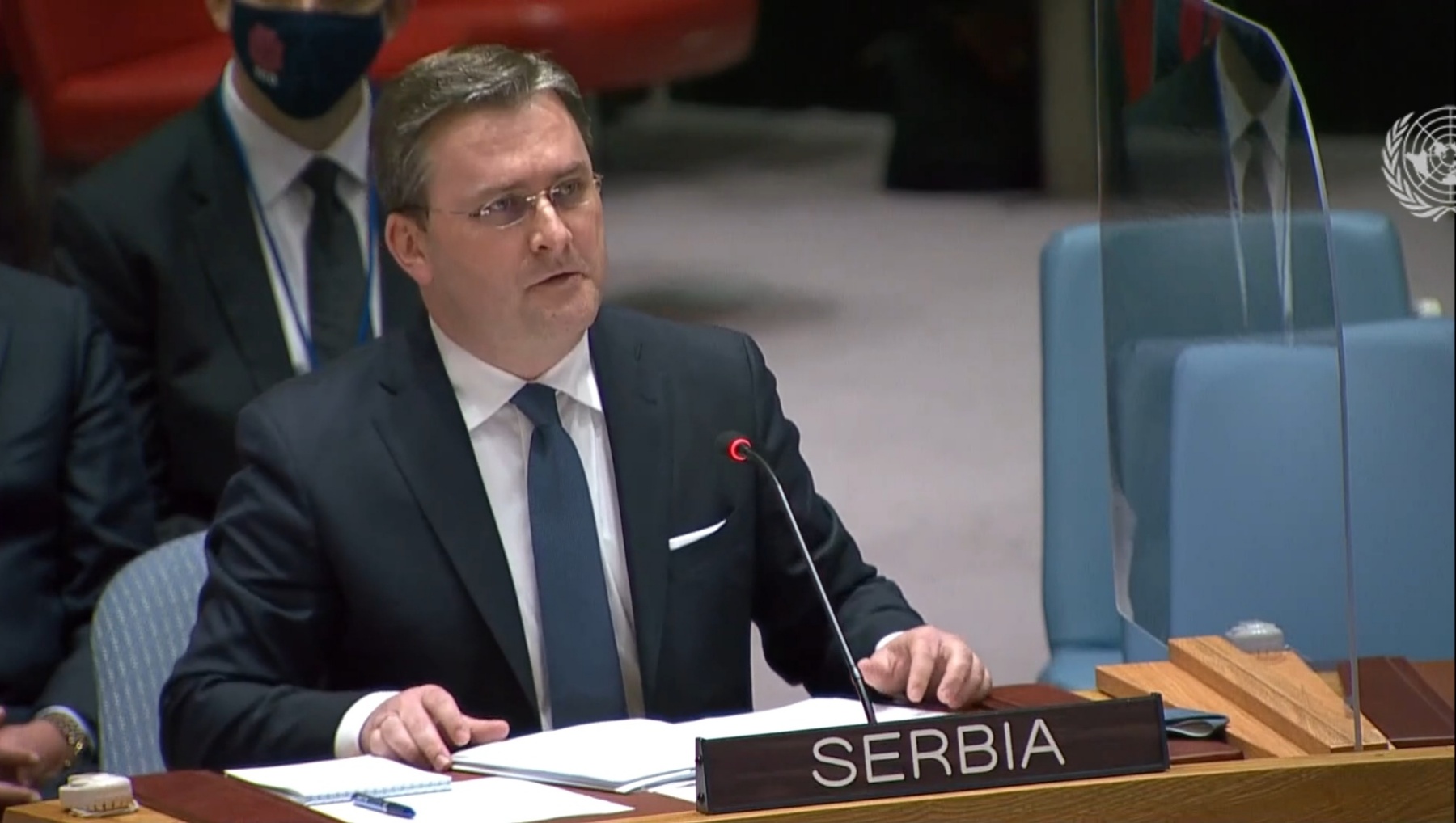
Distinguished President of the Security Council,
Esteemed members of the Security Council,
Distinguished Special Representative,
I would like to thank Secretary-General of the United Nations Mr. Guterres and Special Representative of the Secretary-General and Head of UNMIK Mr. Tanin for the report submitted and for their efforts made towards the implementation of the UNMIK mandate. I would also like to thank the members of the Security Council for the continued attention they have devoted to the issue of Kosovo and Metohija. The Republic of Serbia highly values the activities of the Mission of the United Nations in Kosovo and Metohija and supports it in carrying out its work as efficiently as possible, pursuant to the UN Security Council Resolution 1244, and undiminished in scope, aiming to build and preserve lasting peace, stability and security in the Province.
Mr. Tanin,
Please accept the expressions of our gratitude for your engagement and the cooperation we achieved during your term of office.
Mr. President,
Deep regret and concerns are raised by the fact that the security situation in Kosovo and Metohija in the past period has been marked by an increasing number of various ethnically motivated attacks and incidents targeting Serbs, which was also stated in the Report; that the provisional institutions of self-government (PISG) in Pristina continue to take unilateral steps and refuse to implement the agreements reached in the Brussels dialogue; and that institutional discrimination against Serbs, attacks on the sites of the Serbian Orthodox Church and the undermining of the economic sustainability of Serb communities in the Province have continued.
We are witnessing that dangerous provocations by Pristina are taking place every day, at an accelerated pace, thus seriously threatening the safety of Serbs in Kosovo and Metohija and directly violating the agreements and arrangements reached within the Brussels dialogue.
The latest violent incursion of the so-called ROSU units into the northern part of Kosovska Mitrovica, on 13 October, is the ninth incursion of its kind. Tear gas, shock bombs and unbridled violence are becoming a matter of everyday life for Serbs in the north of Kosovo and Metohija, and that must be stopped immediately.
In the last attack with firearms and chemicals used by Pristina special forces, 71-year-old Verica Djelic died as a result of chemicals used in the intervention, 10 unarmed civilians were wounded, one of them 36 years old Srećko Sofronijević was critically wounded in the back with of an automatic rifle. A three-month-old baby, who miraculously remained unharmed, was also the target of the shooting.
The false excuse for the latest unilateral action, as EU High Representative for Foreign Affairs and Security Policy Josep Borrell called it, was the fight against organized crime and smuggling. Ladies and gentlemen, Serbia is strongly against organized crime and smuggling, but the members of the UNSC should know that such an important and general global goal, which we all share, was cynically used for an armed attack on unarmed civilians, which began with an automatic rifle raid of pharmacies in which patients of Serbian and other nationalities are supplied with vitally important medicines. Four days before the local elections in Kosovo and Metohija, in order to gain votes in an irresponsible and inhumane way, fully motivated by separatist goals, the current PISG regime used medicines on which people’s lives depend to prove its position on the status contrary to UNSCR 1244.
Only a few days earlier, another provocation on the part of Pristina led to a dangerous crisis, when personnel of the so-called ROSU unit, armed with long firearms and reinforced with armoured vehicles, were deployed to administrative crossings between central Serbia and Kosovo and Metohija - Brnjak and Jarinje – in order to remove Serbian license plates and replace them with temporary ones, thus violently preventing the free movement of citizens.
These events do not fall within the reporting period covered by the latest Report of the UN Secretary General on the work of UNMIK, but it is incumbent upon us to address them on this occasion, in order to have everyone understand how dramatic the situation on the ground has been and how serious the consequences of Pristina's unilateral actions can be.
The incursions of heavily armed Pristina police formations, composed exclusively of Albanians, into the north of Kosovo and Metohija, under various pretexts and motives, with the use of excessive force, are provocations that have an extremely dangerous potential to destabilize the already sensitive security situation on the ground. The goal of the latest incursions of Pristina’s special force personnel into the north of the province was to provoke the Serbs and additionally intimidate them with a demonstration of force, as well as to provoke Belgrade to react hastily in some way.
It is obvious that with such moves Pristina aims to erase the 10 years of dialogue, which is the only way to resolve open issues. These provocations once again demonstrate that the provisional institutions of self-government in Pristina, not only do not intend to implement everything agreed in the Brussels dialogue, but that their goal is to completely deny dialogue as a means of resolving problems. An effective response to Pristina's lack of credibility and their dangerous play with fire, which could have unforeseeable consequences, cannot be provided by calling on "both sides" for constructiveness and restraint, which has long been a manner in public communication of some important factors in the international community. There is only one source of destabilization, it has a name – and that is the provisional institutions of self-government in Pristina - and after the events of 13 October, it is clear that it can and needs to be stopped by urgent and decisive action of the international community. It is now quite obvious that these are no longer sporadic and isolated provocations by Pristina, but that this is an organized campaign of ethnically motivated violence and discrimination against Serbs.
We also express our concern over the latest imposition of tariffs by Pristina on certain products originating from central Serbia, which was made public on 8 October. We remind you that the unilateral decision of Pristina to impose duties on products from central Serbia in November 2018 resulted in a de facto complete trade blockade and a long-term stalemate in the dialogue between Belgrade and Pristina. In contrast to Pristina, which persistently seeks to raise barriers towards central Serbia through unilateral acts, Belgrade is persistently and consistently working to liberalize the flow of people, goods, services and capital, which is the basic goal of our "Open Balkan" initiative. North Macedonia and Albania joined this initiative, but Pristina did not.
Distinguished members of the Security Council,
In the period from March to September this year, which is covered in the latest Report, close to 100 ethnically motivated attacks were carried out against Serbs, their private property, religious and cultural heritage sites. The increase in the frequency of attacks was accompanied by the strengthening of the intensity of ethnically motivated violence, which more and more often targets children, the elderly, women, the few returnees present there, as well as churches and other property of the Serbian Orthodox Church.
This systematically intensifies the ubiquitous sense of insecurity of the remaining Serbs, but also deters potential returnees, who are in fact being told that local Albanian communities can attack them with impunity and prevent them from returning to live in their own homes.
The most striking example of the position of Serbs in Kosovo and Metohija is the case of the displaced person Dragica Gašić, who moved into her apartment in the municipality of Djakovica again in early June. In that town – to which local Albanians proudly refer as a place forbidden to Serbs - Ms. Gašić, on her return, first faced physical and verbal attacks by citizens of Albanian nationality living there. Instead of being provided protection, that seriously ill woman then became a victim of institutional persecution as well, that the local self-government bodies and the police unleashed against her. Since this is a person who is the first and only Serb returnee to Đakovica after more than twenty years, it was to be expected that, at that moment, at least civil society organizations would attempt to protect her rights. However, NGOs from Djakovica soon joined the activities aimed at the expulsion Ms. Gašić, including those receiving funding from international donors for projects related to strengthening democracy and the rule of law.
I must also mention the latest attack on the house of the only remaining Serbian woman in the center of Pec, retired teacher Rumena Ljubić, whose windows were stoned twice in just 24 hours on 13 October.
Dragica's and Rumena’s fate is a frightening reflection of the real situation of human rights that almost every one of over 200,000 displaced Serbs and non-Albanians would face in Kosovo and Metohija - provided that they gather the courage to return to their homes in the Province after more than twenty years. I would like to remind you again that since 1999, only around 1.9% of internally displaced Serbs and other non-Albanians have achieved a sustainable return to Kosovo and Metohija.
Therefore, I believe that the aforementioned will encourage the members of the Security Council and the international presence on the ground to devote priority attention in the future to the issue of the return of displaced persons, which is an important part of the UNMIK mandate under UN Security Council Resolution 1244.
I therefore thank the Secretary-General in particular for keeping this extremely important issue in focus and for calling again, in the conclusions of his Report, for the creation of conditions for the sustainable return of internally displaced persons and the sustainable reintegration of returnees.
Distinguished members of the Security Council,
Serbian medieval monuments in Kosovo and Metohija, including monuments that, due to their exceptional value but also constantly being subject to threats are inscribed on the UNESCO List of World Heritage in Danger, are still among the most endangered cultural heritage in Europe.
I wish to recall that there are over 1,300 Serbian churches and monasteries in Kosovo and Metohija. Attacks on Serbian cultural and religious heritage are at the same time attacks on the identity of Serbs in the Province and directly affect their sense of safety.
A striking example of disrespect for Serbian cultural and religious monuments in the Province is the case of the Visoki Decani monastery. The monastery, which has been the target of attacks and shelling several times since 2000, is still secured by KFOR forces due to being under a threat. It is faced with a series of hostile actions, and the perpetrators are not deterred by the fact that this is a World Heritage Site. Despite frequent declaratory statements, even the decision of the so-called "constitutional court" of the PISG in Pristina five years ago confirming ownership of Visoki Decani Monastery over 24 hectares, is not respected. We welcome the assessment made by the UN Secretary General in his Report.
Dear Mr. President,
The Republic of Serbia remains committed to finding a compromise political solution, as prescribed under Resolution 1244, which will ensure lasting peace and stability. We firmly believe that dialogue and the implementation of the agreements reached are the only right way to resolve all open issues.
As a state committed to the respect for international law and a member of the United Nations, Serbia opposes any attempt at establishing an artificial balance between the parties in the dialogue, as well as the relativization of responsibility for unilateral acts.
We note with concern that not even eight years after reaching the Brussels Agreement, the establishment of the Community of Serb Municipalities has not been initiated, although Belgrade has fulfilled all its obligations under that agreement.
There are also numerous and repeated examples of Pristina violating or obstructing agreements reached in dialogue, in the areas of energy, justice, freedom of movement and visits by officials.
One such example is the verdict sentencing Ivan Todosijevic to two years in prison, which is also pointed out in the Secretary General's Report. The Brussels Agreement was directly breached, which was also stated by the representatives of the European Union. With its conduct Pristina caused immeasurable damage to the reconciliation process in Kosovo and Metohija.
Despite the interpretation from the European Commission that this is a violation of the Brussels Agreement, because Todosijevic had to be sentenced by a panel consisting of the majority of judges of Serbian ethnicity, Pristina still does not take any action in this regard.
Pristina also continued with the practice of banning Serbian officials from entering the territory of the Autonomous Province of Kosovo and Metohija.
We believe that it is important that the international community, and especially the European Union, as the guarantor of the agreement, firmly insists that the provisional institutions of self-government in Pristina start implementing all the agreements reached.
Distinguished members of the Security Council,
As before, the Republic of Serbia remains fully committed to resolving the issue of missing persons, as also demonstrated through full cooperation with relevant international mechanisms as well as participation in the work of the Working Group on Missing Persons. We expect that the representatives of the provisional institutions of self-government in Pristina will fulfill their obligations.
Bearing in mind everything I delivered here today in my address, we hold the position that the international presence in Kosovo and Metohija, pursuant to UN Security Council Resolution 1244, is still necessary. In addition to UNMIK, the presence of KFOR as the main guarantor of security and EULEX, due to its engagement in the field of the rule of law, is also important. I would like to emphasize once again that Serbia fully supports respect for international law, comprehensive implementation of UN Security Council Resolution 1244 and activities of UNMIK in an undiminished scope and with adequate financial resources, so that the Mission fulfills the mandate entrusted to it under the Resolution.
Thank you.
|
|
|
| Serbia committed to gender equality, empowerment of women |
|
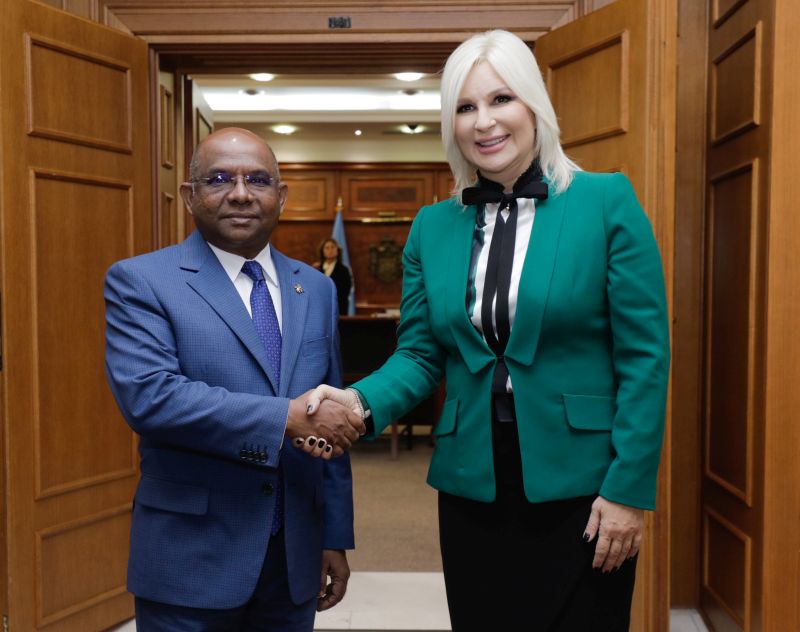
Belgrade, 12 October 2021
Deputy Prime Minister and Minister of Mining and Energy Zorana Mihajlovic spoke today with President of the UN General Assembly Abdulla Shahid about issues regarding human rights and gender equality, as well as about the Green Agenda and the energy transition process.
Mihajlovic underlined that Serbia is committed to gender equality, recalling that the Coordination Body for Gender Equality was set up in 2014.
She voiced hope that, with the further support of the UN, we will be able to work on new projects and to include the gender component into the energy sector.
Mihajlovic and Shahid also discussed the world energy crisis and the energy transition process and noted that the goals are the green and sustainable energy and economy.
She pointed out that the aim is to have at least 40 percent of energy obtained from renewable sources by 2040 and to become a carbon neutral country by 2050.
Shahid underlined that gender equality is one of the priorities of his presidency over the UN General Assembly.
What Serbia has achieved regarding gender equality and the Green Agenda is encouraging, you are inspiration to many, Shahid stated.
|
|
|
| Equality of states and nations remains an issue, summit told |
|
Oct 11, 2021
The participants the 60th anniversary summit of the Non-Aligned Movement (NAM) agreed on Monday that the issue of equality of states and nations was still relevant, and emphasized the struggle for state sovereignty, respect of human rights and the fight against racism, hatred and vaccine nationalism.
They pointed out that these problems must be solved through joint efforts.
Ugandan Foreign Minister Abubaker Jeje Odongo noted that multilateralism and solidarity were now more necessary than ever before and that the pandemic had revealed social and economic vulnerabilities.
He stressed that the ideals of the NAM – the establishment of a prosperous, peaceful world and equality – were still relevant and that the Belgrade gathering was an opportunity to reaffirm these values in the international community.
The FM of Botswana, Lemogang Kwape, also stated that his country remained committed to the main principles of the movement, and stressed that Botswana played a major role in eliminating the apartheid regime.
Even today, we are working to eliminate racial discrimination and reduce terrorism, he said.
Kuwaiti Foreign Minister Ahmed Nasser Al-Mohammed Al-Ahmed Al-Jaber Al-Sabah stressed that the whole world should cooperate and that it was necessary to have a multipolar system in order to solve problems as well as possible so that the world could develop.
He mentioned the problem of Palestine and asked some members of the movement to use their influence on Israel, which he said had occupied Palestine.
Palestinian Foreign Minister Riyad al-Maliki praised all members of the Non-Aligned Movement who have struggled over the past 60 years to eradicate anything that was contrary to the movement’s principles.
The people of Palestine continue to see the Non-Aligned Movement as our shared community that recognizes the right to our commitment to independence and peaceful resolution of many problems, Al-Maliki said, adding that the goals of the Non-Aligned Movement could still be seen in Palestine.
For Bangladesh, the inspiration for joining the NAM was the fight against inequality and injustice and the fight for human rights, because the world is divided between those who oppress and those who are the oppressed, said the Minister of Foreign Affairs of Bangladesh, Abul Kalam Abdul Momen.
These are the principles that are rooted in our Constitution, this is the principle of our foreign policy, and this is the principle of friendship with other countries, Momen said.
Guatemalan Foreign Minister Pedro Brolo Vila said the movement’s goals were closely linked to rule of law, human rights, and that Guatemala was seeking further and stronger protection of human rights and strengthening of democratic processes.
We need to work and act together to further promote peace in the world – our task is to make our countries safe, but also to have the opportunity for human beings to develop in the right sense, Vila said.
According to the Minister of Foreign Affairs of the Arab League, Ahmed Moaz al-Khatib, there is a need for everyone to work together to establish balance in the world.
The participants agreed that it was very important that the summit was being held in Belgrade, where the first conference of the Non-Aligned Movement took place 60 years ago, and jointly thanked President Aleksandar Vucic, the Serbian government and Foreign Minister Nikola Selakovic for organizing the event.
They also thanked the Serbian citizens for their hospitality.
Source: Tanjug
|
|
|
| Vučić: Welcome home; Serbia a reliable partner to its friends, October 11 2021 |
|
With the words “welcome home”, the President of Serbia, Aleksandar Vučić, began his address today at the opening of the Commemorative Meeting on the occasion of the 60th anniversary of the first Summit of the Non-Aligned Movement (NAM).
“I hope that we will not only discuss the past, but also the future that we want to build together. The world of dialogue, compromise, and peace is still possible and attainable”, he said.
Belgrade has been, is and will continue be a proud host to all human beings who carry peace within themselves. The basic idea around which our predecessors gathered when they founded the Movement was peace. Peace is the basis for the development of cooperation, whether politicalor economic”, Vučić pointed out.
He said that he was especially glad for having the opportunity to see friends from distant countries, for whom the difficult situation with Covid-19 was not an obstacle to travel to Belgrade, which showed the importance they attach to this organization.
It is a great personal privilege and honour for Serbia that we gathered here in Belgrade, where we will make sure that you feel at home. I am convinced that Belgrade, as a centuries-old symbol, a crossroads of civilizations and religions, a meeting point between East and West, can inspire you to dialogue and encourage you to build new bridges of cooperation”, Vučić said.
He emphasized that international cooperation, while respecting fundamental principles, is the only path towardsthe development and prosperity of humanity, and pointed out that the UN Sustainable Development Agenda 2030, according to him, highlights and promotes three principles – peace and security, development and human rights.
“Serbia, as the legal successor of Yugoslavia, the founder of the UN and the NAM, is a proud promoter of the policy of multilateralism and respect for international norms.
Vučić pointed out that the Movement is based on common principles that have never lost their significance, and that it played an essential role in preserving peace and security in the world, in the process of decolonization, which promoted equality and social and economic development of all countries.
He also said that today it is not enough to nostalgically remember the golden age of the Movement, but that we must work together on fulfilling the goals that will lead towards the future of equals, where the same rights shall apply to everyone, and this is the direction the Movement has taken from its beginning and for which everyone should strive even today.
“We are advocating this, not because it is a question of the interests of individual countries, but because it is one of the biggest civilizational steps that the world must take if it wants to survive, and not as a kind of camp of which only the rich have the key”, Vučić said.
The President said that the right to decide one’s own destiny is not a sin, but a right that must belong to everyone, regardless of the strength and power at theirdisposal.
He noticed that the world today is much different from the one in 1961, since globalization, interdependence and the development of new technologies have made the planet smaller, making an impact on everyone’s lives.
“The challenges we face today know no boundaries, and their nature is more complex. That is why we need to work more than ever on the development of multilateralism, because no country is isolated and cooperation is the only way to prosperity”, Vučić said.
That, he says, is the basis on which, despite the differences, members of the Movement stand, the Movement which is a symbol of the freedom-loving part of the world, ready to fight for freedom, independence and sovereignty.
“I believe that this indeed is something worth fighting for. Serbia knows best how difficult it is, because of all the struggles it is waging to preserve its sovereignty and territorial integrity, to resolve the issue of Kosovo and Metohija”, Vučić said.
The President said that in this way, Serbia defends the universal principles on which the UN Charter is based, the principles of international law, but also some of the most important values of the Movement.
Vučić said that Serbia remains committed to finding a compromise solution that would guarantee lasting peace in the province, convinced that it is a reflection of our strengths, not weaknesses, and stressed that Serbia is an independent state, which makes its own decisions, a reliable partner to all of its friends, always ready to extend a hand of cooperation.
On that note, he reminded that in the past period, Serbia selflessly helped everyone who needed it, with more than a million vaccines against Covid-19, more than half of which were donated to African and Asian countries, adding that our country will continue to do so, until the coronavirus becomes a thing of the past.
“You have a loyal friend in Serbia, and these are not empty words. Despite all the pressures, Serbia will never turn its back on friends”, Vučić underlined.
He also reminded that the Movement was conceived with the idea of SFRY, Egypt and India, that peace cannot be ensured by divisions, but by striving for collective security and ending the domination of one country over another.
President Vučić concluded by quoting an African proverb, saying “If you want to go fast, go alone. If you want to go far, go together”, which he believes corresponds fully to the character of this Movement.
Source TANJUG
|
|
|
| Principles, values of Non-Aligned Movement still relevant today - Belgrade, 11 October 2021 |
|
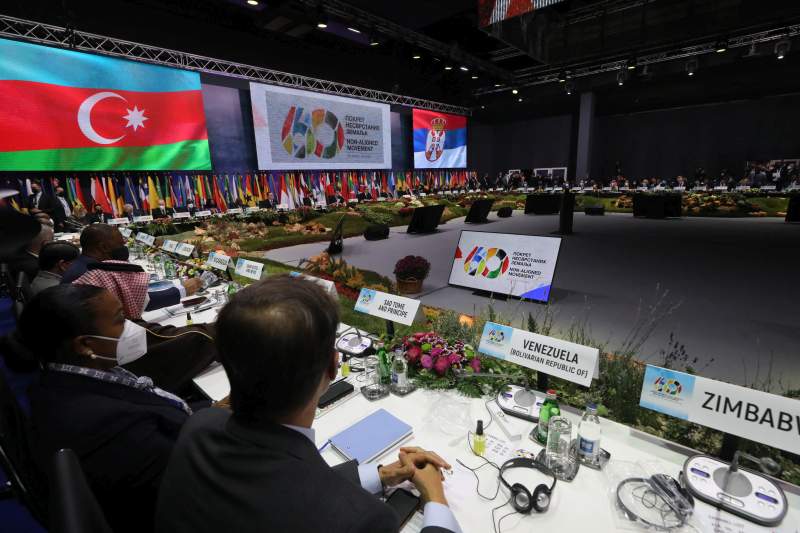
President of the Republic of Serbia Aleksandar Vucic stated today, opening a commemorative summit on the occasion of the 60th anniversary of the Non-Aligned Movement, that international cooperation, while respecting fundamental principles, is the only path to human development and prosperity.
Vucic, who began his address at this gathering with the words "welcome home", pointed out that Belgrade was, is and will be a proud host to every human being who carries peace within himself.
I hope that we will not only talk about the past, but also about the future that we want to build together. The world of dialogue, compromise and peace is still possible and achievable, the President of the Republic said.
Vucic pointed out that the UN Sustainable Development Agenda 2030 promotes three principles – peace and security, development and human rights, adding that Serbia, as the legal successor of Yugoslavia, the founder of the United Nations and the Non-Aligned Movement, is a proud promoter of multilateralism and respect for international norms.
According to him, marking the anniversary of the first conference of the Non-Aligned Movement represents a desire to pay tribute to this movement, which made a significant contribution and a vision based on respect during the bloc divisions, noting that there was no room for domination of one state over another.
The President of the Republic said that the right to decide one's own destiny is not a sin, but a right that must belong to everyone, regardless of the strength and power at its disposal.
Vucic assessed that the world today is different in relation to the one from 1961, because globalisation, interdependence and the development of new technologies have made the planet smaller, achieving an impact on everyone's lives.
At the same time, the challenges we face know no boundaries, and their nature is more complex. That is why we need to work more than ever on the development of multilateralism, because no country is isolated, no country is an island for itself, and cooperation is the only way to prosperity, he pointed out.
According to him, that is the basis on which, despite the differences, the members of the Movement stand, which is a symbol of the freedom-loving part of the world, ready to fight for freedom, independence and sovereignty.
The President of the Republic emphasized that Serbia knows best how difficult it is, because it is fighting to preserve its sovereignty and territorial integrity and resolve the issue of Kosovo and Metohija.
Vucic pointed out that Serbia's defense defends the universal principles on which the UN Charter is based, the principles of international law, but also some of the most important values of the Movement.
As he emphasised, Serbia, as the successor of the SFRY, has never stopped striving to strengthen cooperation with traditional friends around the world.
The summit is jointly organised by Serbia and Azerbaijan. The participants were addressed by a video link by President of Azerbaijan Ilham Aliyev, who said that the country would strengthen cooperation within the Movement in order to strengthen justice and respect for international law.
The gathering is attended by delegations of members of the Non-Aligned Movement from more than 105 countries and numerous international organizations, and is attended by approximately 50 heads of state, government and foreign ministers.
|
|
|
| Selakovic hosts dinner for ministers of NAM member states - Oct 10, 2021 |
|
Serbian FM Nikola Selakovic on Sunday hosted a ceremonial dinner for foreign government ministers who will attend the 60th anniversary summit of the Non-Aligned Movement (NAM) in Belgrade.
The dinner was attended by more than 30 foreign guests, heads of delegations in the rank of ministers, as well as by Serbian government ministers.
In his opening speech, Selakovic welcomed the foreign delegations to the birthplace of the NAM.
“Although the world is not the same as six decades ago, we share the same values and want to pay a tribute to the glorious moments of our shared history,” said Selakovic.
The Serbian minister wished the guests and their countries and peoples health, happiness and wisdom in a time when the world is facing growing challenges.
“I hope that, on the basis of friendship, cooperation and the values embodied in the Non-Aligned Movement, we will be able to overcome all the adversities that are ahead of us,” Selakovic stressed.
Besides Selakovic, the dinner was attended by Serbian ministers Maja Gojkovic, Aleksandar Vulin, Jadranka Joksimovic, Tatjana Matic, Tomislav Momirovic, Branko Ruzic, Vanja Udovicic and Branislav Nedimovic.
Before the dinner in the Geozavod building, Selakovic presented to the guests the Belgrade Waterfront project, which he said was the new face of the Serbian capital and the engine of its development.
Source: Tanjug |
|
|
| 25 September 2021 - Selaković in New York with 28 foreign ministers on economic successes of Serbia and K&M situation |
|
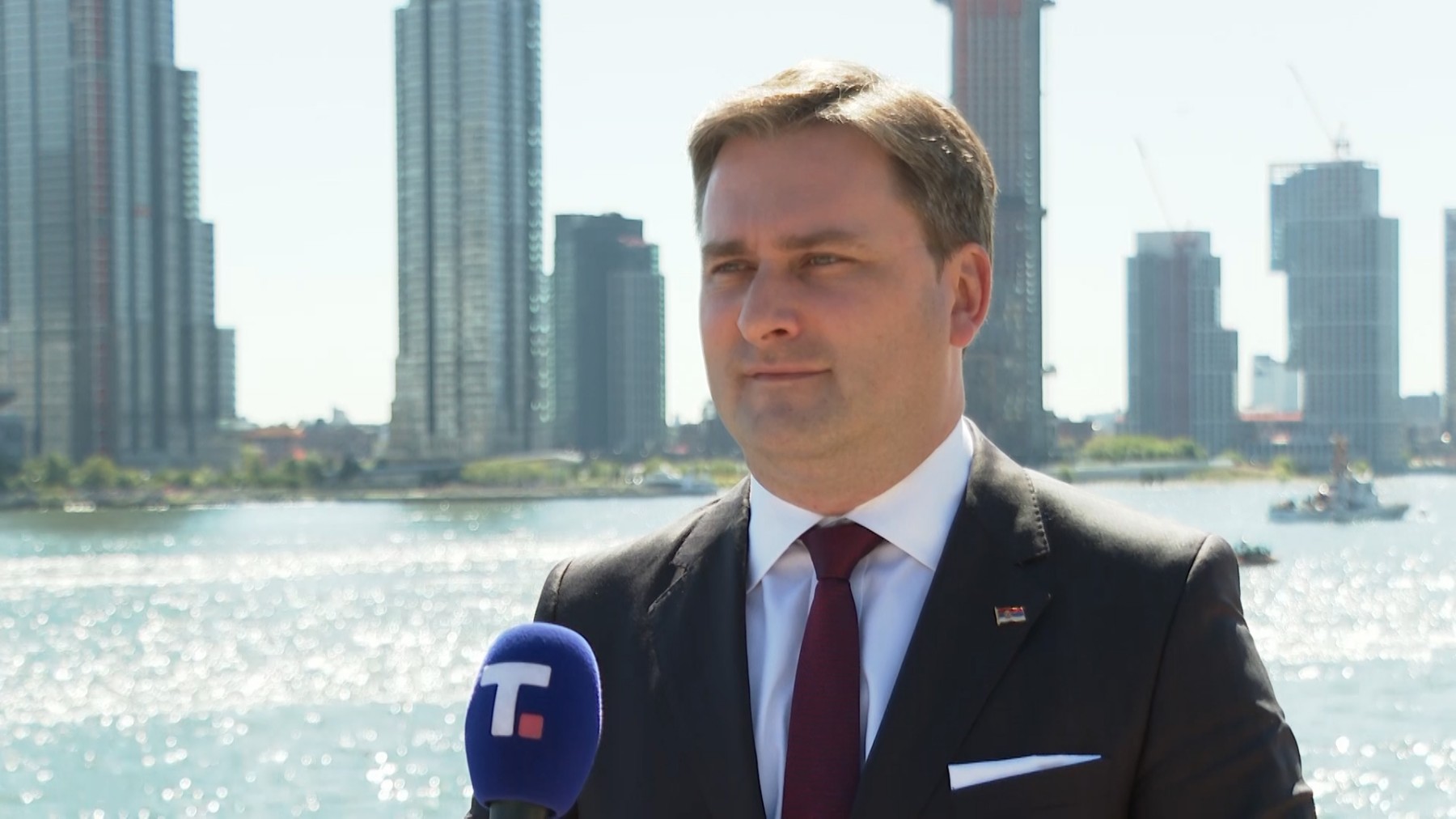
The Minister of Foreign Affairs of Serbia, Nikola Selaković, has stated that in New York he introduced foreign ministers of 28 countries to economic success of Serbia but also to the situation in Kosovo and Metohija, which he also discussed with the Russian Minister of Foreign Affairs, Sergey Lavrov, who told him that we could count on the support of the Russian Federation, with regards to Serbian interests in K&M.
Summarizing results of his visit to New York within the session of the UN General Assembly, Minister Selaković says that one of the last meetings was with Minister Lavrov, which was their third meeting in the previous nine months.
The Serbian Foreign Minister says that he surely used this opportunity, too, to introduce Minister Lavrov to the latest events in northern Kosovo and Metohija, the situation of the dialog between Belgrade and Priština and very clear and unambiguous attitude of President Aleksandar Vučić regarding the continuation of the dialog and subsequent events in K&M.
“We discussed the principled support of the Russian Federation, which is constantly present not just in Moscow, Belgrade, in the field, but also here in the East River, by the delegation of the Russian Federation as the permanent member of the UN Security Council. Of course, we will continue to maintain this type of dialog. What Minister Lavrov said was that we could count on the support of the Russian Federation in future with regards to our interests in K&M”, highlighted Minister Selaković.
He said that he had had the opportunity in New York to hold 33 meetings, of which 28 with ministers of foreign affairs, whom he had introduced also to topicalities related to the latest events in Kosovo and Metohija, but also to our principled position regarding the observance of the international public law, territorial integrity and sovereignty.
Minister Selaković said that his colleagues at the meetings had praised the substantial and fantastic success of Serbia in the consolidation of the economic sphere and transformation of what had been on the edge of collapse and economic disaster seven years before to the fastest growing economy in Europe, which Serbia was in the past two years.
He said that most of his interlocutors had supported our reforms and expressed great respect toward what President Aleksandar Vučić and Serbia had done in the previous period.
Many of them, says the Serbian Foreign Minister, showed great interest in the manner in which Serbia organized the figth against Covid 19.
“It was a great pleasure and pride to represent the Republic of Serbia in all these meetings. Many of my colleagues confirmed their arrival to Belgrade to the Conference on 11th and 12th October, which is dedicated to the 60th anniversary of the foundation of the Non-Allied Movement”, said Minister Selaković.
He emphasized that it was not just the evidence of how much they had cared to come to Belgrade to the conference, but also to see and witness the Serbia which after several decades of attempts to fight different challenges rose to its feed, was economically consolidated and turned towards its traditional friends.
“That is a great deal and our country will surely during October be one of the spots on Earth of greatest importance for multilateralism, for cooperation among the countries which share the same values, the values entered into the UN Charter and which are based on the promotion and fight for peace, equality, observance of the international public law and rights of every country to pursue its path to happiness and better and more ordered society in compliance with the wishes of its population”, said Minister Selaković.
He said that the Minister of Foreign Affairs of Azerbaijan, Jeyhun Bayramov, would come to Belgrade to the conference on the occasion of the Non-Allied Movement adding that we had strategic cooperation with Azerbaijan and frequent contacts. “We agreed to realize as soon as possible after the Belgrade conference his bilateral visit to Serbia”, added Minister Selaković.
He said that it had been agreed to intensify the cooperation and finalize the agreements which should be signed and after that realized when the meeting of Serbian President Aleksandar Vučić and Azerbaijan President Ilham Aliyev took place.
Minister Selaković says that the Ministry of Foreign Affairs had recently received its sector for economic diplomacy and there were great expectations from it and one of the tasks was to deepen the cooperation with Azerbaijan.
|
|
|
| Le 26 septembre 2021 - L’Entretien téléphonique du président Vučić avec le secrétaire général de l'OTAN |
|
Le président de la République de Serbie Aleksandar Vučić a eu aujourd'hui un entretien téléphonique avec le secrétaire général de l'OTAN Jens Stoltenberg, concernant, comme l'a dit le secrétaire général, la situation préoccupante dans le nord du Kosovo-Metohija.
Le président Vučić a souligné que la Serbie n'a pas enfreint l'Accord de Bruxelles ou la Résolution 1244 avec absolument rien, pas un seul geste, ni n'a mis en danger la préservation de la paix de quelque manière que ce soit.
-L'occupation totale du nord du Kosovo-Metohija dure sept jours avec des véhicules blindés, qui est menée par Priština, et tout le monde dans la communauté internationale est «silencieusement tonitruant» a souligné le président serbe. -Pourtant, tous sont soudainement inquiets lorsqu'ils voient des hélicoptères et des avions serbes sur le territoire de la Serbie centrale, car il est à supposer qu'ils ne devraient pas exister, ou qu'ils ne devraient pas décoller tant que Kurti ou quelqu'un de la communauté internationale ne les aient approuvés, souligne le président Vučić.
La Serbie respecte tous les traités internationaux qu'elle a signés, la Serbie agira toujours de manière responsable et sérieuse, mais la Serbie demande toujours quand commencera la mise en place de l’Association des municipalités serbes et quand les unités blindées de Kurti seront retirées du nord du Kosovo-Metohija.
Pour finir, avec les remerciements au secrétaire général Stoltenberg pour l'attitude correcte et le souhait d'écouter la partie serbe, le président Vučić a posé la question quelle norme et réglementation internationale la Serbie a-t-elle violées? Aujourd'hui, hier ou n'importe quand?
Les deux interlocuteurs ont convenu de rester en contact permanent en raison de la nécessité de préserver la paix et la stabilité dans toute la région.
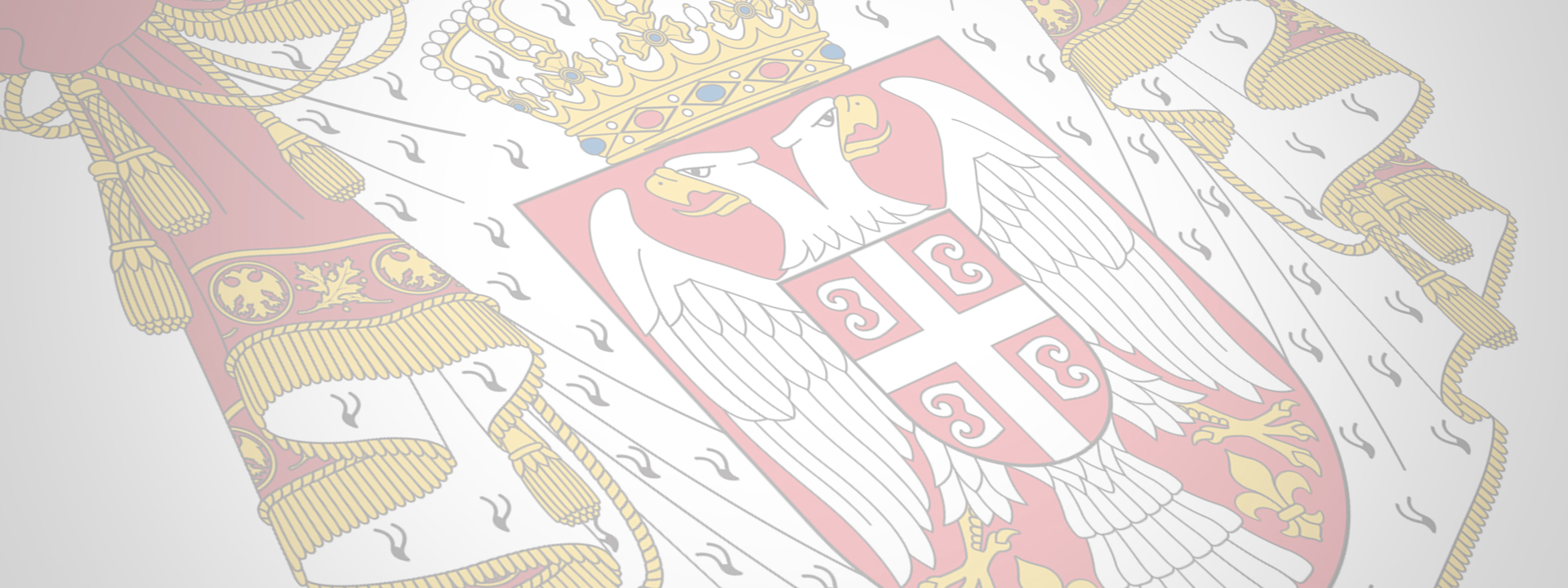
Source/Photo : www.predsednik.rs
|
|
|
| 26 September 2021 - Telephone conversation of President Vučić and General Secretary of NATO |
|
The President of the Republic of Serbia, Aleksandar Vučić, has discussed today by phone with the General Secretary of NATO, Jens Stoltenberg about, as the General Secretary said, worrisome situation in northern Kosovo and Metohija.
President Vučić said that Serbia had not violated either Brussels Agreement or Resolution 1244 by anything, by any single move or in any manner jeopardized peace preservation.
“The complete occupation by armored vehicles of northern Kosovo and Metohija has lasted for seven days and it is conducted by Priština and everyone in the international community “are thunderously silent”, said Serbian President. “However, everyone is worried all of a sudden when they spot Serbian helicopters and airplanes at the territory of central Serbia, because apparently they should not exist, or should not take off until they receive the approval from Kurti or someone from the international community”, says President Vučić.
Serbia observes all international agreements it signed, Serbia will always conduct responsibly and seriously, but Serbia is still asking when the formation of SMC will start and when Kurti’s armored units will be withdrawn from northern Kosovo and Metohija.
Finally, with the gratitude to General Secretary Stoltenberg for the fair relation and wish to listen to the Serbian side, President Vučić asked about the norm and international regulation violated by Serbia? Today, yesterday or any time?
The two interlocutors agreed to stay in constant touch due to necessity of the preservation of peace and stability in the entire region.

Source/Photo: www.predsednik.rs
|
|
|
| Le 25 septembre 2021 - Selaković à New York avec 28 ministres des Affaires étrangères sur les succès économiques de la Serbie et la situation au Kosovo-Metohija |
|

Le ministre serbe des Affaires étrangères Nikola Selaković, a déclaré à New York avoir informé les ministres des Affaires étrangères de 28 pays des succès économiques de la Serbie, mais aussi de la situation au Kosovo-Metohija, dont il a également discuté avec le ministre russe des Affaires étrangères Sergueï Lavrov, qui lui a dit que nous pouvions compter sur le soutien de la Fédération de Russie lorsqu’il s’agit des intérêts de la Serbie au Kosovo-Metohija.
Résumant les résultats de sa visite à New York dans le cadre de la session de l'Assemblée générale des Nations Unies, le ministre Selaković a dit que l'une des dernières réunions était avec le ministre Lavrov, qui était leur troisième rencontre au cours des neuf derniers mois.
Le chef de la diplomatie serbe dit qu'il a certes profité de l'occasion pour informer le ministre Lavrov des derniers développements dans le nord du Kosovo-Metohija, de la situation du dialogue entre Belgrade et Priština et de la position très claire et sans ambiguïté du président Aleksandar Vučić sur la poursuite du dialogue et des développements ultérieurs au Kosovo-Metohija.
-Nous avons parlé du soutien de principe de la Fédération de Russie, qui est constamment présente non seulement à Moscou, Belgrade, sur le terrain, mais aussi ici sur l'East River, de la part de la délégation de Fédération de Russie en tant que membre permanent du Conseil de sécurité de l'ONU. Nous continuerons certes à maintenir ce type de dialogue. Ce que le ministre Lavrov a dit, c'est que nous pouvons continuer à compter sur le soutien de la Fédération de Russie lorsqu'il s'agit de nos intérêts au Kosovo-Metohija, a souligné le ministre Selaković.
Il a déclaré avoir eu l'occasion de tenir 33 entretiens à New York, dont 28 avec des ministres des Affaires étrangères, les informant des actualités liées aux derniers développements au Kosovo-Metohija, mais aussi de notre position de principe sur le respect du droit international public, de l'intégrité territoriale et de la souveraineté.
Le ministre Selaković a déclaré que ses collègues lors des réunions ont salué le succès sérieux et fantastique de la Serbie dans la consolidation de la scène économique et dans la transformation de ce qui était au bord de l'abîme et de l'effondrement économique il y a sept ans en une économie à la croissance la plus rapide d'Europe, ce que la Serbie est en effet les deux dernières années.
Il a indiqué que la majorité des interlocuteurs soutenaient nos réformes et a exprimé un grand respect pour ce que le président Aleksandar Vučić et la Serbie avaient fait au cours de la période précédente.
Selon le chef de la diplomatie serbe, d’aucuns ont manifesté un grand intérêt pour la façon dont la Serbie a organisé la lutte contre le covid-19.
-Ce fut un véritable plaisir et fierté de représenter la République de Serbie à toutes ces réunions. Un grand nombre de mes collègues ont confirmé leur arrivée à Belgrade pour la Conférence des 11 et 12 octobre, qui est consacrée au 60e anniversaire de la fondation du Mouvement des pays non alignés, a déclaré le ministre Selaković.
Il a souligné qu'il s'agit non seulement de l'intérêt qu'ils portent à venir à Belgrade pour la conférence, mais aussi de voir et de témoigner que la Serbie, qui après plusieurs décennies d'efforts pour faire face à divers défis se remet sur pied, est économiquement consolidée et tourné vers les amis traditionnels.
-Ceci compte beaucoup et notre pays sera certainement l'un des points du globe durant le mois d'octobre qui sera le plus important pour le multilatéralisme, pour la coopération entre pays qui partagent les mêmes valeurs, ces valeurs qui sont inscrites à la Charte de l'ONU, et qui sont fondées sur la promotion et la lutte pour la paix, l'égalité, le respect du droit international public et le droit de chaque État de rechercher son chemin conformément aux souhaits de sa population vers le bonheur et une société meilleure et plus ordonnée, a déclaré le ministre Selaković.
Il a indiqué que le ministre des Affaires étrangères de l'Azerbaïdjan Ceyhun Bayramov viendrait à Belgrade pour la conférence à l'occasion de l'anniversaire du Mouvement des pays non alignés, et a souligné que nous avons une coopération stratégique et des contacts fréquents avec l'Azerbaïdjan.
-Nous avons convenu qu'après la conférence de Belgrade, nous réaliserons sa visite bilatérale en Serbie dans les meilleurs délais, a déclaré le ministre Selaković.
Il a relaté qu'il avait été convenu d'intensifier la coopération et de finaliser les accords qui devraient être signés, puis réalisés lors de la rencontre entre le président de la Serbie Aleksandar Vučić, et le président de l'Azerbaïdjan Ilham Aliyev. Le ministre Selaković dit que le ministère des Affaires étrangères s'est récemment doté de son propre secteur pour la diplomatie économique, les attentes sont élevées et l'une des tâches est d'approfondir la coopération avec l'Azerbaïdjan.
|
|
|
| Le 25 septembre 2021 - Priština a gravement mis en péril la paix et la stabilité régionale |
|
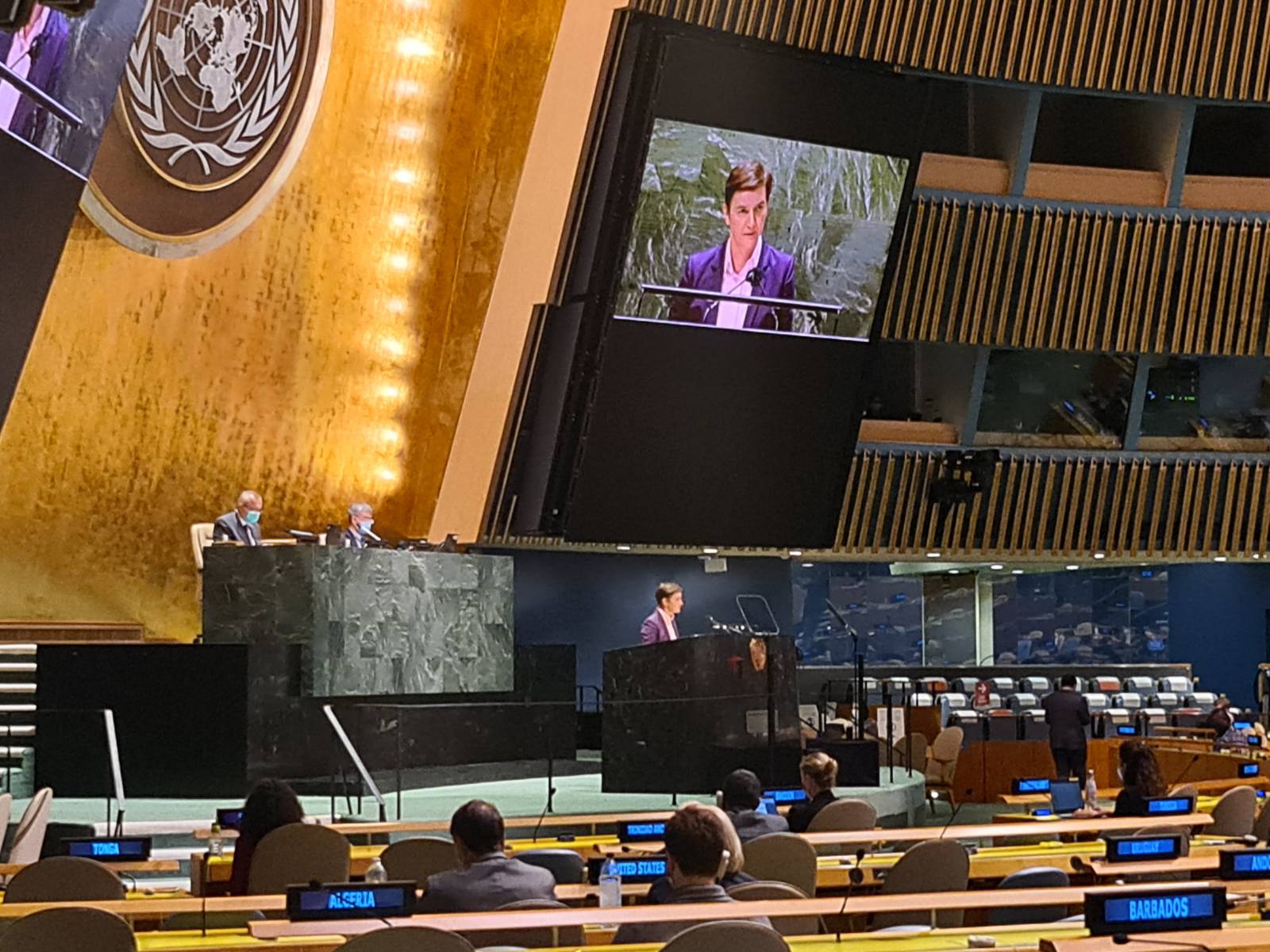
La Première ministre de la République de Serbie Ana Brnabić a averti aujourd'hui que Priština a sérieusement mis en danger la stabilité locale et régionale après avoir envoyé des unités spéciales lourdement armées dans le nord du Kosovo, qui font montre de brutalité envers la population serbe pacifique.
Brnabić a pris la parole lors du débat général des dirigeants mondiaux, dans le cadre de la 76e session de l'Assemblée générale des Nations Unies à New York. Nous relatons le discours de la Première ministre dans son intégralité:
Monsieur le Président,
Monsieur le Secrétaire général,
Excellences,
Mesdames et Messieurs,
C'est un grand honneur pour moi de m'adresser à vous aujourd'hui au nom des citoyens de la République de Serbie.
Honorables Excellences, Monseiur Abdulla Shahid, Monseiur Volkan Bozkir et Monseiur António Guterres, je tiens à vous remercier pour l’engagement actif, le dévouement et le leadership dont vous faites preuve en ces temps difficiles pour les Nations Unies et pour toute l'humanité.
La Serbie partage votre conviction et nous sommes voués pleinement et entièrement à apporter notre soutien à vos efforts.
Cette année, nous nous réunissons à un moment décisif de notre histoire.
Le Covid-19 a ébranlé nos fondements à fond.
En même temps, nous sommes témoins et ressentons de plus en plus les effets du changement climatique.
Et, enfin, nous voyons des changements importants dans les partenariats et les alliances mondiaux, des guerres commerciales entre partenaires et alliés traditionnels, le protectionnisme au lieu de l'ouverture et du marché libre, et une incertitude globale sans précédent.
Certains des problèmes pressants et hautement affectifs que nous avons localement, dans les Balkans, ne sont toujours pas résolus et alors que nous essayons - et la Serbie y est particulièrement attachée - de changer l'avenir en travaillant ensemble et en créant des alliances, par le biais d'initiatives tel le processus de Berlin ou les Balkans ouverts, d'autres tentent de perturber ces processus et au lieu de se concentrer sur l'avenir, ils veulent recréer le passé - à tout prix.
Mais permettez-moi de commencer par le sujet de Covid:
La pandémie de Covid-19 a révélé des faiblesses critiques dans l'architecture de la gouvernance mondiale. Elle a menacé d'effacer le progrès réalisé par de nombreuses nations ces dernières années.
Il a amené les nations à un carrefour entre l'isolement et la coopération, entre la panique et l'espoir, entre le chaos et l'ordre. La pandémie a remis en question certains des principes fondamentaux d'un ordre international ouvert et coopératif.
Échanges mondiaux, communication internationale, commerce transfrontalier, ils ont tous connu un énorme déclin.
Le couvre-feu, les restrictions à la liberté et le verrouillage de sociétés entières ont créé de l'incertitude dans de nombreux volets de la vie individuelle de nos citoyens ou - également - dans notre propre vision individuelle de ce que signifie la liberté dans le monde d'aujourd'hui.
Pour ce qui est de la Serbie, cette pandémie a menacé de ruiner tout ce que nous avons fait et faisons depuis 7 ans, de détruire tous les résultats et réalisations des réformes difficiles que nous avons entamées en 2014, et de nous replonger dans une époque d’un taux de chômage élevé, une dette publique croissante, un déficit incontrôlable et un désespoir généralisé.
Comme dans tous les autres pays, le Covid-19 a mis à l'épreuve à bien des égards la résilience de nos peuples et, cette fois, contrairement à l'époque de la crise financière mondiale - qui était beaucoup plus limitée dans sa portée et incomparable à la pandémie de covid-19 en termes de conséquences - la Serbie a tenu bon.
Les réformes que nous avons entreprises avant le Covid-19 nous ont rendus plus résistants que jamais.
La consolidation fiscale, l'excédent budgétaire que nous avions, un climat d'investissement efficace et prévisible sont devenus la bouée de sauvetage qui nous a sauvés de la récession pendant la pandémie et nous ont permis de soutenir nos citoyens et notre économie en ces temps les plus difficiles.
Malgré les effets de la crise, la Serbie a réussi à préserver la stabilité financière et économique. En 2020, nous avons enregistré une baisse du PIB de seulement 0,9% - ce qui était l'un des meilleurs résultats en Europe. Notre dette publique est restée inférieure à 60% de notre PIB, les salaires moyens ont continué de croître de près de 10%, tandis que le nombre d'employés a augmenté de plus de 3% malgré la pandémie.
La relance est plus forte que prévue cette année - notre croissance du PIB sera d'environ 7 %, et peut-être même plus.
Avant la pandémie, nous avons ouvert nos frontières aux investissements, à la technologie et aux idées, et nous avons réussi à créer un environnement pacifique et stable qui nous a permis de réaliser une transformation nationale rapide, fondée sur une économie basée sur l'innovation et la compétence.
Les avancées innovantes que nous avons réalisées nous ont permis de diversifier nos capacités lorsque le virus nous a frappé - grâce à l’e-gouvernement, à l'éducation en ligne et aux manuels scolaires numériques ou à un système logiciel central pour une introduction réussie de la vaccination.
Nous avons beaucoup investi dans l'infrastructure sanitaire et renforcé le système de santé pour répondre à la crise actuelle, éternellement reconnaissants aux agents de santé pour leur combat prodigue.
Notre décision de mettre la géopolitique de côté et de mettre les gens au centre de nos mesures est la raison pour laquelle nous avons pu obtenir des vaccins plus rapidement que la plupart des autres pays.
Nous n'avons pas fait de distinction entre les fabricants, il nous importait peu de savoir si les vaccins provenaient de l'Est ou de l'Ouest, mais nous avons choisi de négocier avec tous les fabricants de vaccins que les autorités réglementaires considéraient comme sûrs. Cette ouverture nous a donné la possibilité d'acheter des vaccins du monde entier, donnant à nos citoyens la liberté unique de choisir le vaccin qu'ils souhaitent principalement.
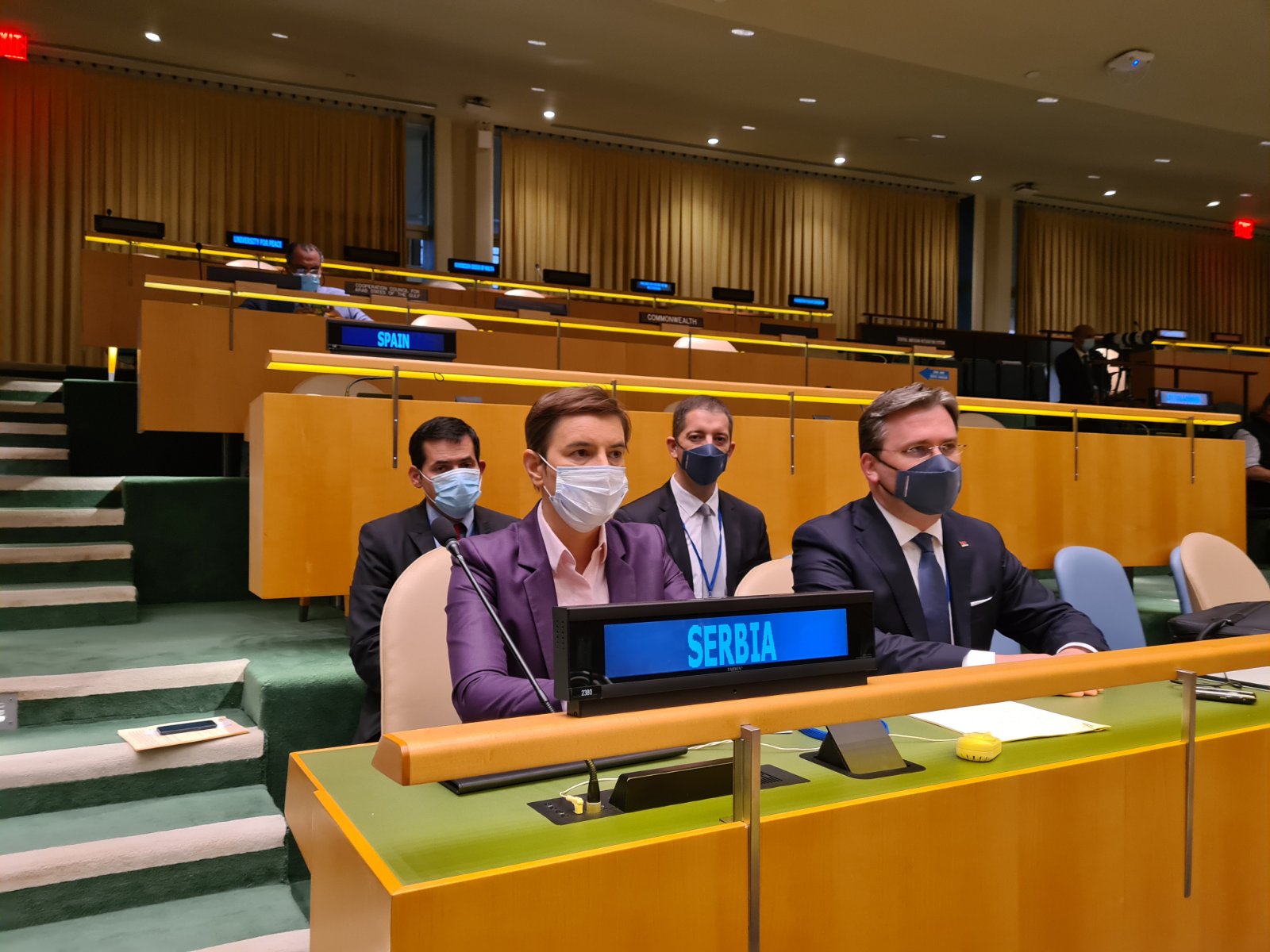
Excellences,
La Serbie croit à la solidarité entre les peuples, au multilatéralisme et à l'aide aux autres lorsqu'ils en ont besoin.
Depuis le début de cette année, nous menons la mission que nous avons choisie - soutenir nos voisins, ainsi que tous ceux qui en ont besoin, avec des vaccins contre le Covid-19, et nous avons permis à des citoyens étrangers de venir en Serbie pour recevoir un vaccin qui leur sauvera la vie.
Au total, la Serbie a fait don ou alloué plus d'un million de doses de vaccins - dont 230.000 doses pour la région; 300.000 doses pour les ressortissants étrangers venus se faire vacciner en Serbie; et 570.000 doses supplémentaires pour les pays d'Afrique et d'Asie.
Nous continuerons à le faire, dans la mesure du possible, jusqu'à ce que le Covid-19 soit derrière nous tous.
C'est pourquoi nous avons également pris des mesures pour nous procurer la technologie permettant de produire au moins deux types de vaccins anti- covid afin d'améliorer l'accès mondial, de sorte que nous puissions tous être en sécurité et nous sentir victorieux.
Toutefois, comme l'ont déclaré les officiels de certaines des plus grandes nations au cours de cette Assemblée générale, il existe d'autres questions d’actualité brûlante que nous devons tous résoudre sans plus tarder et avec courage - et c'est le changement climatique.
La Serbie a redoublé d'efforts pour rendre notre pays plus sûr et plus propre pour tous ses citoyens et, ce faisant, pour contribuer à la lutte contre le changement climatique et à la lutte pour la protection de l'environnement.
Nous sommes fermement attachés à la mise en œuvre des objectifs de développement durable et de l'Accord de Paris sur le changement climatique. Nous sommes engagés dans les efforts mondiaux et continuerons à travailler activement pour remplir nos obligations en vertu de la Convention-cadre des Nations Unies sur les changements climatiques.
Nous sommes sur le point de soumettre nos contributions déterminées au niveau national révisées à cet effort mondial critique. Nous avons déjà annoncé notre intention de réduire les gaz à effet de serre d'au moins 33,3% par rapport à 1990 et de 13,2% par rapport à 2010, que nous intégrons actuellement dans nos documents stratégiques énergie et climat.
Nous travaillons stratégiquement à la planification et à l'investissement dans ce secteur. Ces investissements sont extrêmement coûteux, il faut des années et des décennies d'engagement et une approche systématique - mais nous sommes clairement déjà sur la voie de cette transformation.
Mesdames et Messieurs,
De tous les défis auxquels nous faisons face, celui qui inquiète le plus la Serbie est le maintien de la paix et de la stabilité dans la province méridionale serbe du Kosovo-Metohija.
Depuis plus de deux décennies, nous attirons constamment l'attention de la communauté internationale sur les problèmes auxquels est confrontée la population non-albanaise au Kosovo-Metohija. La sécurité physique, le respect et la protection des droits de l'homme, notamment des communautés minoritaires, sont loin d'être satisfaisants.
Nous assistons à une augmentation constante du nombre d'attaques visant les Serbes, leurs biens et leur patrimoine religieux au Kosovo-Metohija.
À titre d'exemple, il y a eu 55 incidents de ce type en 2014, 62 en 2016, 71 en 2020 et 100 depuis le début de cette année. Le nombre total d'attaques en 2020 a été dépassé en juin déjà de cette année.
Selon les données de l'ONU, le Kosovo-Metohija est toujours le territoire avec le plus faible nombre de rapatriés (Serbes déplacés à l'intérieur du pays) de toutes les zones post-conflit dans le monde!
Je vais vous donner quelques exemples pour illustrer à quoi ressemble la vie des Serbes au Kosovo-Metohija.
Le 11 mai, la maison de Radoje Pumpalović, 81 ans, rapatrié au Kosovo-Metohija dans le village de Dubrava, municipalité d'Istok, a été attaquée. Il s'agissait de la 5e attaque contre lui la même année. Je le répète… il a 81 ans.
Depuis juin 2021, plusieurs attentats ont été perpétrés contre Dragica Gašić, une femme de 59 ans, la première serbe rapatriée à Đakovica après 22 ans depuis la fin du conflit. Les attaques comprennent la lapidation de son appartement, l'interdiction d'acheter des vivres dans une épicerie locale et des pétitions d'organisations de la société civile exigeant son expulsion de la ville.
Le 2 juillet, dans le village de Gojbulji près de Vučitrn, un groupe d'Albanais a attaqué Nikola Perić, 13 ans. L'attaque s'est produite alors qu'il rentrait chez lui de la cour de l'école avec trois camarades.
Les attaques contre les églises, monastères et monuments médiévaux serbes au Kosovo-Metohija en font l'un des sites du patrimoine culturel les plus menacés d'Europe.
Le monastère de Visoki Dečani a récemment été classé sur la liste d’Europa Nostra comme l'un des 7 sites du patrimoine les plus menacés d'Europe en 2021. Le groupe consultatif d’Europa Nostra a déclaré que Dečani est le seul monument en Europe sous forte protection militaire permanent pendant 20 ans malgré le fait qu'il s'agit d'un monument de la plus grande importance historique et culturelle pour l'Europe et le monde.
Cette spirale de violence qui se déroule au Kosovo-Metohija a culminé en ce début de semaine. Sous prétexte de mettre en œuvre de nouvelles règles pour les plaques d'immatriculation des voitures, Priština a déployé des unités spéciales lourdement armées dans le nord de la province.
Il s'agit d'une autre violation brutale de l'Accord de Bruxelles, et cette démonstration de force irrationnelle a déclenché une crise plus grave. Elle a perturbé la livraison de vivres et de médicaments aux communautés serbes du nord de la province. Les Serbes locaux qui se sont rassemblés pacifiquement pour protester contre cette mesure ont été accueillis par des gaz lacrymogènes et des brutalités policières, ce qui menace sérieusement la stabilité locale et régionale.
Malgré tous les défis et les provocations quotidiennes, la Serbie reste fermement engagée à trouver une solution basée sur le compromis, qui assurera une paix durable et soutenable.
Le dialogue et la mise en œuvre des accords conclus - sont la seule bonne façon de résoudre tous les problèmes ouverts.
Mais, près de 9 ans après la conclusion de l'Accord de Bruxelles, premier accord de normalisation entre Belgrade et Priština, la création de l'Association des municipalités serbes - l'épine dorsale de cet accord - n'a même pas commencé.
Je voudrais une fois encore lancer un appel à la communauté internationale, et en particulier à l'Union européenne en tant que garante de l'Accord de Bruxelles, pour qu'elle insiste fermement à ce que les institutions intérimaires du gouvernement autoproclamé de Priština se mettent à appliquer tous les accords conclus.
La République de Serbie, défendant sa souveraineté et son intégrité territoriale, défend en même temps le droit international, la Charte des Nations Unies, la résolution 1244 juridiquement contraignante du Conseil de sécurité des Nations Unies et l'autorité suprême du Conseil de sécurité lorsqu'il s'agit de préserver la paix et la sécurité internationales.
Nous accordons une attention particulière à l'importance des activités de la mission de l'ONU au Kosovo-Metohija et nous nous attendons à ce qu'elle poursuive la mise en œuvre de son mandat dans la province conformément à cette résolution.
Chers amis,
Notre génération partage le destin commun du monde moderne, qui devient de plus en plus complexe en termes de géopolitique, de technologie, de santé, de climat. Face à de tels défis, la Serbie continuera à entretenir des partenariats sur une base prévisible et transparente.
Nous continuerons à mettre en œuvre les réformes de l'État de droit sur notre voie vers l'UE, qui est notre objectif stratégique de politique étrangère. Nous considérons cet objectif comme indissociable de la réalisation d'une paix, d'une stabilité et d'une prospérité durables.
Nous serons hôtes, avec la République d'Azerbaïdjan, qui préside actuellement le Mouvement des non-alignés, d’un événement commémoratif de haut niveau célébrant le 60e anniversaire de la Première conférence du Mouvement des non-alignés, tenue à Belgrade en 1961. Nous nous réjouissons d’avance d'accueillir à Belgrade en octobre prochain nos amis des quatre coins du monde.
Nous renforcerons encore la coopération dans l'ensemble des Balkans, par le biais de l'initiative Les Balkans ouverts et le Processus de Berlin, en ouvrant les frontières, en réconciliant les différences et en intégrant davantage notre région.
Pour conclure,
Au cours des 7 dernières années, la Serbie s'est transformée: nous avons lancé une reprise économique, créé des opportunités pour les jeunes, encouragé un boom technologique et amélioré la position de la Serbie à l'étranger. Les progrès que nous avons réalisés ont permis à la Serbie de faire face plus fermement et de survivre à la pandémie.
Le monde est maintenant confronté à un tournant. La reprise après le Covid-19 et la relance durable ne seront pas possibles si les problèmes, anciens et nouveaux, ne sont pas résolus par des forces conjointes et des actions internationales collaboratives.
Nous avons tiré un enseignement important de cette pandémie: si nous ne sommes pas tous en sécurité, personne n'est en sécurité - donc, soit nous pouvons gagner tous ensemble, nous tous - peu importe que nous soyons riches ou pauvres, grands ou petits, d'Europe, d'Asie, d’Afrique, d’Amérique, d’Australie, soit échouer tous ensemble.
Toujours est-il, la pandémie de Covid-19 et le problème du changement climatique auraient dû nous apprendre au moins à nous tenir les uns aux autres.
Je vous remercie.
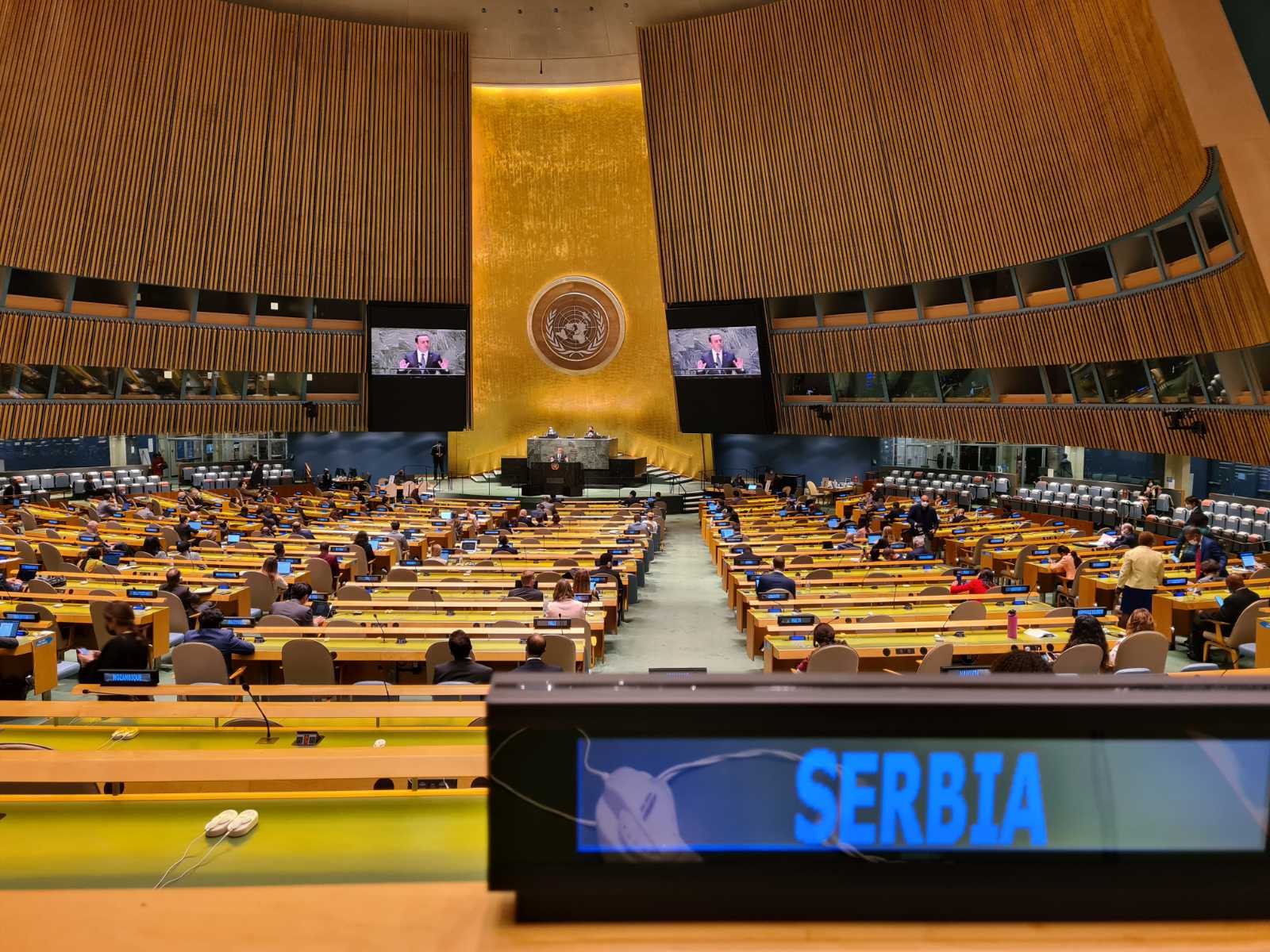
Source: www.srbija.gov.rs
|
|
|
| 25 September 2021 - Pristina seriously jeopardised regional stability |
|

Prime Minister Ana Brnabic warned today that Pristina has seriously jeopardised local and regional stability after sending heavily armed special units to the north of Kosovo who are exerting against the peaceful Serbian population.
Brnabic spoke at the general debate of world leaders, as part of the 76th session of the UN General Assembly in New York.
We bring the Prime Minister's speech in its entirety:
Mr. President,
Mr. Secretary General,
Excellencies,
Ladies and gentlemen,
I have the great honor to address you today on behalf of the citizens of the Republic of Serbia.
Esteemed Excellencies Mr. Abdulla Shahid, Mr. Volkan Bozkir and Mr. António Guterres, I would like thank you for the active engagement, dedication, and leadership you have shown during these difficult times for the United Nations and all of humanity.
Serbia shares your conviction and we remain fully committed to supporting your efforts.
This year, we come together at a decisive moment in our history.
Covid-19 has shaken our foundations to the core.
At the same time, we are increasingly witnessing and experiencing effects of climate change.
And, finally, we are seeing significant shifts in global partnerships and alliances, trade wars between traditional partners and allies, protectionism instead of openness and free market, and overall uncertainty at an unprecedented scale.
Some of the pressing and extremely emotional issues that we have locally, in the Balkans, are still unresolved and while we are trying – and Serbia is especially dedicated to this – to change the future by working together and creating alliances, through initiatives such as the Berlin process or Open Balkan, others are trying to disrupt these processes, and instead of focusing on the future, they want to recreate the past – whatever the cost of that may be.
But, let me start with COVID:
COVID-19 pandemic has exposed critical weaknesses in the architecture of global governance. It has threatened to erase the progress many nations have achieved in recent years.
It has placed nations at a junction between isolation and collaboration, between panic and hope, between chaos and order.
The pandemic questioned some of the basic tenets of the open and cooperative international order.
Global exchanges, international communication, cross-border trade have all seen a vast decrease.
Curfews, restrictions on freedom and lockdowns of entire societies have created uncertainty in many segments of the individual lives of our citizens or – for that matter – our own individual perception of what freedom in today’s world even means.
For Serbia, this pandemic threatened to undermine everything we have been doing for the past 7 years, to crush all of the results and accomplishments of difficult reforms we initiated in 2014, and to propel us back to the times of high unemployment, rising public debt, uncontrollable deficit, and overall desperation.
Much as in any other country, COVID-19 has tested our nations’ resiliency and, this time, unlike during the global financial crisis – which was of much more limited scope and incomparable in consequences to COVID-19 pandemic – Serbia stood strong.
The reforms we undertook in the pre-COVID times made us more resilient than ever.
The fiscal consolidation, the budget surplus we had, efficient and predictable investment environment, became a lifeline that saved us from a recession during the pandemic and one that ensured we could support our citizens and our economy during these, most difficult of times.
Despite the effects of the crisis, Serbia has managed to preserve financial and economic stability. In 2020, we recorded a decline in GDP of only 0.9% – one of the best results in Europe. Our public debt remained below 60% of our GDP, average salary continued to grow by almost 10%, while despite the pandemic the number of people employed increased by over 3%.
The recovery in this year has been stronger than expected – our GDP will grow approximately 7%, and perhaps even stronger.
Prior to the pandemic, we have opened our borders to investment, technology, and ideas, and we managed to create peaceful and stable environment that allowed us to pursue rapid domestic transformation, with innovation and knowledge-based economy as the foundation.
The innovative advances we had made allowed us to diversify our capabilities when the virus hit – through e-Government, online education and digital textbooks, or central software system for a successful vaccination rollout.
We invested heavily in health infrastructure and strengthened the health system in order to respond to the current crisis, eternally grateful to the health care workers for their dedicated struggle.
Our decision to put geopolitics aside, and people at the center of our policies, is the reason we were able to acquire vaccines quicker than most other nations.
We did not discriminate between manufacturers, did not care whether vaccines are from the East or from the West, but chose to negotiate with all vaccine manufacturers deemed safe by regulators. This openness gave us the ability to purchase vaccines from around the world, giving our citizens the unique freedom to choose which vaccine they prefer.

Excellencies,
Serbia believes in solidarity between nations, multilateralism and helping others when in need.
Since the beginning of this year, we have made it our mission to support our neighbors, and all those in need, with COVID-19 vaccines and we have also allowed foreign nationals to come to Serbia to receive the vaccine which will protect their lives.
In total, Serbia has donated or allocated over a million doses of vaccines – of which 230.000 doses to the region; 300.000 doses for foreign nationals which came to Serbia to get vaccinated; and additional 570.000 doses to countries of Africa and Asia.
We will keep doing so, to the greatest extent possible, and until COVID-19 is behind all of us. That is why we have also taken steps to acquire the technology to produce at least two types of COVID-19 vaccines to help improve global access so we can all be safe and victorious.
However, as stated by dignitaries of some of the largest nations during this General Assembly, there are other pressing issues that all of us need to keep addressing without any delay and in a bold manner – and that is climate change.
Serbia has redoubled its efforts to make our country safer and cleaner for its citizens, and by doing so, contribute to the fight against climate change and for environmental protection.
We are strongly committed to the implementation of the sustainable development goals and the Paris Agreement on Climate Change.We are committed to global efforts and will continue to work actively to meet our obligations under the UN Framework Convention on Climate Change.
We are about to submit our revised Nationally Determined Contributions to contribute to this critical global effort. We have already announced our intention to reduce greenhouse gasses for at least 33.3% compared to 1990, and 13.2% compared to 2010, which we are currently incorporating into our energy and climate strategic documents.
We work strategically on planning and investments in this sector. These investments are extremely expensive, requiring years and decades of commitment and a systemic approach - but we are clearly set on the path of this transformation.
Ladies and gentlemen,
Of all the challenges we face, the most worrisome for Serbia is the maintenance of peace and stability in the southern Serbian province of Kosovo and Metohija.
For more than two decades, we have been constantly drawing international attention to the problems that non-Albanian population is facing in Kosovo and Metohija. Physical safety, respect for and protection of human rights, especially of minority communities, are far from satisfactory.
We are now witnessing a constant increase in the number of attacks targeting Serbs, their property and religious heritage in Kosovo and Metohija.
To illustrate, there were 55 such incidents in 2014, 62 in 2016, 71 in 2020, and 100 since the beginning of this year.The total number of attacks in 2020 has already been surpassed by June of this year.
According to the UN, Kosovo and Metohija is still the territory with the least number of returnees (internally displaced Serbs) of all post-conflict areas in the entire world!
I will give you just a few examples to depict how life of Serbs in Kosovo and Metohija looks like.
On the 11th of May the house of Radoje Pumpalović, 81-years old returnee to Kosovo in the village of Dubrava, in Istok municipality, was attacked. This was the 5th attack on him in the same year. Again… he is 81 years old.
Since June 2021, multiple attacks were carried out against Dragica Gašić, 59-years old woman, the first Serb returnee in Đakovica after 22 years since the end of the conflict. Attacks include stoning of her apartment, banning her from shopping for food in the local store and petitions by civil society organization demanding her eviction from the city.
On 2nd of July, in the village of Gobulji near Vučitrn, a group of Albanians attacked 13-year old Nikola Perić. The attack occurred when he was returning home from the school playground with three friends.
Attacks on Serbian medieval churches, monasteries and monuments in Kosovo and Metohija, make them some of the most endangered cultural heritage sites in Europe.
Monastery Visoki Dečani was recently listed, by Europa Nostra, as one of the 7 Most Endangered Heritage Sites in Europe in 2021. The Advisory Panel of Europa Nostra noted that Dečani is the only monument in Europe under robust military protection for a continuous period of 20 years, although it constitutes a monument of ultimate historical and cultural importance for Europe and the world.
This spiral of violence occurring in Kosovo and Metohija culminated at the beginning of this week. On the pretext of enforcing new license plate rules, Priština dispatched heavily armed special units to the north of the province. This is yet another brutal violation of the Brussels Agreement, and this irrational show of force has ignited a major crisis. It disrupted the supply of food and medication to Serb communities in the north of the province. Local Serbs who peacefully gathered to protest this measure were met with tear gas and police brutality, thus seriously threatening local and regional stability.
Despite of all the challenges and daily provocations, Serbia remains strongly committed to finding a compromise-based solution that will ensure lasting peace and stability.
Dialogue and the implementation of the agreements reached – are the only proper way to resolve all open issues.
However, almost 9 years after reaching the Brussels Agreement, as the 1st agreement on normalization between Belgrade and Priština, the establishment of the Community of Serb Municipalities – the backbone of this agreement – has not yet even begun.
I would like to appeal, once again, to the international community, and especially the European Union, as the guarantor of the Brussels Agreement, to firmly insist that the Provisional Institutions of Self-Government in Priština start implementing all of the agreements reached.
The Republic of Serbia, by defending its sovereignty and territorial integrity, at the same time defends international law, the UN Charter, legally binding UN Security Council Resolution 1244, and the supreme authority of the Security Council when it comes to the preservation of international peace and security.
We attach special importance to the activity of the UN mission in Kosovo and Metohija and expect it to continue to implement its mandate in the Province in accordance with this resolution.
Dear friends,
Our generation shares the common destiny of the modern world, which is becoming increasingly complex in terms of geopolitics, technology, health, climate. In the face of these challenges, Serbia will continue nurturing international partnerships, on a predictable and transparent basis.
We will continue pursuing the rule of law reforms on our EU path, which is our strategic foreign policy goal. We see this as inseparable from achieving sustainable peace, stability and prosperity.
We will host, together with the Republic of Azerbaijan as the current chair of the Non-Aligned Movement, a commemorative high-level event marking the 60th anniversary of the First Non-Aligned Movement Conference, which was held in Belgrade in 1961. We are very much looking forward to hosting our friends from all parts of the world in Belgrade in October this year.
We will further enhance cooperation across the Balkans, through the Open Balkan initiative and Berlin process, by opening borders, harmonizing differences, and further integrating our region.
In conclusion,
Over the past 7 years, Serbia has been transformed: we sparked an economic revival, created opportunities for young people, cultivated a tech boom, and improved Serbia’s position abroad. The progress we have made has allowed Serbia to better face and survive the pandemic.
The world now faces a turning point. The recovery from COVID-19 and sustainable reconstruction will not proceed if issues, new and old, are not handled by joint forces and collaborative international actions.
This pandemic taught us one important lesson: unless all of us are safe, no one is safe – so we can either win together, all of us – regardless of how rich or poor, large or small, from Europe, Asia, Africa, America or Australia, or fail together.
But, if anything, the COVID-19 pandemic, as well as the issue of climate change, should have taught us to stand together.
Thank you.

Source: www.srbija.gov.rs
|
|
|
| 22/09/2021 - Première ministre Brnabić au Sommet mondial virtuel sur la COVID-19 organisé par la Maison Blanche |
|
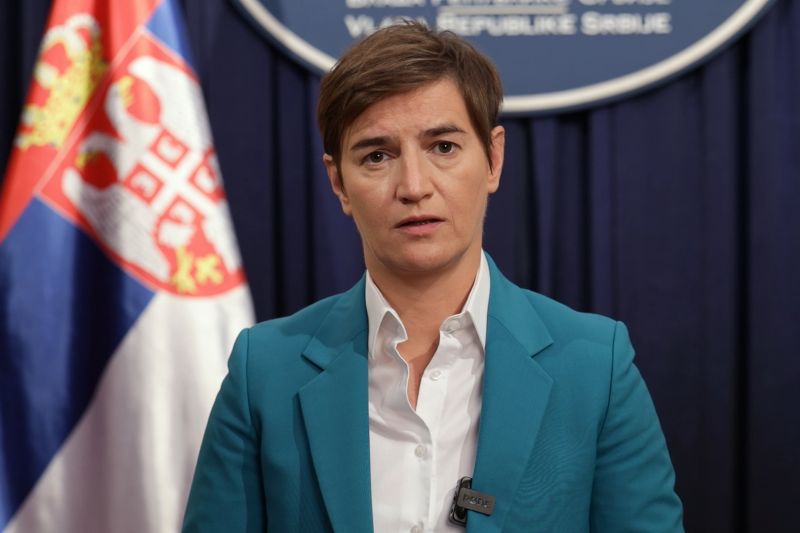
La Première ministre de la République de Serbie Ana Brnabić a participé aujourd’hui par un message vidéo au Sommet mondial virtuel sur la covid-19 organisé par la Maison Blanche, et ouvert par le président des États-Unis Joseph Biden.
Le sommet virtuel rassemble par visio-conférences un grand nombre de dirigeants mondiaux et de responsables d'organisations internationales, dont le secrétaire général de l'ONU Antonio Guterres, la présidente de la Commission européenne Ursula von der Leyen, les premiers ministres britannique et canadien Boris Johnson et Justin Trudeau, la chancelière allemande Angela Merkel et beaucoup d'autres.
Dans son message la Première ministre souligne que la Serbie est parmi les premiers pays européens à se procurer les vaccins anti-covid et qu'elle est le premier Premier ministre européen à recevoir le vaccin.
Grâce à des années d'investissement dans la numérisation et le développement de l’e-gouvernement, nous avons réussi à organiser un processus de vaccination compliqué et complexe de manière très efficace et axée sur les citoyens, a-t-elle expliqué.
Toutefois, comme elle l'a ajouté, dès le début, nous étions conscients que ce n'était pas seulement l'affaire de nos concitoyens et seulement notre lutte. Dans la lutte contre la pandémie de covid-19, nous sommes tous en sécurité ou personne n'est en sécurité.
C'est pourquoi, en plus de procurer des vaccins à nos citoyens, nous avons fait don de vaccins aux citoyens des Balkans occidentaux, mais aussi à d'autres pays, a-t-elle rappelé, précisant que la Serbie a fait don de 230.000 doses de vaccins à la région, nous avons vacciné des citoyens étrangers en Serbie avec environ 300.000 doses et nous avons assigné 570.000 doses de vaccins pour les pays d'Afrique et d'Asie.
Brnabić a indiqué que la Serbie a déjà commencé la fabrication de vaccin anti-covid d'un fabricant et qu'elle commencera la production d'un autre d'ici la fin de l'année, car de cette façon, nous voulons aider et soutenir toutes les personnes et tous les pays qui ont besoin de vaccins.
Il s'agit d'une pandémie dans laquelle nous gagnerons ou perdrons ensemble, mais nous devons nous battre ensemble, a réitéré la Première ministre.
C'est pourquoi la Serbie soutient les objectifs de ce sommet mondial, a-t-elle souligné et exprimé sa gratitude aux États-Unis d'Amérique et au président Biden d’avoir organisé ce sommet et soutenu les efforts conjoints dans la lutte contre la pandémie de covid-19.
Les vaccins sont la seule issue dans la lutte contre la pandémie, a conclu Brnabić.
Source/Photo: www.srbija.gov.rs |
|
|
| 22 September 2021 - Prime Minister Brnabic at Global COVID-19 summit organised by White House |
|

Prime Minister Ana Brnabic participated today at the Global COVID-19 summit, organised by the White House, which was opened by US President Joseph Biden.
The video messages are attended by a large number of world leaders and officials of international organizations, including UN Secretary General Antonio Guterres, European Commission President Ursula von der Leyen, British and Canadian Prime Ministers, Boris Johnson and Justin Trudeau, German Chancellor Angela Merkel and many others.
In the message, the Prime Minister pointed out that Serbia was among the first European countries to procure a covid vaccine, and that she was the first European Prime Minister to receive the vaccine.
Thanks to years of investment in digitalisation and development of eGovernment, we have managed to organise a complicated and complex vaccination process very efficiently and in a way that it is focused on citizens, she explained.
However, as she added, from the very beginning we were aware that this is not just a matter of our citizens and only our struggle. In the fight against the COVID-19 pandemic, we are all safe or no one is safe.
That is why, in addition to procuring vaccines for our citizens, we donated vaccines to the citizens of the Western Balkans, but also to other countries, she reminded and specified that Serbia donated 230,000 doses of vaccines to the region, we vaccinated foreign citizens in Serbia with approximately 300,000 doses and set aside we have 570,000 doses of vaccines for countries in Africa and Asia.
Brnabic mentioned that Serbia has already started the production of covid vaccine from one manufacturer, and that it will start production from another by the end of the year, because in that way we want to help and support all people and countries that need vaccines.
This is a pandemic in which we will either win together or lose together, but we must fight together, the Prime Minister repeated. That is why Serbia supports the goals of this global summit, she emphasised, and expressed her gratitude to the United States of America and President Biden for organising the summit and supporting joint efforts in the fight against the COVID-19 pandemic.
Vaccines are the only way out in the fight against the pandemic, concluded Brnabic. |
|
|
| АMBASSADOR ĐUROVIĆ HANDED THE INVITATION LETTER ON THE OCCASION OF THE 60th ANNIVERSARY OF THE FIRST CONFERENCE OF THE NON-ALIGNED MOVEMENT TO THE SECRETARY GENERAL OF THE COUNCIL OF EUROPE |
|
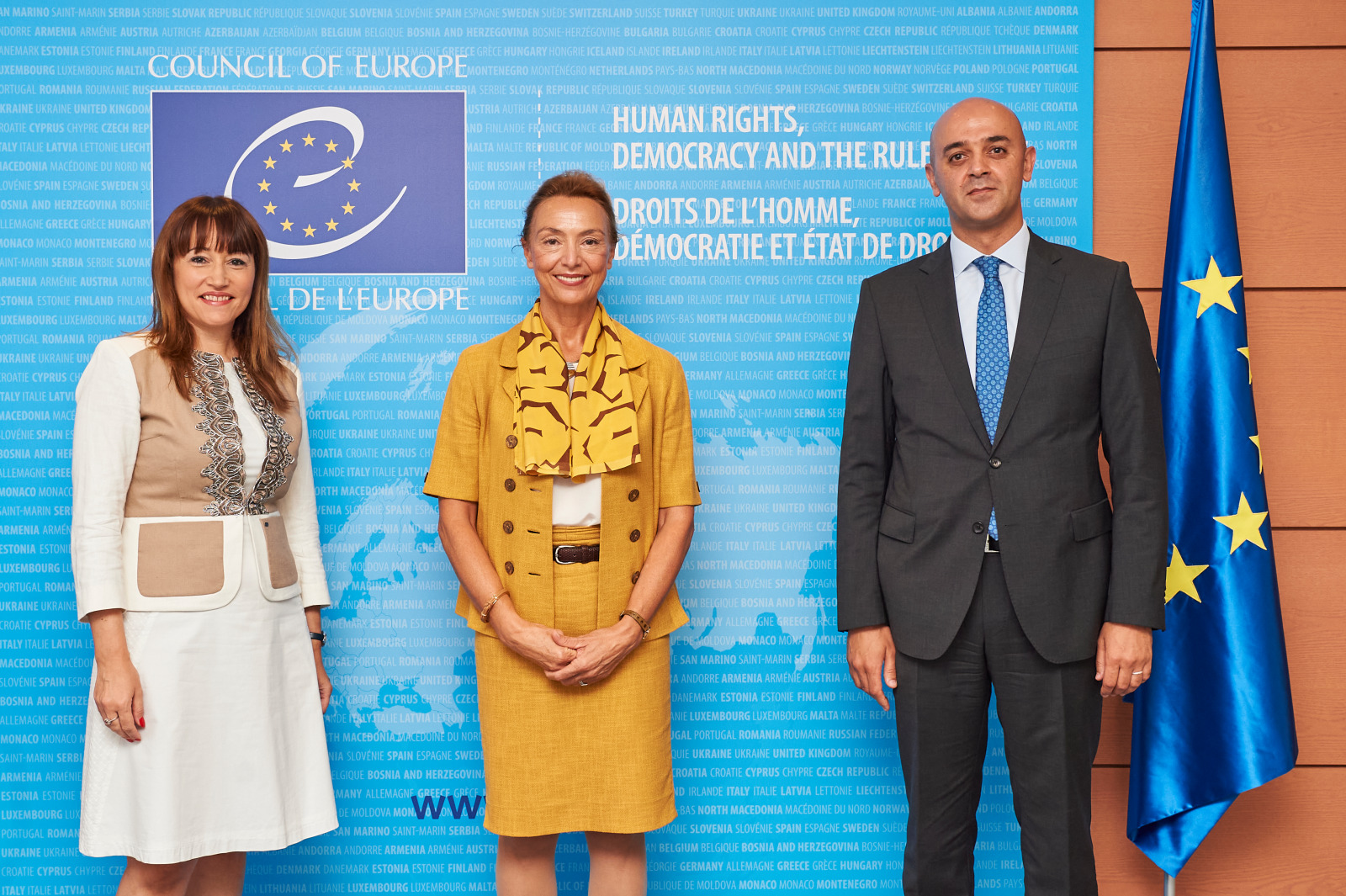
Ambassador Đurović met with Marija Pejčinović Burić, Secretary General of the Council of Europe, and on that occasion, together with F. Ismayilov, Ambassador of Azerbaijan to the Council of Europe, handed the invitation letter on the occasion of the celebration of the 60th anniversary of the First Conference of the Non-Aligned Movement, which was held in Belgrade in 1961.
During the meeting the Ambassador informed that Serbia would organize thаt important jubilee of non-aligned together with Azerbaijan, which is currently chairing the NAM, in Belgrade on 11 and 12 October 2021.
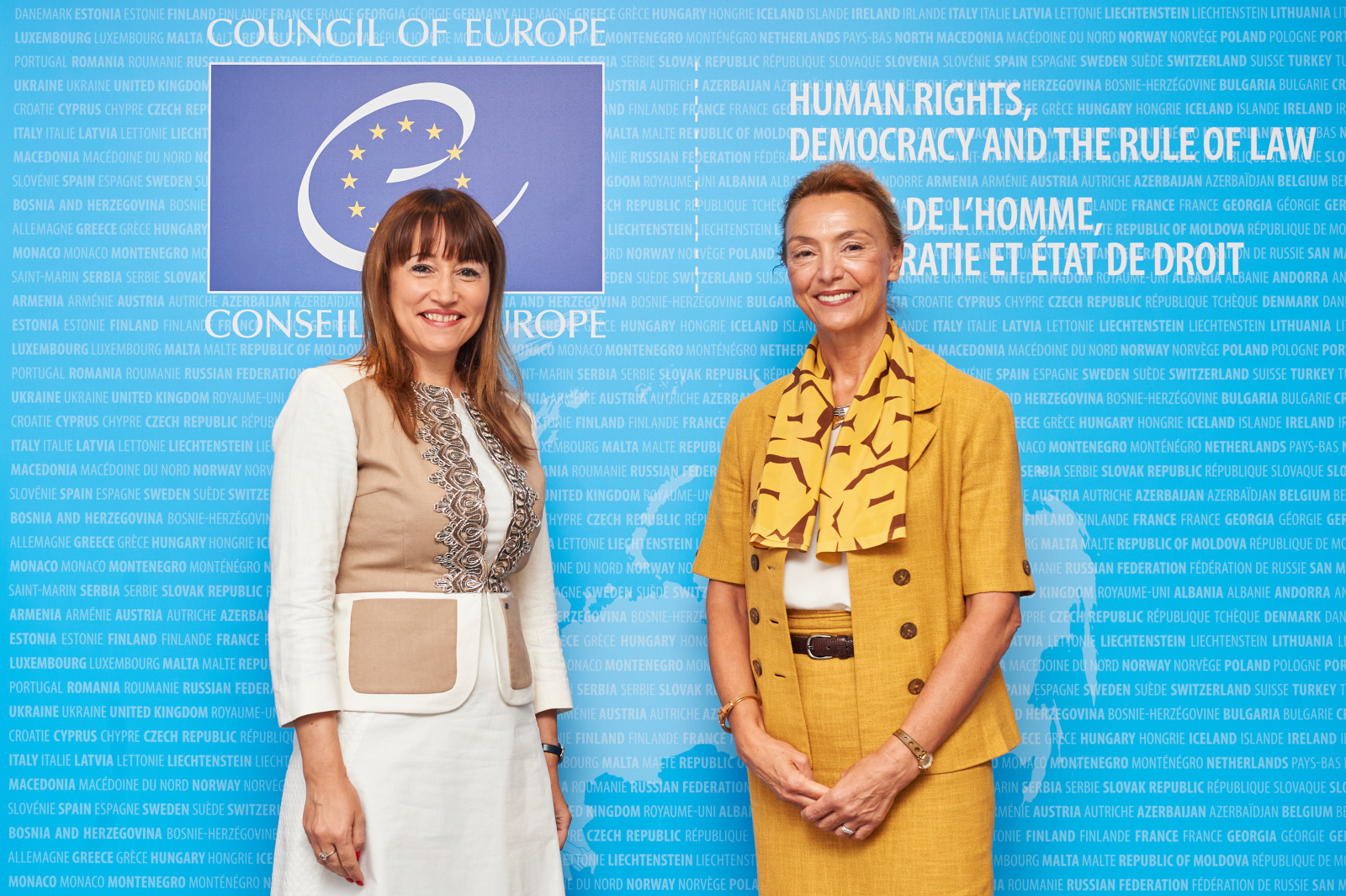
|
|
|
| Ambassador Djurović participated in the exchange of views with the Vice-President of the Venice Commission |
|
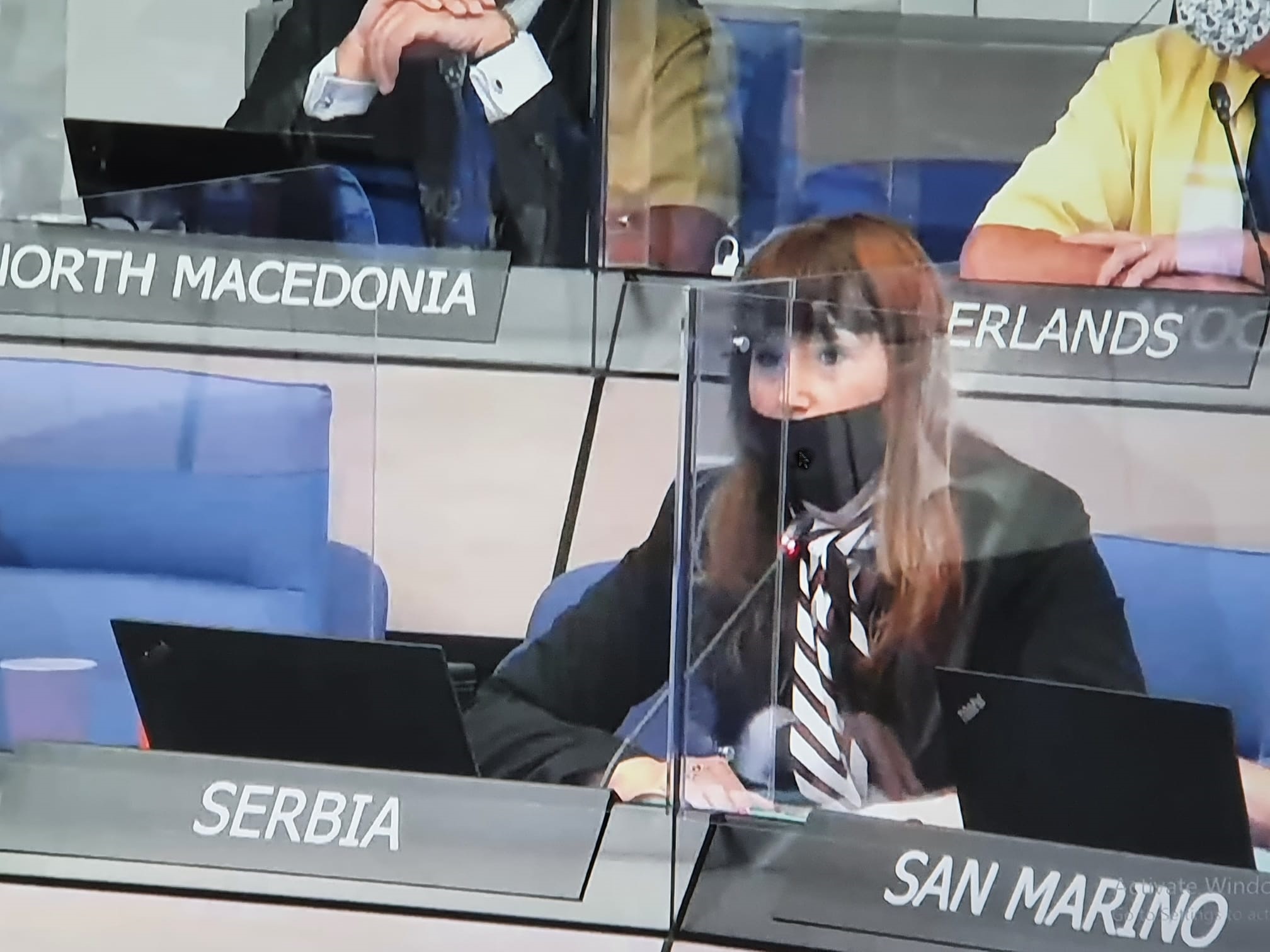
At 1410th CM Meeting, which was held on 8th September 2021, Ms. Claire Bazy Malaurie, Vice-President of the Venice Commission, presented the Annual report of activities 2020.
At the same meeting Ambassador Đurović shared relevant information about the intensive and rewarding cooperation between Serbia and the Venice Commission. She informed that around a month ago the Ministry of Public Administration and Local Self-Government of Serbia had requested an opinion on the Draft Law on Referendum and Civil Initiative, that in that framework a series of online meetings had been organized on 3rd September with the representatives of the mentioned Ministry, the Ministry of Justice, the Republic Electoral Commission and the National Assembly, among others.
She also informed that a meeting with the relevant Serbian authorities had been organized in July in the framework of the preparation of the Draft Urgent Opinion on the Constitutional Reform. She stated that at the end of September a delegation of Venice Commission would visit Belgrade with the same aim. She reminded that an Opinion on the Draft Amendments to the Constitutional Provisions on the Judiciary had been adopted by the Venice Commission at its 115th Plenary Session in June 2018. She called the Venice Commission to give a positive opinion on the Draft Amendments on the Constitutional Provisions during its next Plenary Meeting.
|
|
|
| Marquant le Jour du Souvenir de tous les Serbes morts et expulsés dans l'Opération « Tempête » |
|
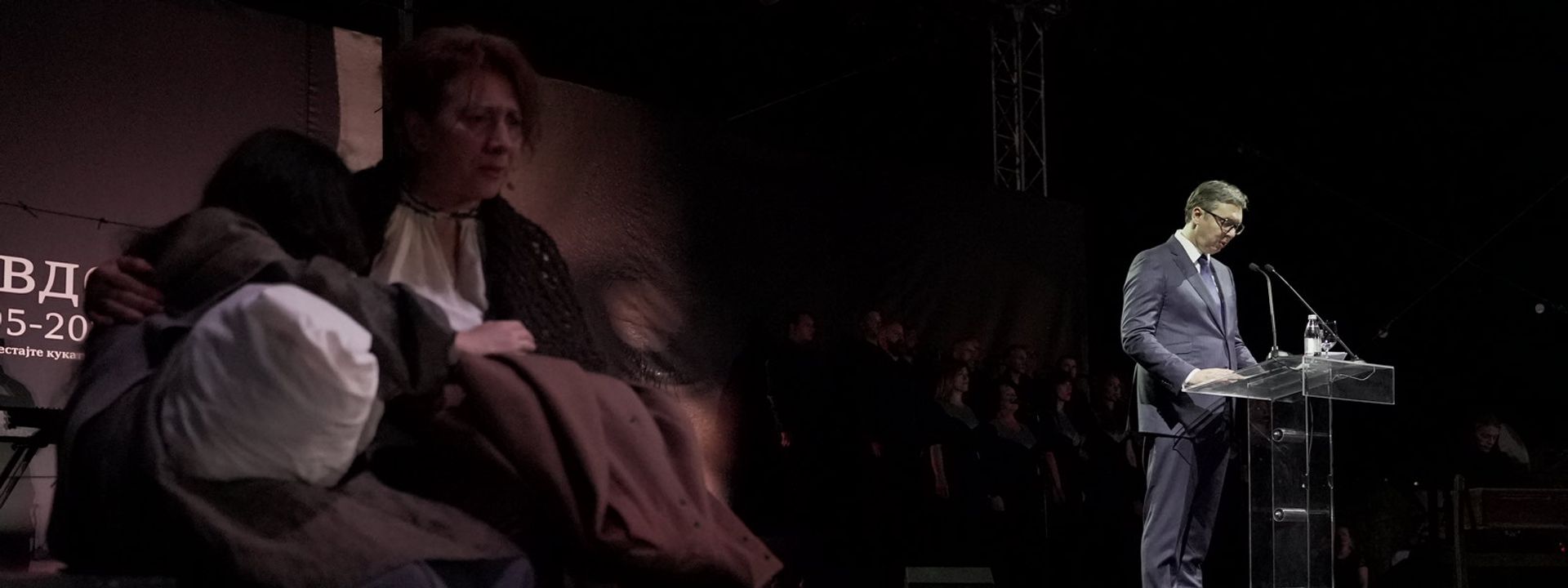
Le président de la République de Serbie, Aleksandar Vučić, il a assisté à la célébration du Jour du Souvenir de tous les Serbes morts et expulsés dans l'Opération « Tempête » et il a déclaré que la Serbie se souvient !
« Aujourd'hui, alors que nous nous souvenons à nouveau de ce qui s'est passé en Août 1995, d’un terrible pogrom, de l'expulsion de plus de 250 000 Serbes, de l'exode et du nettoyage ethnique, nous nous rappelons également qui nous sommes, ce que nous sommes, d'où nous venons et où nous allons. Merci à tous d'être ici avec nous ce soir et d'avoir montré à quel point nous aimons notre peuple. » a déclaré le président Vučić et il a ajouté que nous n'oublierons pas tout ce que le peuple de la Krajina a dû traverser.
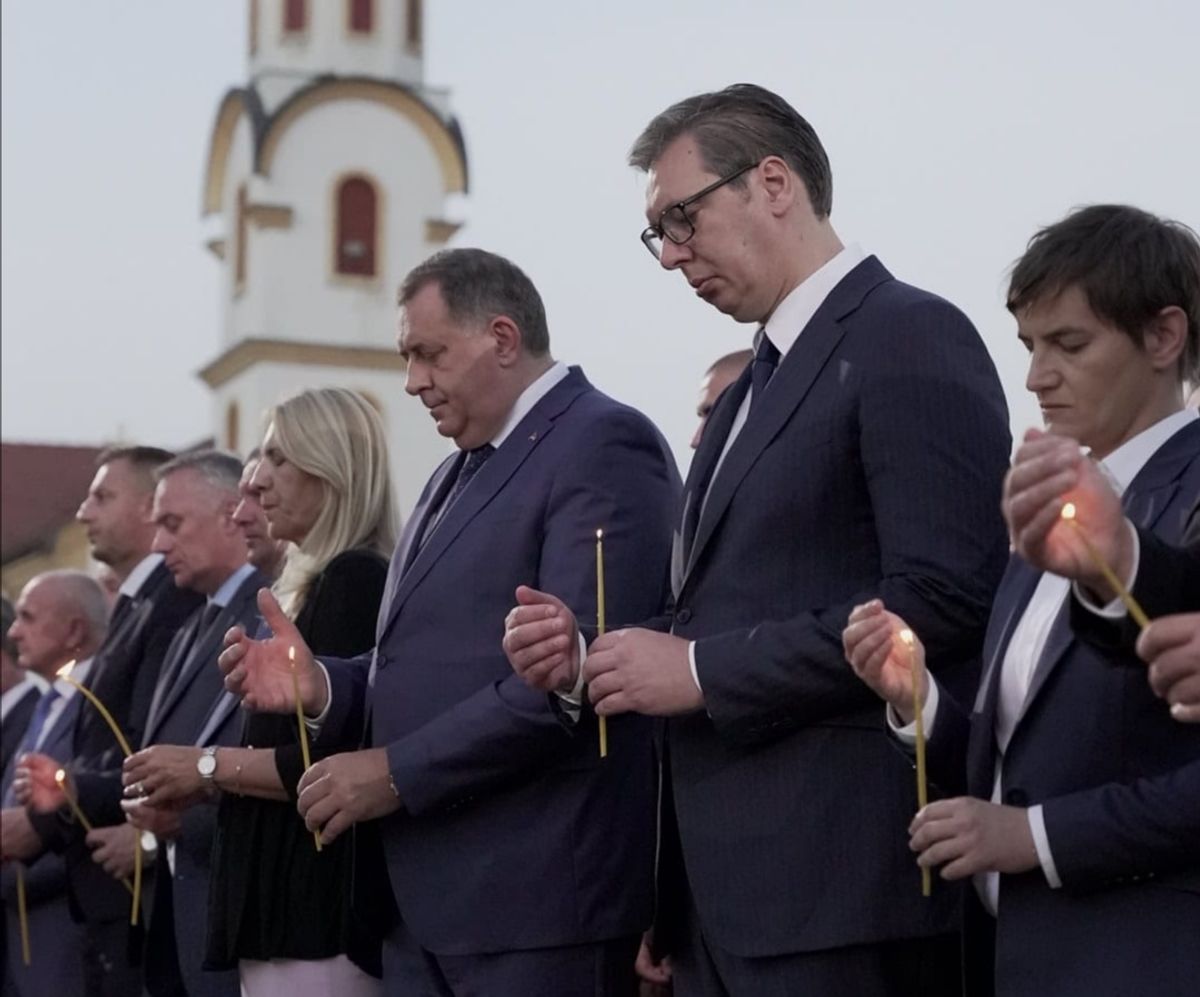
« Pour nous, ce n’est pas seulement un nombre terrible de victimes. » a déclaré le président Vučić et il a souligné que la Serbie n'oubliera jamais cet évènement.
« L'histoire ne s'est jamais refaite comme aujourd'hui. C'est pourquoi je voudrais nous rappeler à tous, non seulement ce que les autres nous ont fait, ne pas vouloir exister, mais aussi à ce que nous avons fait à nous-mêmes, comme si on ne voulait pas exister. » a déclaré le président et il a mentionné qu'il ne doit plus jamais arriver que la Serbie oublie ses héros silencieux.
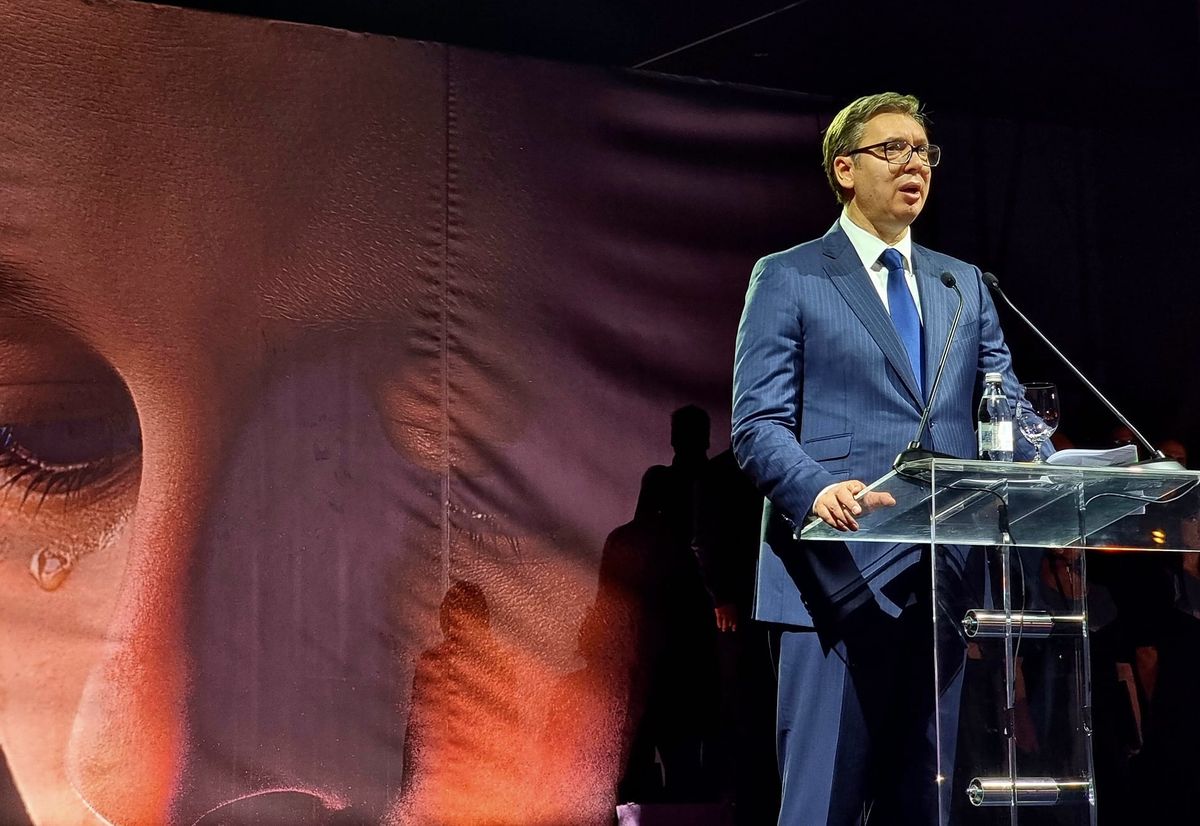
Le président Vučić a souligné que nous ne devons plus jamais nous couvrir les yeux, les oreilles et la bouche, devant quelque chose qui était un pogrom et une chute de toute humanité.
« Ne reconnaissant pas que cet événement s'est produit c’est un crime, n'est pas seulement contre les victimes, mais aussi contre nous-mêmes, contre chaque Serbe vivant, contre les gens de Krajina, contre la Serbie et son avenir. » a déclaré le président Vučić et il a souligné que les gens, seulement s'ils ont des souvenirs, peuvent se tenir la tête haute et vivre avec eux-mêmes et avec les autres sans écart, peur et doute.
Le président Vučić a souligné que la Serbie doit lutter pour la paix et pour les berceaux des enfants, ainsi que l'oubli nous annule et nous efface de l'histoire et de l'avenir, nous privant du droit au futur.
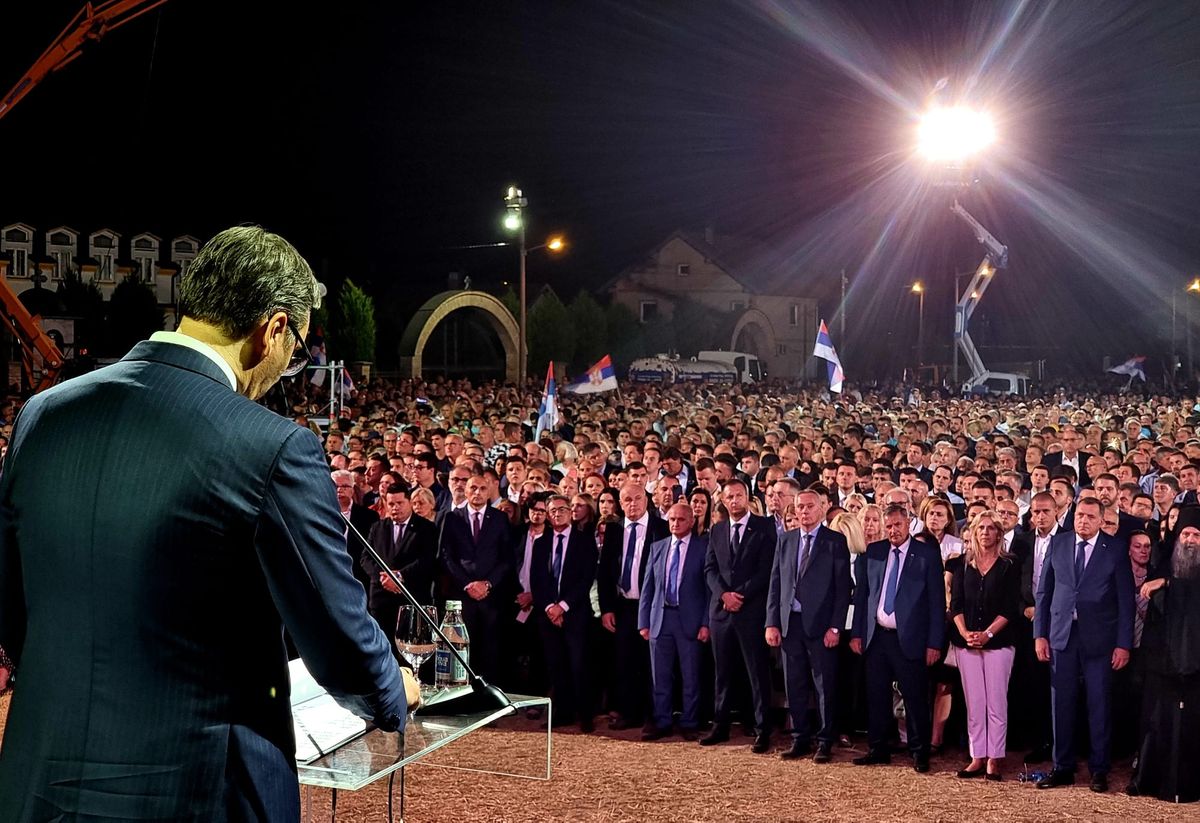
« Notre mission est un avenir heureux pour nous et pour la nouvelle génération ! La Serbie d'aujourd'hui repose sur une identité claire et une culture du souvenir ! » a souligné le président Vučić et il a rappelé que tout ce qui avait été négligé pendant des décennies, a été fait, ainsi qu'une Serbie forte est devenue maître de son propre destin.
«Gloire éternelle aux martyrs serbes morts dans l'Opération « Tempête »et dans tous les pogroms. Vos enfants sont dans leur Serbie, pris en charge, aimés et réussis. Dormez paisiblement, faucons serbes, l'avenir de vos enfants est notre vœu. » a conclu le président Vučić. Il a remercié tous ceux qui ont montré ce soir à quel point ils aiment leur pays et il a souligné encore une fois que la Serbie se souvient !
La source : www.predsednik.rs
La photo : www.predsednik.rs
|
|
|
| Проведение Дня памяти всех пострадавших и изгнанных сербов в ходе воeнной операции «Бу́ря» |
|

Президент Республики Сербия Александр Вучич присутствовал на проведении Дня памяти пострадавших и изгнанных сербов в ходе воeнной операции «Бу́ря», и сказал, что Сербия помнит!
«Сегодня, когда мы снова напоминаем себе о том, что произошло в августе 1995 года, об ужасном погроме, изгнании более 250 000 сербов, последствиях и этнической чистке, мы, в то же время и, наконец, напоминаем себе о том, кто мы, откуда мы пришли и куда мы идем. Спасибо за то, что все мы здесь собрались сегодня вечером и показали, как сильно мы любим наш народ», - сказал президент Вучич, добавив, что мы не забудем, через что пришлось пройти краинским сербам (граничарам).

«История никогда не переписывалась так, как сегодня. Вот почему я хочу напомнить всем нам не только о том, что другие нам причинили, не желая нашего существования, но и о том, что мы сделали сами себе, как будто мы не хотели существовать», - сказал президент и отметил, что Сербия никогда не забудет своих безмолвных героев.
Президент Вучич подчеркнул, что мы никогда больше не должны закрывать глаза, уши и рты на то, что было погромом и падением всякой человечности.

«Делать вид, что это неправда, избегая разговоров, - это преступление не только против жертв, но и против нас самих, каждого живого серба, граничара, Сербии и ее будущего», - сказал президент Вучич и подчеркнул, что людьми можно зваться только в том случае, когда мы помним, можем встать и жить в мире с собой и с другими без разрыва, страха и сомнений.
Президент Вучич указал, что Сербия должна бороться за мир и за колыбели с детьми, а также что забвение уничтожает и стирает нас из истории и будущего, лишая нас права на каждое завтра.
«Наша миссия – создать счастливое будущее для нас и для нового поколения! Сегодняшняя Сербия основана на четкой идентичности и культуре памяти», - сказал президент Вучич и напомнил, что сделано все, что десятилетиями игнорировалось, и что сильная Сербия стала хозяином своей судьбы.

«Вечная слава сербским мученикам, погибшим в «Буре» и во всех погромах. Ваши дети живут на своей родине Сербии, о них заботятся, они любимы и успешны. Спите спокойно, сербские соколы, будущее ваших детей - это наш завет», - заключил президент Вучич и поблагодарил всех, кто сегодня показал, как сильно любит свою страну и что Сербия помнит.
Источник: www.predsednik.rs
Фото: www.predsednik.rs
|
|
|
| Marking the Remembrance Day of all Serbs who died and were expelled in the armed operation "Storm" |
|

The President of the Republic of Serbia, Aleksandar Vučić, attended the marking of the Remembrance Day of all the victims and expelled Serbs in the armed operation "Storm" and said that Serbia remembers!
"Today, when we remind ourselves again of what happened in August 1995, the terrible pogrom, the expulsion of more than 250,000 Serbs, the exodus and ethnic cleansing, we, at the same time, and finally, remind ourselves of who we are, what we are, where we come from and where we are going. Thank you all for being here together tonight and for showing how much we love our people", said President Vučić, adding that we will not forget any of the things that the Krajina people had to go through.

"For us, these are not just terrible numbers of victims", said President Vučić and emphasized that Serbia will not forget.
"History has never been rewritten like today. That is why I want to remind us all not only of what others have done to us, not wanting us to exist, but also of what we have done to ourselves, just as if we ourselves did not want to exist", said the President, noting that we must never again allow Serbia to forget its silent heroes.

President Vučić emphasized that we must never again cover our eyes, ears, and mouths in front of something that truly was a pogrom and the downfall of all humanity.
"Pretending that this is not true, avoiding saying it, is a crime not only against the victims, but also against ourselves, every living Serb, people from Krajina, as well as Serbia and its future", said President Vučić and underlined that people can stand up straight and live with themselves and the others without hesitation, fear and doubt, only if they remember.
President Vučić pointed out that Serbia must fight for peace and cradles with children, as well as that not remembering annuls and erases us from the history and the future, depriving us of the right to tomorrow.
"Our mission is a happy future for us and for the new generations! Today's Serbia is based on a clear identity and a culture of remembrance", said President Vučić and reminded that everything that had been neglected for decades had been done, and that a strong Serbia has become the master of its own destiny.

"Eternal glory to you, Serbian martyrs who perished in the "Storm" and all other pogroms. Your children are in their Serbia, taken care of, loved and successful. Sleep peacefully, Serbian falcons, the future of your children is our vow", concluded President Vučić and thanked everyone who showed that night how much they love their country and that Serbia remembers.
Source: www.predsednik.rs
Photo: www.predsednik.rs |
|
|
| THE FORGOTTEN POGROM AGAINST THE SERBIAN PEOPLE IN CROATIA |
|
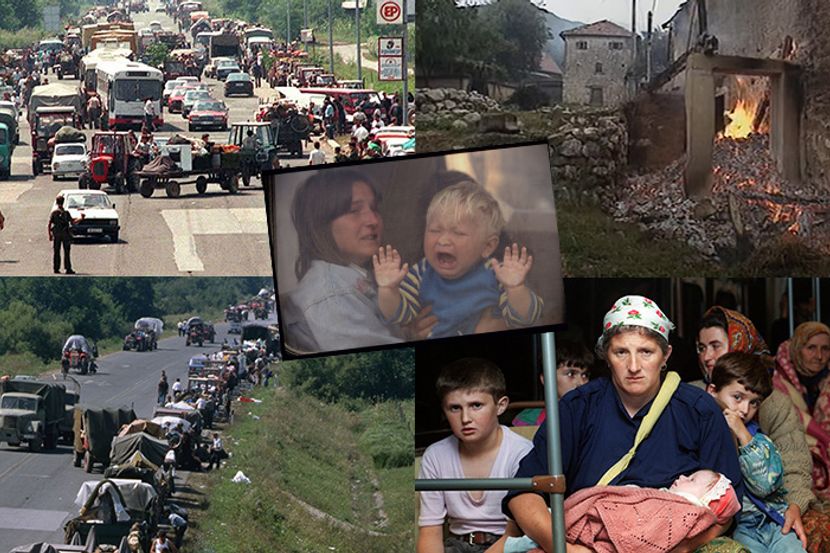
Since 2014 Serbia and Republika Srpska have been jointly marking the anniversaries of the suffering of the Serbian people in the Second World War and in the Croatian military operation "Storm". We are marking the anniversary of "Storm" as the Day of Remembrance for the victims and expelled Serbs.
On August 4, 1995, the armed forces of the Republic of Croatia carried out an aggression against northern Dalmatia, Lika, Kordun and Banija, i.e. the Serbian Autonomous Region of Krajina, as part of the then Republic of Serbian Krajina. The aggression was carried out despite the fact that the area was under UN protection and that the representatives of the Republic of Serbian Krajina accepted in Geneva and Belgrade the proposal of the International Community on a peaceful solution to the conflict the day before the aggression.
About 200,000 soldiers were engaged against the Krajina Serbs (about 230,000 inhabitants with about 30,000 soldiers), and in a few days of unequal fighting, the resistance of the Serbian Krajina Army was broken, and the people of the western Krajina, more than 220,000, retreated towards Serbia and Republika Srpska.
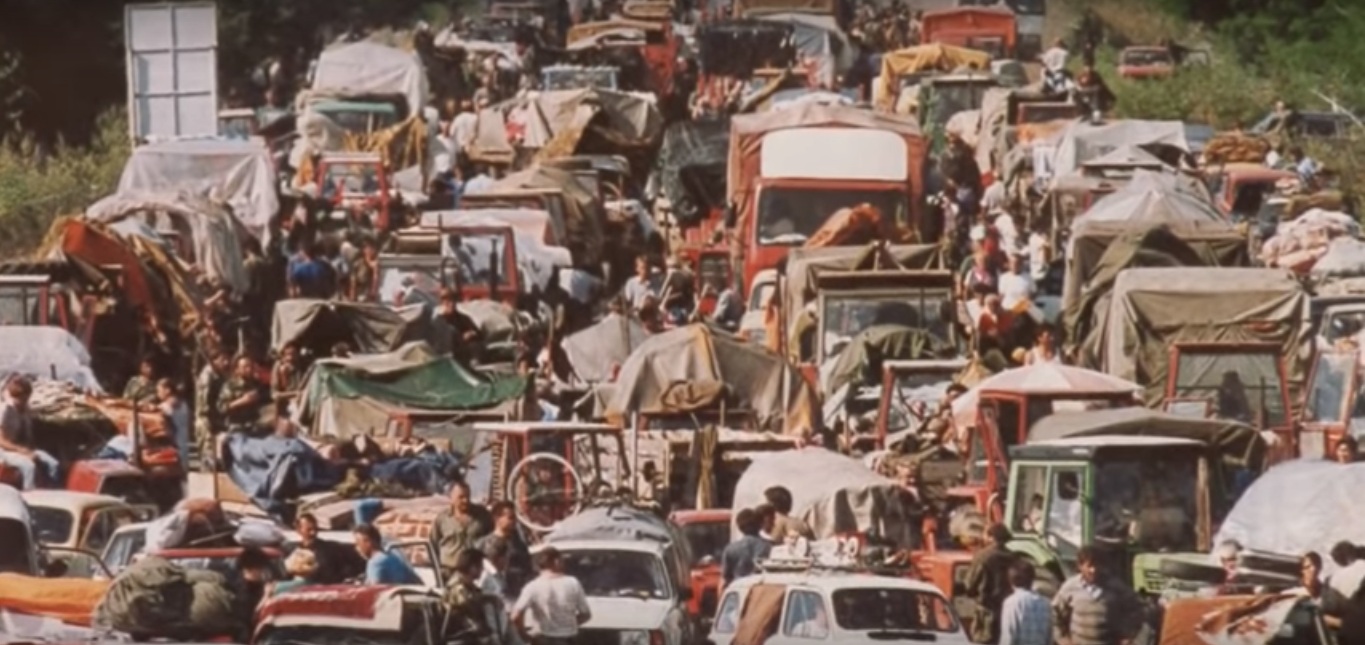
Currently, 1,852 people are on the list of killed and missing Serbs in "Storm", of which 1,200 are civilians. The material damage caused by the "Storm" is of unimaginable proportions. 13,000 buildings, 25,000 houses, 78 churches, 96 museums, 181 cemeteries, 52 health centers, all industrial plants etc. were destroyed.
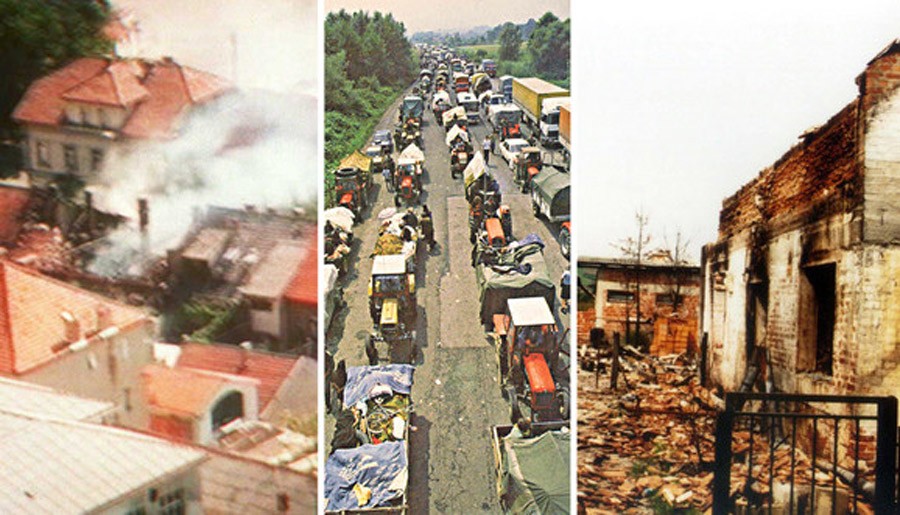
According to the 1991 census, there were 581,663 Serbs living in the Republic of Croatia (12.2% of the total population), while the 2011 census showed that there were 186,633 Serbs in Croatia (4.36% of the total population). Therefore, after the civil war and the mass exodus of the Serbian people, the number of Serbs fell by 2/3.
Crimes against the Serbian people at the end of the 20th century cannot be viewed outside the context of crimes and genocide from the period of the Second World War. Today, almost no one in Europe and the world talks about the genocide of the Serbian people on the territory of the Nazi creation of the Independent State of Croatia in the Second World War, and the horrific story about the Jasenovac concentration camp is shrouded in silence. No one from the Croatian military and political leadership was held responsible before the International Criminal Tribunal for the former Yugoslavia for the expulsion of almost a quarter of a million Serbs (the sum of those expelled in "Storm" and "Flash") and the killing of a large number of civilians and prisoners.
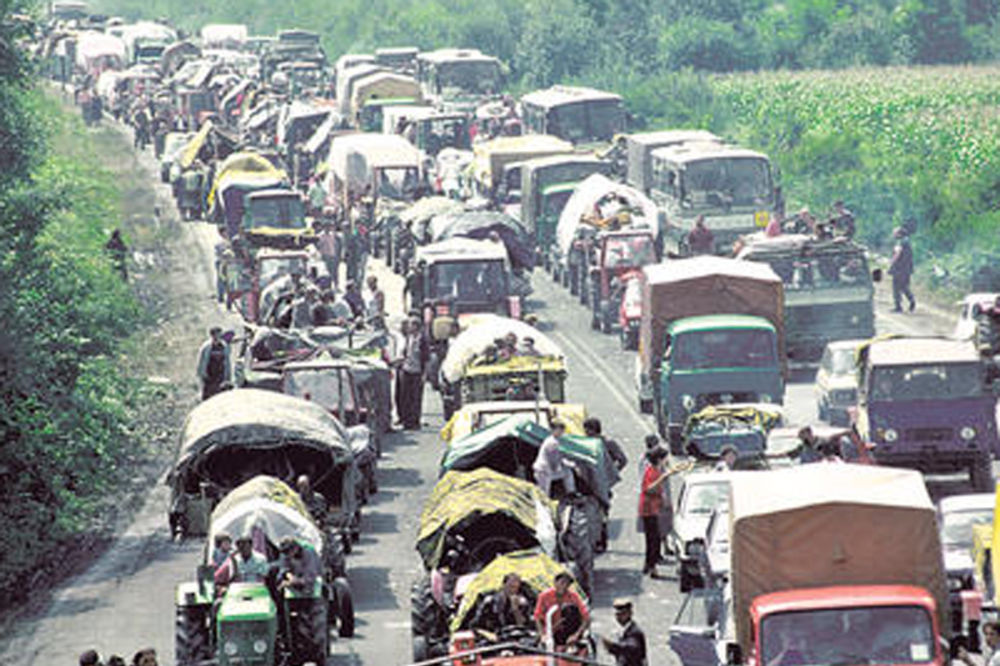
"Storm" is one of the greatest crimes of ethnic cleansing in the world after the Second World War, with more than 220,000 expelled. Serbia has never forced anyone to admit genocide, but only to show reverence for Serbian victims and not to celebrate over the graves of our compatriots. Serbia and Republika Srpska will never celebrate the tragedy of the Serbian people, the killing of Serbian civilians and children.
The presence of representatives of the international community and the diplomatic corps at the Croatian "celebrations" of the anniversary of the "Storm" action is incomprehensible, because those present are participating in the celebration of the anniversary of ethnic cleansing. Serbs who remain in Croatia are still often treated as beings of a lower order (they are denied the right to language, culture, economic progress and a dignified life). Ustasha values and achievements are still widely celebrated in Croatia. Peace is the most important for the Serbian people and that is why Serbia does everything not to respond to numerous and frequent provocative messages from the region. Serbia will never call for new conflicts, because it wants to develop in cooperation with everyone in the region, but it is obliged to remember and not to be silent.
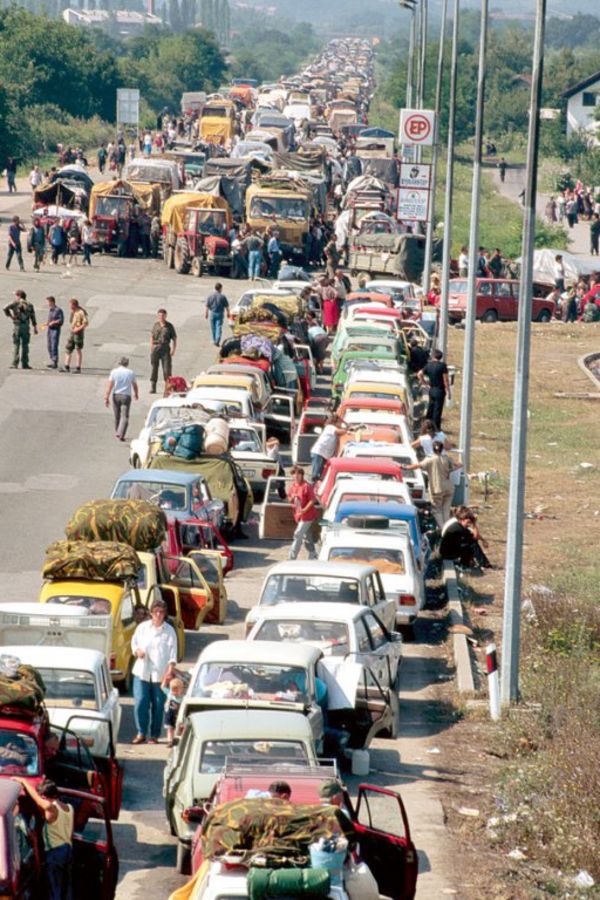 |
|
|
| Le 22 juillet 2021 - Le Président Vučić: Nous avons pris la décision - notre objectif c’est l'UE, mais la Chine est un partenaire important |
|
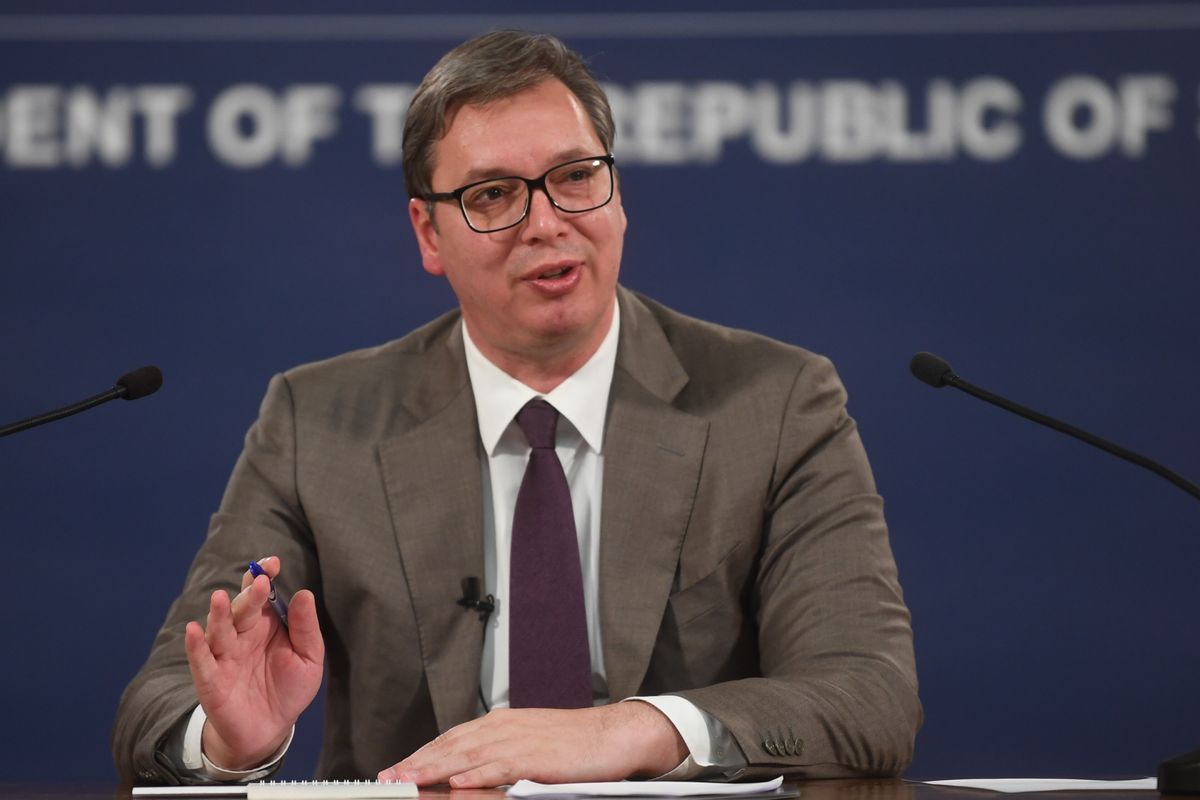
-Nous avons pris la décision - notre objectif est et reste l'UE, a déclaré le Président serbe Aleksandar Vučić dans une interview accordée au quotidien allemand «Handelsblatt» et qu'il n'y a aucune autre alternative pour la Serbie, mais il a également souligné que la Chine est un partenaire important pour la Serbie, et la tâche de l'État est de veiller à l'intérêt de ses citoyens.
Il a ainsi répondu à la question ce que la Serbie choisira lorsqu’elle devra choisir entre les relations étroites avec Pékin ou l'UE. Vučić a souligné que la Serbie veut devenir membre à part entière de l'UE.
-Nous sommes liés par l'histoire, la culture commune, les membres de l'UE sont déjà nos partenaires les plus importants, a-t-il expliqué ajoutant que les échanges commerciaux entre l'Allemagne et la Chine sont 3 000 fois plus élevés qu'entre la Serbie et la Chine, mais, note-t-il, ce sont toutefois les affaires de la Serbie avec la Chine qui posent problème.
Sur constatation que la chancelière allemande Angela Merkel n'a pas félicité le 100e anniversaire du Parti communiste chinois, et que lui il l'a fait, il a répondu que la Serbie n'est pas l'Allemagne, mais un petit pays. Sur la question insistante concernant ce que la Serbie fera si elle doit choisir entre l'UE et la Chine, il a souligné que la Serbie a déjà décidé, que son objectif était et reste l’adhésion à l'UE.
-Nos plus gros investisseurs viennent de l'UE. L'UE représente 67 % de notre commerce. Plus 17% avec les pays de la région qui sont tous sur la voie de l'UE. Nous ne pouvons pas subsister sans l'UE, a-t-il ajouté.
-Mais nous pouvons effectuer beaucoup de bonnes choses avec la Chine - certes. Et nous le faisons, tout comme l'Allemagne, a souligné Vučić, et à la remarque que la qualité des projets de la route de la soie a été critiquée, principalement en raison des travailleurs chinois, il a répondu que la qualité des routes ou des ponts que la Serbie construit avec la Chine est excellente.
-Nous donnons les marchés à ceux qui nous soumettent la meilleure offre. C'est pourquoi je dis aux Européens critiquant les projets chinois dans notre pays - proposez-nous un projet pour un euro de plus et vous l'aurez, a-t-il souligné.
À ce propos, il a indiqué que la Serbie construisait un chemin de fer vers la Macédoine du Nord avec 600 millions d'euros d'aide de l'UE, citant que l'offre était meilleure que celle de la Chine.
-On parle souvent d'un chemin de fer de 180 kilomètres vers Budapest à travers le territoire de la Serbie, financé par la Chine. Mais le chemin de fer qui est construit avec l'aide de l'UE depuis Belgrade à la frontière de la Macédoine du Nord est deux fois plus long et personne n'en parle. Tout est trop politisé, a-t-il constaté.
Demandé s'il saluait les projets de l'UE et des États-Unis sur une initiative alternative à la route de la soie, Vučić a dit soutenir tout ce qui apporte les avantages à notre région.
-Les Chinois veulent étendre leur présence partout, mais nombre de processus en Occident, franchement, sont plus efficaces et sans problèmes. Nous avons encore beaucoup à apprendre de l'Occident, mais on va y arriver, a dit Vučić.
Il a relevé que la Chine est un partenaire important pour la Serbie, ajoutant que lorsque la consolidation des finances publiques a commencé en 2014, notre pays a reçu de la Chine de bonnes conditions pour les projets de développement.
Il a également précisé qu'un appel d’offre avait été annoncé à la demande de l'UE, pour une mine de cuivre dans l'est de la Serbie, qu'aucune entreprise européenne n'avait fait d'offre pendant six mois, et qu'elle avait été reprise par les Chinois.
-Notre travail est de prendre soin des gens, a-t-il déclaré.
Il a rappelé que l'économie serbe a augmenté de 52% en huit ans et demi, ce qui signifie pour l'UE que la Serbie pourrait être un membre fort et un moteur pour toute la région.
Expliquant comment la Serbie se développe si bien sur le plan économique, il a relevé que la Serbie dispose d'une excellente main-d'œuvre, anglophone, que la société et l'administration sont numérisées, et qu'elle a la loi sur le travail le plus flexible d'Europe, ainsi que des finances publiques consolidées.
Il a rappelé qu'avant la dette publique s'élevait à 78% du PIB, et aujourd'hui elle a été réduite, grâce à la forte croissance de l'économie, à 52%.
-Nous pouvons nous permettre d'inciter les investisseurs à venir, a-t-il ajouté, soulignant que la Serbie offre une aide à l'investissement, mais que, par exemple, les subventions n'étaient pas le motif de l'arrivée du Continental Development Center.
Il a relevé que seule la Serbie dans cette région a lancé le système d'enseignement en alternance dans cette région il y a cinq ou six ans, celui de l'Allemagne, de la Suisse et de l'Autriche, que des dizaines de milliers de personnes suivent la formation duale, et que ceci est apprécié par les investisseurs étrangers, qui en plus peuvent également coopérer étroitement avec les universités.
L'Allemagne, a-t-il cité, est le partenaire commercial le plus important et le plus grand investisseur.
-Nous avons débuté avec l'arrivée de petites entreprises textiles de Turquie, et maintenant ce sont notamment les grandes entreprises allemandes qui arrivent. A l’heure actuelle, 71.000 personnes travaillent dans les entreprises allemandes en Serbie, a-t-il expliqué.
Vučić a dit que la perspective européenne est très importante pour les investisseurs, déclarant que Nikkeik, Toji Tire ou Mitsubishi viennent du Japon en Serbie parce que notre pays est sur une voie européenne stable.
Demandé s'il pensait que la Serbie deviendrait membre de l'UE dans un avenir proche, il a répondu ne pas avoir à se plaindre.
-Il est certain que si nous avions reçu 45 milliards d'euros d'aide de l'UE nous serions beaucoup plus loin économiquement. A la place, nous avons reçu 1,6 milliard d'euros de l'UE. Nous sommes habitués à voir nos succès venir de nous-mêmes, a dit Vučić.
Le Président de Serbie a rappelé qu'en Croatie les salaires avant étaient 2,2 fois plus élevés qu'en Serbie, et aujourd'hui ils ne sont que 1,7 fois plus élevés.
-Nous fermons le trou de nos propres forces. Si nous devenions membre de l'UE, nous ne demanderons certainement pas les plus grosses subventions, assure-t-il. Il a dit que la voie serbe suit la voie allemande vers l'Europe et que la Serbie veut une chance équitable.
-Je crois les paroles de Merkel. Elle est en fin de mandat et je ne suis plus sensé la louer. Mais elle nous a donné la stabilité, la liberté de voyager à l'UE, aidé dans la crise des migrants en 2015, et a demandé au ministre de l'Économie Altmaier et aux autres de travailler en étroite collaboration avec nous, a-t-il rappelé.
Demandé s'il y avait des indications que le nouveau gouvernement allemand soutiendrait la Serbie de la même manière, Vučić a exprimé sa conviction que ce sera le cas.
-Je connais Armin Laschet, je lui ai parlé lorsqu’il était Premier ministre de Rhénanie-du-Nord-Westphalie. Il est très intelligent et comprend la situation dans les Balkans, et en qualité du nouveau chancelier il continuera certainement la politique de Merkel envers notre région, a-t-il ajouté.
Vučić a également exprimé sa conviction que la Russie, si l'adhésion de la Serbie à l'UE se concrétisait, ne réagirait pas de la même manière que dans le cas de l'Ukraine, et qu'il s'agit là d'une décision souveraine de la Serbie.
À une question supplémentaire à ce propos, Vučić a indiqué que chaque fois qu'il rencontrait Vladimir Poutine, et qu'il y a eu 18 ou 19 entretiens, il disait être reconnaissant pour l'amitié traditionnellement étroite avec la Russie, mais aussi que la Serbie se trouve sur le cours claire de l’UE.
-Il a demandé si c'était notre choix et j'ai répondu «oui, l'adhésion à l'UE est notre objectif'», a-t-il relaté.
Pour ce qui est du «Kosovo», Vučić a souligné qu'un compromis est nécessaire concernant cette question.
-C’est la seule façon d’avoir une paix durable. La Serbie et moi-même, nous voulons la paix. Arrêtons les folies du passé. C’est alors que toute la région peut devenir motrice d'une nouvelle croissance pour l'Europe, a déclaré Vučić.
Source : Tanjug
|
|
|
| 22 July 2021 - President Vučić: We have decided – our goal is the EU, but China is an important partner |
|

We have decided – our goal was and remains the EU, Serbian President Aleksandar Vučić said in an interview with the German daily "Handelsblatt", adding that there is no alternative for Serbia, but also stressing that China is an important partner for Serbia, and that the task of the state is to take care about the interests of its citizens.
He thus answered the question of what Serbia will choose once it has to choose between close relations with Beijing or the EU. Vučić emphasized that Serbia wants to become a full member of the EU.
"We are connected by history, common culture, EU members are already undoubtedly our most important partners", he explained and added that the trade exchange between Germany and China is 3,000 times higher than between Serbia and China, and, as he noted, even despite that, Serbia's business operations with China are portrayed as a problem.
To the statement that the German Chancellor Angela Merkel did not congratulate the 100th anniversary of the Communist Party of China, and that he did so, he replied that Serbia is not Germany, but a small country. On additional insistence on what Serbia will do if it has to choose between the EU and China, he underlined that Serbia has already decided, that its goal was and remains the EU membership.
"Our biggest investors are from the EU. The EU accounts for 67% of our trade while 17 percent of the trade is with countries of the region that are all on the way to the EU. We cannot survive without the EU", he added.
"But can we do a lot of good things with China – of course. And we do that, just like Germany does", Vučić pointed out, and to the remark that the quality of the Silk Road projects was being criticized, primarily because of Chinese workers, he answered that the quality of roads or bridges, which Serbia is building with China, is excellent.
"We give jobs to those who submit the best offer to us. That is why I tell Europeans who criticize Chinese projects in our country – offer us a project for one euro more and you will get it", he emphasized.
In that regard, he pointed out that Serbia is building a railway to Northern Macedonia with 600 million euros of EU aid, stating that that offer was better than China's.
"There is often talk of a 180-kilometer railway to Budapest through the territory of Serbia, which is financed by China. But the railway that is being built with the help of the EU from Belgrade to the northern Macedonian border is twice as long and no one is talking about it. It is all too political", he stated.
Asked whether he welcomes the plans of the EU and the USA regarding an alternative initiative to the Silk Road, Vučić said that he supports everything that brings advantages to our region.
"The Chinese want to expand their presence everywhere, but many processes in the West are, frankly, more efficient and without problems. We still have a lot to learn from the West, but we are getting there", Vučić said.
He pointed out that China was an important partner for Serbia and added that when the consolidation of state finances began in 2014, our country received good conditions from China for development projects.
He also stated that a competition for a copper mine was announced in eastern Serbia, at the request of the EU, that no European company had made an offer for six months, and that it had then been taken over by the Chinese.
"Our job is to take care of our people", he said.
He reminded that the Serbian economy grew by 52% in eight and a half years, which for the EU means that Serbia could be a strong member and engine for the entire region.
Explaining how Serbia is developing so well economically, he pointed out that Serbia has an excellent workforce, which speaks English, that society and administration are digitalized, and that it has the most flexible labor law in Europe, as well as consolidated public finances.
He reminded that previously the public debt was at 78% of GDP, and that today it has been reduced, thanks to the strong growth of the economy, to 52%. "
We can afford to give investors an incentive to come", he added, emphasizing that Serbia offers investment assistance, but that, for example, subsidies were not the motive for the arrival of the development center of the company Continental.
He pointed out that, five or six years ago, only Serbia started using the dual education system in this region, which Germany, Switzerland and Austria also use, that tens of thousands of people are in dual education, and that this is appreciated by foreign investors, who, in addition, can work closely with universities as well.
Germany, he stated, is the most important trade partner and the largest investor.
We started with the arrival of small textile companies from Turkey, and now primarily large German companies are coming. Today, 71,000 people work in German companies in Serbia", he explained.
Vučić said that the European perspective is very important for investors, stating that Nidek, Toyo Tires or Mitsubishi are coming from Japan to Serbia because our country is on a stable European path.
Asked if he believes that Serbia will become an EU member in the foreseeable future, he said that he does not complain.
"It is certain that if we had received 45 billion euros of EU aid, we would have been much further economically. Instead, we received 1.6 billion euros from the EU. We are used to achieving our successes on our own", said Vučić.
The President of Serbia reminded that in Croatia, salaries used to be 2.2 times higher than in Serbia, and today they are only 1.7 times higher.
"We are closing the gap with our own efforts. If we were to become a member of the EU, then we would certainly not ask for the biggest subsidies", he assures.
He said that the Serbian path follows the German path to Europe, and that Serbia wants a fair chance.
"I believe Merkel's words. She is at the end of her term and I would not have to praise her anymore. But she gave us stability, freedom of travel to the EU, helped us with the migrant crisis in 2015, and asked the Minister of Economy Altmeier and others to work closely with us", he reminded.
Asked if there were any indications that the new German government would support Serbia in the same way, Vučić expressed confidence that it would be the same.
"I know Armin Laschet, I talked to him while he was the Minister-President of North Rhine-Westphalia. He is very smart and understands the situation in the Balkans, and he will certainly continue Merkel's policy towards our region as the new chancellor", he added.
Vučić also expressed his belief that Russia, if Serbia's accession to the EU were concretized, would not react similarly as in the case of Ukraine, as this is a sovereign decision of Serbia.
To an additional question in this regard, Vučić pointed out that whenever he met with Vladimir Putin, and there were 18 or 19 meetings, he told him that he was grateful for the traditionally close friendship with Russia, but also that Serbia is on a clear course towards the EU.
"He asked if it was our choice and I answered that EU membership is indeed our goal", he added.
When it comes to "Kosovo", Vučić emphasized that a compromise is needed regarding this issue.
"Only in this way can there be sustainable peace. Serbia wants peace, me as well. Let's stop with the madness of the past. Only then can the whole region become the engine of new growth for Europe", said Vučić.
Source: Tanjug
|
|
|
| 20 July 2021 - Serbia has achieved great success in the field of digitalization |
|
The Prime Minister of the Republic of Serbia, Ana Brnabić, stated at a gathering dedicated to digitalization and the IT sector, which was held in New York, that since she became Prime Minister, she is most proud of Serbia's success in the field of digitalization.
Brnabić, who is on a two-day visit to the United States, said that when she was elected Minister of Public Administration and Local Self-Government in August 2016, she wanted to do everything to change the public administration and what bothered her as a citizen.
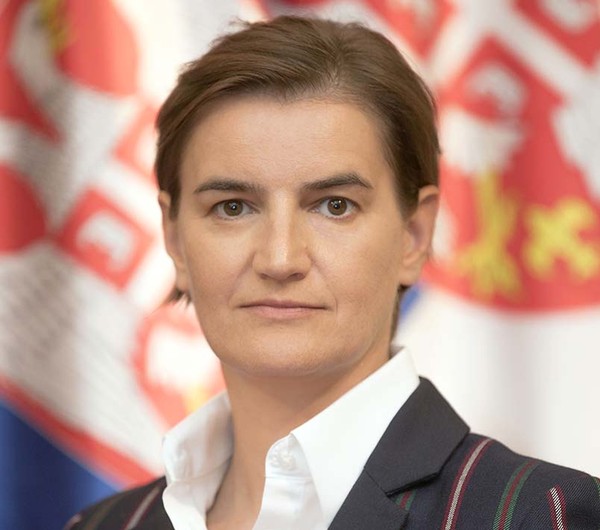
She stated that, when she took office as Prime Minister, she knew what her priorities were and that first of all, digitalization needed to be raised to a higher level, that the education reform was supposed to begin, as well as work on strengthening the economy.
I believed in a country that believes in its people, because the Serbian people are creative. From 1 June 2017, we started working as an e-Government, i.e. we started exchanging data electronically, said the Prime Minister.
According to her, our citizens no longer had to go to, say, the Tax Administration, and since then, the public administration has exchanged 50 million documents, which means that citizens did not have to go from office to office for 50 million papers.
Brnabić pointed out that she is proud of what has been done in the field of education since she became the head of the Government, specifying that in September 2017, programming was introduced as a compulsory subject in primary schools.
Nobody believed that we could do that, but we cooperated with the private sector and some social organizations and we succeeded. At the moment, we are far ahead of numerous countries in Europe and the world, said the Prime Minister.
The Prime Minister pointed out that she was most proud when the cornerstone was laid for the science and technology park in southern Serbia, noting that so far, our country has four science and technology parks.
She pointed out that Serbia has since become one of the most successful countries in the world in the field of technology, and that according to some parameters, it is among the ten countries in the world, or among the five, assessing that this is proof that the country can change quickly.
Answering the question about vaccination, the Prime Minister emphasized that our country has never seen it as a geopolitical issue, but as a health issue.
According to her, Serbia talked with producers from both the East and the West and was among the first European countries to sign agreements with the company Pfizer-BioNTech and Sinopharm.
Unfortunately, many countries have viewed this issue as geopolitical. It did not matter to us, as long as the vaccines were safe, the Prime Minister emphasized and added that this was not the end of Serbia's success, because good organization was also needed.
Brnabić explained that the organization is another important thing in vaccination, because it is a logistically very difficult process, adding that, with the help of digitalization, success has been achieved and that everything we did in the previous years has paid off.
She stated that Serbia quickly established a system through which citizens could express interest in vaccination against the coronavirus and choose which vaccine they wanted to receive, as well as to be informed by a message when to go and get vaccinated.
Now I can log in on my phone, to see how many people have received the vaccine, how many more have registered, so that the effects of digitalization are obvious. We have made everything very efficient and easy for our citizens, the Prime Minister explained.
Answering the question of what she can tell other countries of the world about how to progress faster, Brnabić said that it is important to invest as much as possible in digitalization and education.
You need to teach children how to think, not what to think. Not all children will become IT experts, but what they can learn is an algorithmic way of thinking and how to make decisions, she said.
The Prime Minister mentioned investing in high-speed internet and providing infrastructure for start-ups as an important thing for progress, because more and more economies will be based on start-ups and innovations, emphasizing that people should be helped to start companies and implement their ideas.
Speaking about social networks, she pointed out that fake news has become the biggest problem on these networks and that it will remain so for some time.
This is the biggest challenge I face as Prime Minister, especially during the corona virus pandemic, she said, adding that social networks are also a great opportunity for politicians to communicate with citizens.
Source: www.srbija.gov.rs
Photo: www.srbija.gov.rs
|
|
|
| Le 20 juillet 2021 - La Serbie a atteint un grand succès dans le domaine de la numérisation |
|
La Première ministre de la République de Serbie Ana Brnabić a déclaré lors de la réunion consacrée au numérique et au secteur IT, tenue à New York, que depuis qu'elle est devenue Première ministre, sa plus grande fierté c’est le succès de la Serbie dans le domaine de la numérisation.
Brnabić, en une visite de deux jours aux États-Unis, a dit que lorsqu'elle a été élue ministre de l'administration publique et des collectivités locales en août 2016, elle voulait tout faire pour changer l'administration publique et ce qui la dérangeait en tant que citoyenne.

Elle a déclaré que lorsqu'elle a pris ses fonctions de Premier ministre, elle savait quelles étaient ses priorités et que tout d'abord, la numérisation devrait être portée à un niveau supérieur, la réforme de l'éducation devrait commencer et des travaux devraient être faits pour renforcer l'économie.
Je croyais en un pays qui croit au peuple, parce que le peuple serbe est créatif. À partir du 1er juin 2017, nous avons commencé à travailler comme un gouvernement électronique, c'est-à-dire à échanger des données par voie électronique, a cité la Première ministre.
A ses dires, nos citoyens n'avaient plus à se rendre, disons, à l'administration fiscale, et depuis lors, l'administration publique a échangé 50 millions de documents, ce qui signifie que les citoyens n'avaient pas à aller de bureau en bureau pour 50 millions de papiers. Brnabić a souligné qu'elle est fière de ce qui a été fait dans le domaine de l'éducation depuis qu'elle est à la tête du gouvernement, précisant qu'en septembre 2017, la programmation a été introduite comme matière obligatoire dans les écoles primaires.
Personne ne croyait que nous pouvions le faire, mais nous avons coopéré avec le secteur privé et certaines organisations sociales et nous y sommes parvenus. À l'heure actuelle, nous sommes loin devant de nombreux pays d'Europe et du monde, a déclaré la Première ministre.
La Première ministre a indiqué qu'elle était tout de même la plus fière lorsque la pierre angulaire du parc scientifique et technologique du sud de la Serbie a été posée, notant que jusqu'à présent, notre pays compte quatre parcs scientifiques et technologiques.
Elle a mis en relief que la Serbie est depuis devenue l'un des pays les plus performants au monde au niveau technologique, avec certains paramètres parmi les dix pays du monde, et dans certains parmi les cinq, estimant que c'est la preuve que le pays peut changer rapidement.
Répondant à la question sur la vaccination, la Première ministre a souligné que notre pays n'y a jamais vu un enjeu géopolitique, mais bien un enjeu de santé.
Selon elle, la Serbie a discuté avec les producteurs de l'Est et de l'Ouest et a été parmi les premiers pays européens à signer des accords avec les sociétés Pfizer/BioNThech et Sinopharm.
Malheureusement, de nombreux pays ont considéré cette question comme géopolitique. Cela nous importait peu, tant que les vaccins sont sûrs, a souligné la Première ministre et ajouté que ce n'était pas la fin de la réussite de la Serbie, car une bonne organisation est également nécessaire.
Brnabić a expliqué que l'organisation est la deuxième chose importante dans la vaccination, car il s'agit d'un processus logistique très difficile, ajoutant qu'avec l'aide du numérique, le succès a été atteint et que tout ce que nous avons fait les années précédentes a porté ses fruits.
Elle a déclaré que la Serbie a rapidement mis en place un système grâce auquel les citoyens peuvent exprimer leur intérêt pour la vaccination contre le coronavirus et choisir le vaccin qu'ils souhaitent recevoir, ainsi qu'être informés par un message dès qu’ils font une demande de vaccination.
Maintenant, je peux me connecter au téléphone pour voir combien de personnes ont reçu le vaccin, combien d'autres se sont inscrites, on voit ainsi les effets de la numérisation. Nous avons rendu tout très efficace et facile pour nos citoyens, a expliqué la Première ministre.
Répondant à la question de savoir ce qu'elle peut dire aux autres pays du monde comment progresser plus rapidement, Brnabić a déclaré qu'il est important d'investir autant que possible dans la numérisation et l'éducation.
Vous devez apprendre aux enfants comment penser, et non pas que penser. Tous les enfants ne deviendront pas experts en IT, mais ce qu'ils peuvent apprendre, c'est une façon algorithmique de penser et comment prendre des décisions, a-t-elle déclaré.
La Première ministre a cité l'investissement dans l'Internet haut débit et la fourniture d'infrastructures pour les entreprises start-up comme une chose importante pour le progrès, car de plus en plus d'économies seront basées sur les startups et les innovations, soulignant que les gens devraient être aidés à créer des entreprises et à mettre en œuvre leurs idées.
Parlant des réseaux sociaux, elle a relevé que les fausses nouvelles sont devenues le plus grand défi de ces réseaux et le resteront pendant un certain temps.
C'est le plus grand défi auquel je suis confrontée en tant que Première ministre, notamment pendant la pandémie du coronavirus, a-t-elle dit, ajoutant que les réseaux sociaux sont également une excellente occasion pour les hommes politiques de communiquer avec les citoyens.
Source : www.srbija.gov.rs
Photo : www.srbija.gov.rs
|
|
|
| 09. June 2021. - Address by the President of the Republic of Serbia at the session of the United Nations Security Council |
|
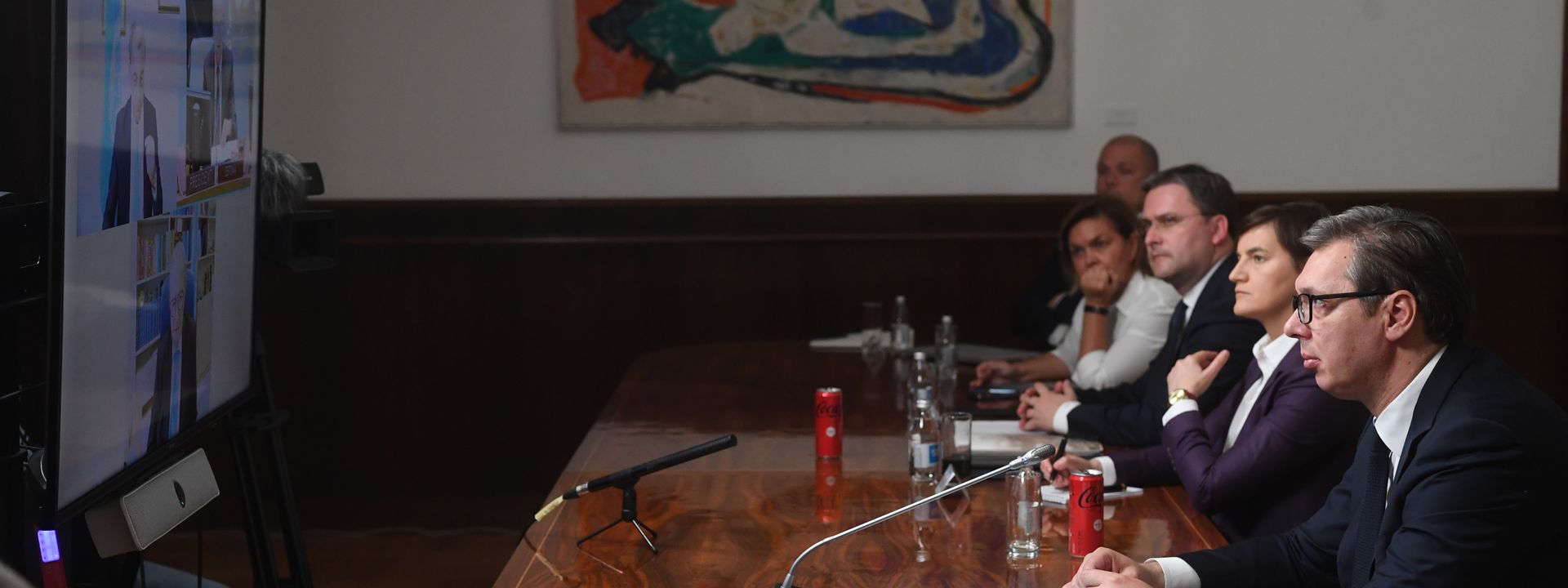
Dear Mr. President, ladies and gentlemen, members of the delegations
I would point to a few ongoing issues in my speech that refer to the competences of the Mechanism, namely, the possibility of serving the sentences passed by the ICTY and Mechanism in the Republic of Serbia, with the current practice of disabling early release of the sentenced persons as well as obligation of the Mechanism regarding protection of sentenced persons.
The second part of the speech will be dedicated to issues that are opened by the six –month Report on the work of the Mechanism by Mechanism President Mr. Agius and Report by the Chief Prosecutor Mr. Serge Brammertz, especially regarding current cooperation of the Republic of Serbia and the Mechanism.
The third part of my speech, and I noticed that in many of your statements even today, is going to be the view of Serbia on everything that took place in The Hague Tribunal and what the Tribunal verdicts brought to people in the region of former Yugoslavia.
The Republic of Serbia has initiated before the Security Council, on several occasions, the issue of possibility of serving sentences passed by the ICTY and Mechanism in the Republic of Serbia. Beside the efforts to move this issue from “square one”, not a single response was obtained from the Security Council. The majority of persons that are serving their prison sentences are citizens of the Republic of Serbia, and it comes naturally that the Republic of Serbia is interested in enabling them to serve their prison sentences in the Republic of Serbia.
ICTY and the Mechanism are making references to the Security Council as an institution in charge of dealing with this issue.
I am ready to reiterate here the readiness of the Republic of Serbia to take over obligations and liability for executing prison sentences that the Tribunal or Mechanism passed on the citizens of the Republic of Serbia, under the monitoring of the Mechanism and full respect for the authority of the Mechanism regarding early release.
Mr. President,
A particular problem that we are facing with is disturbance by the judicial institutions established in the territory of Kosovo and Metohija, which is within Serbia and which is under Interim Administration of the UN. We are witnesses of attempts of retrial for two citizens that are serving their prison sentences for which they had already been trialed before the ICTY. More concretely, in previous period there was an attempt for hearing of Nebojša Pavković and for obtaining extradition of Vlastimir Đorđević.
I urge on the Mechanism and Security Council to prevent attempts of violation of the principle ne bis in idem, a civilization principle that was confirmed in Article 7 (1) of the Statute of the Mechanism and to disable retrials for persons already convicted by the ICTY, particularly to make sure that it is not done in the territory which is under interim UN administration.
Mr. President,
President of the Mechanism (Mr. Carmel Agius), apart from the regular Report, delivered also on 11 May 2021 a letter to the President of the Security Council, whose subject is the alleged omission of the Republic of Serbia to apprehend and turn over to the Mechanism Petar Jojić and Vjerica Radeta, indicted of contempt of court, claiming that in this way the Republic of Serbia was acting contrary to its obligations towards the UNSC Resolution 1966 (2010) and asking the Security Council to take measures in order to ensure that Serbia meets the alleged obligations in accordance with the Mechanism Statue and Resolution 1966.
The point of the argumentation of the President of the Mechanism comes to that that the Republic of Serbia has the obligation to deprive of liberty and extradite to the Mechanism its citizens accused of contempt of court, regardless of the nature of accusation, circumstances under which such an order was made and consequences that might result from its implementation.
It is about accusations that do not refer to sever violations of international humanitarian law and that are related to a case before the ICTY, which ended in 2018 (Vojislav Šešelj case), by acquitting the defendant in the first instance, and upon the Prosecutor’s complaint the defendant was declared guilty and sentenced to a 10-year imprisonment, which was covered by the time he spent at the UN Detention Unit.
Judge Agius states that Serbia ignores its obligations in accordance with the Resolution 1966 (2010). Quite the opposite- the Republic of Serbia takes seriously its obligations regarding cooperation with the Mechanism. After the warrant for apprehension and extradition of the two persons accused of contempt of court to the Mechanism had been introduced, the Higher Court in Belgrade established that assumptions for their apprehension and extradition to the Mechanism had not been met. The decision is founded on the rules of international law and domestic law of the Republic of Serbia and it is mandatory for holders of the executive power in the Republic of Serbia.
I would remind here that the first decision of a sole judge (Aydin Sefa Akay, 12 June 2018), that was acting in this case was that the criminal prosecution of V. Radeta and P. Jojić for alleged contempt of court was to be forwarded to the judicial authorities of the Republic of Serbia. In procedures that followed, the argument of the alleged unwillingness of the witnesses to cooperate with the judicial authorities of the Republic of Serbia was stated for the first time, and the decision on deprivation of transferring the case to the jurisdiction of the judicial authorities of the Republic of Serbia was based on the respective argument.
The Republic of Serbia expressed its readiness to take over the court procedure against Petar Jojić and Vjerica Radeta on several occasions and it provided appropriate guarantees. Additionally, the Republic of Serbia fully recognizes and accepts the obligation of the Mechanism to monitor trials that were transferred to national courts with the help of international and regional organizations, as well as to take measures envisaged by Article 6 of the Statute of the Mechanism.
I would remind here that the Republic of Serbia extradited to the tribunal all the persons indicted by the Prosecutor’s Office, and among the respective mostly highest political, military and police officials; it enabled presence of vast number of witnesses, delivered extensive documentation. Obligation of the Mechanism, in accordance with the Resolution of this Security Council, is to take measures that enable transfer of cases to national justice system. In previous practice, 13 cases were transferred to Bosnia and Herzegovina, 2 to Croatia and only one to Serbia.
The last but not the least, I want to remind all of you here of the fact that France- of course as a sovereign and independent country- upon request for apprehension and extradition of Florence Altman for publishing documents and contempt of court, refused the request for extradition, with an explanation that it does not extradite its citizens. For far smaller offence you ask as to extradite our citizens Jojic and Radeta, showing both the distrust to Serbian justice and judiciary and Serbian State, as well as a fact that the rule from ancient Rome is still valid – quod licet lovi non licet bovi.
It does not harm to underline that high-level officers and politicians were not trialed for crimes against Serbs, and that crimes against Serbs remained unsanctioned before ICTY and Mechanism. Let me remind you, just as an example that Ademi and Norac case for ferocious crimes against Serb civilians in Medački Džep was left to Croatian justice institutions. Proven crimes against Serbs, like those of Ramuš Haradinaj, Naser Orić, then Ante Gotovina and other indicted for military operation “Storm” that led to a complete ethnic cleansing of Serb population in the big part of today’s Croatia, resulted before the ICTY in acquittals. Many horrible crimes against Serb civilians that were committed in the territory of Bosnia and Herzegovina, Croatia and the Autonomous Province of Kosovo and Metohija, and that resulted in ethnic cleansing, simply were not the subject of interest of the ICTY.
What’s very important and not to leave anything unclear, Serbia is a country that condemns all crimes and all criminals who perpetrated them in the region of former Yugoslavia. However, it is interesting that despite often criticism Serbia is the only one that speaks openly and condemns crimes perpetrated by Serb nationals, while in other regional countries they do not speak at all about crimes that representatives of those nations committed against members of Serbian people.
And I want to emphasize once again here in front of you that Serbia condemns terrible crime in Srebrenica and extends its deepest condolences to the families of all killed in that massacre. And there are no “buts” about the respective.
Nevertheless, we are here to analyze results and penal policy of ICTY and the Mechanism and it was such that it has never gained trust among Serbian people, no matter where they live. And not because we Serbs do not acknowledge crime committed by some of our compatriots, but because The Hague Tribunal, with exceptions, was judging only to Serbs and in all three territories of former Yugoslavia- Croatia, Bosnia and Herzegovina and Kosovo and Metohija, which some of the SC Member States see and name of course, contrary to law and legal norms and UN Resolutions, as an independent state. I would try to plastically prove to you how The Hague justice was tailored even though I know that it will not come to understanding of many of you, but to me it is important because of the history, facts, and school books that will be made in accordance with the facts.
Namely, Serbs were sentenced to totally 1138 years of imprisonment, and to 8 life imprisonments. At the same time, The Hague Tribunal did not sentence a single Croat for crimes against Serbs, neither in actions Medački Džep, nor Flash and Storm. How politically cunning it was done in the Tribunal, and all wrapped in the form of law and justice. Prosecutors of The Hague Tribunal chose on purpose three military and political leaders of Croats, Bosniac Muslims and Albanians, on all three mentioned territories, committed against Serbs. – Ante Gotovina, Naser Orić and Ramuš Haradinaj. It is interesting that following the same pattern, the same pattern, this injustice was shared. Namely, all of them were sentenced in the first instance procedure, with the exception of Ramuš Haradinaj, because not a single witness survived. Gotovina was sentenced to 24 years’ imprisonment in first-instance procedure, while by a mysterious decision of the second instance council and 3:2 judge ratio, the verdict was changed to acquittal. Naser Orić, for crimes against Serbs, was also sentenced in first instance verdict, but by a mysterious decision of the second instance court, and again 3:2 ratio decision was an acquittal and he was set free of any liability. Let me reiterate, all witnesses in process against Ramus Haradinaj, either committed suicide or were killed under very, very strange circumstances.
Let me conclude, I do not want to believe that someone wants to say that there had been no crimes against Serbs, but judging by the verdicts of The Hague Tribunal, no one- absolutely no one- is responsible for those crimes.
Nevertheless, we in Serbia will show responsibility and we will fight for peace, stability and reconciliation in the region.
We ask UN Security Council Member States to help us with rational and pragmatic approach and respect for international law and not by attempts of further humiliation of Serbia. Serbia is a small country, with proud and courageous people, the one that gave the biggest sacrifice during the WWI and WWII; people who wants to leave in peace with their neighbors. And when I am asking you for this, I do not think I am asking for too much.
At the very end, Serbia is the fastest growing country of the Western Balkans region and we cannot progress unless our relations with neighbors, friends and other countries are good, solid and better. That is why- despite the selective justice that was applied in The Hague Tribunal- we will be open for any dialogue, any kind of cooperation and we will look towards the future and not towards the past. And I have only one message for the citizens of Serbia and citizens of Serbian nationality in the entire region- keep your heads up, neither Serbia nor Serbian people are convicted of anything and it is up to us to work even more diligently, to open factories and to fight for our children and our future.
Long Live Serbia!
|
|
|
| INTERVIEW OF AMBASSADOR ĐUROVIĆ ON THE OCCASION OF THE 65TH ANNIVERSARY OF THE COUNCIL OF EUROPE DEVELOPMENT BANK |
|
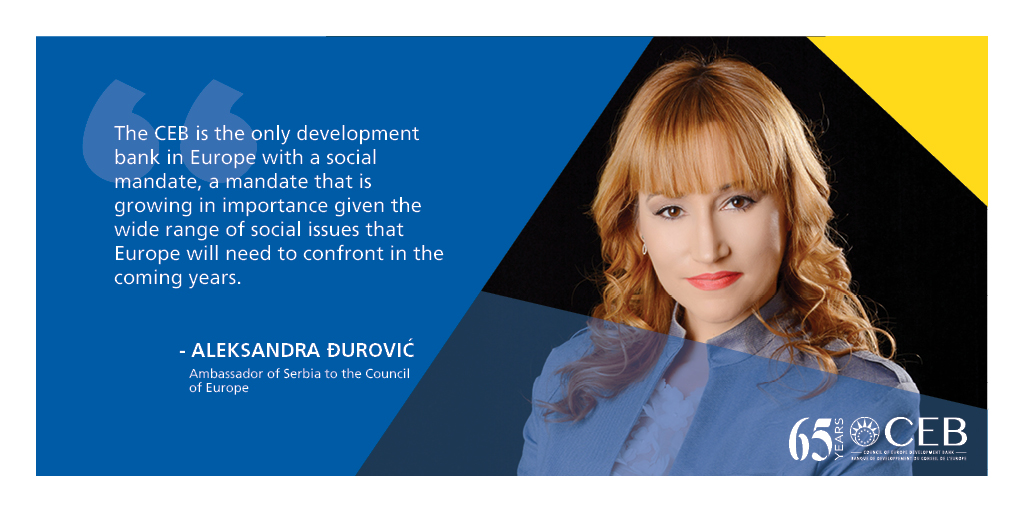
As part of the celebration of the 65th anniversary of the CoE Development Bank, Ambassador Aleksandra Đurović gave an interview in which she emphasized the importance of cooperation between Serbia and the CEB, with which projects in the field of education, health, social protection, environmental protection and energy efficiency are implemented. She pointed out that membership in the CEB provided Serbia with an opportunity to contribute to the Bank’s unique social mandate, that makes it a relevant institution for strengthening social cohesion and ensuring a more inclusive and sustainable economy throughout Europe.
Among the projects implemented in the Republic of Serbia in cooperation with the CEB, she presented the project of construction the University Children's Hospital "Tiršova 2" in Belgrade, projects "University Infrastructure" and "Student Housing", whose goals are to improve university education access in Serbia and the project "Water supply and waste water treatment". She underlined the support that the CEB provided to the Regional Housing Program, emphasizing that by the end of January 2021, the RHP had already provided housing to 5 285 most vulnerable refugee families in Serbia.
Regarding the future functioning of the Bank, she stated that its social mandate was becoming increasingly important given the wide range of social issues that Europe would need to confront in the coming years. She noted that it was crucial that the CEB had in mind the consequences of climate change and the adaptation measures in areas such as housing, energy, health, education and employment and that it should strengthen its focus on the long-term integration of vulnerable groups. She pointed out that in the future, the Bank should continue to support Serbia in achieving the goals agreed with the EU in the energy sector, water supply and sanitation and in the waste and environment sector and continue to promote sustainable economic development. She also stated that the activity in the countries belonging to the target group of the CEB should remain a strategic focus for the Bank.
The text of the interview in English and French is available via the links:
https://coebank.org/en/about/65-years/interviews-ambassadors/aleksandra-djurovic-ambassador/
https://coebank.org/fr/about/65-years/interviews-ambassadors/aleksandra-djurovic-ambassador/
|
|
|
| 21 May 2021 - Selakovic: Serbia is committed to respecting the ideas of multilateralism and cooperation |
|
Minister of Foreign Affairs of the Republic of Serbia Nikola Selakovic participated today via video link in the Ministerial Meeting of the Council of Europe and on that occasion stated that Serbia was a staunch supporter of the ideas of multilateralism, and emphasized the importance of dialogue and cooperation between member states.
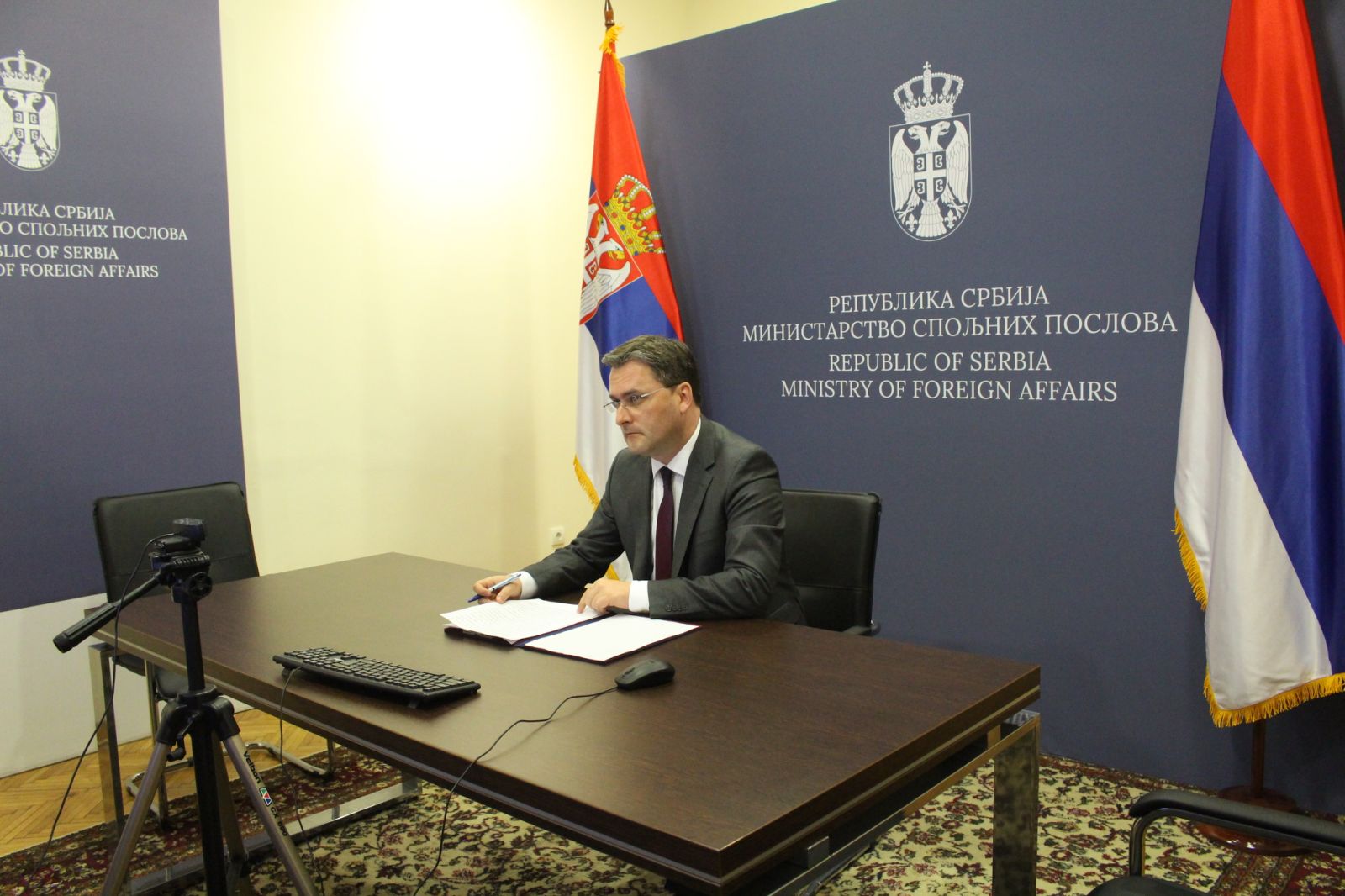
Selakovic pointed out that the Council of Europe should achieve greater unity among the member states in order to safeguard the shared values and principles of democracy, human rights and the rule of law, and to reaffirm itself as a single pan-European forum for inclusive discussion and cooperation based on the equality of its member states.
“Multilateralism is based on the respect for international law while the principles of territorial integrity and sovereignty are the foundation of the international legal order”, the Minister emphasized and added that these principles were of key importance for Serbia, and also that the principles and rules must apply to everyone.
The Minister also underlined that Serbia was one of the members of the Council of Europe that had not violated this principle in any case.
The Serbian Foreign Minister stressed that, at this point in time, one of the main tasks of all countries was to protect the health of the population.
“Serbia takes seriously its role and obligations arising not only from its membership in the Council of Europe, but also from its deep commitment and adherence to the principles of equality, non-discrimination, solidarity and cooperation, which we were guided by during the mass vaccination campaign”, Selakovic said and added that Serbia had also provided assistance to the region convinced that this problem could only be solved in cooperation with others.
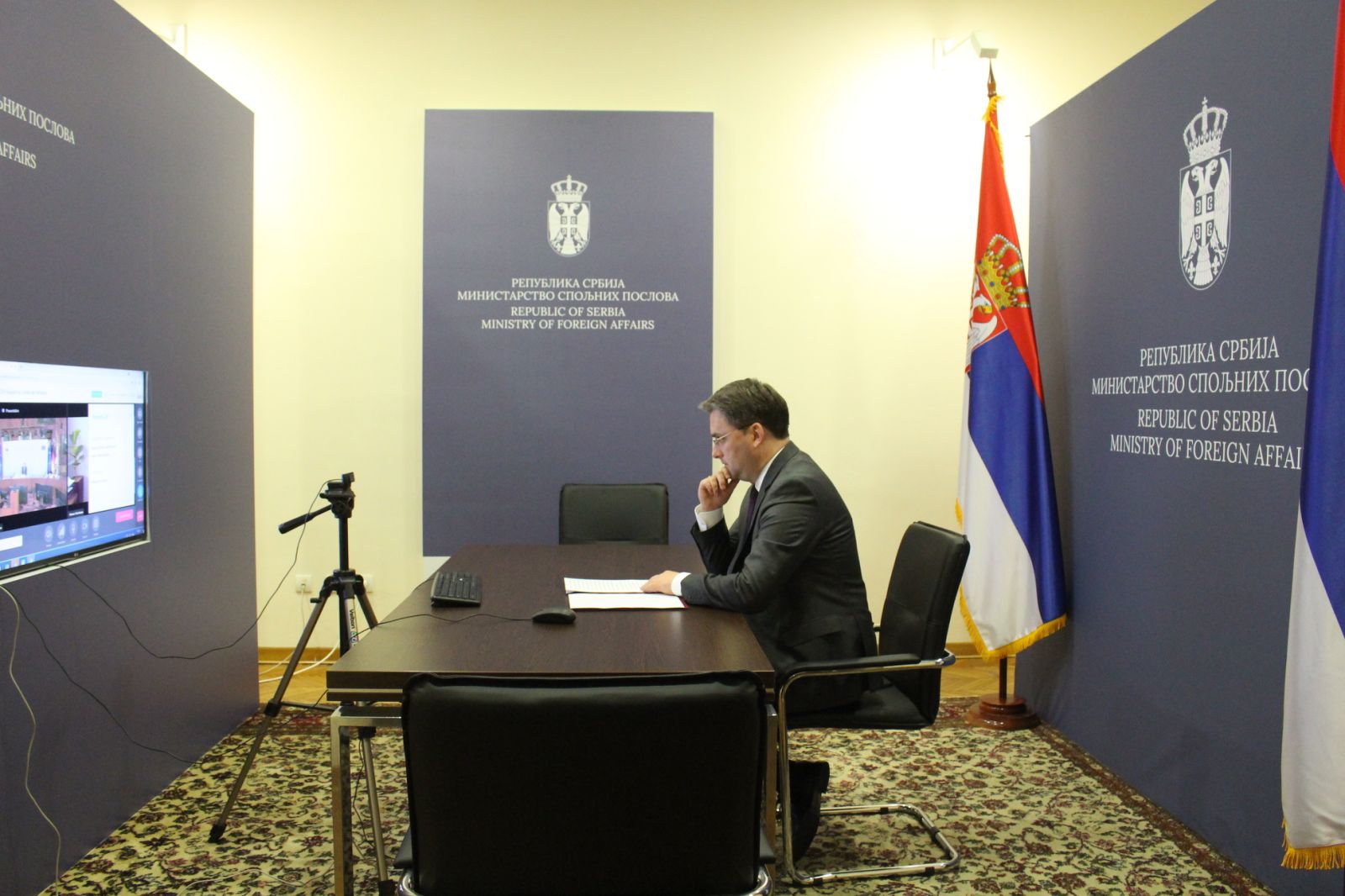
In his statement Selakovic referred also to the issue of the status of national minorities which would be among the priorities of the upcoming Hungarian chairmanship, emphasizing that our country was deeply committed to the protection of the individual and collective rights of more than 20 national minorities living in its territory.
“We have one of the most advanced laws on the protection of national minorities but we do not believe that the job is done and we continue to work steadily on the improvement of institutional and legal frameworks as well as on their effective implementation”, the Minister stated.
Furthermore, Selakovic said that Serbia remained fully committed to the enforcement of verdicts of the European Court of Human Rights and deemed it one of the principal obligations of all member states, and also that it supported the strengthening of the integrity and role of the Court. He stated that our country strongly supported the Istanbul Convention, which was the gold standard in the fight against violence against women and domestic violence, and recalled that Serbia was proud to be among the first countries to ratify this important international instrument.
In conclusion of his statement, the Serbian Foreign Minister thanked Germany for its successful presidency and wished every success to Hungary as the upcoming chair.
|
|
|
| 20 May 2021 - Minister Selaković presented the new e-Consulate service |
|
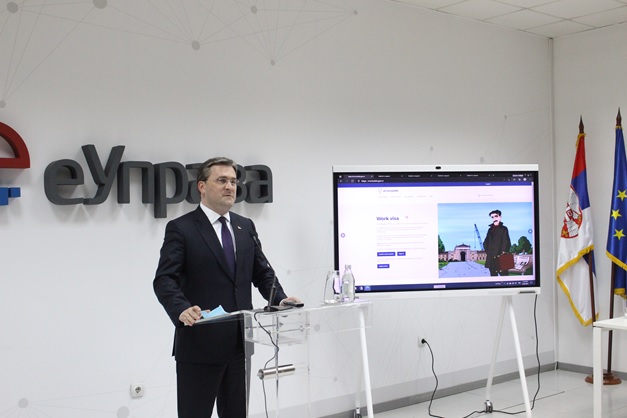
A new service of the Ministry of Foreign Affairs "e-Consulate" was presented in Belgrade today, intended for foreign citizens who apply for a visa and aspire to come to Serbia to work.
On that occasion, Minister of Foreign Affairs of the Republic of Serbia Nikola Selakovic said that this service was one of the indicators of good development of our country, which, as he pointed out, was becoming a magnet for serious foreign companies, which brought a large number of workers from other countries to work in Serbia.
"Not to be pretentious, but completely realistic, this service represents a turning point in the functioning of our system. E-Consulate and digitalization of the procedure for issuing work visas for foreign citizens who want to work in Serbia, is the first electronic service offered by the Foreign Ministry, and I can promise you that this is indeed our first, but by no means the last e-service", Selakovic emphasized.
The Head of Serbian diplomacy pointed out that "e-Consulate" reflected the modernization of an extremely important segment of the activities of diplomatic and consular missions of Serbia, and that we were actually talking about something that was essential for the further development processes of our country.
The Minister recalled that, when the President of the Republic visited the construction site of the Moravian Corridor, he was told that some construction works were delayed because Bechtel company was not issued work visas on time.
“The moment we saw that and heard the President, I alerted the services in the Ministry. We were surprised, as we knew that the issuance of visas in Turkey had a good dynamic, and then we determined that it was actually workers from Bangladesh who applied for a visa through our Embassy in India, where we have a problem with staff shortage”, the Minister explained.
As he added, this is a demanding and laborious task, each of our employees had to receive the documentation on paper, check it, then request additional information, and only then forward it.
"Today, this has been fantastically perfected for our consular officers, all that documentation is submitted in electronic form. We used to have two filters to check the documentation, now we actually have three. And the work is significantly more efficient", Selakovic pointed out.
As he emphasized, this is a service which was promised less than four months ago and it becomes available on Monday, in 95 diplomatic and consular missions of Serbia, i.e. in all our embassies and consulates general.
The biggest result of that endeavor, the Minister pointed out, apart from the advantage it would bring in the future work, was the fact that it was not a project of one state body, but a joint endeavor of the Ministry of Foreign Affairs, IT and eGovernment Office, General Secretariat of the Government, Ministry of the Interior, Ministry of Labor, Employment, Veterans and Social Affairs, National Employment Service.
“We did an extremely good job in record time. This is to the pride of our Ministry, to the pride of the entire state. I am convinced that in the period ahead, we will further modernize our affairs and make Serbia one of the few countries that has such mechanisms and such state-of-the-art provision of consular services", Selakovic said.
Speaking about the "e-Consulate" portal itself, the Minister explained that there is a cartoon of Nikola Tesla and the building of the old railway station with one crane, which actually symbolizes a historical fact - that Tesla was in Belgrade in the year when it was built.
"Today it is the place behind which the Belgrade of the future is rising, and what we managed to do together is an indicator of something that is the future of Serbia, the development of artificial intelligence, IT and creating conditions for more people to live and arrive here in Serbia in the future seeking good life and employment", concluded the Minister.
The Director of the Office for IT and eGovernment, Mihailo Jovanovic, said that this was the first time that e-services were focused on foreign citizens, which was the case with our citizens so far. In the period from 1 January 2019 to 17 May this year, the most applications for Serbian visas were submitted at the Embassy in Beijing, 6,766 applications, then in New Delhi - 2,973, Shanghai 2,115, Tokyo 1,798, and Cairo 1,756.
In that period, 1,270 requests were submitted in Algiers, 1,095 in Jakarta, and 1,077 in Beirut.
In terms of their nationality, Serbian D visa for employment is most requested by citizens of China - 9,516 applications, followed by India 1,955, and Ukraine - 673.
|
|
|
| Le 20 mai 2021- Le ministre Selaković a présenté le nouveau service e-Consulat |
|

Un nouveau service a été présenté aujourd’hui du Ministère des Affaires étrangères, e-Consulat, destiné aux ressortissants étrangers demandant un visa de travail pour la Serbie.
A cette occasion le ministre des Affaires étrangères de la République de Serbie Nikola Selaković a dit que ce service était l’un des signes du bon développement de notre pays qui, comme il l’a souligné, attirait de plus en plus les groupes étrangers d’envergure, faisant venir un grand nombre d’ouvriers d’autres pays pour travailler en Serbie.
- Je ne veux pas être prétentieux, mais tout à fait réaliste, en disant que ce service représente un tournant dans le fonctionnement de notre système. E-Consulat et la numérisation du procédé de délivrance des visas de travail aux ressortissants étrangers voulant travailler en Serbie, c’est le premier service virtuel du MAE et je peux vous permettre qu’il s’agit d’un premier e-service, mais surtout pas du dernier, a souligné Selaković.
Le chef de la diplomatie serbe a indiqué que l’e-consulat constituait une modernisation d’un volet extrêmement important de l’activité des missions diplomatiques et postes consulaires de la Serbie et qu’on était là face à un enjeu d’intérêt essentiel pour les avancées de notre Etat.
Le ministre a rappelé que lors de la visite du président de la République du corridor de la Morava on lui a dit que certains travaux tardaient car on n’avait pas délivré les visas de travail en temps utile à la société Behtel.
- Dès qu’on l’a appris et en entendant le président, j’ai alarmé les services au sein du Ministère. On était étonnés de voir cela, nous savons que la délivrance des visas en Turquie allait bon train, mais alors on s’est rendu compte qu’il s’agissait des ouvriers du Bangladesh qui avaient demandé le visa via notre ambassade à l’Inde, là où nous avons un problème avec le nombre insuffisant d’employés, a expliqué le ministre.
Il a ajouté qu’il s’agissait d’un travail grand et exigeant, chacun de nos employés a dû recevoir la documentation sur papier, la vérifier, demander alors qu’elle soit complétée, et ce n’est alors qu’il la transmettait pour la suite.
- Aujourd’hui c’est merveilleusement bien modernisé et notre employé consulaire reçoit toute cette documentation en version électronique. Avant nous avons eu deux filtres pour la vérification de la documentation, en effet, nous en avons trois maintenant. Et le travail est beaucoup plus efficace, a relevé Selaković.
Il a dit qu’il s’agissait d’un service promis d’être accompli il y a moins de quatre mois et qu’il était accessible depuis lundi en 95 missions diplomatiques et postes consulaires serbes, soit dans tous nos ambassades et consulats généraux.
Le plus grand aboutissement de cet exploit, a souligné le ministre, outre l’avantage amené au fonctionnement futur, c’est le fait que ce n’est pas un projet d’un seul organe d’Etat, mais un projet conjoint du Ministère des Affaires étrangères, du Bureau TI et e-gouvernance, du Secrétariat général du gouvernement, du Ministère de l’Intérieur, du Ministère du Travail, Emploi, Anciens combattants et Affaires sociales, et de la Direction nationale des cadres.
- Dans un temps record nous avons fait un très bon travail. C’est la fierté de notre Ministère, de tout notre Etat. Je suis persuadé que dans la période à venir nous allons moderniser encore nos activités et rendre la Serbie l’un des rares pays possédant de tels mécanismes et des moyens les plus modernes pour l’exercice de nos affaires consulaires, a dit Selaković.
Parlant du portail e-Consulat le ministre a expliqué qu’il y avait une caricature présentant Nikola Tesla et l’édifice de l’ancienne gare avec une grue, symbolisant en fait un fait historique – Tesla fut à Belgrade cette année-là où elle a été construite.
- Aujourd’hui c’est un lieu derrière lequel apparaît Belgrade du futur, et ce que nous avons réussi à faire par nos efforts conjoints est l’indicateur de quelque chose qui est le futur de la Serbie, le développement de l’intelligence artificielle, les TI et la création de conditions pour qu’en Serbie dans l’avenir vivent de plus en plus de gens et qu’ils viennent ici pour vivre bien et travailler, a conclu le ministre.
Le directeur du Bureau TI et e-gouvernance Mihailo Jovanović a dit que c’est la première fois que les e-services sont tournés vers les ressortissants étrangers, jusqu’ici portés sur nos ressortissants.
Dans la période du 1er janvier 2019 au 17 mai courant, le plus grand nombre de demandes de visa a été déposé à l’Ambassade de Péking, à savoir 6.766 demandes, suivent New Delhi avec 2.973, Shanghai avec 2.115, Tokyo 1.798 et Le Caire 1756.
Dans la même période Alger a été saisi de 1.270 demandes, Djakarta 1.095 et Beyrouth 1.077.
Concernant la citoyenneté le visa serbe D pour l’emploi est le plus demandé par les ressortissants chinois – 9.516 demandes, puis ceux de l’Inde – 1.955 et de l’Ukraine -673.
|
|
|
| AMBASSADOR ĐUROVIĆ SIGNED THE COUNCIL OF EUROPE CONVENTION ON АN INTEGRATED SAFETY, SECURITY AND SERVICE APPROACH AT FOOTBALL MATCHES AND OTHER SPORTS EVENTS |
|
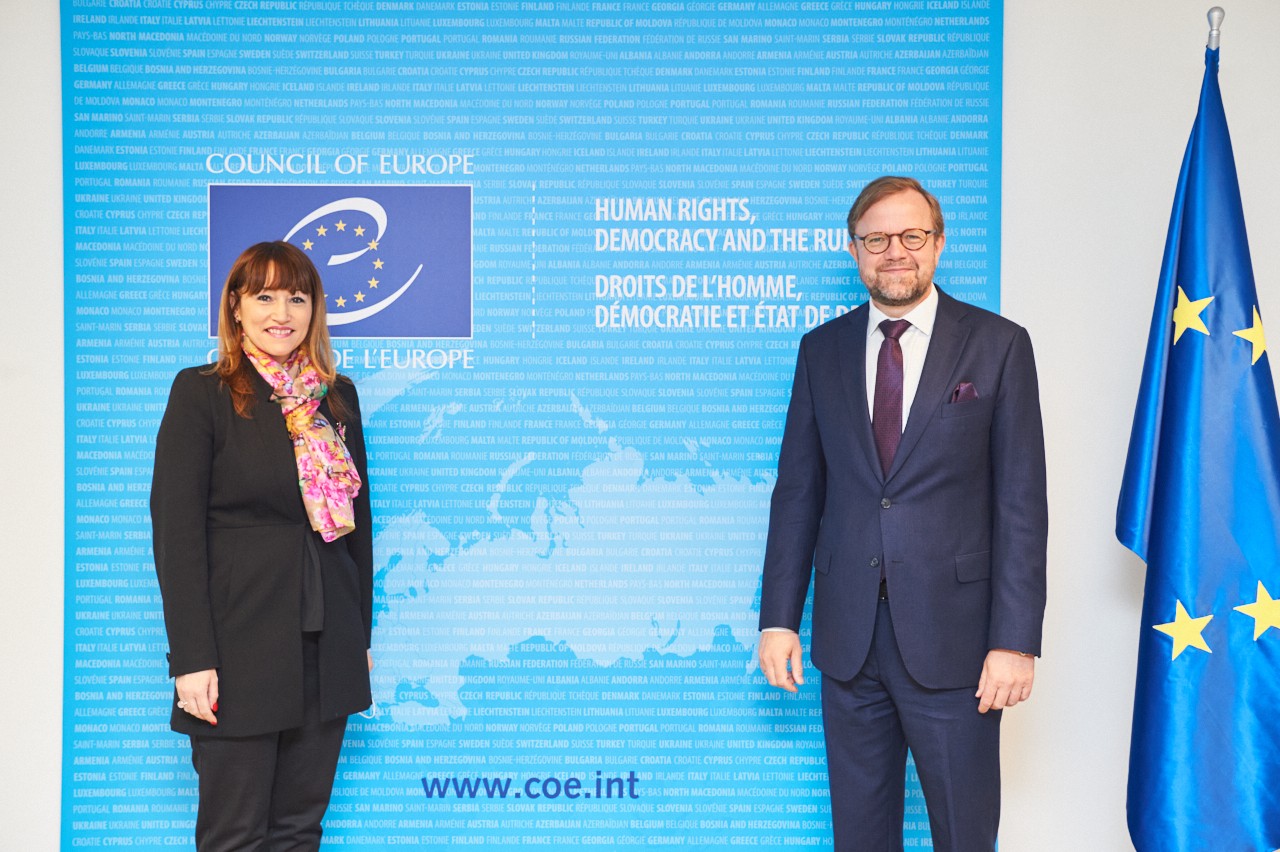
Amb. Aleksandra Đurovic, in the presence of Bjorn Berge, Deputy Secretary General of the Council of Europe, signed the Council of Europe Convention on аn Integrated Safety, Security and Service Approach at Football Matches and Other Sports Events, also known as the Saint-Denis Convention.
The Convention was signed at the Palace of Europe in Strasbourg on 17th of May 2021. So far, the Convention, which was opened for signature in Saint-Denis on 3rd of July 2016, has been signed by 36 states, including the Republic of Serbia, with 20 countries having already completed the ratification procedure.
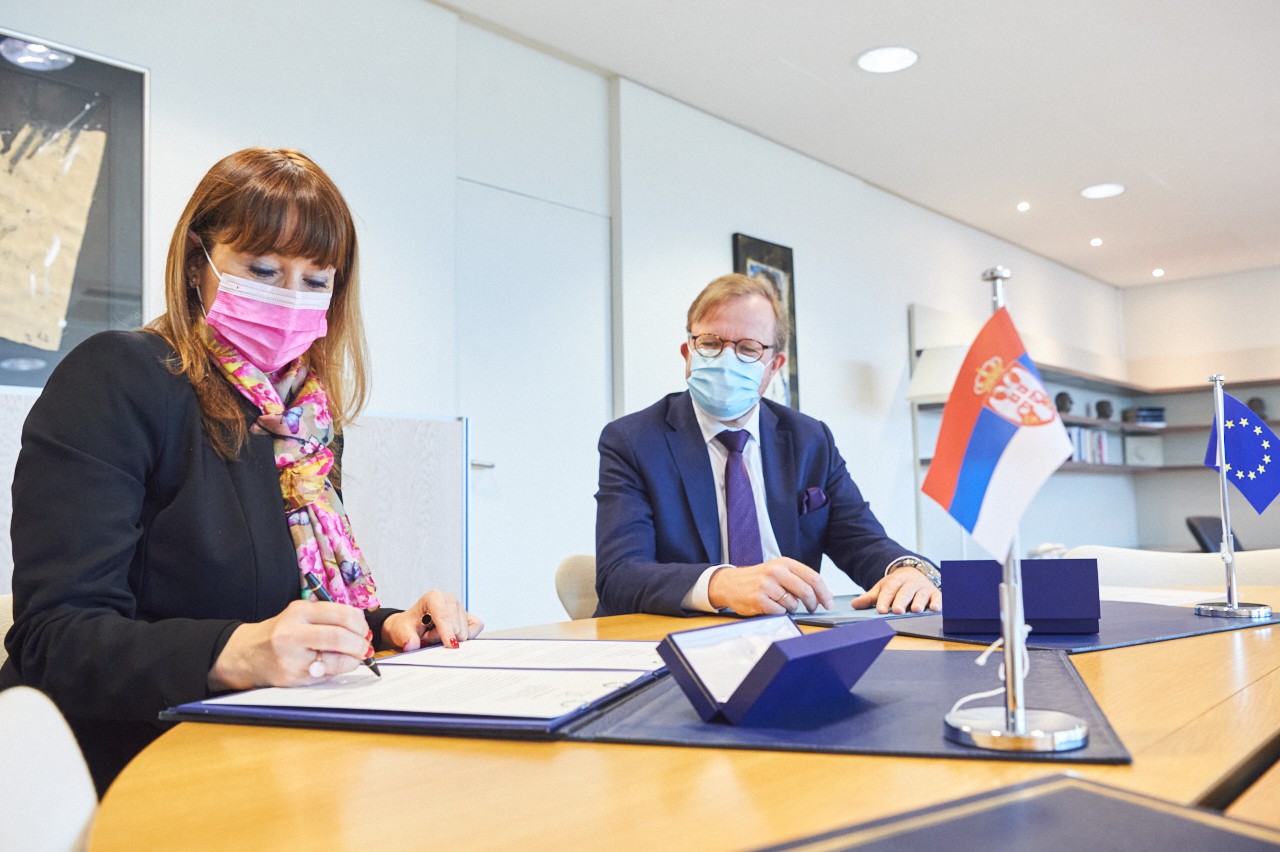
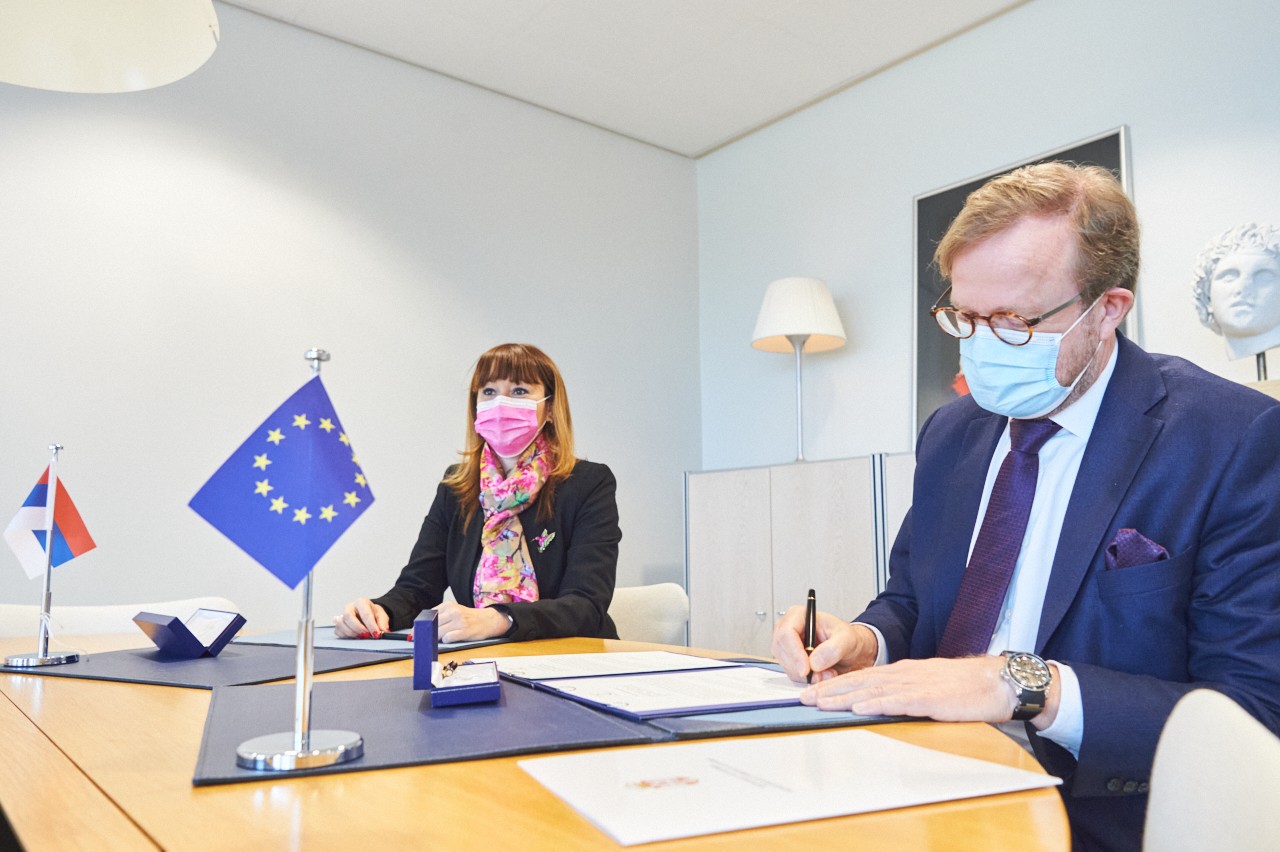
The Saint-Denis Convention is the only internationally binding instrument to establish an integrated approach based on three interdependent pillars: safety, security and service.
The purpose of the convention is to ensure that football and other sports events provide a safe, secure and welcoming environment for all individuals through the implementation of an integrated approach on safety, security and service at sports events by a plurality of actors working in a partnership amid an ethos of co-operation.
It provides measures based on the highest safety, security and service standards developed in Europe and promotes co-operation between all public and private stakeholders in order to provide a safe, secure and welcoming environment at football matches and other sports events.
|
|
|
| 21st April 2021 - President Vučić met via video link with representatives of the IMF delegation |
|
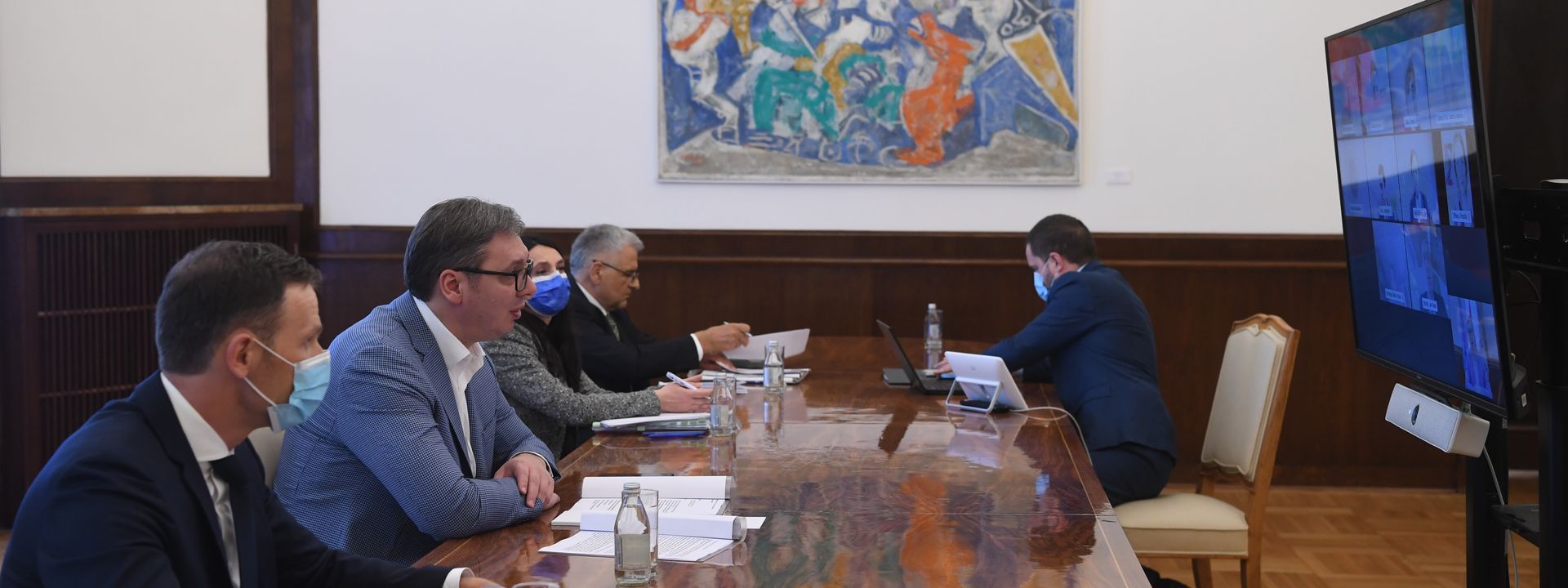
President of the Republic of Serbia Aleksandar Vučić talked today via a video link with the representatives of the delegation of the International Monetary Fund led by the Head of the Mission, Jan Kees Martijn. The interlocutors concluded that Serbia's main goal remains to preserve the hard-earned reputation of a fiscally secure country, as well as to continue with a responsible fiscal policy so that public debt does not exceed 60 per cent of GDP, whereby Serbia continues to work on further economic growth.
During the conversation, President Vučić and Jan Kees Martijn especially referred to the incentive measures and adopted three packages of measures to help the economy and citizens, which preserved macroeconomic stability and even achieved a higher employment rate. Martijn commended the responsible economic policy of Serbia and the successful crisis management during the pandemic.
"Serbia achieved one of the best results last year despite the challenges of the pandemic", Martijn said, noting that Serbia was one of the few countries to which the IMF did not adjust the initial projection of the 5% growth rate it gave last year.
President Vučić added that following the first quarter of 2021, Serbia is well on its way to achieving the planned growth of 6% as planned, since one of the main focuses of the Government is investing in large infrastructure projects and intensifying work on attracting foreign direct investments.
"In 2020, Serbia was at the very top in terms of economic growth in Europe, and I am convinced that this year we can enter the first three or four countries in terms of growth", said President Vučić, adding that he was satisfied that Serbia still, despite the pandemic situation, has an extremely strong inflow of investment.
President Vučić and Jan Kees Martijn also discussed a new advisory arrangement, which is of special importance in light of the improvement of the general investment climate in Serbia, as well as in the context of even greater investor assurance.
"Given Serbia's tremendous progress over the past eight years, the priority goal of this arrangement will be to preserve the results achieved, but also to provide support for further implementation of structural reforms aimed at even faster, stronger and more sustainable growth", said President Vučić and thanked the IMF and the personal engagement of Jan Kees Martijn in the professional and expert support that Serbia is counting on.
President Vučić pointed out that Serbia will pay special attention to reforms in public companies, and that priorities will continue to be investments in infrastructure, creating an even better climate for investments, greater investments in the environment, science and capital projects, which will further contribute to the long term stable financial growth in the coming years.
Source: www.predsednik.rs
Photo: www.predsednik.rs
|
|
|
| 20th April 2021 - Meeting with the World Health Organization Regional Director for Europe |
|
President of the Republic of Serbia Aleksandar Vučić met today with the Regional Director of the World Health Organisation for Europe Hans Kluge, to discuss cooperation in the fight against the COVID-19 pandemic, as well as cooperation in improving health care in our country and other joint activities.
President Vučić thanked Dr Kluge for his personal engagement and support during the current pandemic, especially for technical assistance and expertise. On this occasion, he informed the WHO official about the results of immunisation in Serbia and plans on how to provide the vaccine to all citizens who want to get it.
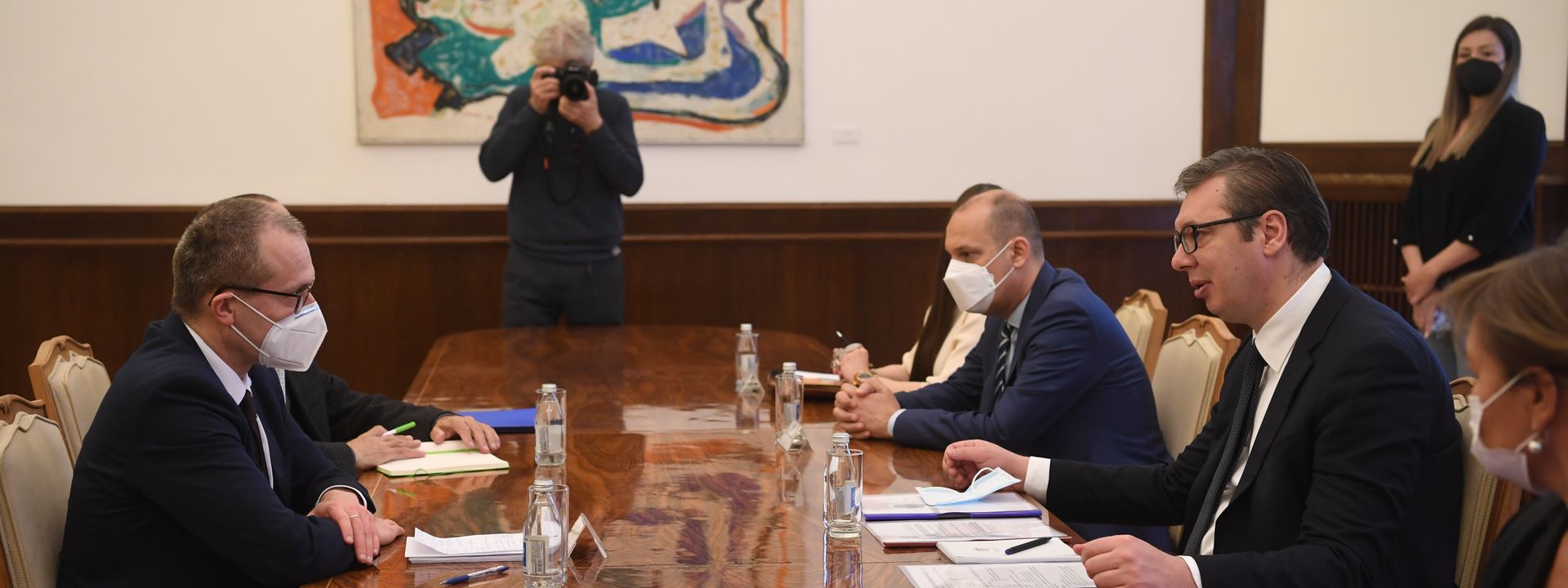
Dr Kluge congratulated President Vučić on his leadership and personal commitment to provide vaccines. He emphasised that Serbia, with its good immunisation strategy, ranked among the global leaders, thus becoming an example of humanity and solidarity by enabling vaccination of elderly people in rural areas, foreign citizens and donating vaccines to other countries.
"Serbia has accepted the vaccine as a life-saving product and has not looked at it geopolitically", said Dr Kluge.
The two interlocutors agreed that the world should increase production capacities for vaccines, as well as develop new adequate therapies for the fight against COVID-19, and, in this regard, work on increasing the level of citizens' trust in science.
President Vučić informed Dr Kluge about the plans for improving the work of the Institute for Virology, Vaccines and Sera "Torlak".
"We want to make 'Torlak' one of the best vaccine factories in Europe", said President Vučić.
Source: www.predsednik.rs
Photo: www.predsednik.rs
|
|
|
| 19 April 2021 - WHO describes immunisation process in Serbia as impressive |
|
Prime Minister Ana Brnabic talked today with World Health Organisation (WHO) Regional Director for Europe Hans Kluge about the epidemiological situation and the course of immunisation of citizens in Serbia.
Brnabic expressed gratitude for the cooperation in the fight against the pandemic, technical assistance and expertise, emphasising that the support of this organisation is very important for our country.
She informed the WHO Regional Director for Europe about the course of immunisation of citizens in Serbia, expressing her belief that, thanks to the large number of vaccinated people, we will be able to create collective immunity and return to normal life.
Kluge assessed the immunisation process in Serbia as impressive, and added that Serbia has made a good decision to offer citizens all available vaccines used in the fight against coronavirus.
Expressing concern over the emergence of new strains of the virus, he stressed the need to speed up the immunisation process and show mutual solidarity.
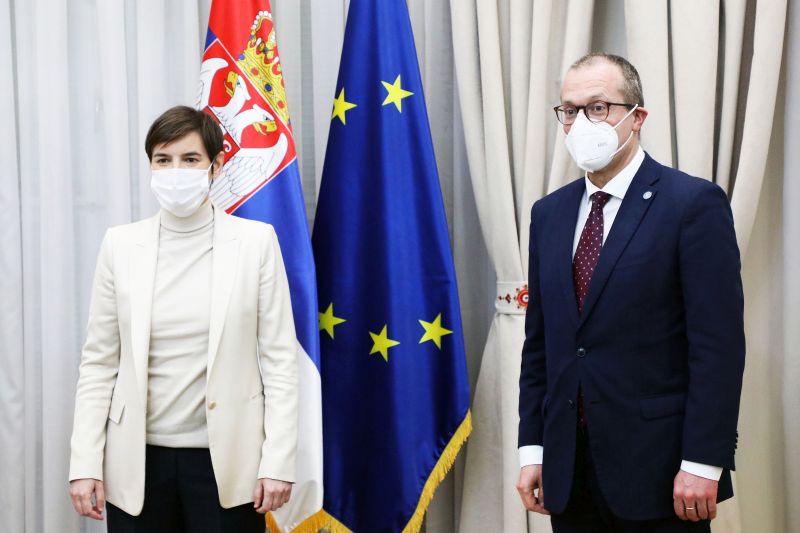
The WHO Regional Director for Europe praised Serbia for the humanity it has shown by donating vaccines to the countries of the region and enabling vaccination for those who do not have a sufficient number of vaccines for their citizens.
The Prime Minister said that Serbia will continue to cooperate with the countries of the region and help in accordance with its capabilities.
When it comes to the project "Roadmap for Health in the Western Balkans 2021-2025", it was stated that, if epidemiological conditions allow, a regional meeting will be held in Belgrade at the end of the year, important for future improvement of cooperation between countries in the field of health challenges.
Source: www.srbija.gov.rs
Photo: www.srbija.gov.rs
|
|
|
| 13 April 2021 - Selakovic: Pristina persists in its campaign of hatred against the Serbian people |
|
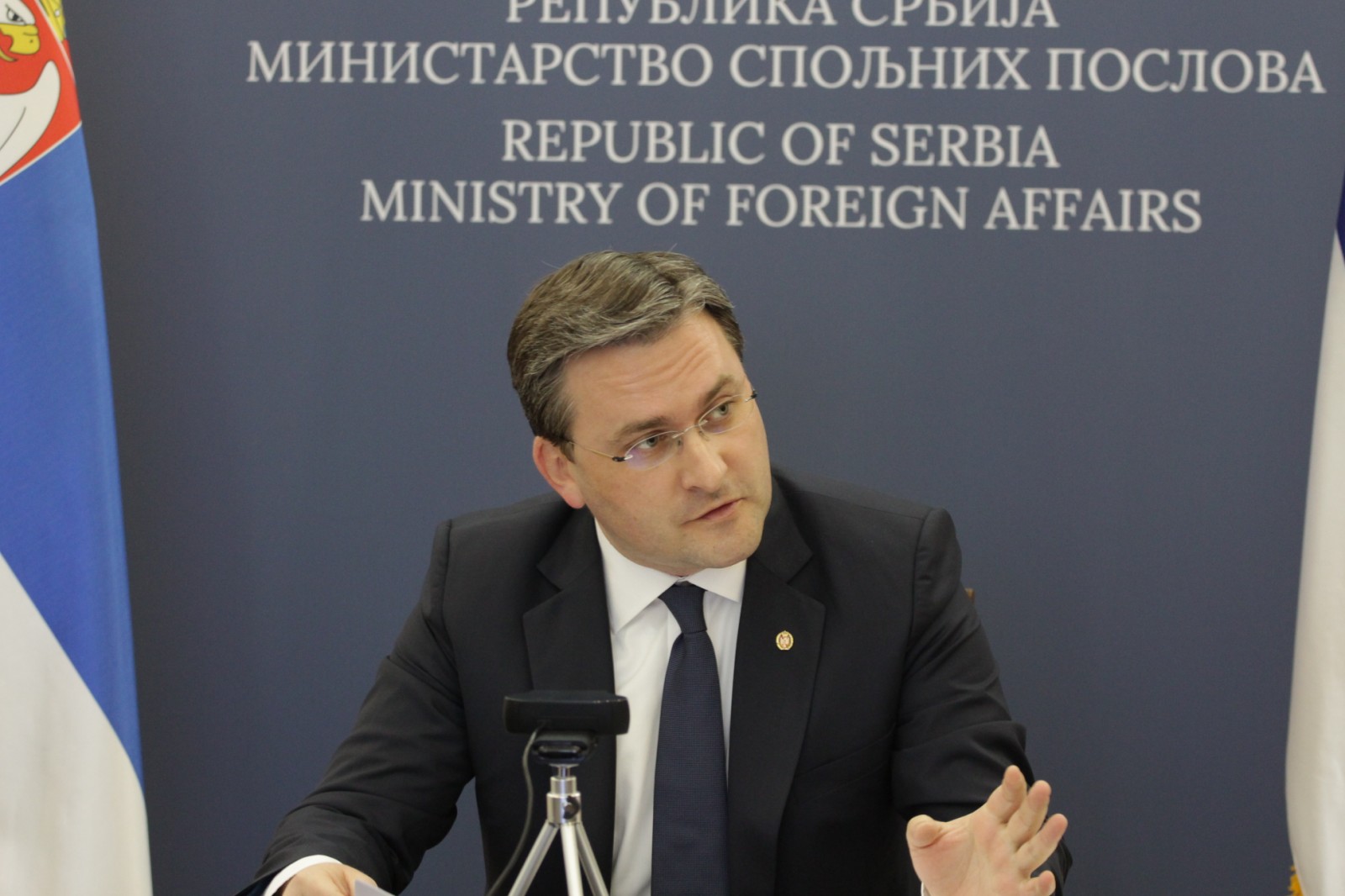
Minister of Foreign Affairs of Serbia Nikola Selakovic stated today that Pristina further persisted in its campaign of hatred against the Serbian people, which was most drastically seen in the unfounded accusations of mass rapes and genocide.
At the UN Security Council meeting discussing the Report of the UN Secretary-General on the work of UNMIK, Selakovic emphasized that the efforts of the provisional institutions in Kosovo and Metohija to create a narrative about mass rapes of Albanian women were obvious, and that propaganda methods and lies were used for that purpose.
"It is clear that there were victims on all sides in the conflict, as well as that our side has evidence of numerous Serb victims. But the precondition for ensuring the protection of rights that belong to each individual victim is a rational and well-argued approach", Selakovic said responding to the slander of the Pristina representative.
Selakovic underlined that, contrary to the claims of politicians from Pristina about 20,000 raped Albanian women, the information provided by the Commission for the Verification and Recognition of Sexual Violence Victim Status indicates 912 raped persons, however, failing to include in this number the Serb women who were victims of violence.
"Let me emphasize that Serbia condemns every act of sexual violence in conflicts and is committed to achieving justice for all victims. The number of victims certainly does not diminish the horrific effect of this type of violence on each victim individually, but also, speculating on numbers does not contribute to justice being served and leads to politicization and slowing down the reconciliation process", Selakovic said.
Regarding the genocide accusations, Minister Selakovic stated that they only went to prove that Pristina further persisted in its campaign of hatred, propaganda and open hostility towards the Serbian people.
"Through statements given on a daily basis, they attempt to paint a picture that Serbia is to blame for everything and that genocide was committed against Albanians, all in order to hide their own responsibility for the committed crimes", the Serbian Foreign Minister said.
He underlined that anyone who knew what the definition of genocide implied would understand that it was not Serbia that committed something, but that the Serbian people was instead a victim of the "state-building" project of the Kosovo Albanians, based on the dangerous idea of ethnically clean territories, as evidenced by more than 200,000 expelled Serbs from Kosovo and Metohija.
"We are convinced that the civilized world will not agree to be their accomplice in concealing and covering up their crimes, and that a clear message will be sent to them that they must take responsibility for their actions", Selakovic said. He reminded that until 1999, around 40,000 Serbs lived in Pristina, and that today there were only about twenty of them, that around 17,000 Serbs lived in Pec, and that today there were only the Serbian nuns in the Patriarchate of Pec, that around 12,000 Serbs lived in Prizren before the war, and that today only 17 families remained there, and that in Urosevac, out of 10,000 Serbs who lived there before the war, only the family of a Serbian priest remained.
|
|
|
| 13 April 2021 - Selakovic: Political extremism of Albanians in Kosovo and Metohija is becoming stronger |
|
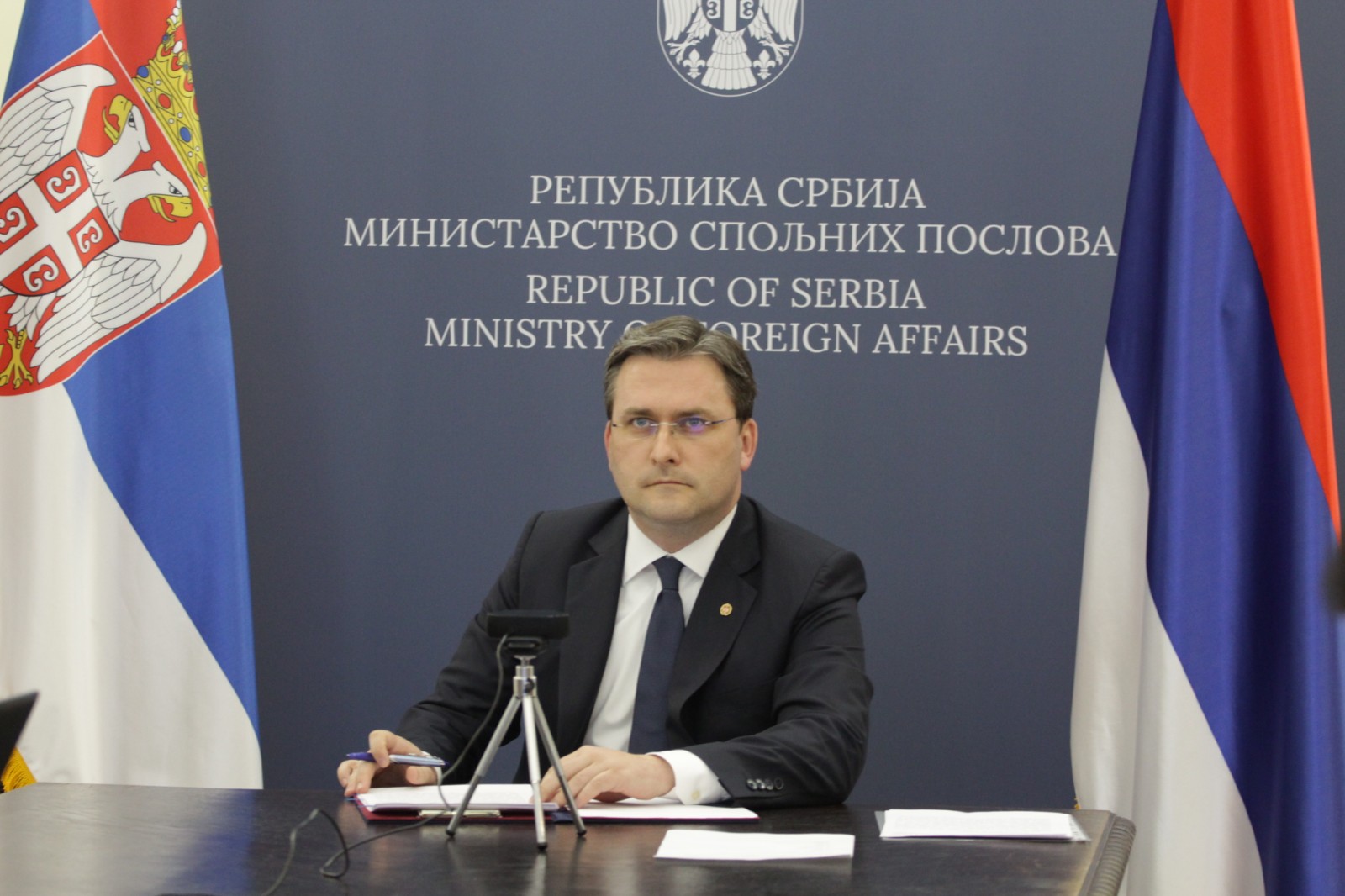
Minister of Foreign Affairs of Serbia Nikola Selakovic warned, at the United Nations Security Council meeting, that the political extremism among Albanians in Kosovo and Metohija was not decreasing, but on the contrary, was becoming stronger.
At the meeting discussing the Report of the UN Secretary-General on the work of UNMIK, Minister Selakovic recalled that the obligation to form the Community of Serb Municipalities remained unfulfilled for 2,917 days now and that, in fact, 19 April marked eight full years since the agreement was reached in Brussels, while Pristina still refused to follow up on its commitment and enable the formation of the Community of Serb Municipalities.
The Minister reminded that the current Prime Minister of the provisional institutions of self-government in Pristina repeatedly threatened to unite the self-proclaimed Kosovo and Albania, and that he also stated that the dialogue with Belgrade was low on the list of his priorities.
Minister Selakovic pointed out that it was high time for Albanian leaders in Pristina to show responsibility in fulfilling their commitments, but also a sincere commitment to reaching a compromise solution and building mutual trust.
"Serbia is determined and will not give up on identifying a compromise solution, which will be sustainable for future generations as well. The only way to build lasting peace and stability in our region is by working to build trust and insisting on positive political agendas", Selakovic concluded.
According to the Minister, lasting peace and stability can only be achieved if none of the participants in the dialogue pursued maximalist demands and insisted on the complete humiliation of the other.
He pointed out that the Serbian and Albanian peoples, as the two most numerous peoples in the Western Balkans, needed to find a way to reach reconciliation and a basis for cooperation, both in terms of the economy and in achieving shared prospects for membership of the European Union.
"Belgrade has made sincere steps in that direction, by being one of the initiators of the idea of relaxing the flow of people, goods, capital and services, popularly referred to as "mini-Schengen", the Minister underlined.
Pointing out that Serbia had time and time again demonstrated its commitment to dialogue as the only way towards a peaceful, political solution to the problem in Kosovo and Metohija, Selakovic underscored that the recent elections in the Province confirmed that political extremism among Albanians in Kosovo and Metohija was not decreasing, but on the contrary, was becoming stronger, which could be seen during the recent pre-election process. Minister stressed that political pressures on Serbs continued even after the election process was completed, by denying Serbs fair representation in provisional institutions as the new so-called government in Pristina decided to assign only one ministry to the Serb community.
"Serb returnees represent a particularly vulnerable category, who spend their every day in fear of being attacked. I remind you that the southern Serbian province is still an area with the lowest return rate of displaced persons in the world", the Minister said and emphasized that, in the last year alone, more than 80 attacks and incidents took place in our southern province, targeting Serbs, their property and religious sites.
It is particularly worrying for the Serbian people in Kosovo and Metohija, Selakovic noted, that in the previous period, and especially in March this year, there were frequent physical attacks on the property of the Serbian Orthodox Church.
"A striking example of the disrespectful attitude towards Serbian cultural and religious monuments in the Province, whose exceptional universal value UNESCO confirmed by inscribing them on the World Heritage List, is the case of the Visoki Decani Monastery", the Minister underlined.
Furthermore, the Serbian Foreign Minister assessed as concerning the breaking into the Health Center in Strpce by police inspectors and officers, in January this year, who conducted a search aiming to discover Covid-19 vaccines there, originating from central Serbia.
"Although we consider this to be an intrusion into a health care institution, our reaction was restrained this time as well. We did not want our decisions to cause escalation and politicization of activities that are solely aimed at protecting public health. We organized the vaccination of citizens from Kosovo and Metohija at three locations in central Serbia and thus clearly demonstrated that people's lives are the top priority to us", the Minister stressed.
Minister Selakovic stated that Serbia highly valued the activities of UNMIK mission in Kosovo and Metohija and that it supported it in carrying out its work as efficiently as possible and undiminished in scope, aiming to build and preserve security in the Province.
Selakovic said that the international missions in Kosovo and Metohija - UNMIK, KFOR, EULEX and the OSCE mission, under the administration of the United Nations and in line with UNSC Resolution 1244, played a key role in the preservation of peace and protection of the population.
"We support and respect their engagement and efforts made in the framework of their mandates, with the common goal of creating conditions for a peaceful and safe coexistence of the inhabitants of Kosovo and Metohija. The Serb and other non-Albanian population in Kosovo and Metohija have the utmost confidence in the international presence and consider it a guarantor of security and a barrier against the arbitrariness of the provisional institutions in Pristina", the Minister emphasized.
He said that this demonstrated the need that international missions remain engaged in an undiminished scope, in order to consistently implement UNSC Resolution 1244.
Selakovic further emphasized the importance of KFOR international forces and pointed out that any unilateral attempt to assign to someone else or that someone else assumes a part of KFOR's mandate and responsibilities constitutes a violation of UNSC Resolution 1244.
The Minister also noted as unacceptable the unilateral decisions on the formation of the Pristina "Ministry of Defence" and launching the process of transforming the so-called "Kosovo Security Forces" (KSF) into the so-called "Kosovo Army".
At the beginning of his statement, Minister Selakovic lodged a protest against the abuse of the video format of the session by the representative of Pristina as she had a flag of the self-proclaimed "Kosovo" placed behind her, and the representative of Russia did the same.
Below is an integral version of the speech of the Minister of Foreign Affairs Nikola Selakovic
Distinguished President of the Security Council,
Distinguished Special Representative,
Esteemed members of the Security Council,
At the outset, I have no choice but to lodge a protest against the abuse of the video format of this session on the part of the representatives of Pristina in order to promote the symbols of the so-called statehood of Kosovo. Despite the fact that the representatives of Pristina were warned on several occasions, including by the President of the Security Council at the previous session, that such abuses of Security Council sessions are absolutely unacceptable and constitute a flagrant violation of the Security Council rules on participation of representatives of the provisional institutions of self-government in Pristina, under Rule 39 of the UN Security Council Rules of Procedure, we are again faced with their reckless disregard for the rules of this distinguished body. Let me reiterate our call for the necessary steps to be taken to prevent such abuses.
It is my great pleasure to address this august body at the meeting on the work of the Mission of the United Nations in Kosovo and Metohija. At the outset, I would like to thank Secretary-General of the United Nations Mr. Guterres and Special Representative of the Secretary-General and Head of UNMIK Mr. Tanin for the report submitted and for their efforts made towards the implementation of the UNMIK mandate, and also to the members of the Security Council for the continued attention they have devoted to the issue of Kosovo and Metohija. The Republic of Serbia highly values the activities of the Mission of the United Nations in Kosovo and Metohija and supports it in carrying out its work as efficiently as possible and undiminished in scope, aiming to build and preserve security in the Province.
Mr. President,
In the previous period we have faced political instability in Kosovo and Metohija. We recently had elections in the Province, which unfortunately confirmed that political extremism among Albanians in Kosovo and Metohija is not decreasing, but on the contrary, is becoming stronger. We have witnessed Albanian leaders competing among themselves in efforts to find the best way to provoke an incident in Serb communities, in order to score political points of the Albanian electorate. Under the pretext of amending the voter list, a large number of Serbs in Kosovo and Metohija were deprived of one of their fundamental political rights - the opportunity to elect their political representatives. Out of approximately 140,000 of citizens of Kosovo and Metohija who were removed from the voter list in the latest election process, 85% are Serbs.
Despite numerous challenges and problems, the Serbian people in Kosovo and Metohija have shown, by high turnout and a convincing victory of the Serb List which won all ten seats reserved for Serbian representatives, that nothing can stop them from resolutely defending their position. Political pressures on Serbs continued even after the election process was completed, by denying Serbs fair representation in provisional institutions as the new so-called government in Pristina decided to assign only one ministry to the Serb community.
Distinguished members of the Security Council,
Unfortunately, it was not only during the election activities that we witnessed the unreasonable anti-Serb policy being pursued by the provisional institutions in Pristina. This goes to the length of breaking into the Health Center in Strpce, in the south of Kosovo and Metohija, by police inspectors and officers from Pristina, in January this year, who conducted a search aiming to discover Covid-19 vaccines there, originating from central Serbia, which they did not find. In doing so they demonstrated force and threatened to arrest the director of the Health Center, medical staff and doctors. At a time when the whole world is fighting the pandemic with vaccines being the only way to end this challenge, while Serbia is showing support and solidarity by donating vaccines and medical equipment to all in need in the region, Pristina wants to destroy vaccines only because they originate from central Serbia. As the whole world expresses gratitude to medical doctors, who have made great and heroic sacrifices in combating the virus, the provisional institutions in Pristina are attacking Serbian doctors for doing their job.
Although we believe that intrusions into health care institutions are inadmissible, our reaction was restrained this time as well. We did not want our decisions to cause escalation and politicization of activities that are solely aimed at protecting public health. We organized the vaccination of citizens from Kosovo and Metohija at three locations in central Serbia and thus clearly demonstrated that people's lives are the top priority to us. Serbia continues to be ready to help all in need of assistance, and we call for reason and responsibility, especially in such difficult times.
Mr. President,
Attacks targeting Serbs and their property have been on the rise. In the last year alone, more than 80 attacks and incidents took place in our southern province, targeting Serbs, their property and religious sites. According to the information provided by the OSCE Mission in Kosovo and Metohija, in the second half of last year, the number of incidents increased by more than 30% compared to 2019. Therefore, we cannot agree with the assessment that the "security situation in Kosovo remained stable, with a few incidents reported affecting non-majority communities". Last weekend, for example, an entirely unprovoked physical attack by a group of Albanians on two Serb young men took place in the northern part of Kosovska Mitrovica.
Serb returnees represent a particularly vulnerable category, who spend their every day in fear of being attacked. The fact that one family of returnees was the target of seven attacks clearly indicates the persistence of those who do not want Serbs in Kosovo and Metohija. There is absolutely no trace of political will in Pristina for 212,995 displaced Serbs who have been living outside Kosovo and Metohija for 22 years to return to their homes. Since 1999, the rate of sustainable return of internally displaced persons in Kosovo and Metohija has been only 1.9%, which according to the UN data is officially the lowest percentage of return of expelled population after a conflict anywhere in the world.
At the same time, while arresting internally displaced persons, Pristina authorities are exerting the strongest of pressures on the Specialist Chambers in The Hague. The aim is to completely prevent the further processing of a number of cases against members of the terrorist KLA, on charges of serious crimes committed during the conflict in Kosovo and Metohija against both Serbs and persons belonging to other nationalities. President of the Specialist Chambers Madam Trendafilova recently warned that, should the pressures continue, this would have very dramatic consequences to the trials in progress. President Trendafilova underlined as highly problematic the phenomenon of witness intimidation, who are key for conducting proceedings successfully and rendering a proper verdict.
Although the wait to raise indictments was far too long, we consider it commendable that efforts have finally been made to punish the perpetrators of numerous serious crimes which were committed during the armed conflicts a little over two decades ago, but also upon the arrival of the international forces to Kosovo and Metohija. For example, no one has been held accountable to this day for the killings and abductions of 17 journalists in Kosovo and Metohija, which is currently the largest number of unsolved cases of murdered and kidnapped journalists in Europe. Furthermore, the perpetrators of any of the mass crimes committed against Serb civilians after 1999 have not been brought to justice. I will remind you of only a few of these cases: 14 Serb farmers were killed in the village of Staro Gracko, 12 displaced Serbs were killed and 43 wounded in the attack on the "Niš Express" bus in Livadice near Podujevo, and in Gorazdevac near Pec unknown persons fired automatic weapons on children who were swimming in the Bistrica river. Two Serb children were killed then, and four were seriously injured.
We expect the EULEX Mission to continue to support the Specialist Chambers and the Specialist Prosecutor's Office, as well as its additional engagement in the field of the rule of law. Special attention needs to be devoted to witness protection, and determining the fate of missing persons.
International missions in Kosovo and Metohija - UNMIK, KFOR EULEX and OMIK are an integral part of the international civilian and security presence in our southern province, under the administration of the United Nations and in line with UNSC Resolution 1244 (1999), and play a key role and make an outstanding contribution to the preservation of peace and protection of the population. We support and respect their engagement and efforts made in the framework of their mandates, with the common goal of creating conditions for a peaceful and safe coexistence of the inhabitants of Kosovo and Metohija. The Serb and other non-Albanian population in Kosovo and Metohija have the utmost confidence in the international presence and consider it a guarantor of security and a barrier against the arbitrariness of the provisional institutions in Pristina. This further demonstrates the need that international missions remain engaged in an undiminished scope, in order to consistently implement UNSC Resolution 1244.
I would like to further emphasize the importance of KFOR international forces and point out that any unilateral attempt to assign to someone else or that someone else assumes a part of KFOR's mandate and responsibilities constitutes a violation of the UNSC Resolution 1244, while also being a potential source of instability and tensions. I will remind you that Pristina, contrary to international law and completely ignoring the interests and positions of the Serb community in the Province, would not abandon its plans to install a new security actor in the territory of Kosovo and Metohija. We consider the unilateral decisions on the formation of the "Ministry of Defence" and launching the process of transforming the so-called "Kosovo Security Forces" (KSF) into the so-called "Kosovo Army" to be unacceptable. I would like to reiterate that such unilateral moves on the part of Pristina constitute a gross violation of the UNSC Resolution 1244 and the Military Technical Agreement, according to which only the International Security Forces, that is KFOR, have the mandate for all military aspects of security in the territory of Kosovo and Metohija.
In this context, an additional reason for concern is the announcement of the construction of the largest base of the "Kosovo Security Forces" in the southern part of Kosovska Mitrovica, which Serbs in the north of Kosovo and Metohija perceive as the most open provocation and threat to their physical safety.
Distinguished members of the Security Council,
It is particularly worrying for the Serbian people in Kosovo and Metohija that in the previous period, and especially in March this year, there were frequent physical attacks on the property of the Serbian Orthodox Church. In just two weeks, as many as seven Orthodox landmarks in the province were targeted by vandals, at a time when we all remember the March 2004 pogrom against Serbs and Serbian holy sites in Kosovo and Metohija. The condition of the Serbian cultural and spiritual heritage in Kosovo and Metohija is humiliating, including the four monuments that are inscribed on the UNESCO List of World Heritage in Danger (Visoki Decani, Holy Virgin of Ljevisa, Gracanica and the Patriarchate of Pec). Numerous administrative and technical barriers are imposed on priestly and monastic communities, which makes it more difficult or even impossible for them to survive on church property.
A striking example of the disrespectful attitude towards Serbian cultural and religious monuments in the Province, whose exceptional universal value UNESCO confirmed by inscribing them on the World Heritage List, is the case of the Visoki Decani Monastery.
Distinguished members of the Security Council,
The reason for the nervous behaviour of Pristina is all too obvious, as the project of the so-called independence today fails to be recognized by more than a half of the United Nations Member States, including five members of the European Union. However, it is high time for Albanian leaders in Pristina to show responsibility in fulfilling their commitments, but also a sincere commitment to reaching a compromise solution and building mutual trust.
I will remind you that the current Prime Minister of the provisional institutions of self-government in Pristina has repeatedly threatened to unite the self-proclaimed Kosovo and Albania in the past. A member of his party publicly said last weekend that the self-proclaimed Kosovo and Albania would be united, I quote, "with rifle and gunpowder, or referendum boxes".
I need not explain why such dangerous ideas constitute a direct threat to peace and stability. They violate Resolution 1244, while continuously destabilizing not only our southern province, but the entire region as well, and in no way contribute to the dialogue process, but instead hamper it again.
We have demonstrated time and time again our commitment to dialogue as the only way towards a peaceful, political solution to the problem in Kosovo and Metohija. Even today, after many years of negotiations, but also failure to fulfill what was agreed and constant unilateral moves and provocations on the part of the provisional institutions in Pristina, we are still ready to sit down at the table and talk.
We are ready for dialogue but not to be blackmailed and threatened and especially not for ultimatums recently presented by Prime Minister of the provisional institutions of self-government in Pristina. I will remind you of his statement that the dialogue will be low on the list of priorities of the Pristina authorities. It is bewildering how Pristina refers to ultimatums completely undermining any chance of dialogue, as the European Union also pointed out, as "principles" and how it persistently insists that Belgrade should recognize the unilaterally declared independence of "Kosovo", upon which, they believe, all else would be resolved. What is the purpose of the dialogue then, if Belgrade is only expected to recognize the so-called Kosovo? Does the dialogue imply that one side should give up everything only for the other to win it all? And does the dialogue, in Pristina's opinion, imply that what was agreed should not be fulfilled?
I will remind you that Pristina still refuses to follow up on its obligations arising from the agreements reached so far and does not agree to discuss their implementation within the dialogue. And the situation is quite simple - in April 2013, the first agreement was signed in Brussels, which envisaged four obligations: one for Pristina and three for Belgrade. Belgrade has fulfilled all obligations, while the only obligation that the provisional institutions in Pristina had - to form the Community of Serb Municipalities - has remained unfulfilled for 2,917 days now. In fact, 19 April marks eight full years since the agreement was reached in Brussels, and of Pristina's failure to fulfill the obligation to form the Community of Serb Municipalities.
Distinguished Mr. President,
Regardless of the discouraging messages heard from Pristina and the fact that the dialogue has been in progress for many years, Serbia is determined and will not give up on identifying a compromise solution, which will be sustainable for future generations as well. Lasting peace and stability can only be achieved if none of the participants in the dialogue pursues maximalist demands and insists on the complete humiliation of the other. The Serbian and Albanian peoples, as the two most numerous peoples in the Western Balkans, need to find a way to reach reconciliation and a basis for cooperation, both in terms of the economy and in achieving shared prospects for membership to the European Union.
Belgrade has made sincere steps in that direction, by being one of the initiators of the idea of relaxing the flow of people, goods, capital and services, popularly referred to as "mini-Schengen".
As far as Serbia is concerned, we are convinced that the only way to build lasting peace and stability in our region is by working to build trust and insisting on positive political agendas. The inhabitants of Kosovo and Metohija, of any nationality, whether they are Serbs or Albanians, do not deserve anything less.
Thank you for your attention.
|
|
|
| Le 13 avril 2021 Selaković: Priština persiste à faire sa campagne de haine contre le peuple serbe |
|

Le ministre des Affaires étrangères Nikola Selaković a constaté ce soir que Priština persiste à faire sa campagne de haine contre le peuple serbe, ce qui ressort le plus drastiquement en accusations sans arguments de viols massifs et de génocide.
Selaković a souligné, lors de la session du Conseil de sécurité de l’ONU dédiée au rapport du Secrétaire général de l’ONU sur le travail de la MINUK, que les tentatives sont manifestes des institutions intérimaires du Kosovo et Metohija de créer le narratif sur les viols massifs des Albanaises, utilisant à cet effet les méthodes de propagandes et de mensonges.
«Il est clair qu’il y avait des victimes de tous les côtés dans le conflit, et que notre partie dispose de preuves sur nombreuses victimes serbes. Mais la condition préalable pour réaliser la protection des droits de chaque victime individuelle c’est une approche rationnelle et argumentée», a dit Selaković, répondant aux calomnies de la représentante de Priština.
Selaković a relevé que, face aux allégations des politiques de Priština sur 20.000 Albanaises violées, il y a les données de la commission de vérification et reconnaissance de statut de victime de violence sexuelle au Kosovo et Metohija, qui ont des informations sur 912 personnes violées, parmi lesquelles pour autant les femmes serbes victimes de violence ne figurent pas.
«Permettez-moi de souligner que la Serbie condamne tout acte de violence sexuelle aux conflits et s’engage pour la réalisation de la justice pour toutes les victimes. Le nombre de victime certes ne réduit pas l’effet horrible de cet aspect de violence sur chaque victime individuelle, mais en même temps, spéculer avec les nombres n’aide pas la réalisation de la justice et mène à la politisation et au ralentissement du processus de réconciliation», a dit Selaković.
Lorsqu’il s’agit des accusations de génocide, le ministre Selaković a constaté qu’elles prouvaient seulement que Priština persiste à faire la campagne de la haine, la propagande et l’hostilité ouverte envers le peuple serbe.
«Par leurs déclarations quotidiennes ils veulent montrer la Serbie unique coupable pour tout et que le génocide aurait été perpétré contre les Albanais, tout ceci pour dissimuler leur propre responsabilité des crimes commis», a dit le chef de diplomatie serbe.
A ces dires, tout un chacun qui sait ce que la définition du génocide implique, comprendra que ce n’est pas la Serbie qui a fait quelque chose, mais que précisément le peuple serbe est victime du projet «de construction d’Etat» des Albanais du Kosovo, fondé sur la périlleuse idée de territoires ethniquement purs, dont témoignent plus de 200.000 Serbes exilés du Kosovo et Metohija.
«Nous sommes persuadés que le monde civilisé ne sera pas prêt à participer à la dissimulation et au recel de leurs crimes et qu’un signal fort leurs sera adressé qu’ils doivent porter la responsabilité pour leurs actes», a dit Selaković.
Il a rappelé qu’avant 1999 à Priština vivaient environ 40.000 Serbes, mais qu’aujourd’hui ils sont une vingtaine, à Peć vivaient 17.000 Serbes, et aujourd’hui seulement les sœurs serbes y sont du Patriarcat de Peć, à Prizren avant guerre vivaient environ 12.000 Serbes et aujourd’hui seulement 17 familles, tandis qu’à Uroševac sur 10.000 Serbes qui y vivaient avant la guerre, seule la famille du prêtre serbe est restée.
|
|
|
| Le 13 avril 2021 - Selaković: L’extrémisme politique des Albanais au Kosovo et Metohija de plus en plus fort |
|

Le Ministre des Affaires étrangères de Serbie Nikola Selaković a averti, lors de la session du Conseil de sécurité des Nations Unies, que l’extrémisme politique parmi les Albanais du Kosovo et Metohija ne faiblissait pas, au contraire il devenait de plus en plus fort.
Selaković, à la session où a été discuté le rapport du Secrétaire général de l’ONU sur le travail de la MINUK, a rappelé que l’obligation de former l’Association des municipalités serbes n’a pas été remplie il y a 2.917 jours déjà et qu’en fait le 19 avril sera huit ans depuis l’accord fait à Bruxelles, Priština refusant toujours de remplir son obligation et permettre la mise en place de l’Association des municipalités serbes.
Le ministre a rappelé que l’actuel président du gouvernement des institutions intérimaires d’administration autonome de Priština avait menacé à plusieurs reprises de l’union du Kosovo autoproclamé et de l’Albanie, et que le dialogue avec Belgrade figurait très bas sur sa liste de priorités.
Comme il a dit, il était grand temps que les leaders albanais de Priština fassent preuve de la responsabilité dans l’accomplissement des engagements pris, mais aussi du dévouement sincère à l’aboutissement à une solution de compromis et à l’établissement de la confiance mutuelle.
«La Serbie est déterminée et ne renoncera pas à la recherche d’une solution de compromis, soutenable pour les générations futures. Travailler sur l’établissement de la confiance et insister sur les agendas politiques positifs est la seule voie de construire une paix et une stabilité durables dans notre région», a conclu Selaković.
Une paix et une stabilité durables, selon ses dires, ne peuvent être réalisées que si ni l’un ni l’autre participant au dialogue n’y aille avec les demandes maximalistes, insistant sur l’humiliation totale de l’autre.
Comme il a souligné, les peuples serbe et albanais, en tant que peuples les plus nombreux des Balkans occidentaux, doivent trouver un moyen pour aboutir à la réconciliation et au fondement de la coopération, tant au niveau de l’économie, qu’au niveau de la réalisation des perspectives conjointes d’adhésion à l’Union européenne.
«Belgrade a fait des avancées sincères dans ce sens, étant l’un de ceux qui ont lancé l’initiative de relaxer la circulation des gens, marchandises, fonds et services, nommée mini-Schengen», a relevé le ministre.
En indiquant que la Serbie maintes fois a montré être vouée au dialogue comme unique voie d’une résolution pacifique, politique des problèmes au Kosovo et Metohija, Selaković a souligné que les élections récentes en province ont confirmé que l’extrémisme politique parmi les Albanais ne faiblissait pas, mais qu’il devenait plus fort, ce qui était évident durant le processus préélectoral récent.
Le ministre a dit que les pressions politiques sur les Serbes avaient continué après la fin du cycle électoral, car ils ont été privés de présence équitable dans les institutions intérimaires par la décision du nouveau prétendu gouvernement de Priština d’accorder un seul ministère à la communauté serbe.
«Une catégorie particulièrement vulnérable sont les Serbes revenus qui vivent tous les jours ayant peur d’attaques. Je vous rappelle que la province serbe du sud est toujours la région avec le taux le plus bas de retour des déplacés dans le monde» a dit le ministre en relevant que l’année dernière seulement dans notre province du sud il y a eu plus de 80 attaques et incidents dont cibles étaient les Serbes, leurs biens et sites religieux.
Ce qui est particulièrement inquiétant pour le peuple serbe au Kosovo et Metohija, a dit Selaković, c’est que dans la période précédente, notamment au mois de mars dernier, il y a eu de fréquentes attaques physiques contre les sites de l’Eglise orthodoxe serbe.
«Un exemple éclatant du non-respect du patrimoine serbe culturel et religieux en province, dont la valeur universelle exceptionnelle a été confirmée par l’Unesco en l’inscrivant sur la liste du patrimoine mondial, c’est le cas du Monastère de Visoki Dečani», a dit le ministre.
De même, le chef de diplomatie serbe a trouvé inquiétante la pénétration des inspecteurs et des policiers au Centre de santé de Štrbac en janvier dernier et la perquisition pour chercher les vaccins contre le covid-19 venant de Serbie centrale.
«Même si nous le considérons comme une pénétration dans les institutions médicales, notre réaction était encore retenue. Nous n’avons pas voulu provoquer l’escalade par nos décisions et politiser les activités destinées uniquement à la protection de la santé publique. Nous avons organisé la vaccination des citoyens du Kosovo et Metohija sur trois lieux en Serbie centrale, en montrant clairement que pour nous la vie humaine prime sur tout» a relevé le ministre.
Le ministre Selaković a dit que la Serbie tenait en haute estime les activités de la MINUK au Kosovo et Metohija et qu’elle s’engageait en faveur de son travail le plus efficace possible sans en réduire la teneur, visant établir et préserver la sécurité dans la province.
Selaković a dit que les missions internationales au Kosovo et Metohija – MINUK, KFOR, EULEX et OMIK sous les auspices de l’ONU et conformément à la Résolution 1244 ont un rôle-clé dans la préservation de la paix et la protection de la population.
«Nous soutenons et respectons leur engagement et efforts fournis dans le cadre de leurs mandats, avec l’objectif commun de créer des conditions pour une coexistence paisible et en sécurité aux habitants du Kosovo et Metohija. La population serbe et autre non-albanaise au Kosovo et Metohija a le plus de confiance en présence internationale, en la considérant comme garante de sécurité et barrage à l’arbitraire des institutions intérimaires de Priština», a relevé le ministre.
Ceci confirme, comme il l’a dit, que les missions internationales doivent rester engagées sans en réduire la teneur, afin d’appliquer d’une manière conséquente la Résolution 1244 du Conseil de sécurité de l’ONU.
Selaković a mis en relief l’importance des forces internationales de la KFOR, relevant que toute tentative unilatérale d’accorder à quelqu’un d’autre ou que quelqu’un d’autre relève une partie de mandat et d’obligations de la KFOR – constitue l’enfreinte à la Résolution 1244 du Conseil de sécurité de l’ONU.
De même, le ministre a relevé que les prises de décision unilatérales étaient inacceptables sur la création du «Ministère de la Défense» de Priština, et sur l’engagement du processus de transformation des prétendues «forces de sécurité du Kosovo» en prétendue «l’armée du Kosovo».
Le ministre Selaković au début de son intervention a protesté, le représentant de la Russie a fait pareil, contre l’abus de format de la visioconférence par la représentante de Priština, derrière laquelle il y avait un drapeau brandi du «Kosovo» autoproclamé.
Suit la version intégrale du discours du Ministre des Affaires étrangères Nikola Selaković:
Monsieur le Président du Conseil de sécurité,
Monsieur le Représentant spécial,
Messieurs les membres du Conseil de sécurité,
Tout d’abord, je voudrais protester en raison de l’abus de format de cette session par les représentants de Priština pour brandir les symboles du prétendu Etat du Kosovo. Malgré le fait que les représentants de Priština ont été prévenus à plusieurs reprises, lors de la précédente session de la part du Président du Conseil de sécurité, que de tels abus de sessions du Conseil de sécurité étaient absolument inacceptables et constituant une violation flagrante des règles du Conseil de sécurité sur la participation des représentants des institutions intérimaires de Priština, aux termes de l’article 39 des règles de la procédure du Conseil de sécurité de l’ONU, nous sommes de nouveau face à leur ignoble enfreinte aux règles de cette honorable instance. Permettez-moi de réitérer ici notre appel à prendre les dispositions nécessaires pour empêcher de tels abus.
C’est un grand plaisir pour moi d’intervenir devant cette honorable instance à la séance dédiée au travail de la mission des Nations Unies au Kosovo et Metohija. Pour commencer, je tiens à remercier le Secrétaire général des Nations Unies Guterres et le Représentant spécial du Secrétaire général et chef de la MINUK Tanin pour le rapport soumis et les efforts déployés dans la mise en œuvre du mandat de la MINUK, ainsi que les membres du Conseil de sécurité pour leur attention continue prêtée à la question du Kosovo et Metohija. La République de Serbie tient en haute estime les activités de la MINUK au Kosovo et Metohija et s’emploie pour son travail le plus efficace possible sans en réduire la teneur, visant établir et préserver la sécurité dans la province.
Monsieur le Président,
Dans la période précédente nous étions face à l’instabilité politique au Kosovo et Metohija. Récemment nous avons eu les élections en la province qui malheureusement ont confirmé que l’extrémisme politique parmi les Albanais ne faiblissait pas, bien au contraire il devient de plus en plus fort. On a témoigné du concours entre les leaders politiques albanais comment mieux provoquer un incident dans les milieux serbes, pour gagner des points politiques supplémentaires du corps électoral albanais. Sous prétexte de modification de la liste électorale un grand nombre de Serbes au Kosovo et Metohija ont été privés d’un des droits politiques fondamentaux – possibilité d’élire leurs représentants politiques. Sur environ 140.000 citoyens du Kosovo et Metohija effacés de la liste électorale durant le dernier processus électoral, 85% sont les Serbes.
Malgré les nombreux défis et problèmes, le peuple serbe au Kosovo et Metohija, par un taux élevé de participation et par une victoire convaincante de la Liste serbe, ayant gagné toutes les dix places de députés assignées aux représentants serbes, a montré que rien ne pouvait l’empêcher de défendre résolument sa position. Les pressions politiques sur les Serbes ont continué après la fin du cycle électoral, car ils ont été privés de présence équitable dans les institutions intérimaires par la décision du nouveau prétendu gouvernement de Priština d’accorder un seul ministère à la communauté serbe.
Messieurs les membres du Conseil de sécurité,
Malheureusement, nous étions témoins en dehors des activités électorales de la politique antiserbe insensée des institutions intérimaires de Priština. Elle va si loin qu'en janvier dernier les inspecteurs et les policiers de Priština ont pénétré au Centre de santé de Štrbac, dans le sud du Kosovo et Metohija et ont fait la perquisition pour chercher les vaccins contre le covid-19 venant de Serbie centrale, sans les trouver. Ceci a été fait avec une démonstration de force, des menaces d’arrestation au directeur du Centre de santé, aux soignants et aux médecins. Au moment où le monde entier lutte contre la pandémie et lorsque les vaccins sont l’unique moyen à barrer la route au défi, où la Serbie fait preuve du soutien et de la solidarité faisant le don des vaccins et de l’équipement médical à tous ceux dans la région qui en ont besoin, Priština veut détruire les vaccins rien que pour le fait qu’ils viennent de la Serbie centrale. Alors que le monde entier est reconnaissant aux médecins qui ont subi les grandes et héroïques victimes dans la lutte contre le virus, les institutions intérimaires de Priština attaquent les médecins serbes parce qu’ils exercent leur métier.
Même si nous le considérons comme une pénétration dans les institutions médicales, notre réaction était encore retenue. Nous n’avons pas voulu provoquer l’escalade par nos décisions et politiser les activités destinées uniquement à la protection de la santé publique. Nous avons organisé la vaccination des citoyens du Kosovo et Metohija sur trois lieux en Serbie centrale, en montrant clairement que pour nous la vie humaine prime sur tout. La Serbie est toujours prête à aider tous ceux qui en ont besoin et nous appelons à la raison et à la responsabilité, notamment par les temps aussi durs.
Monsieur le Président,
Les attaques contre les Serbes et leurs avoirs sont de plus en plus nombreux. Rien que l’année passée dans notre province du sud il y a eu plus de 80 attaques et incidents dont les cibles étaient les Serbes, leurs biens et sites religieux. Selon les données de la mission de l’OSCE au Kosovo et Metohija dans le second semestre de l’année passée le nombre d’incidents a augmenté de plus de 30% par rapport à l’année 2019. C’est pourquoi nous ne pouvons pas adhérer à la constatation que «la situation sécuritaire au Kosovo est stable, avec quelques incidents dont la cible était les communautés non majoritaires». Le week-end dernier, citons un exemple, a eu lieu une attaque nullement provoquée d’un groupe d’Albanais contre deux jeunes hommes serbes dans la partie nord de Kosovska Mitrovica.
Une catégorie particulièrement vulnérable ce sont les Serbes revenus qui vivent tous les jours dans la peur d’attaques. Le fait qu’une famille revenue fut cible d’attaques sept fois montre clairement combien ceux qui ne veulent pas de Serbes au Kosovo et Metohija sont obstinés à intimider et à chasser ceux qui sont revenus et dont le nombre est déjà très réduit. A Priština, il n’y a même pas une trace de volonté politique de faire regagner leurs foyers aux 212.995 Serbes déplacés vivant pendant 22 ans hors du Kosovo et Metohija. Depuis 1999 le taux de retour soutenable des personnes intérieurement déplacées au Kosovo et Metohija s’élève à seulement 1.9%, ce qui d’après les données de l’ONU officiellement constitue le plus petit pourcentage du retour de la population exilée après un conflit partout dans le monde.
En même temps, pendant qu’ils arrêtent les personnes intérieurement déplacées, les autorités de Priština font les plus fortes pressions sur les chambres spécialisées de la Haye. L’objectif c’est d’empêcher totalement d’intenter les procès de toute une série d’affaires contre les membres de la terroriste ALK pour les crimes graves perpétrés lors du conflit au Kosovo et Metohija, tant contre les Serbes que contre les membres d’autres nationalités. La présidente des chambres spécialisées Trendafilova a récemment averti que si les pressions continuaient, ceci aurait des conséquences très dramatiques sur les procès menés. La présidente Trendafilova souligne aussi comme un phénomène très problématique l’intimidation des témoins qui sont essentiels pour mener à succès un procès et prononcer un jugement adéquat.
Même si les actes d’accusation se sont fait attendre, nous trouvons louables les efforts enfin déployés pour punir nombreux crimes graves durant les conflits de guerre d’il y a plus de deux décennies, mais aussi suivant l’arrivée des forces internationales au Kosovo et Metohija. Jusqu’ici personne n’a été porté coupable pour l’enlèvement et le meurtre de 17 journalistes, ce qui est à l’heure actuelle le plus grand nombre de cas non résolus de journalistes enlevés et tués en Europe. De même, n’ont pas été introduits en justice les auteurs des crimes massifs perpétrés contre les civiles serbes après 1999. Je vais vous en citer seulement quelques-uns: dans le village de Staro Gracko 14 moissonneurs serbes ont été tués, dans l’attentat contre l’autocar Nišekspres, à Livade, près de Podujevo, 12 Serbes déplacés ont été tués et 43 blessés, et à Goraždevac près de Peć, les personnes inconnues ont tiré des armes automatiques sur les enfants se baignant dans la rivière de Bistrica. Deux enfants serbes y ont trouvé mort, quatre y ont été grièvement blessés.
Nous attendons la poursuite du soutien de la mission Eulex aux Chambres spécialisées et au Parquet spécialisé, ainsi que son engagement supplémentaire dans le domaine de la primauté de droit. Une attention tout particulière est appelée à la protection des témoins, ainsi qu’à l’établissement du destin des personnes portées disparues.
Les missions internationales au Kosovo et Metohija – MINUK, KFOR, EULEX et OMIK, qui sous les auspices de l’ONU et conformément à la Résolution 1244 (1999) font partie intégrante de la présence internationale civile et sécuritaire dans notre province du sud, ont un rôle-clé et une contribution exceptionnelle à la préservation de la paix et à la protection de la population. Nous soutenons et respectons leur engagement et efforts fournis dans le cadre de leurs mandats, avec l’objectif commun de créer des conditions pour une coexistence paisible et en sécurité aux habitants du Kosovo et Metohija. La population serbe et autre non-albanaise au Kosovo et Metohija a le plus de confiance en présence internationale, en la considérant comme garante de sécurité et barrage à l’arbitraire des institutions intérimaires de Priština. Ceci confirme, en outre, que les missions internationales doivent rester engagées sans en réduire la teneur, afin d’appliquer d’une manière conséquente la Résolution 1244 du Conseil de sécurité de l’ONU.
Je tiens à mettre en relief l’intérêt des forces internationales de la KFOR, et à dire que toute tentative unilatérale d’accorder à quelqu’un d’autre ou que quelqu’un d’autre relève une partie de mandat et d’obligations de la KFOR – constitue l’enfreinte à la Résolution 1244 du Conseil de sécurité de l’ONU. Je vous rappelle que Priština, contrairement au droit international, en ignorant totalement les intérêts et les positions de la communauté serbe de la province, ne renonce pas aux projets d’installer dans l’espace du Kosovo et Metohija un nouvel acteur de sécurité. Les prises de décision unilatérales sont inacceptables sur la création du «Ministère de la Défense», et sur l’engagement du processus de transformation des prétendues «forces de sécurité du Kosovo» en prétendue «l’armée du Kosovo». Je tiens à réitérer ici que de tels pas unilatéraux de Priština constituent la flagrante violation de la Résolution 1244 du Conseil de sécurité et de l'Accord militaire technique, aux termes desquels uniquement les forces internationales de sécurité soit la KFOR ont le mandat pour tous les aspects militaires de sécurité dans l'espace du Kosovo et Metohija.
Dans ce sens l’inquiétude est causée aussi par l’annonce de la construction de la plus grande base «des forces de sécurité du Kosovo» dans la partie sud de Kosovska Mitrovica, ce que les Serbes du nord du Kosovo et Metohija prennent pour une provocation des plus ouvertes et pour une menace à leur sécurité physique.
Honorables membres du Conseil de sécurité,
Pour le peuple serbe au Kosovo et Metohija est extrêmement inquiétant de voir que dans la période précédente, notamment au mois de mars dernier, des attaques physiques fréquentes contre les sites de l’Eglise orthodoxe serbe. Rien qu’en deux semaines sept sites religieux en province ont été cible des vandales au moment même ou nous nous rappelons tous du pogrom de mars 2004 contre les Serbes et les sacres serbes au Kosovo et Metohija. L’état est humiliant aussi du patrimoine culturel et spirituel serbe dans l’espace du Kosovo et Metohija, y inclut les quatre monuments inscrits sur la Liste du patrimoine mondial de l’Unesco (Visoki Dečani, Bogorodica Ljeviška, Gračanica et Patriarchie de Peć). On impose nombre de barrières administratives et techniques aux prêtres et aux communautés monacales, entravant et même rendant impossible leur subsistance sur les terrains ecclésiastiques.
Un exemple éclatant du non-respect du patrimoine serbe culturel et religieux en province, dont la valeur universelle exceptionnelle a été confirmée par l’Unesco en l’inscrivant sur la liste du patrimoine mondial, c’est le cas du Monastère de Visoki Dečani.
Honorables membres du Conseil de sécurité,
Priština est nerveuse, c’est tout à fait clair, car le projet de la prétendue indépendance aujourd’hui n’est pas reconnu par plus de moitié des pays membres des Nations Unies, y inclus cinq membres de l’Union européenne. Toutefois, il est grand temps que les leaders albanais de Priština fassent preuve de la responsabilité dans l'accomplissement des engagements pris, mais aussi du dévouement sincère à l'aboutissement à une solution de compromis et à l'établissement de la confiance mutuelle. C'est précisément le manque de confiance l'un des problèmes principaux dans le dialogue entre Belgrade et Priština. On n’atteint pas un accord par la rhétorique incendiaire et les provocations, telles les annonces de l’union et la création de la grande Albanie ou les projets de construction de la plus grande base des prétendues forces de sécurité du Kosovo dans le nord de la province.
Je rappellerai que l’actuel président du gouvernement des institutions intérimaires d’administration autonome de Priština dans le passé a menacé à plusieurs reprises de l’union du Kosovo autoproclamé et de l’Albanie. Un membre de son parti a dit publiquement le week-end dernier que le Kosovo autoproclamé et l’Albanie allaient s’unir, je cite «par le fusil et la poudre ou par les boîtes de référendum».
Il va sans dire que de telles idées dangereuses sont une menace directe à la paix et à la stabilité. Elles enfreignent la Résolution 1244, déstabilisant d’une manière continue non seulement notre province du sud, mais toute la région, n’aidant en rien le processus du dialogue, l’empêchant de nouveau.
Maintes fois nous avons montré notre vocation au dialogue comme l’unique moyen de résolution pacifique, politique des problèmes au Kosovo et Metohija. Aujourd’hui même, après les négociations de plusieurs années, mais aussi du non-respect du convenu et des actes unilatéraux permanents et des provocations de la part des institutions intérimaires de Priština, nous sommes toujours prêts à nous asseoir à table et discuter.
Nous sommes prêts pour le dialogue, mais non pas pour les chantages et les menaces, surtout pas pour les ultimatums, que le président du gouvernement des institutions intérimaires d’administration autonome de Priština a récemment énoncés. Je vous rappelle qu’il a déclaré que le dialogue serait placé bas sur la liste des priorités du pouvoir de Priština. Il est étonnant de voir que Priština intitule les ultimatums, qui minent complètement toute chance de dialogue, l'Union européenne l'a dit d'ailleurs, „les principes“, insistant constamment que Belgrade reconnaisse l'indépendance unilatéralement proclamée du „Kosovo“, après quoi, se disent-ils, tout le reste serait réglé. Quel est le but alors du dialogue si on attend uniquement que Belgrade reconnaisse le prétendu Kosovo? Le dialogue signifie-t-il qu'une partie doit renoncer à tout, et l'autre gagner tout? Et le dialogue prévoit-il, selon Priština, qu'on ne remplit pas ce qui a été convenu?
Je vous rappelle que Priština refuse toujours d'observer ses engagements des accords atteints jusqu'ici et n'accepte pas qu'on discute de leurs mise en œuvre au sein du dialogue. La situation est pourtant très simple – en avril 2013 un premier accord a été signé à Bruxelles, prévoyant 4 engagements : un seul pour Priština et trois pour Belgrade. Belgrade a rempli toutes ses obligations, tandis que l’unique obligation des institutions intérimaires de Priština – mise en place de l'Association des municipalités serbes – n'a pas été remplie il y a 2917 jours déjà. En fait, le 19 avril sera huit ans que l'accord de Bruxelles a été atteint, et Priština récuse de remplir son obligation de former l’Association des municipalités serbes.
Monsieur le Président,
Sans égard aux messages décourageants de Priština, la Serbie est déterminée et ne renoncera pas à la recherche d’une solution de compromis, soutenable pour les générations futures. Une paix et une stabilité durables ne peuvent être réalisées que si ni l’un ni l’autre participant au dialogue n’y aille avec les demandes maximalistes, insistant sur l’humiliation totale de l’autre. Les peuples serbe et albanais, en tant que peuples les plus nombreux des Balkans occidentaux, doivent trouver un moyen pour aboutir à la réconciliation et au fondement de la coopération, tant au niveau de l’économie, qu’au niveau de la réalisation des perspectives conjointes d’adhésion à l’Union européenne.
Belgrade a fait des avancées sincères dans ce sens, étant l’un de ceux qui ont lancé l’initiative de relaxer la circulation des gens, marchandises, fonds et services, nommée mini-Schengen.
Pour ce qui est de la Serbie, nous sommes persuadés que travailler sur l’établissement de la confiance et insister sur les agendas politiques positifs est la seule voie de construire une paix et une stabilité durables dans notre région. Les habitants du Kosovo et Metohija, toutes les nations confondues, Serbes ou Albanais, ne méritent pas moins.
Je vous remercie de votre attention.
|
|
|
| 7 April 2021 Selakovic in talks with the Director of the Council of Europe Directorate of Democracy |
|
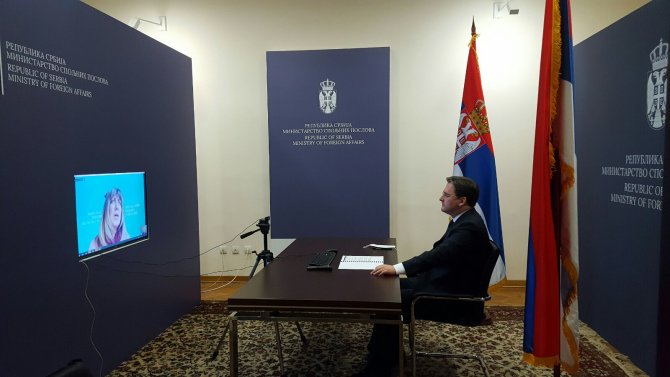
Minister of Foreign Affairs of Serbia Nikola Selakovic talked today via video link with Director General of the Council of Europe's Directorate General of Democracy Snezana Samardzic-Markovic, with whom he exchanged views on the cooperation between Serbia and this organization.
Minister Selakovic informed his collocutor about the process of vaccination against Covid-19 in Serbia, emphasizing that our country, within its positive foreign policy agenda, had created an entirely new atmosphere in regional relations by immunizing citizens from other Western Balkan countries.
The Serbian Foreign Minister emphasized the importance of continuing the good cooperation between Serbia and the Council of Europe Development Bank, which was further strengthened by the recent visit of Governor Rolf Wenzel.
Minister Selakovic also underlined the importance of the Regional Housing Programme for Serbia, bearing in mind that our country continued to face the unresolved issue of refugees, expelled and internally displaced persons from the former SFRY and Kosovo and Metohija.
|
|
|
| 24 March 2021 Marking the Day of Remembrance of the victims of the NATO aggression |
|
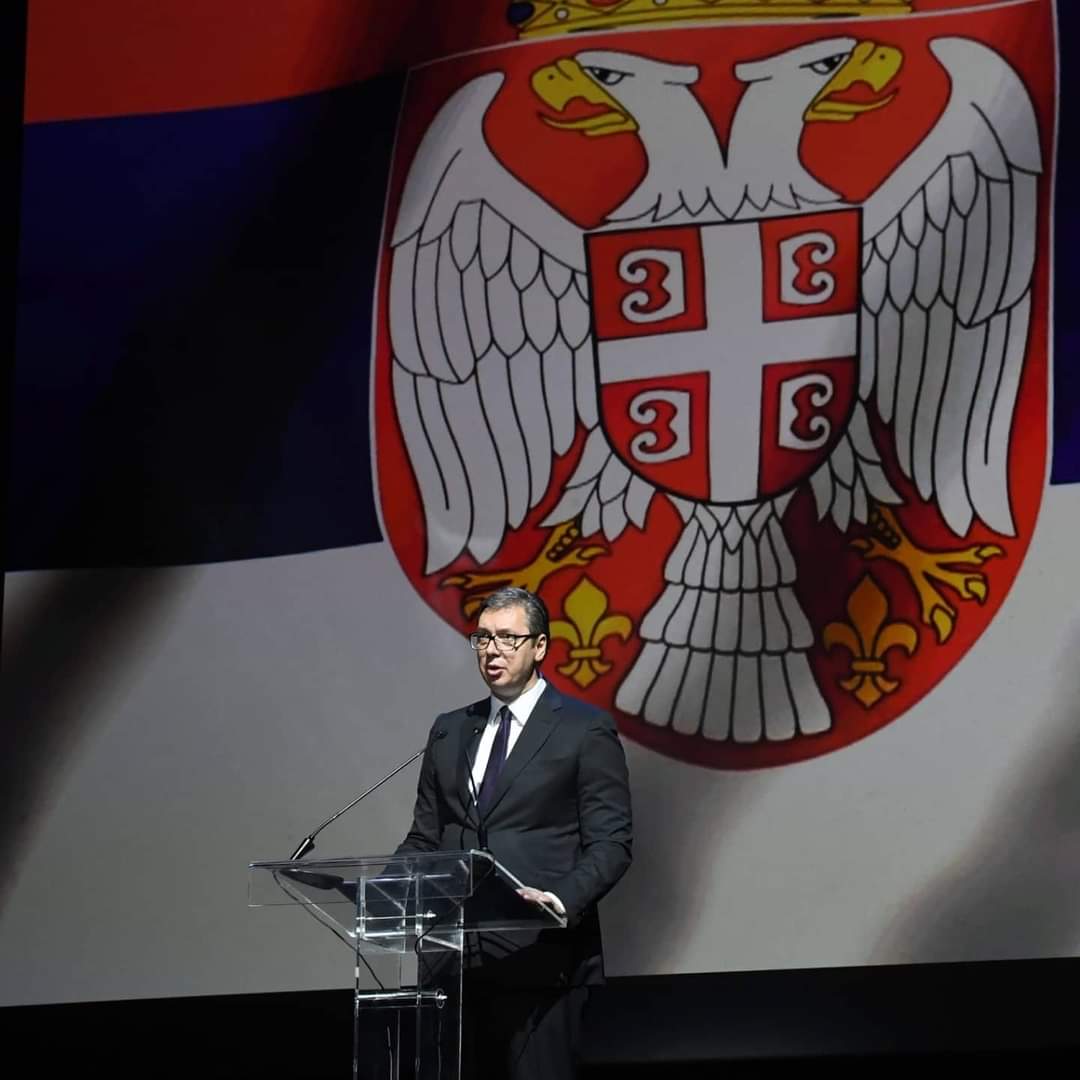
President of the Republic of Serbia Aleksandar Vucic made a statement on the occasion of marking the Day of Remembrance of the victims of the NATO aggression.
"Your Holiness, distinguished Chairman of the Presidency of Bosnia and Herzegovina, distinguished Speakers of the National Assemblies of the Republic of Serbia and the Republic of Srpska, distinguished Prime Ministers of the Republic of Serbia and the Republic of Srpska, distinguished Ministers of both Governments, dear guests and friends, representatives of the Serbian People from Montenegro, North Macedonia, Croatia, thank you for the fact that we are all together tonight and that the Serbian spirit is unbreakable and invincible.
One child a day and a little more than that. That is the most difficult, sickening and painful number of the NATO aggression from 1999. Killed, stopped, guilty of nothing, having committed no sin, without the right to defence, without the right to justice and without the right to life.
No one has ever been held accountable for this crime, a crime greater than a crime. No one, for the 2,500 killed civilians, but also soldiers and policemen who were only guilty of guarding, protecting themselves and their homes. No one has ever been held accountable for more than 6,000 persons injured.
Even today, 22 years after the aggression, it is not possible to explain that, there is no universal justification, despite all the work done to that end, there is no reason, it makes no sense, and only names remain, as eternal as sin.
Miljana Milic, fifteen years old,
Vladimir Milic, twelve years old,
Miomir Mladenovic, fourteen years old,
Dragan Dimic, three years old,
Julijana Brudar, ten years,
Olivera Maksimovic, twelve years old,
Miroslav Knezevic, thirteen years old,
Dajana Pavlovic, five years old, S
tevan Pavlovic, eight years old,
Marko Simic, two years old,
Milica Rakic, three years old,
Ivan Ivancic, seven years old,
Marko Ivanovic, three years old...
And the list goes on, eighty nine names, not only Serbian ones...
The senselessness of sheer killing did not choose. Sixteen children, aged two to seventeen, from the Ahmetaj and Hasani families, were killed in a convoy returning home to Prizren.
In one headline in the West, this was simply explained as a "tragic mistake". The deaths of Marko Roglic, Milan Ignjatovic, Gordana Nikolic, Irena Mitic, Milica Stojanovic, Bojana Tosovic, Branimir Stanijanovic, our Sanja Milenkovic...could not expect or get even such an explanation.
Those deaths were not tragic, for those who caused them, much less a mistake. It was just an excuse, a miserable excuse.
hey were a result of intent and a clear decision, as a severe judgment against one country, its people, its children.
And that is why today we will refrain from speculation in giving a name to everything that happened during the spring of 1999. Because a crime happened, a heinous and terrible one. And it was an aggression, not a bombing, not an intervention, not a campaign, not an operation. An aggression is what happened. An attack on a sovereign country, without a decision of the United Nations, without a sufficient reason that would justify attacking the then Yugoslavia or a neighbouring or NATO country.
No one was attacked by Serbia or the Federal Republic of Yugoslavia at that time. They attacked us, with one goal. To defeat us, to keep killing us, and in the end to take away a part of our territory.
And no matter how much we analyze things today, no matter how harsh and critical we are towards ourselves, our policy and leadership at the time, it is clear that the Federal Republic of Yugoslavia and Serbia were left with almost no choice then. The choice was horrible, either the loss of territory and people on the one hand, or the complete disappearance of the Serbian state, morals, honour, Serbian spirit, names and surnames. And we could not help but lose. Nineteen big ones attacked one small country, the Federal Republic of Yugoslavia. They attacked both Serbia and Montenegro. And even when they don't talk about it today, in one of the two independent countries, those are the facts. And that small country, and that small nation, to all nineteen of them so great and powerful, held a lesson in what matters most - honour, morals and love for freedom that a nation can have.
Yes, justice, lest we forget justice. All those nineteen great ones today still silently talk about their military success, avoid answering questions, while - can you imagine, one small, only numerically small Serbian people, that small but magnificent nation, with sadness, tears in their eyes, proudly remembers their resistance and struggle against the nineteen cruel and arrogant ones.
We lost a lot, we lost our fathers, brothers, spouses, children, but the honour and Serbian heart are still there, to protect Serbia, which is eternal and indestructible.
We lost children, we lost people, we lost control over a large part of the territory, we lost billions because of the destroyed infrastructure and economy.
And all that was left for us was the body of a tortured, destroyed country, a country in disintegration, mutilated, looted, wounded, deserted, and guilty, condemned for everything that happened not only in the 1990s, but throughout history.
A country that, even ten years after the aggression, did not have the strength to stand up, rise to its feet, and do anything but be silent, or bow its head and obediently apologize, for everything, even for its dead, even for its murdered children.
Today, it is no longer that failed, tortured, devastated, mutilated Serbia.
Today, it is Serbia, which has found its strength and its pride again.
Serbia, which calls things by their real names.
Serbia, which turned its back on war and defeats, and started working.
Serbia, which rose to stand on its own feet and has a voice of its own.
Serbia, which, even when they don't believe it, they listen to. Which is capable, which is growing, and is no longer part of the problem. Serbia, which is and will be, at least we will do our best to this end, the very solution that enables the entire region to live in peace and understanding.
And that Serbia, today, when there are still many more bombs in the world than vaccines, sends not bombs, but precisely those vaccines to the region. Today, it is ready to produce them as well, and in just a few months we will do just that, but not only for ourselves, but also for others, for the entire Balkans.
We are ready, and we are willing to help.
We are not ready to be and we will not be silent, nor be humiliated again.
We draw the right to that not only from the victims we had, but also from the fact that we stopped looking at others only a long time ago, and looking for fault and guilt only in them, and not sometimes in ourselves as well.
We looked at each other and admitted. Every loss, every defeat and every crime that someone committed in our name, every failure and every wrong policy.
And we are no longer doing anything that could endanger anyone.
We continue to work and work, and grow more and more, gaining strength with only one goal - to be the best in economy and education, health, in culture, science, sports...
And we want to be safe, on our own. We want our army to be much stronger than it was in 1999. So that we never again face a situation that someone is killing our children, destroying the country, or expelling our people.
We want to remain free, to decide our own destiny, and for no one to take everything away from us ever again, and give us nothing.
And that nothing today, and I will repeat it as much as necessary, is the idea of some great, powerful ones, but also those who serve them, the idea that "Kosovo" should recognize us, so that we could recognize "Kosovo".
We do not need that recognition. And Serbia will not allow you to walk over our victims, our history, our past, but also to walk over our future. You will get the answer of reasonable, kind and responsible people. We need a compromise. We need all the obligations that we and Pristina have assumed to be fulfilled, but only we have fulfilled them so far.
And this is not our whim. It is not a phantasmagoria about a Serbian world that we want to create.
Even today, when they threaten us with the formation of a Greater Albania, when they say that the Community of Serb Municipalities is not going to happen, it is ours to be calm, to take care of our people in Kosovo and Metohija, but to send a clear message to all those great, powerful ones that we are not as weak as we were, that we will be able to preserve what is our own, not touching anything that belongs to anyone else. After all, Serbia is not and will not be but a handful of oats that every crow from the whole wide world can eat. As for those who used the strength and power of the nineteen arrogant and cruel ones, I only ask them not to threaten us. Please, please, don't threaten us. They should not think that Serbia is broken and that it will not have the strength to respond. Please, please, our Albanian neighbours, do not threaten us. And we ask all others, who have demonstrated their cruelty towards Serbia, not to help you in that. That is all we are asking and nothing more.
And we will respond to calls for peace, calls for compromise, and always with good will, because we do not want to have children killed again. And we do not want the children of others to suffer again. But do not underestimate Serbia, and do not look at Serbia with the same eyes as you did in 1999.
Today, Serbia is much stronger, much more powerful. Today, Serbia is a united country of togetherness, not a divided one. Today, Serbia is incomparably stronger and better in every aspect than it was in 1999, from the economy to our army. And we will never threaten anyone, we just ask you and request from you to respect us and nothing more.
Today, we are building roads that will connect us, among ourselves, with the region and with the world. Until the end of the year, we will work on eight motorways, on eight routes in the entire Balkans, not only Serbia, eight roads of peace and cooperation.
Only a crazy person would trade this for war, for dead children, for demolition and new loss. And yes, we want to have the closest relations with everyone who took part in the aggression against our beautiful Serbia, we have forgiven a long time ago, but no, we will never forget. And don't ask us to. That one day, every year, we will remind both ourselves and you. The nineteen of you, the most powerful, strongest, greatest in terms of might and force, but not so much when it comes to honour and morality. We will keep remind you and ourselves, just so it would never happen again. Not to us only, but to none other freedom-loving people in the world.
And if we have an offer, today it reads as follows: we are ready to make the whole Balkans a winner, for everyone to win, as long as no one tries to make Serbs the only losers.
And the path to this goal is not difficult at all.
We just need to respect and understand each other and not try to humiliate each other.
And not to touch into what everyone paid the highest and bloodies price for Freedom. And we, Serbs, know the price of freedom.
Into our right to have it, to keep it and to remember all the victims who are part of it.
And our defeats, our lives and our children are built into ours. And the lives of our heroic pilots, and our giants from Kosare and Pastrik, and our children, innocent, completely innocent, and only guilty of living in Serbia.
This is too high a price to be quiet about it.
Because that would mean that we are ready for another defeat, for another humiliation.
And we are not.
And when all go quiet, we will keep repeating.
A child a day, and a little more. This was how much you killed us. In an aggression that even you did not understand why you carried it out.
And we will keep repeating this, just so it does not happen to us again.
With special reverence, we are fulfilling our obligation to pay tribute to all innocent Serbian victims who laid their lives on the altar of the homeland, both civilians and our heroic soldiers and policemen, the heroes of Kosare, Prizren, Mitrovica.
Today, for us Serbs, life in Kosovo and Metohija is like Via Dolorosa, using their last strength on the road to Golgotha, but we would not be Serbs if we were not capable to "exist in a terrible place".
And today, tonight, I can conclude with one important sentence. On the soil of Europe, there was, and today is stronger than ever, an indomitable, unwavering, unconquerable and never conquered Serbia.
May eternal glory be to all the victims of the NATO aggression and let us all exclaim together - long live free and proud Serbia", President Vucic said.
Source:www.predsednik.rs
Photo:www.predsednik.rs
|
|
|
| Le 24 mars 2021 Commémoration du Jour du Souvenir des victimes de l'agression de l'OTAN |
|

Le Président de la République de Serbie Aleksandar Vučić s'est adressé à l'occasion de la commémoration du Jour du Souvenir des victimes de l'agression de l'OTAN.
"Votre Sainteté, Honorable Président de la Présidence de Bosnie-Herzégovine,Honorables Présidents des Assemblées nationales de la République de Serbie et de la République Srpska, Honorables Présidents des gouvernements de la République de Serbie et de la République Srpska, Honorables Ministres des deux gouvernements, Chers invités et amis, représentants du peule serbe du Monténégro, Macédoine du Nord, Croatie, merci d'être ici tous ensemble ce soir encore et parce que le peuple serbe est inébranlable et invincible.
Un enfant par jour et un peu plus. C'est le chiffre le plus lourd, le plus difficile et le plus douloureux de l'agression de l'OTAN de 1999. Tués, stoppés, innocents, ils n'avaient commis aucun crime, sans droit à la défense, sans droit à la justice, sans droit à la vie.
Personne n'a jamais été tenu responsable pour ce crime, crime plus grand que le crime. Personne pour 2500 civiles tués, mais aussi des militaires et des policiers coupables seulement d'avoir gardé, protégé eux-mêmes et leurs foyers. Personne n'a jamais été tenu responsable pour plus de 6000 blessés.
Ce n'est pas possible de l'expliquer même aujourd'hui, 22 ans après l'agression, il n'y a pas, malgré les efforts, de justification universelle, pas de raison, pas de sens, il ne reste que des noms en guise du péché éternel.
Miljana Milić, quinze ans
Vladimir Milić, douze ans
Miomir Mladenović, quatorze ans
Dragan Dimić, trois ans
Julijana Brudar, dix ans
Olivera Maksimović, douze ans
Miroslav Knežević, treize ans
Dajana Pavlović, cinq ans
Stevan Pavlović, huit ans
Marko Simić, deux ans
Milica Rakić, trois ans
Ivan Ivančić, sept ans
Marko Ivanović, trois ans...
S'ensuivent quatre-vingt neuf noms, pas seulement serbes.
L'insensé du pur meurtre n'a pas été sélectif. Seize enfants de deux à dix-sept ans des familles Ahmetaj et Hasani ont été tués dans une colonne qui regagnait leurs foyers à Prizren.
A l'Occident ceci a été expliqué tout simplement dans un titre comme "une erreur tragique". La mort qui a frappé Marko Roglić, Milan Ignjatović, Gordana Nikolić, Irena Mitić, Milica Stojanović, Bojana Tošović, Branimir Stanijanović, notre Sanja Milenković ... ne pouvait compter sur ni recevoir même une telle explication.
Ces morts, pour ceux qui les ont semées n'étaient pas tragiques, erreur encore moins. Ce n'était qu'un prétexte, un pitoyable prétexte.
C'était l'intention, une décision claire, la cour martiale contre un pays, contre ses hommes, contre ses enfants.
De ce fait, aujourd'hui nous ne marchanderons pas sur la mise d'un nom sur tout ce qui s'est passé au printemps 1999. Parce que ce qui c'est passé c'est un crime, grave et atroce. Et l'agression, non pas les bombardements, l'intervention, la campagne, l'opération. L'agression a eu lieu. Contre un pays souverain, sans la décision des Nations unies, sans raison suffisante qui aurait été l'attaque de la Yougoslavie d'alors contre un Etat limitrophe ou un Etat de l'OTAN.
La Serbie, soit la République fédérale de Yougoslavie n'a attaqué personne alors. Nous étions attaqués avec un seul but. De nous humilier, de nous tuer, pour finalement nous arracher une partie du territoire.
On a beau analyser les choses aujourd'hui, on a beau être sèveres et critiques envers nous-mêmes, notre politique d'alors, nos dirigents d'alors, il s'avère clair que la République fédérale de la Yougoslavie et la Serbie, ont été pratiquement privées de choix. Le choix fut horrible, soit la perte du territoire et des hommes d'un côté ou l'effacement total de l'Etat serbe, de la morale, de l'honneur, de l'esprit serbe, prénom et nom. Et nous n'avons pas pu ne pas perdre. Les 19 grands ont attaqué un petit pays, la République fédérale de Yougoslavie. Ils ont attaqué la Serbie et le Monténégro. Et même si on n'en parle pas dans un des deux pays indépendants, ce sont les faits. Et ce petit pays, ce petit peuple a fait la leçon à eux tous, aux 19 grands et puissants, leçon la plus importante de l'honneur, de la morale et de l'amour de libérté qu'un peuple puisse avoir.
Oui, la justice, il ne faut pas oublier la justice. Tous ses 19 grands parleront vaguement de leur réussite militaire, éviteront de répondre aux questions, et figurez-vous, un petit peuple, petit seulement par son nombre, le peuple serbe, ce peuple petit mais majestueux, en deuil, larme à l'œil, se souvient fièrement de sa résistance et de sa lutte contre les 19 cruels et dédaigneux.
Nous avons perdu beaucoup, les pères, les frères, les époux, les enfants, mais la face et le coeur serbes sont encore là, pour garder la Serbie qui est éternelle et industrictible.
Nous avons perdu les enfants, nous avons perdu les gens, nous avons perdu le contrôle sur une grande partie du territoire, nous avons perdu des milliards à cause de l'infrastructure et l'économie dévastées.
Et tout ce qui nous restait était le corps d'un pays meurtri, dévasté, en état de décomposition, estropié, pillé, délabré, vide et coupable, condamné pour tout ce qui s'est passé non seulement dans les années 90 mais durant toute l'histoire.
Un pays qui même dix ans après l'agression n'a pas eu de force de se soulever, de se tenir debout et faire autre chose que de se taire ou de plier la tête et s'excuser humblement pour tout, même pour ses propres morts, même pour ses enfants tués.
Aujourd'hui ce n'est plus cette Serbie écrasée, meurtrie, dévastée, estropiée.
Aujourd'hui c'est la Serbie qui a repris ses forces et sa fierté.
La Serbie qui appelle les choses de leur vrai nom.
La Serbie qui a tourné le dos à la guerre et aux défaites et s'est mis à travailler.
La Serbie qui s'est levé, se tient debout sur ses propres jambes, ayant sa propre voix.
La Serbie qu'on écoute, même quand on ne la croit pas. Capable, grandissante, et ne fait plus partie du problème. La Serbie qui est et qui sera, au moins nous ferons tout notre possible, précisément la solution qui permettra à toute la région une vie dans la paix et dans la compréhension.
Cette Serbie aujourd'hui dans le monde où les bombes sont toujours plus nombreuses que les vaccins, envoie dans la région non pas les bombes, mais justement les vaccins. Aujourd'hui elle est prête à les produire, et dans quelques mois seulement, nous allons le faire, mais pas seulement pour nous-mêmes mais pour tous les Balkans.
Nous sommes prêts et nous voulons aider.
Nous ne sommes pas prêts et nous ne voulons pas nous taire de nous voir humiliés de nouveau.
Nous épuisons notre droit non seulement des victimes que nous avons eues, mais aussi du fait qu'il y a longtemps que nous avons arrêté de regarder seulement les autres et de chercher l'erreur et les coupables seulement en eux, mais parfois en nous mêmes.
Nous nous sommes regardés et nous avons avoué. Toute perte, toute défaite, tout crime que quelqu'un a perpétré en notre nom, tout acte manqué et toute politique erronnée.
Nous ne faisons plus rien qui pourrait affecter quiconque.
Nous travaillons, nous travaillons, nous travaillons de plus en plus, nous grandissons, avec un seul objectif d'être les meilleurs en économie et en éducation, santé, culture, sciences, sports...
Nous voudrons être en sécurité, sur ce qui nous appartient. Nous voudrons que notre armée soit beaucoup plus forte qu'elle ne l'était en 99. Pour ne connaître jamais plus cette situation de voir quelqu'un tuer nos enfants, dévaster le pays ou chasser notre peuple.
Nous voudrons rester libres de décider de notre propre sort, que plus jamais personne ne nous prenne tout sans nous donner rien en retour.
Et rien aujourd'hui, je vais le répéter tant qu'il est nécessaire, c'est l'idée des certains grands, puissants mais aussi de leurs serviteurs, l'idée que le "Kosovo" nous reconnaisse pour que nous reconnaissions le "Kosovo".
Nous n'avons pas besoin de cette reconnaissance. Et vous ne receverez pas de la part de la Serbie de marcher sur nos victimes, sur notre histoire, sur notre passé, mais aussi sur notre avenir. Vous aurez la réponse des gens raisonnables, bons et responsables. Nous avons besoin d'un compromis. Nous avons besoin de la réalisation de tous les engagements pris par nous et par Priština, nous étant les seuls à les réaliser.
Il ne s'agit pas-là de notre coup de tête. Ce n'est pas une idée fantaisiste sur un monde serbe que nous voulons créer.
Et à l'heure actuelle lorsqu'on nous menace par la création de la Grande Albanie, lorsqu'on dit que rien ne sera de l'Association des municipalités serbes, il nous revient d'être calmes, de nous occuper de notre peuple au Kosovo et Metohija, mais aussi de dire à tous ses grands et puissants que nous ne sommes plus faibles comme avant, que nous saurons garder le nôtre, sans toucher à rien d'autrui. D'ailleurs la Serbie n'est pas et ne sera pas une poignée d'avoine pour tout corbeau voyou qui voudrait la gober. Ceux qui ont profité de la force et de la puissance des 19 dédaigneux et cruels, je les prie de ne pas nous menacer. Je les prie de ne pas nous menacer. Il ne faut pas penser que la Serbie est brisée et qu'elle n'aurait pas la force de répondre. Nous vous prions, nous vous prions nos voisins albanais, ne nous menacez pas. Et nous prions tous les autres qui ont fait preuve de leur cruauté envers la Serbie, de ne pas vous y aider. C'est tout ce que nous demandons, rien de plus.
Nous répondrons par les appels à la paix, au compromis et toujours par la bonne volonté, car nous ne voulons pas avoir d'enfants tués de nouveau. Et ne nous voulons pas que les enfants d'autrui périssent de nouveau. Mais ne sousestimez pas la Serbie et ne regardez pas la Serbie du même œil qu'en 99.
La Serbie est à ce jour plus forte, beaucoup pus forte. La Serbie est à ce jour unifiée et unie, et non pas divisée. La Serbie de ce jour a tout plus fort et meileur qu'en 99, depuis l'économie jusqu'à notre armée. Et nous ne menacerons jamais personne, mais nous vous demandons seulement de nous respecter, rien de plus.
Nous constuisons à présent les routes nous reliant avec nous-mêmes, avec la région et avec le monde. Avant la fin de l'année nous allons travailler sur huit autoroutes, huit artères de tous les Balkans, pas seulement de la Serbie, huit voies de la paix et de la coopération.
Seulement un fou aurait donné ça pour la guerre, les enfants morts, la destruction et une nouvelle perte. Et si, nous voulons avoir les rapports les plus proches avec tous ceux qui ont pris part à l'agression contre la belle Serbie, ça fait longtemps qu'on a pardonné, mais jamais, au grand jamais nous n'oublierons. Et ne nous le demandez pas. Ce jour, chaque année, nous nous rappelerons et nous vous reppelerons. Vous les 19 les plus puissants, les plus forts, les plus grands par la puissance et la force, pas tellement par l'honneur et la morale. Nous nous rappelerons et nous vous reppelerons, justement pour que ceci ne se reproduise plus. Pas à nous, mais à aucun des peuples libertaires du monde non plus.
Et si nous avons une offre aujourd'hui c'est celle-ci: nous sommes prêts de faire de tous les Balkans un gagnant, que chacun gagne, tant que personne n'essaye de faire des Serbes les seuls perdants.
La voie qui y mène n'est pas du tout difficile.
Il suffit juste qu'on se respecte, qu'on se comprenne et qu'on n'essaye pas d'humilier les uns les autres.
Ne pas toucher à ce que tout un chacun a payé le plus lourdement et de la manière la plus sanglante. La liberté. Et nous les Serbes nous connaissons le prix de la liberté.
Au droit de l'avoir, de la garder et de nous rappeler de toutes victimes qui font son corps.
Et dans le corps de notre liberté il y a nos défaites, nos vies et nos enfants. Et les vies de nos pilotes héroiques et de nos géants de Košare et de Paštrik et de nos enfants innocents, complètement innocents, coupables seulement d'avoir vécu en Serbie.
C'est un prix trop élevé pour qu'on se taise là-dessus.
Parce que ça aurait signifié que nous sommes prêts pour une autre défaite, pour une autre humiliation.
Et nous ne le sommes pas.
Lorsque tout le monde se taira, nous répéterons.
Un enfant par jour et un peu plus. C'est ce que vous nous avez tué. Durant l'agression dont le pourquoi vous échappait à vous-mêmes.
Et nous le répétrons justement pour éviter que ceci ne nous arrive pas de nouveau.
Avec une piété particulière nous remplissons notre devoir de rendre hommage à toutes les victimes serbes innocentes qui ont porté leur vie à l'autel de la patrie, tant aux civils qu'à nos courageux soldats et policiers, les héros de Košare, Prizren, Mitrovica.
Aujourd'hui pour nous les Serbes la vie au Kosovo et Metohija ressemble au Chemin de la Souffrance, aux derniers efforts pour remonter le Golgotha, mais nous ne serions pas Serbes si nous n'étions pas capables "de subsister sur un lieu terrible".
Et ce soir pour finir, une phrase importante. Sur le sol de l'Europe il y a eu, et aujourd'hui plus forte que jamais, il y a une Serbie inébranlable, imperturbable, irréductible, et jamais soumise.
Eternelle gloire à toutes les victimes de l'agression de l'OTAN et clamons tous ensemble vive la Serbie libre et fière" a dit le Président Vučić.
Source: www.predsednik.rs
Photo: www.predsednik.rs
|
|
|
| Cérémonie du jour commémoratif du 17 mars 2004 – pogrom au Kosovo et Metohija |
|
Le président de la République de Serbie Aleksandar Vučić a assisté aujourd’hui à la cérémonie du jour commémoratif du 17 mars 2004 – pogrom au Kosovo et Metohija. Il a dit qu’au Kosovo et Metohija le pogrom a été perpétré il y a juste 17 ans, et le pogrom dépasse tous les autres crimes.
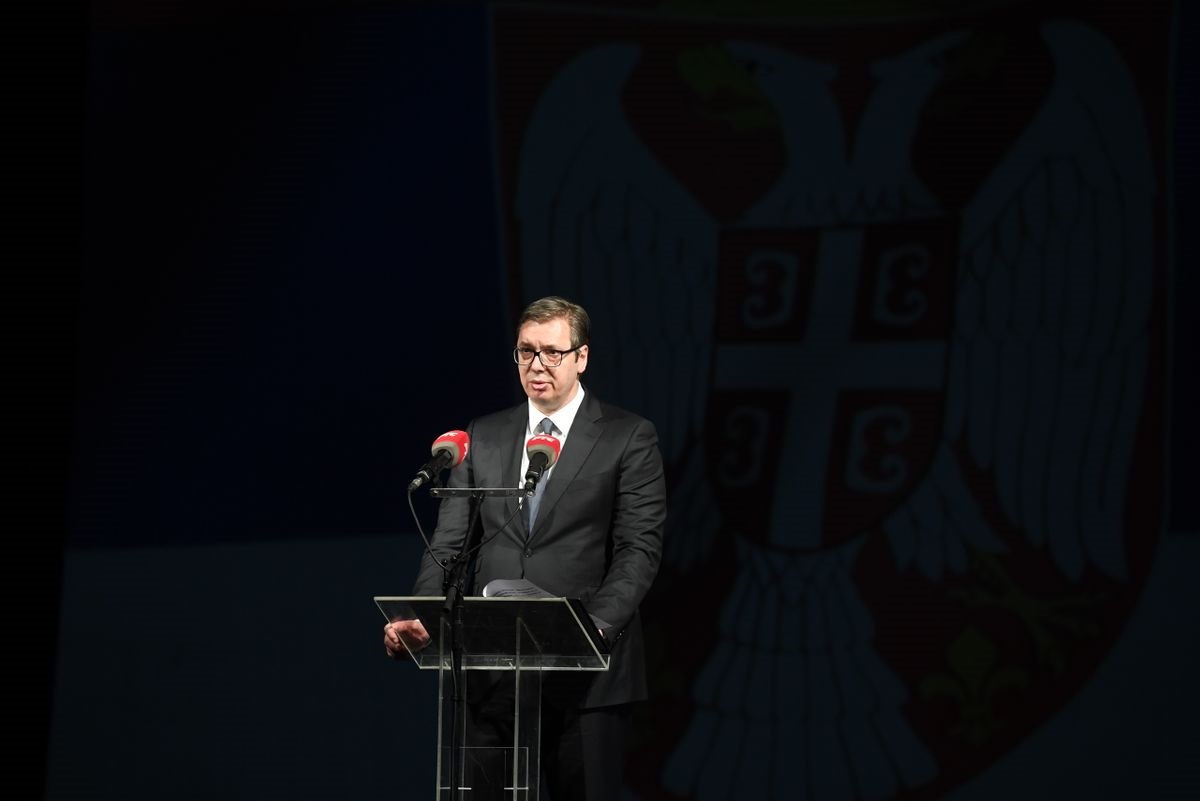
«Il peut y avoir des moments où nous sommes impuissants à prévenir l'injustice, mais il ne doit jamais y avoir un moment où nous ne parvenons pas à protester» - ces mots d’Elie Wiesel, survivant des camps et prix Nobel, nous obligent pour toujours à ne pas nous taire devant un crime, quelconque serait l’auteur et le motif», a dit le président Vučić, ajoutant que nous avons mémorisé et appris toute leçon dont nous sortions perdants, toute celle où nous restions muets devant nos propres victimes, toute celle où nous étions prêts d’oublier.
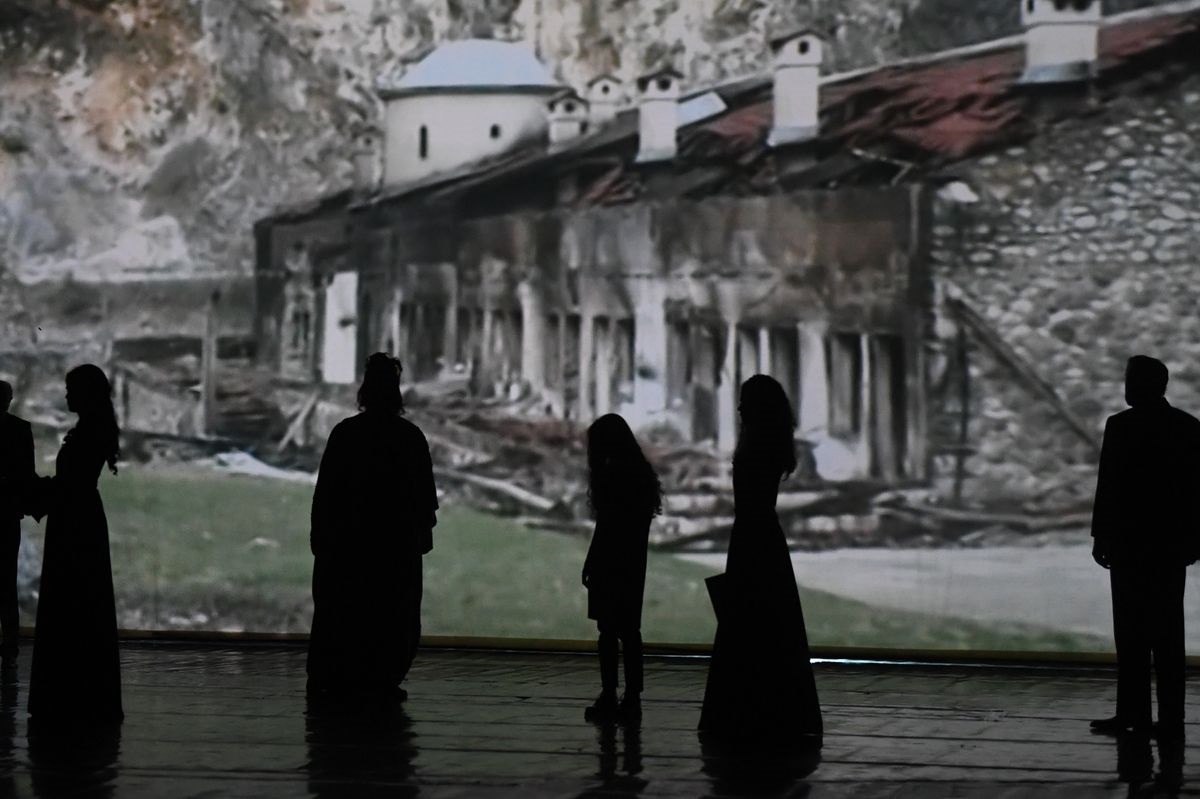
«La Serbie n’est plus faible, elle n’est pas un pays des perdants, elle ne menace pas, mais elle n’oublie non plus, elle est prête à la discussion, mais pas à l’humiliation. La Serbie comme tous les autres a le droit de s’occuper de son peuple, sa sécurité et son bienêtre. Le droit à la vie est le droit de l’homme fondamental et nous le défendrons toujours», a dit le président Vučić.
Le président Vučić a dit que le pogrom dépassait tous les autres crimes, car étant non seulement l’acte, mais aussi l’intention, la politique, la préméditation à nettoyer de force une partie, un pays, des appartenants à d’autres nations et confessions.
«Nous n’avons pas le droit d’y passer outre», a dit le président serbe, soulignant que nous sommes dans l’obligation d’être gagnants sans guerre ni sang, meilleurs en économie, santé, sports, éducation et tout le reste qui fait le développement et le progrès.
«Nous souhaitons pareil aux autres, qu’ils s’occupent d’eux-mêmes à succès, car nous sommes conscients que le crime est l’outil des perdants, et les gagnants n’en ont pas besoin, ils se souviennent mais pardonnent et continuent en avant, tandis que les perdants se tournent autour dans le même cercle vicieux. Nous les Serbes nous ne voulons plus l’être, nous voulons l’avenir dans lequel nous allons nous souvenir mais dont nous ne voulons pas revenir. Nous savons ce qui s’est passé et nous le nommons par son vrai nom», a conclu le président Vučić.
Photo: Dimitrije Gol
|
|
|
| Commemorating Remembrance Day of 17 March 2004 - Pogrom in Kosovo and Metohija |
|
President of the Republic of Serbia Aleksandar Vucic participated today in the commemoration of the Remembrance Day of 17 March 2004 - Pogrom in Kosovo and Metohija. He said that exactly 17 years ago, a pogrom took place in Kosovo and Metohija, and that pogrom surpassed all other crimes.

"There may be times when we are powerless to prevent injustice, but there must never be a time when we fail to protest, these words of Elie Wiesel, a camp survivor and Nobel laureate, make it forever incumbent upon us not to remain silent against crime, regardless of who and for what reason committed it", President Vucic stated and added that we remembered and learned every lesson in which we were losers, each one in which we were silent to our own victims, and each one when we were ready to forget.

"Serbia is no longer weak today, nor is it a country of losers, it does not threaten, but it does not forget either, it is ready for talks, but not for humiliation. Serbia, just like everyone else, has the right to take care of its people, their safety and well-being. The right to life is a fundamental human right and we will always defend it", President Vucic said.
President Vucic said that pogrom surpasses all other crimes, because it is not only an act, but an intention, a policy, a premediated attempt to forcibly cleanse persons belonging to other peoples and faiths from a region or a country.
"We have no right to remain silent to that", said the President of Serbia, emphasizing that we have an obligation to be winners without blood spilled and war, to be the best in the economy, healthcare, sports, education and everything else that implies development and progress.
"We also wish others to work on themselves and be successful, because we are aware that crime is a tool for losers that winners do not need, as they remember, but forgive and move on, while the losers keep spinning in the same vicious circle. We Serbs do not want to be that anymore, we want a future in which we will remember, but from which we will not return. We know what happened and we call it by its real name", President Vucic concluded.
Photo: Dimitrije Goll
|
|
|
| La République de Serbie au Mois de la Francophonie |
|
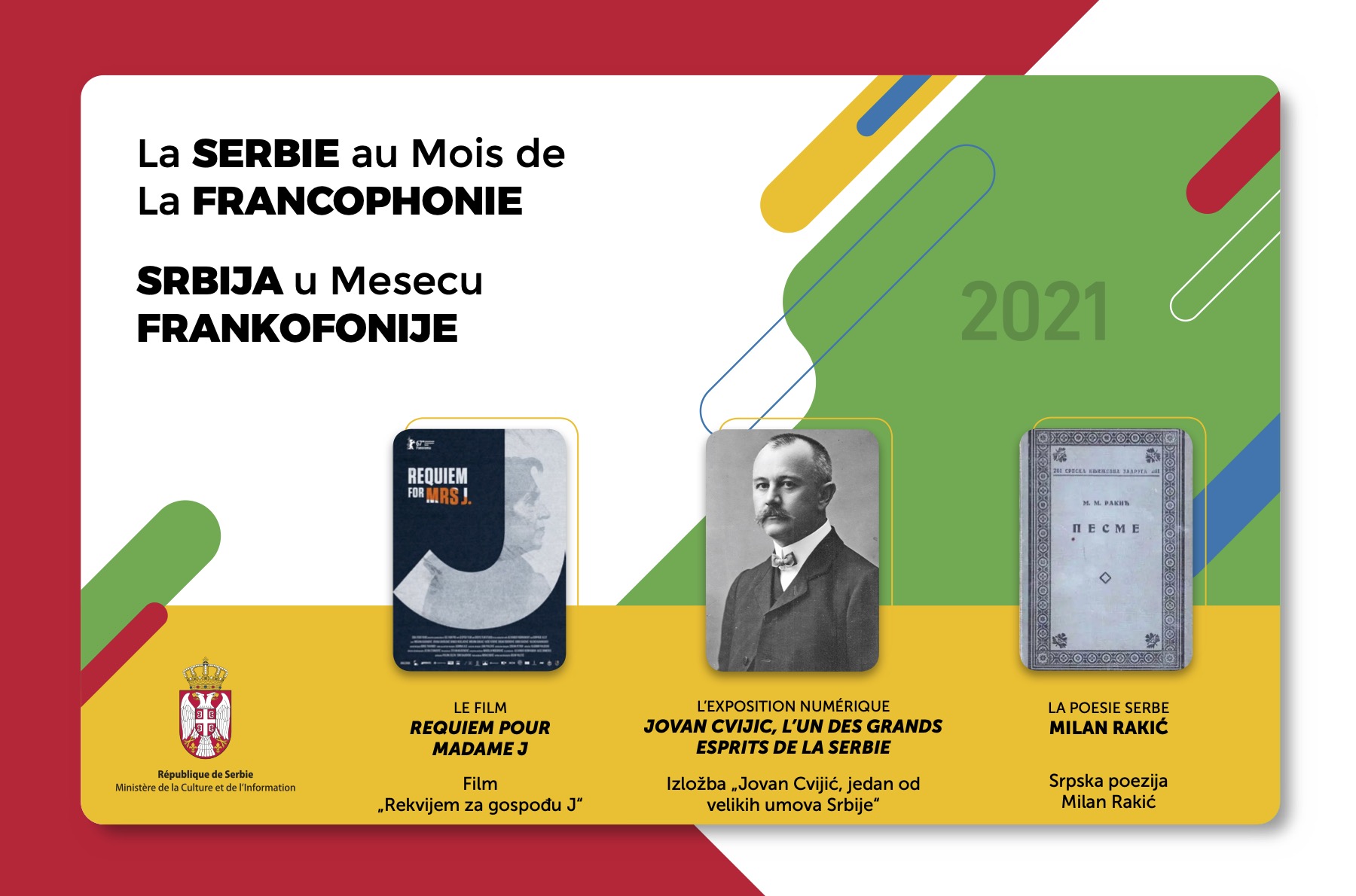
La République de Serbie en qualité de membre associé à l'OIF, de concert avec toute la communauté francophone dans le monde entier, célèbre le Mois de la Francophonie. Pour tous les amateurs de la culture serbe et de la langue française, le Ministère de la Culture et de l'Information de la République de Serbie a préparé un vaste programme et la Mission permanente de la République de Serbie auprès du Conseil de l'Europe à Strasbourg vous invite à découvrir la diversité et la richesse de la culture serbe en français.
|
|
|
| The Council of Europe Development Bank supports projects in Serbia in a timely manner |
|
Minister of Foreign Affairs Nikola Selakovic met today with Governor of the Council of Europe Development Bank (CEB) Rolf Wenzel.
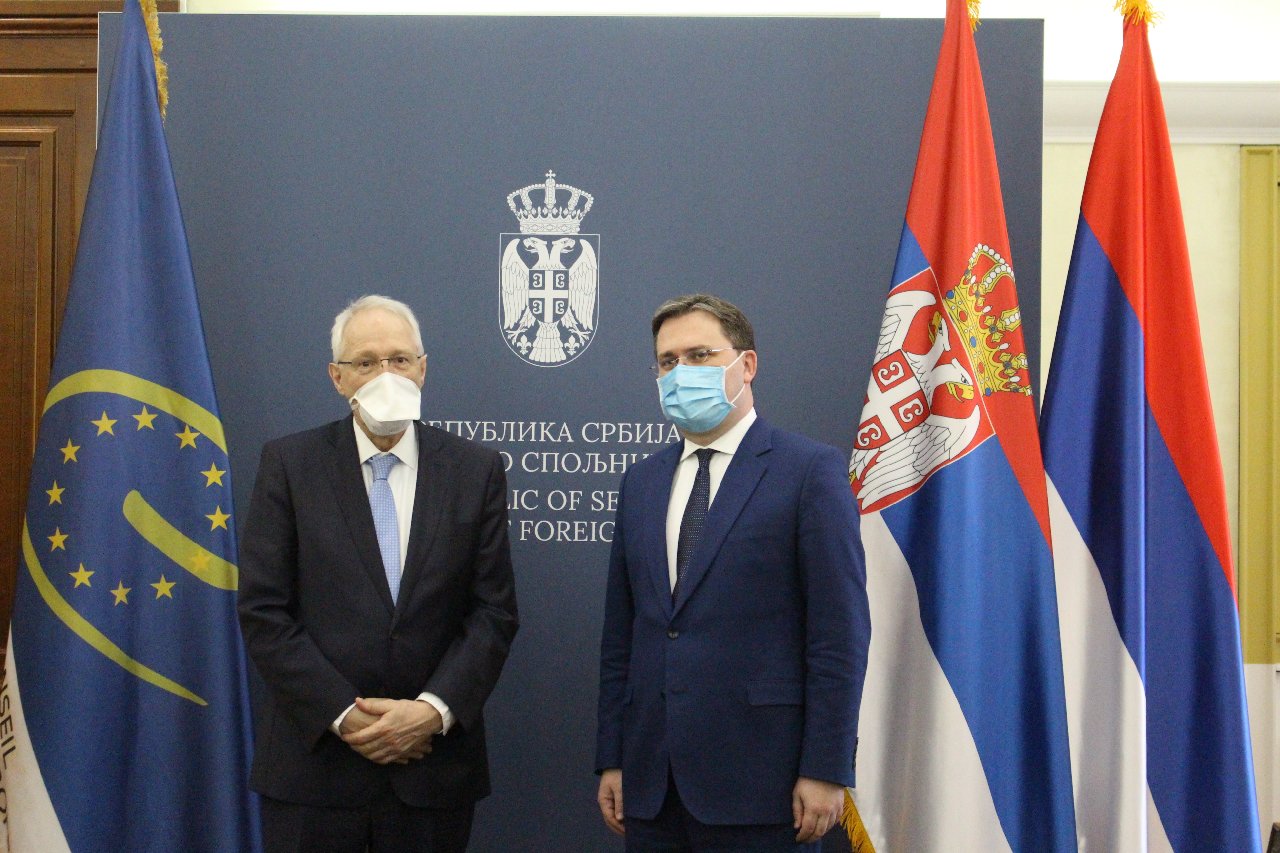
The Head of Serbian diplomacy thanked Governor Wenzel for his personal engagement in promoting cooperation between Serbia and the Council of Europe Development Bank, for which President of the Republic Aleksandar Vucic awarded him the Gold Medal of Merit earlier today.
Selakovic pointed out that Governor Wenzel was personally involved in making all decisions related to projects implemented in Serbia and thanked the CEB for focusing on our region, as well as for the share of total funds earmarked by this institution for similar projects in 2020 and 2021.
The Republic of Serbia strongly supports the increased credit activity of the CEB in the previous year, Selakovic said and emphasized that this activity came as a result of a larger number of loan requests for the procurement of medical equipment and covering general hospital costs during the Covid-19 pandemic.
Selakovic expressed hope and expectation that such good practice would continue, bearing in mind that the pandemic we were still facing was not subsiding in the world and particularly thanked Governor Wenzel and the CEB for their timely and adequate response in supporting projects aimed at opening new jobs.
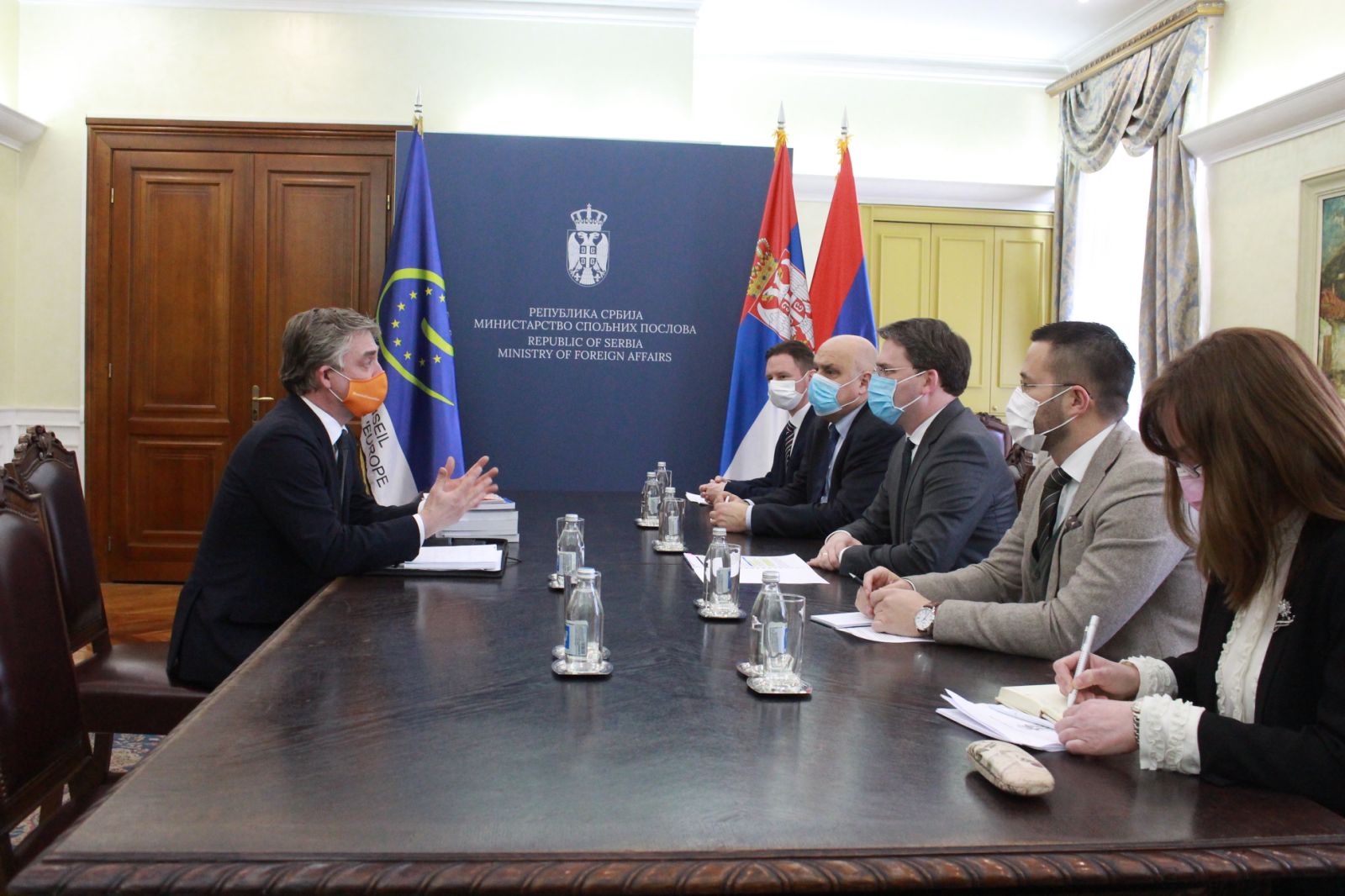
The success and business results of the Council of Europe Development Bank are also evidenced by the high credit ratings that this institution has been continuously achieving in the recent years, the Serbian Foreign Minister said and pointed out that regular financial activities of the bank in accordance with the 2020-2022 Development Plan were followed with great attention, focusing on inclusive growth, sustainability and support for vulnerable population groups.
Discussing the vaccination of the population, Minister Selakovic said that the process was successful in Serbia, and that special attention was paid to the protection of the most endangered groups, such as the elderly, categories of persons with impaired health and Roma. Selakovic emphasized in particular the solidarity shown by our country and the donations of vaccines it made to North Macedonia, Montenegro and Bosnia and Herzegovina.
The Serbian Foreign Minister also emphasized the importance of the Regional Housing Programme for Serbia, which was established to contribute to the creation of a solution for permanent housing for persons who suffered in the terrible conflicts in the former Yugoslavia in the 1990s and to refugees and persons displaced after the conflict, to whom 5421 apartments were distributed so far in Serbia.
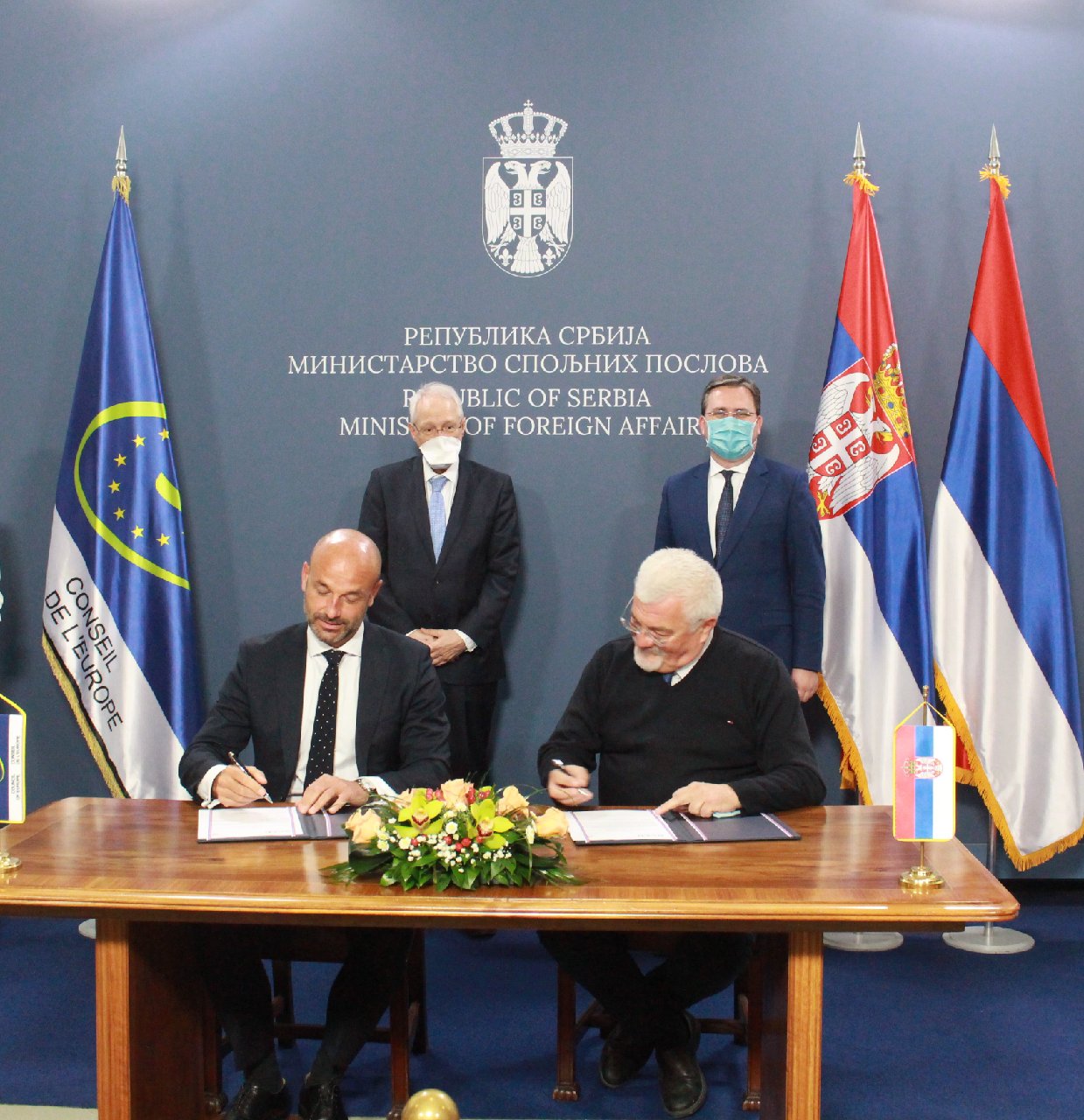
In that context, Selakovic expressed satisfaction with the signing of the Letter of Intent between the Commissioner for Refugees and Migration of the Republic of Serbia and the Vice-Governor of the Council of Europe Development Bank, namely the CEB making available the funding for the renovation of capacities used for the provision of accommodation to migrants in Serbia.
Belgrade, 10 March 2021
|
|
|
| 10 March 2021 President Vucic presents a decoration to Rolf Wenzel, the Governor of the Council of Europe Development Bank |
|
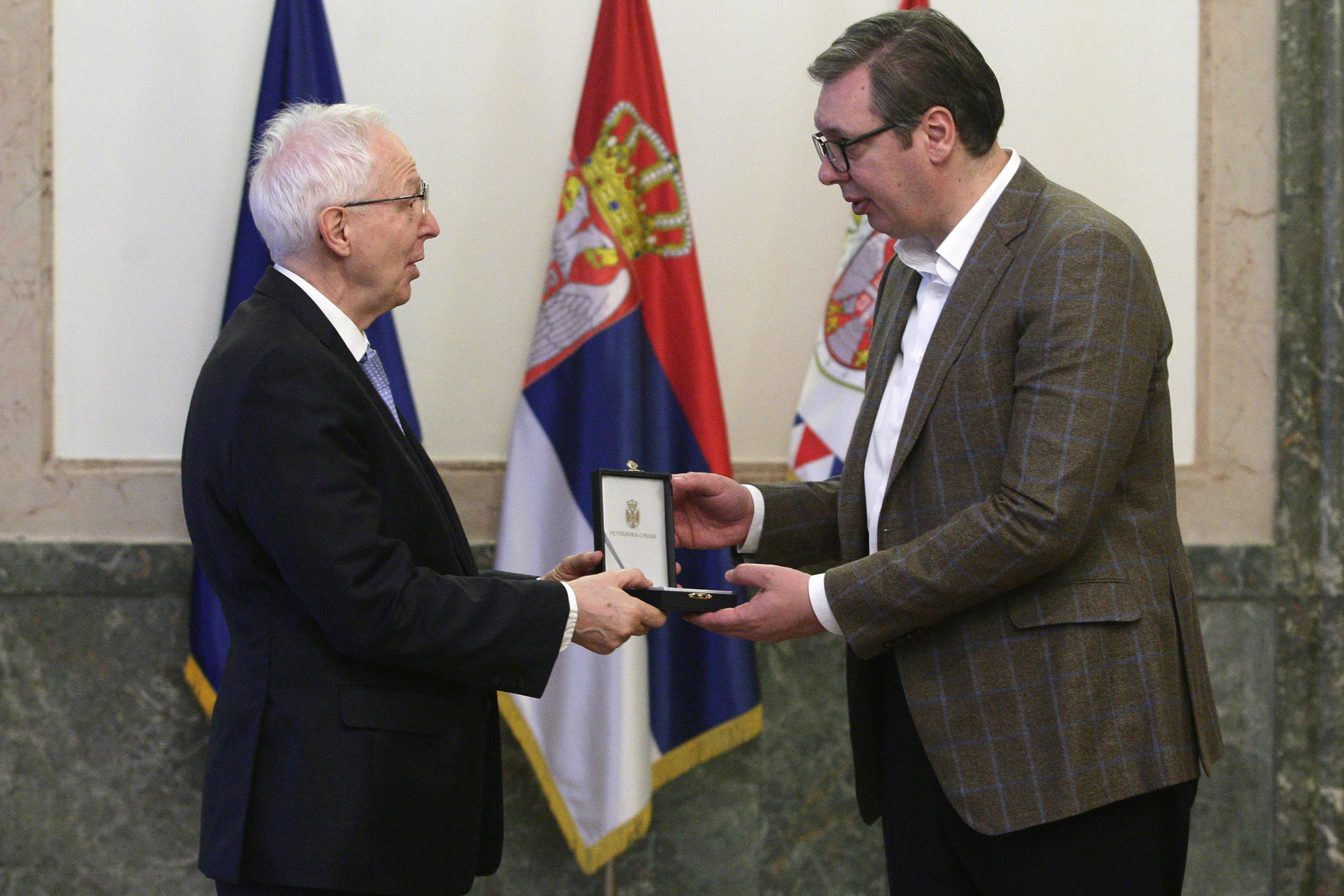
Serbian President Aleksandar Vucic met today with the Governor of the Council of Europe Development Bank Rolf Wenzel, and on that occasion bestowed upon him a decoration in recognition of improving Serbia's cooperation with that institution. Wenzel was awarded the Gold Medal of Merit.
Wenzel thanked for the awarded decoration which, as he said, he saw also as an obligation to continue good cooperation with Serbia.
"It is a great honor for me to receive this medal, thank you for your trust", he said.
President Vucic said that he was grateful that Wenzel was here today, adding that it was easy to make a decision on the decoration, because he had done a lot for Serbia.
The Council of Europe Development Bank contributed to and participated in almost everything we did in various spheres of society, the President pointed out.
"This is another obligation for you, but for us as well. For us to show even greater respect for your great work, and for you to invest even more in the period ahead in the progress of Serbia and support our citizens", Vucic said.
Source: Tanjug
|
|
|
| Selakovic: Continuation of partner cooperation with the Council of Europe |
|
Minister of Foreign Affairs of the Republic of Serbia Nikola Selakovic met today with Head of the Council of Europe Office in Belgrade Tobias Flessenkemper.
Minister Selakovic stated that Serbia attached great importance to the implementation of Council of Europe programs in Serbia, including joint programs between the Council of Europe and the European Union. He also pointed out that Serbia was counting on the help of the Council of Europe in the implementation of reforms, primarily because this organization, through its programs, was able to help in reforming the judicial system and the public administration system.
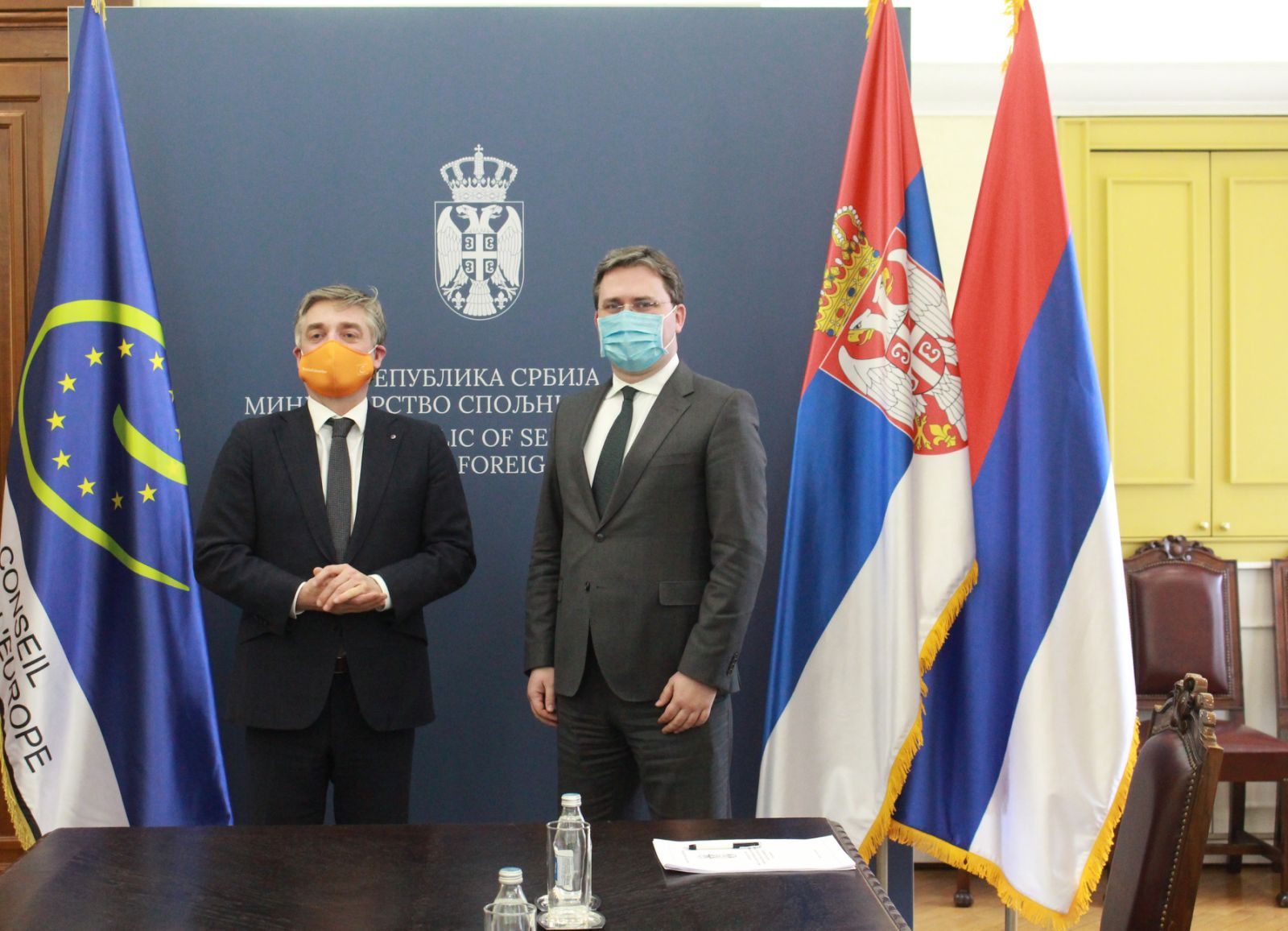
The Minister pointed out that significant progress was made in the past 18 years since Serbia joined the Council of Europe, and that the undertaken obligations were almost completely fulfilled.
The Head of Serbian diplomacy stressed the need to strengthen political dialogue among Council of Europe members and underlined in particular Serbia's commitment to stability in the region, and especially economic cooperation between the Western Balkan countries through the "mini-Schengen" initiative. In this context, he added that Serbia was making maximum efforts to provide a favorable climate for dialogue and resolving all open issues in a peaceful and responsible manner.

We strongly oppose launching the procedure for the admission of Kosovo and Metohija to the Council of Europe, because that would be a violation of the Statute and disrupt the unity of the organization, Selakovic said and added that only the status-neutral engagement of the Council of Europe in Kosovo and Metohija was acceptable for Serbia.
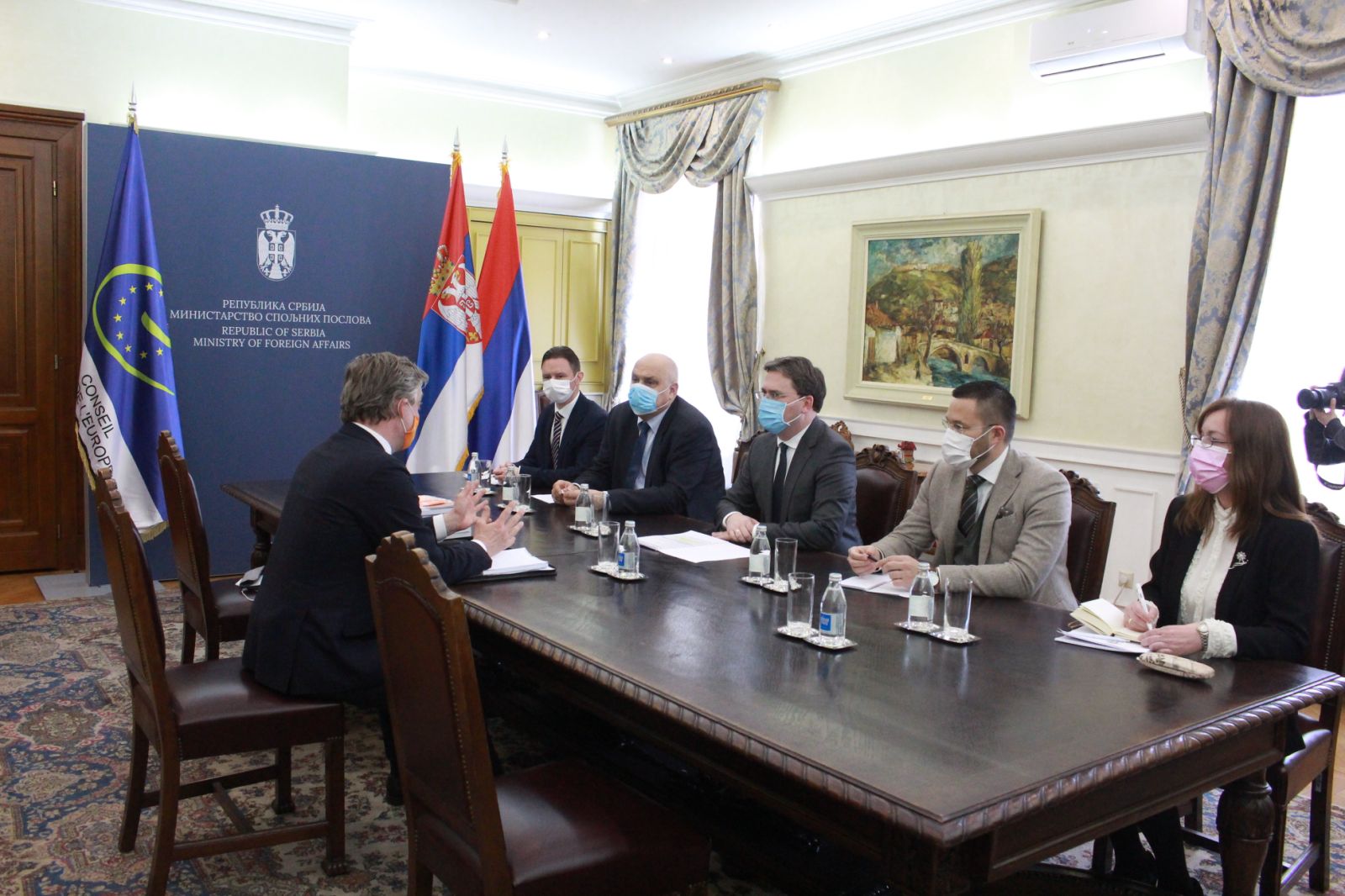
At today's meeting, the collocutors also discussed the upcoming visit by Governor of the Council of Europe Development Bank Rolf Wenzel.
Belgrade, 8 March 2021
|
|
|
| 8 March 2021- Selakovic: Fight against all forms of crime is a priority of the Serbian Government |
|
Minister of Foreign Affairs of Serbia Nikola Selakovic said today that the fight against all forms of crime was a top priority of the Serbian Government and an integral part of the EU accession process.
"It is also our moral duty, in order to leave a better world for the generations to come", Selakovic said participating via video-link at the 14th UN Congress on Crime Prevention and Criminal Justice, held in Kyoto.
Minister Selakovic emphasized that Serbia, in its Second Serious and Organized Crime Threat Assessment from 2019, identified as its goal to eliminate cybercrime, human trafficking, terrorism and irregular migration.
The Serbian Foreign Minister pointed out that our country had established in a timely manner a normative and institutional framework that regulates prevention of abuse in this area, as well as that the Office of the Special Prosecutor for Cybercrime, a special court department and a special police unit were established.
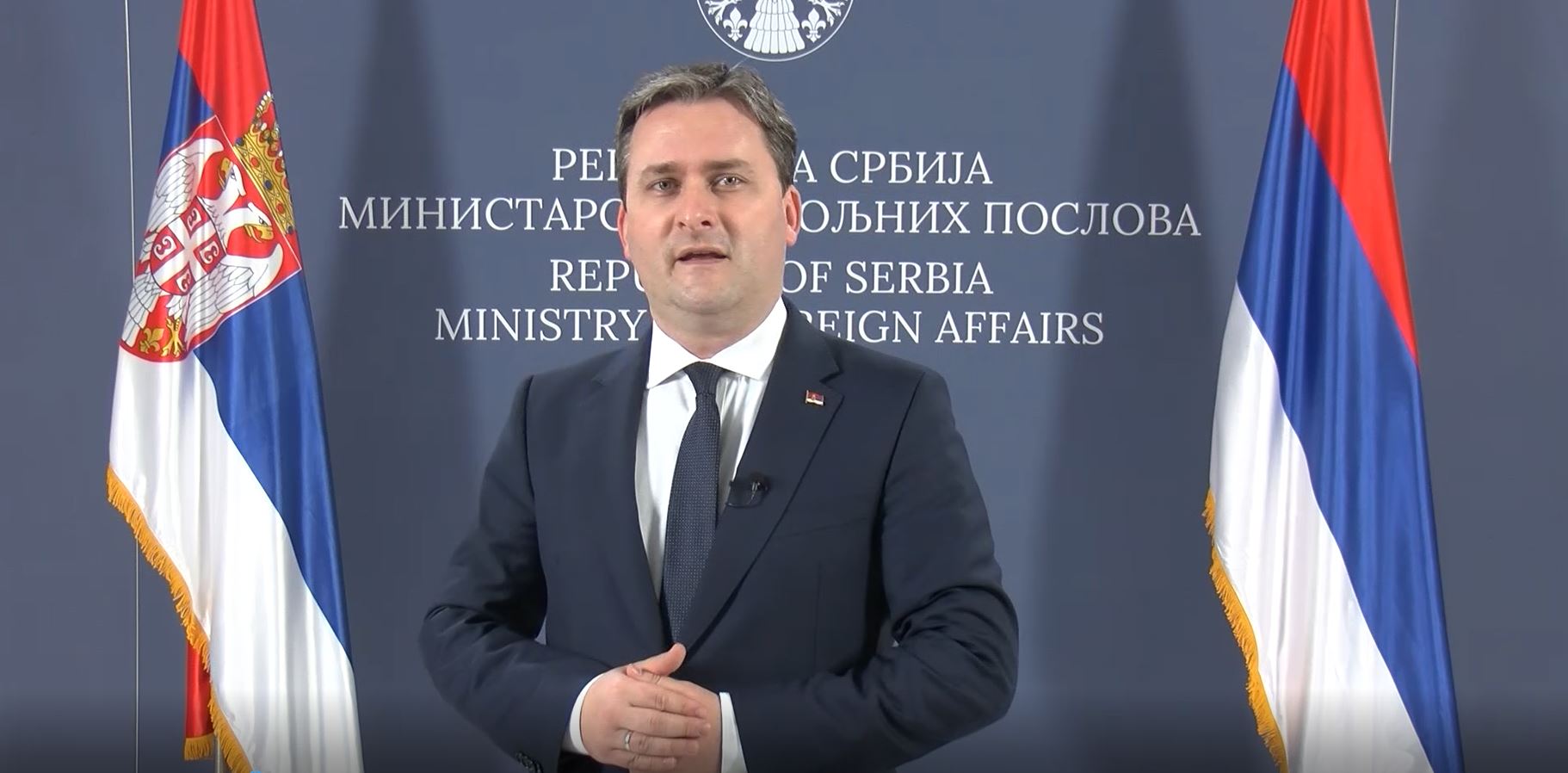
The Minister underlined that, in the field of the fight against corruption, Serbia was guided by the postulates set out in the UN Convention against Transnational Organized Crime and the UN Convention against Corruption.
Selakovic pointed out the efforts made by the Anti-Corruption Agency, as an independent state body, to protect the public interest, build individual and institutional integrity, strengthen transparency and accountability of the public administration.
"We strongly condemn all forms of terrorism, including extremism and radicalism, and call for them to be fully eradicated, while implementing the relevant UN resolutions and conventions and the UN Global Counter-Terrorism Strategy", the Head of Serbian diplomacy underscored.
In order to combat these complex phenomena efficiently and successfully, Selakovic said, it was of vital importance to build capacities of our societies and states, while exchanging experiences at the regional and global levels.
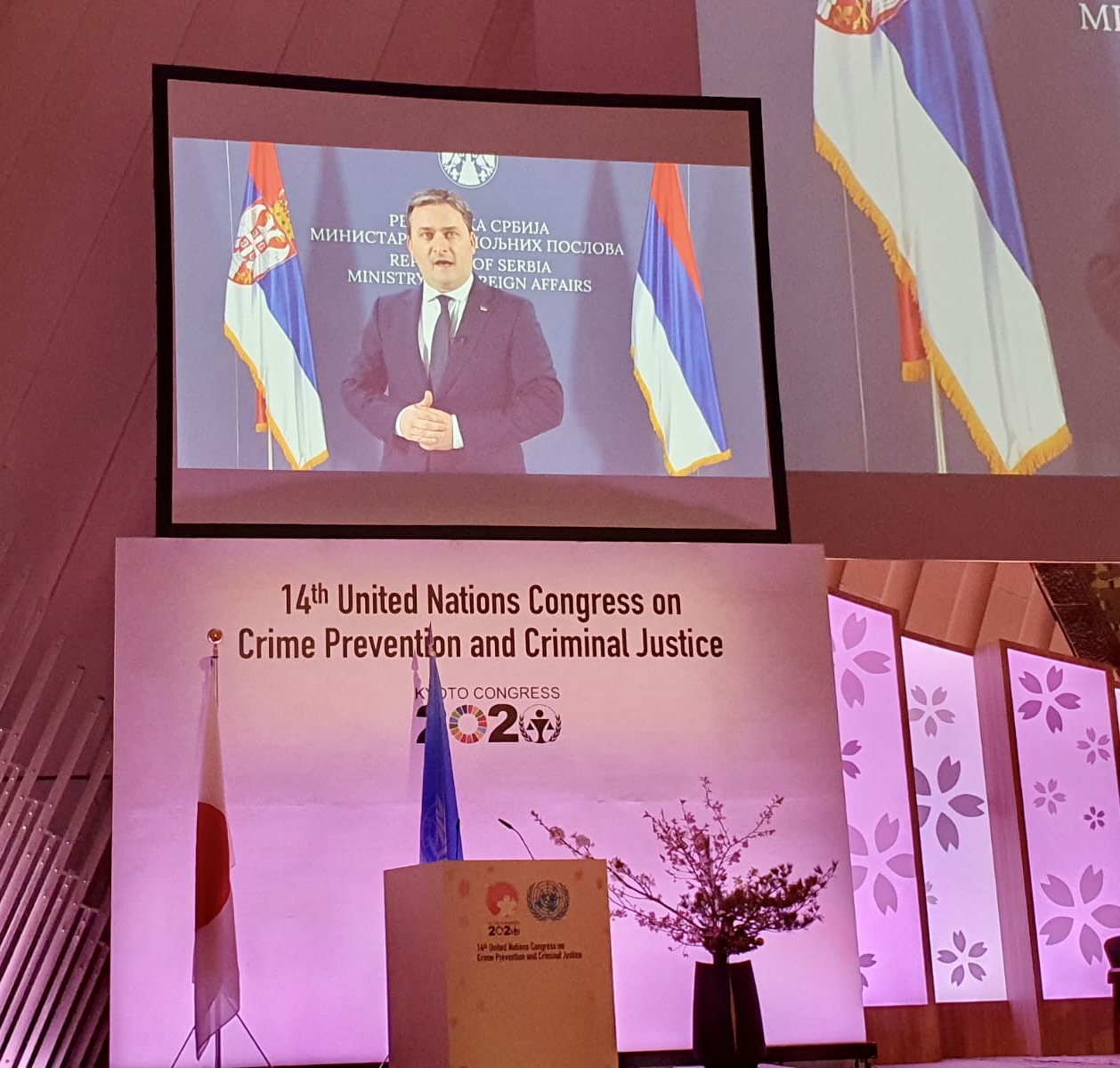
Minister Selakovic thanked Japanese Ambassador Hikihara for the skill he showed in conducting the talks on harmonizing and adopting the Kyoto Declaration, which, as he stressed, was an important indicator of the commitment to creating and maintaining the institutional framework for crime prevention as one of the main preconditions for promoting sustainable development goals.
"Back in 1970 when Japan hosted this event for the first time, we demonstrated strong political will to draw attention to the problem. Today, it is incumbent upon us to reaffirm this willingness and resolve and translate it into concrete steps", the Serbian Foreign Minister said.
|
|
|
| Ambassador Đurović shared information about vaccination process in Serbia during the exchange of views with CoE Commissioner for Human Rights |
|
At 1397th CM Meeting, which was held on 3rd March 2021, the CoE Commissioner for Human Rights Ms Dunja Mijatovic presented Paper on “Protecting the Right to Health through Inclusive and Resilient Health Care for All” and in the context of the current Covid-19 pandemic, the Commissioner highlighted in particular issues related to the right to mental health and in general the importance of access to medicines and vaccines.
At the same meeting Ambassador Đurović shared relevant information about successful vaccination process in Serbia.
Ambassador stated:
“Protection of the right to health is certainly one of the crucial topics during the crises that we are going through.
My country has been, just like whole Europe and the World, severely hit by the Covid-19 crisis. Enormous efforts have been undertaken to face the challenges on all levels and in all areas, having in mind, at the same time, not only the obligations related to non-discriminatory access of citizens to health services, but also to all the other rights guaranteed by the Constitution. I believe that our approach and results coincide with your recommendations.
Mass vaccination started on 19 January and now citizens of Serbia can request the vaccine they want, choosing from the four ones that have been approved by the competent authorities. At this moment among the European states, Serbia is the second in the number of vaccinations per capita and the fifth in the World. When we talk about the number of revaccinations, Serbia is the fourth in the world and the first in Europe.
In this process, we widely used the artificial intelligence and high technology to make sure that every citizen has equal, simple and quick access to the vaccines, and this approach was praised by media worldwide. There are clear rules on priority groups with respect to the level of risk for different groups, vulnerabilities and optimal achievements. It has been inclusive and transparent, thus avoiding any potential risk of discrimination.
We are especially happy to have been able to help some of the neighbouring states that still have not been provided with vaccines, by supplying a number of them, as a sign of solidarity. I would also like to emphasize that a large number of the members of diplomatic corps in Serbia have already been vaccinated.”
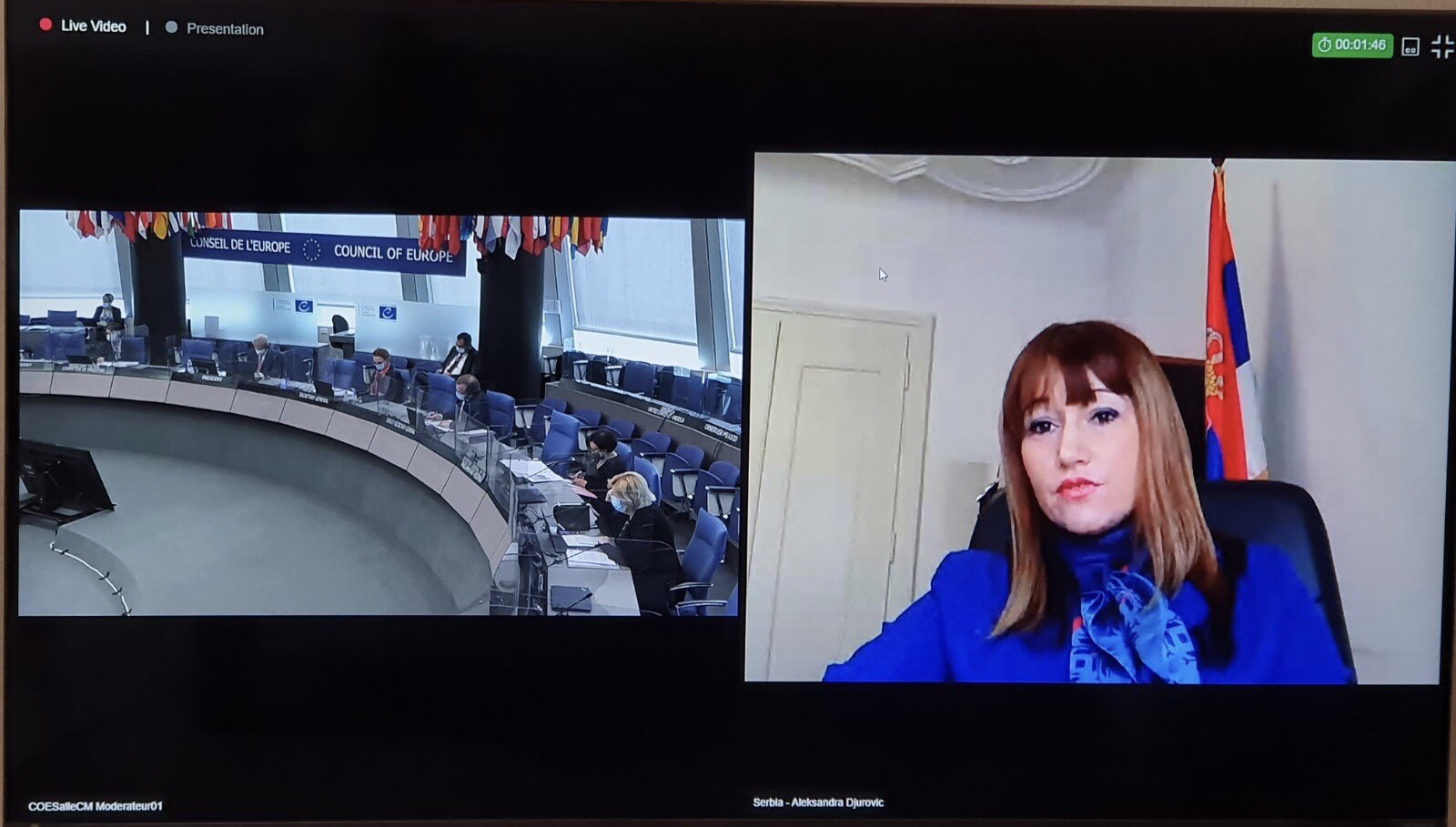 |
|
|
| Meeting of Ambassador Aleksandra Đurović with Tomaš Boček, Vice-Governor of the CoE Development Bank for Target Group Countries |
|
Ambassador Đurović met with T. Boček, Vice-Governor of the CoE Development Bank for Target Group Countries, on the occasion of the upcoming visit of the Governor and Vice- Governor of the CoE Development Bank to the Republic of Serbia. During the meeting, the projects that Serbia is implementing in cooperation with the CoE Development Bank were discussed, as well as projects that could be realized in the future.
The ambassador informed the Vice-Governor about the extraordinary results of the vaccination process in Serbia, the fact that in a short period of time about a million citizens of Serbia have already been vaccinated, as well as the assistance that Serbia has provided to the countries in the region. Also, she presented all the economic successes of Serbia to the Vice-Governor.
The Vice-Governor confirmed the existence of excellent cooperation between the Republic of Serbia and the CoE Development Bank and expressed special interest in the successful vaccination process in Serbia.
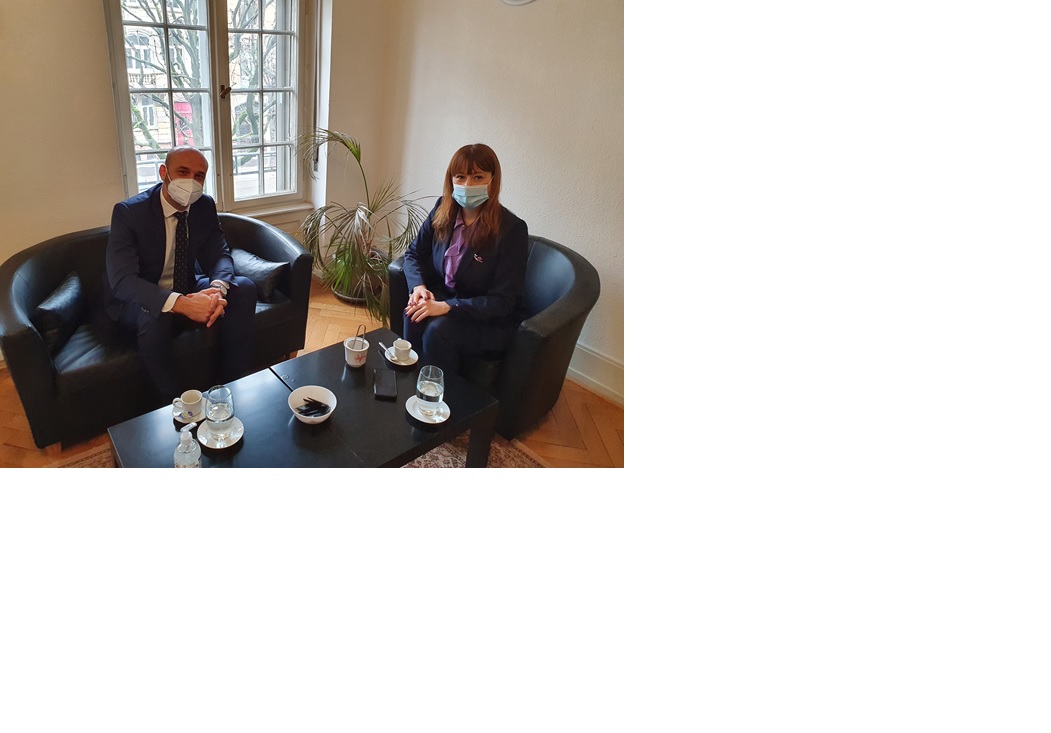
|
|
|
| Metropolitan Porfirije of Zagreb and Ljubljana elected as the new Patriarch of Serbia |
|
18 February 2021
The Holy Assembly of Bishops of the Serbian Orthodox Church elected His Eminence Metropolitan Porfirije of Zagreb-Ljubljana, PhD, as the new Serbian Patriarch, in its convocation in Memorial Cathedral of Saint Sava in Belgrade on 18 February 2021.
Immediately after the election a thanksgiving service was officiated and Many Years was chanted to the Archbishop of Pec, Metropolitan of Belgrade-Karlovci and Serbian Patriarch Porfirije. Bells at Saint Sava Cathedral in the Vracar district of Belgrade rang a few minutes before 4:00 pm indicating that the 46th Patriarch of Serbia was elected.
Newly-elected Archbishop of Pec, Metropolitan of Belgrade-Karlovci and Serbian Patriarch Porfirije (Peric) was born on 22 July 1961 in Becej, to father Radivoje and Mother Radojka. He was baptized as Prvoslav. He finished primary school in Curug, and the “Jovan Jovanovic Zmaj” Grammar School in Novi Sad. He was ordained a monk according to the rite of small schime by his spiritual father, then hieromonk Dr. Irinej (Bulovic), at Decani Monastery on Sunday of St. Thomas in 1985.
He graduated from the Faculty of Orthodox Theology in Belgrade in 1986, when the then Bishop of Raska-Prizren Diocese, future Serbian Patriarch Pavle of blessed memory, ordained him a hierodeacon at the monastery of Holy Trinity in Musutiste.
He attended postgraduate studies in Athens from 1986 until 1990. That year, upon the blessing of Bishop Dr. Irinej of Backa, he joined the monastery of Holy Archangels in Kovilj, where he was ordained as hieromonk and became its abbot.
Many young monks and novices came to the monastery following him. These were the years when the Kovilj Monastery became a spiritual center for many young people: intellectuals, artists, popular actors and rock musicians, especially from Novi Sad and Belgrade. Since then abbot Porfirije has particularly dealt with drug-addicted patients. In 2005, he formed for this purpose a therapeutic community called “The Land of the Living”, which is recognized as the most successful drug-addiction therapy project and, under the leadership of Bishop Porfirije, it has more than a hundred residents in camps throughout Serbia today.
During the ordinary meeting of the Holy Assembly of Bishops of the Serbian Orthodox Church in Belgrade on 14 May 1999 he was elected as Bishop of Jegar, Vicar of the Diocese of Backa.
He defended his PhD thesis Possibility of knowability of God in St. Paul’s understanding according to the interpretation of Saint John Chrysostom at the Faculty of Theology of the University of Athens in 2004.
He became a lecturer at the Faculty of Orthodox Theology - Department of Pastoral Psychology - succeeding famous psychiatrist, academician Dr. Vladeta Jerotic. His lectures have been attended not only by students of the Faculty of Orthodox Theology, but other Belgrade faculties as well.
Together with a group of experts: psychologists, doctors, criminologists, sociologists, Bishop Porfirije founded a civic association that deals with the resocialization of victims of destructive religious sects and cults.
Bishop Porfirije has not been just president of the Steering Board for a decade, but a real spiritus movens of the Humanitarian Fund “Privrednik”, which has provided scholarships for a great number of gifted, but poor pupils and students, regardless of their nationality or religious affiliation.
In 2005, the National Assembly elected him as representative of all Churches and religious communities, to be a member of the Council of the Republic Broadcasting Agency, and in 2008 the RBA elected him its president. As President of the Council of the Republic Broadcasting Agency, Bishop Porfirije supported the long-term interests of society and citizens, unaffected by political influences.
Since then, church radio stations have been heard in the broadcasting spectrum of Serbia. He has made a key contribution to launching of a series of radio and television shows dealing with religious topics.
In 2010, The Holy Assembly of Bishops entrusted him to establish military chaplaincy in the Serbian Armed Forces. The fruits of his labour in that field include not only the suitable legal regulations, but also the selection of military chaplains, the organization and equipping of churches at barracks and performance of the first religious services.
His expert theological works Bishop Porfirije published in magazines both in Serbia and abroad. He participated in a large number of scientific conferences and symposia across the globe.
Bishop Porfirije, as one of the most prominent contemporary Serbian clergymen and intellectuals, has an extremely wide circle of friends, not only in the Homeland, and he fosters personal friendship and close cooperation with priests and representatives of other Churches and religious communities.
He speaks Greek, English, German and uses the Russian language, while his style of communication is always adapted to his interlocutors.
He was enthroned as the Metropolitan of Zagreb and Ljubljana on 13 July 2014 in the Cathedral Church of the Transfiguration of the Lord in Zagreb. The solemn Hierarchal Liturgy was served by Serbian Patriarch Irinej, accompanied by a large number of archbishops of the Serbian Church and other sister Churches, as well as priests and monks, and pious people.
Source: SPC/Serbian Orthodox Church |
|
|
| President Vucic: Serbia is ready for dialogue on Kosovo and Metohija, but will refuse being humiliated |
|
President of the Republic and Supreme Commander of the Serbian Army Aleksandar Vucic attended a demonstration of capabilities of one part of Serbian Army units in the "Rastko Nemanjić" barracks in Pancevo. On this occasion, President Vucic stated that Serbia was ready to continue the EU-facilitated dialogue with Pristina at any point, while respecting also the position of the United States as well as the positions of Russia and China.
The President said that he would rather put his "head on the chopping block" than sign any document with a recognition and reminded that he had already once refused to do so in Washington, where there were two versions of the agreement.
He stated that he immediately had his delegation leave the meeting, that he told the U.S. delegation that Serbia would not sign such an agreement, while conveying that Serbia would always endeavour to hold peaceful talks in order to preserve peace, but that it would not take any humiliation.
The Serbian President thanked the U.S. President Joe Biden for the letter of congratulations on the occasion of the upcoming Statehood Day, in which, in addition to the usual emphasis on commitment to promoting economic cooperation, regional stability and democratic values, he unequivocally called for mutual recognition of Serbia and "Kosovo" as a result.
Mutual recognition between Serbia and "Kosovo" is not part of any act of any world organization, the President pointed out and reiterated that Serbia was ready to continue the EU-facilitated dialogue with Pristina at any point, while respecting also the position of the United States as well as the positions of Russia and China.
According to the president, the situation is difficult and will only be increasingly difficult.
"As I told you three days ago, I can see it and I expect it, I can see the situation slowly tightening, because the conflicts between them at the global level have been increasing and intensifying, and then we have to pay the price", the President said.
President Vucic said that said that it was up to our state to continue strengthening the country in the economic sense.
The President added that the role of the army was very important in the highly complex security and political conditions of the modern world, and that was why Serbia needed to do everything it could to deter any potential aggressor and attacks on citizens and the country.
"The policy of strengthening the armed forces will continue at a faster pace", the President emphasized, adding that the goal was for the Serbian Army to play a stabilizing role with regard to the political developments in the region.
According to him, it should be clear to everyone that Serbia was not a punching bag and that not everyone could attack and threaten it like it was the case in the past.
Vucic said that he was pleased with what he saw and that a lot had been done in the previous period, pointing out that the salaries of military personnel would be significantly increased as of April.
President Vucic also stated that investments in the Serbian Army would continue, whom he told that he expected the Army to continue to be the guardian of our country, its integrity and freedom.
"We expect you to be the guardians of our country, its integrity and freedom, the defenders of our people, the guardians of the homeland, the protectors of the interests of the state of Serbia and to be a deterrent factor for every aggressor and anyone who might consider attacking Serbia", Vucic said.
The military exercise called "Spearhead" demostrated the capabilities of the 72nd Special Operations Brigade, and the event, which the President of Serbia and the Supreme Commander of the Serbian Army assessed as very good, was also attended by Deputy Prime Minister and Minister of Defence Nebojsa Stefanovic and Chief of General Staff of the Serbian Armed Forces, General Milan Mojsilovic.
Photo: Presidency of Serbia / Dimitrije Goll
Belgrade, 7 February 2021 |
|
|
| Minister Selakovic speaks for Politika: The year of rejuvenation of Serbian diplomacy |
|
26 January 2021
Serbia's foreign policy positions are naturally being adjusted to the new developments at the international level, but our foreign policy priorities have not changed in a long time. Our top and most important interest is to preserve good-neighbourly relations and stability and peace in the region and, in the same context, to find a peaceful and just solution to the problems in Kosovo and Metohija, Serbian Foreign Minister Nikola Selakovic said in an interview with Politika daily.
Another lasting interest of ours is full membership of the European Union, because this is the type of society we strive for. At the bilateral level, our goal is to strengthen ties with traditional friends, the Russian Federation and the People's Republic of China, but also to build new partner relations with the United States. One of the most important tasks of our foreign policy is to improve the position and protect the rights and identity of our people in the region, as well as to provide various types of support to Serbs in the diaspora. All these are very important and more often than not complementary goals, Nikola Selakovic pointed out.
What kind of relations do you expect Serbia to have with the new U.S. administration?
It is too early to speculate about this in public. The new presidential administration in Washington is currently preoccupied with internal issues and this will be the case for some time. There are people in the team of President Joseph Biden who have dealt with our region, and it is likely that the Balkans and Serbia will be the focus of the U.S. foreign policy at some point. I will remind you that President Vucic and President Biden not so long ago had very substantive talks in Belgrade, after which our President stated that he had the opportunity to talk to someone extremely well acquainted with the situation in this part of the world and an extraordinarily prepared interlocutor. Taking their personal relationship into account, but also the importance of enhancing the ties between Serbia and the United States, we have reason to expect that a meeting between the two presidents will be organized in the foreseeable future. I am sure that the nature and dynamics of the relations between Serbia and the United States will be influenced by the fact that Ambassador Marko Djuric now represents us in Washington, whose presence at President Biden's inauguration ceremony is an important signal and, I believe, a harbinger of positive developments in bilateral relations between our two countries.
How would you describe our country's relations with Moscow, Brussels and Beijing?
Russia is our traditional friend and that friendship goes beyond merely political ties. These are deep spiritual, cultural and civilizational bonds, and it is only natural that we have a mutual interest in improving those ties, even though they are at a very high level. We have a relationship with the People's Republic of China which is, in addition to the sincere iron-clad friendship between our peoples and high political representatives, based on deep trust and mutual support. Full membership of the European Union is Serbia's strategic orientation that all our friends are aware of, but our country does not forget its friendships, but strengthens and promotes them instead, and approaches all with honesty and no ulterior motives. In this context, we do not seek any preferential treatment, but only the right to freely and independently make decisions about our future and relations with all who respect us.
Could Serbia pursue a different foreign policy than the one it is pursuing at the moment?
It is always possible to have a different policy, just look at the foreign policy of Serbia ten, twenty or thirty years ago, examine the results at that time and you will realize how irretrievably expensive that policy turned out to be. Whether a policy is right, at either foreign or domestic level, is measured through its results and effect on the lives of citizens and the fate of the entire state.
Our foreign policy priorities are not being defined on a whim, but are instead the result of a serious and deep examination of our complex position and strategic thinking about ways to improve it. Today, Serbia has a better international reputation and credibility than two decades ago, and the main reason for that is that our results have shown how serious and responsible we are as a country. That kind of credibility is not achieved by trickery, but only by hard and well-thought-out work on oneself. And I need to emphasize on this occasion as well that the main inspiration for such an attitude towards politics, the state and its future comes from none other than President Aleksandar Vucic. As Minister of Foreign Affairs, I have the opportunity on a daily basis to see the level of appreciation and respect President Vucic enjoys beyond the borders of our country.
When can we expect the vacant posts of Serbian ambassadors and consuls across the globe to be filled?
That is one of the main tasks for 2021. This will be a year of reinvigoration and I believe also rejuvenation of Serbian diplomacy. Our country, given its size, has a fairly extensive diplomatic network, which provides it with great opportunities for deepening political and economic relations with countries in all parts of the world. But we need more fresh and energetic staff, people who will be the most honourable representatives of a modern and dynamic Serbia. There are such people in Serbia, and we do need a serious rejuvenation, in order to avoid wide generation gaps in our personnel, and to lay the foundations of a modern career diplomacy.
How would you describe your relationship with Serbian President Aleksandar Vucic?
President Vucic and I are, in addition to having close and friendly relations, by virtue of the work we do and our constitutional competencies, the closest collaborators in the realization of Serbia's foreign policy goals. This allows me to talk to him often, and on many occasions learn a lot of new and important things. President Vucic is a man who inspires people around him with his strategic and visionary approach to politics, and I am proud to have had the opportunity to be part of his closest team of associates over the years, and to have had him as a kind of political mentor. In any case, his vision of Serbia as a modern, progressive and prosperous state, which independently and on its own will decides on its destiny, is my wish as well and key motivation for political engagement. For only such Serbia is a country that its own citizens, as well as Serbs beyond our borders, can confidently rely on, while also being an inspiration to the entire region.
Source: Politika |
|
|
| President Vucic: Serbia is the first in Europe in terms of growth |
|
Serbian President Aleksandar Vucic pointed out that Serbia is the first in Europe in terms of economic growth, which will be officially confirmed at the end of March, and that this was possible owing to the reform measures taken since 2014 and the rapid opening of the country after the first wave of corona virus.
The President pointed out that Serbia had a growth of 5.2 percent in the first quarter, while the Eurozone was at minus 3.2 percent, in the second quarter Serbia was at minus 6.3 percent, while the Eurozone was at minus 14.7 percent, and in the third quarter, when the Eurozone was at minus 4.3 percent, Serbia's figure was only minus 1.4 percent.
Vucic stated that Montenegro, for example, recorded as much as 26 percent minus in the third quarter.
Furthermore, the President emphasized that hospitals were built and renovated in our country, and that two hospitals were built from the ground up in just four months.
He said that the state made significant efforts to procure respirators, masks, gloves, protective suits, medicines, everything that was needed, and pointed out that work was being done on 10 general hospitals throughout Serbia, adding that all these were major achievements that were only possible owing to the success of the 2014 reforms, the enactment of the Labor Law, which yielded excellent results, and also through fiscal consolidation measures.
"These are unprecedented results for Serbia. Was Serbia ever before the first in Europe in terms of growth rate? We will get the results on 31 March that will confirm that Serbia is number one in Europe. All that was possible thanks to people who believed in difficult changes", Vucic said.
According to the President, this year, as many as six highways will be built in Serbia at the same time, and in this regard, he noted that Bulgaria has announced that the highway from our border to Sofia will be completed by the end of the year, after which it will be possible to use motorway to travel to Istanbul, which is very important to ensure that our country is on a transport route.
President Vucic emphasized that in 2020, the so-called year of corona, our country had a net inflow of foreign direct investment amounting to EUR 2.9 billion net, and three billion gross, which means that many foreign companies such as Toyota Tires, Boysen, ZTF and Brose have invested in Serbia even in this year of crisis.
The President said that Serbia has the highest average wages in the region, amounting to 511 or 512 euros, and that in February, due to the January increase, the average wage will be 535 or 536 euros, and that only in Belgrade in the last seven years the average wage increased by 180 euros or 40 percent.
That President said that Serbia was fourth in the region in terms of salaries before, and that today we are officially the first, and that the difference in relation to other countries will only increase faster. He also pointed out that the employment rate is growing in Serbia as well as that our public debt increased less than in most European countries. This is illustrated by the data that in Italy the public debt surged to 156 percent, in Germany to 87 percent, in France to 114 percent, in Croatia to 88 percent, while in Serbia it is at 57 percent.
The Serbian President announced that by Sretenje, 15 February, an additional package of assistance to the economy will be earmarked, and as he explained, it will be a new capital injection for companies, the trade, entrepreneurs, small, medium and large enterprises which, as he said, concerns 1,052,000 people within that system.
Vucic specified that it will most likely be help in the form of two or three payments amounting to half a minimum wage each, and that there will also be sectoral aid for tourism, hotel owners, travel agencies, guides, for bus carriers, through another half minimum wage payment.
The President added that efforts will be made to extend the guarantee schemes as well, which proved to be excellent, amounting to 1.5 billion, and this time, through the same system, two more portions amounting to 500 million each could be provided.
Vucic said that the first agreements with DFC worth 300 to 400 million dollars are expected in seven days.
He also stated that the state will endeavour to help pensioners further, in addition to increasing pensions by 5.9 percent in January, which will be reflected in their first checks in February, and added that pensioners should by March receive symbolic aid in the form of packages with vitamin C, D and zinc, which, as the President said, are small things, but they reflect the state's care and efforts made to protect health.
The President announced that negotiations on the procurement of the Chinese vaccine would be completed in the next seven to eight days, after the first quantities of the Pfizer and Sputnik V vaccines have arrived in Serbia, and pointed out that the Chinese vaccine was of exceptional quality, but probably the most expensive, which is why he wrote to the Chinese President and asked for a discount for our country.
Vucic thanked the Americans for deciding to sell the vaccine to our country and noted that no one in the region other than Serbia has received it, except for the small quantity that Albania got.
He pointed out that our state relied on itself and its own capacities, and that our state leadership anticipated that vaccines within the European COVAX plan would arrive late.
The President rejected the claims about bad results of Serbia in the fight against the corona virus and stated that our country has recorded the lowest corona virus mortality rate in the region.
He presented statistical information indicating that Slovenia had 144 deaths per 100,000 inhabitants, North Macedonia 126, Bosnia and Herzegovina 123, Bulgaria 115, Montenegro 115, Hungary 110, Croatia 107, Romania 85, and Serbia 51.
"The mortality rate in the region is as follows: Bulgaria 3.9, Bosnia and Herzegovina 3.7, Hungary 3.11, North Macedonia 3.03, Romania 2.48. Slovenia 2.15, Croatia 1.99, Montenegro 1.4, and Serbia 1.0. This can be seen in the graphs and is no fabrication", the President stressed.
He said that the state will fight for vaccines, and that only Serbia, in the Western Balkans, received significant quantities of vaccines, other than a smaller quantity that Albania received, and added that in one day since the registration for vaccination opened, as many as 63,000 persons have registered.
President Vucic expressed his belief that the year ahead will be better than the previous one as well as that the corona virus will be defeated through vaccination of citizens.
Belgrade,
12 January 2021
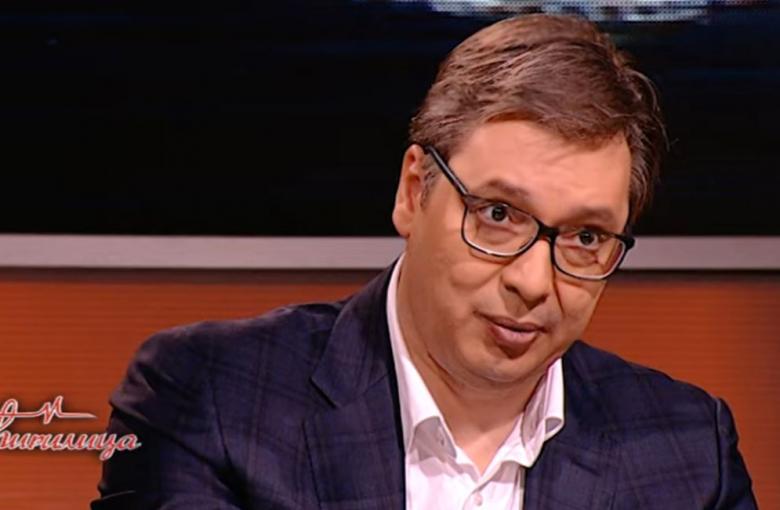
|
|
|
| Every Serb in the diaspora is potentially a lobbyist |
|
Our compatriots living abroad are one of the great potentials that the state has not recognized in the right way so far, which is why a different approach is needed to the issue of how to strengthen our diaspora and use the good will of people who are potential lobbyists for the interests of Serbia and the Serbian people, Foreign Minister Nikola Selakovic said.
"When it comes to Serbs in the diaspora, and especially in the region, this issue has been a kind of an unattended crop which requires a lot of work, and even when a lot is done at once this is not apparent immediately ", Minister Selakovic stated in an interview with Tanjug.
He emphasized that the appointment of the Director of the Office for Cooperation with the Diaspora and Serbs in the Region for the first time after almost seven years since this body was formed within the Ministry of Foreign Affairs, shows that it is one of the priorities of the Ministry he is at the helm of.
Selaković notes that intensive efforts have been long underway on forming a plan to make the diaspora more visible both outside the borders of Serbia and in the mother country itself.
"Every person in the diaspora is a potential lobbyist for the interests of our country and people, and we need to find the right way to use that", he said.
That much can be done in that regar Selakovic illustrates with the fact that only in Switzerland, in 24 cities, there are Serbian cultural and artistic associations which amounts to more than 3,000 young people who get together in order to preserve our tradition, culture, the Serbian language and history.
"If they were able to set up such associations in 24 cities, it speaks volumes about the enthusiasm of these people. There is so much enthusiasm, energy and love in these people. We need to explore ways to help them and use their good will and potential", the Minister points out.
He also cites the example of an emigrant family in Canada, the Varaklic family from southwestern Serbia, who sends Christmas packages for children in the Raska region every year. He adds that they have so far donated hundreds of thousands of dollars to non-governmental organizations for those needs alone, but he says that we do not see that here.
"The state does not recognize this, and these are people who gained success as entrepreneurs working in a distant country, who can be serious lobbyists for Serbia, for Serbian interests, someone who represents us in the best possible way", Minister Selakovic said.
Minister Selakovic also pointed out that Arnaud Gouillon has been appointed as head of the Office for Cooperation with the Diaspora and Serbs in the Region and described him as a man of extraordinary energy, great love for the Serbian people, which he showed in his engagement towards Serbs in Kosovo and Metohija, where they were seriously endangered.
"By doing so, he showed and set an example to many of our compatriots of what an individual can do. And when one such individual focuses energy, enthusiasm and love for people, on work done within the state administration system, I think that the preconditions have been created for such activities to yield good results", Minister Selakovic said.
Source: Tanjug
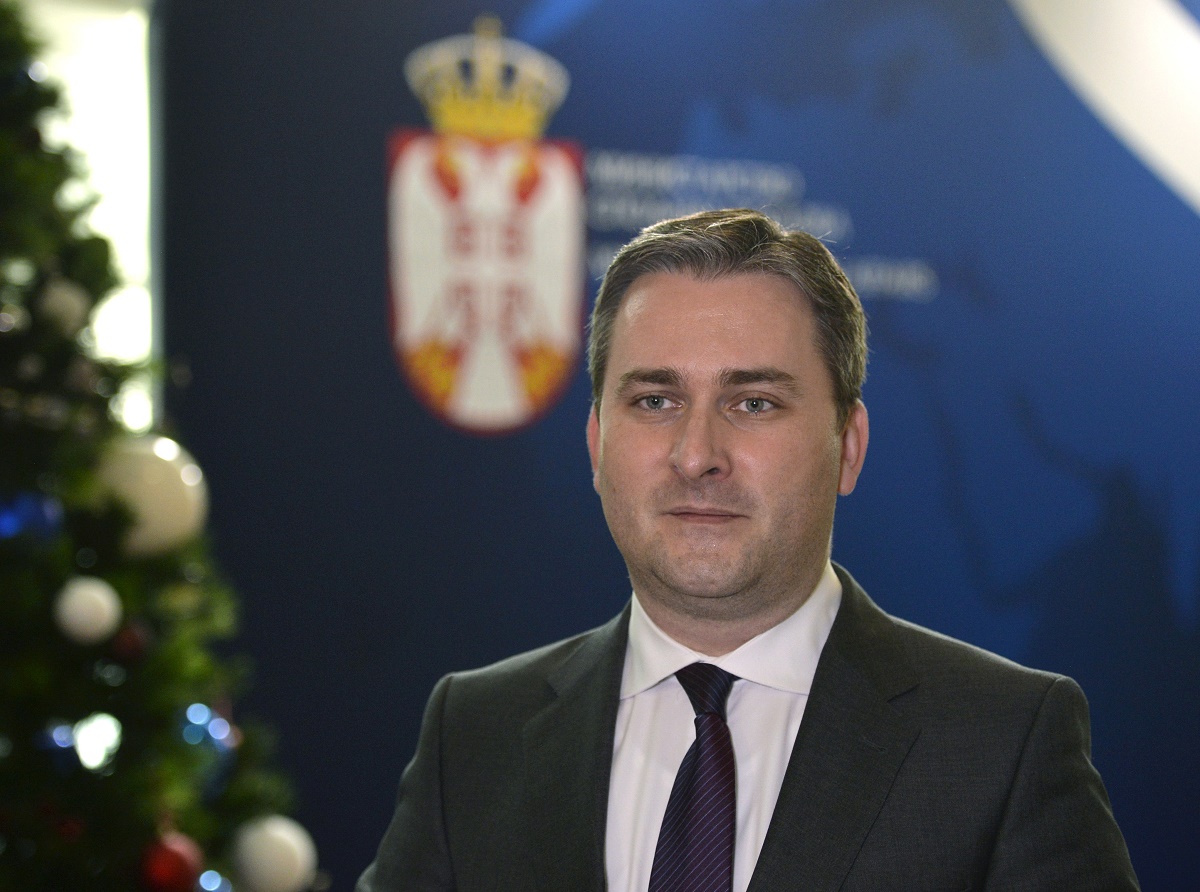
|
|
|
| Minister Selakovic: New ambassadors will be appointed this year, but the goals remain the same |
|
This year, Serbia could finally have Ambassadors and Consuls General appointed to about a third of the currently vacant positions in the country's diplomatic and consular missions in the world, and Minister of Foreign Affairs Nikola Selakovic is convinced that most of these positions will be filled, as he points out, by the best possible people.
"In the next year, I am convinced that the majority of these vacancies will be filled", Selakovic told Tanjug, emphasizing that the work is being done gradually, because the state wants to show that is has a quality staff who will represent Serbia's interests in the best possible way.
The Head of Serbian diplomacy reminded that in a number of diplomatic missions, the four-year mandate of Ambassadors and Consuls General has already expired, so that the procedure for appointing new ones will follow, after their recall.
One of the "vacant" spots is the post of the Serbian Ambassador to China.
"We are working hard to find the best possible solution for our new Ambassador to China and as we appointed one of the best people in the state system as Ambassador to the United States, who, I am sure, will perform his duties in the best possible way, I am convinced that it will be the same for the Ambassador in Beijing", Selakovic said.
The Minister, who took over the foreign policy sector in the Government a little over two months ago, points out that circumstances in the world, as well as Serbia's position in it, have changed, but that Serbia's foreign policy goals do not change: the country remains strategically committed to European integration and, while pursuing the EU path, it will also strengthen traditional friendships with Russia and China, as well as promote and strengthen new partner relations with the United States.
"Relations in the region, good-neighborly relations, regional cooperation are also important for Serbia, because this fits into the set of requirements on the European path. But, even regardless of the European path, it is always important who you live next to, who you live with, what your neighbors are like and what the relations are like in the neighborhood", Minister Selakovic said.
He also points out that the issue of Kosovo and Metohija is of inestimable importance, it being the main national and state issue for Serbia and the Serbian people.
"When I say that circumstances are changing, but not the goals - the EU and European integration was our goal seven years ago as well, but look at what our room for maneuver was then, in terms of economic aspects, and look at it today. Circumstances changed, and then you adjust your actions to these changed circumstances, to the best extent possible", Minister Selakovic said.
He reminds that foreign policy priorities for 2021 were also outlined by the President of the Republic, and that maintaining peace and stability in the region is the absolute priority.
"Only in a peaceful and stable region of the Western Balkans and Southeast Europe can Serbia thrive economically, culturally and scientifically - in every respect. Peace and stability in the region are “sine qua non” without which there is no development and progress. Serbia has acted, is acting and will act as a factor that stabilizes the entire region and maintains peace in the region, showing that it is the region that benefits everyone the most", Minister Selakovic said.
Relations in the region have always been complex, and the region, Minister Selakovic noted, is to our great regret, burdened with issues that we cannot have a bearing on, and which concern
the past.
Serbia's approach is to seek room to influence what is happening today and what will happen
happen in the future.
In this context, he states that the so-called "mini-Schengen" initiative for market unification of the region, which originated from Aleksandar Vucic and was met with a positive response from the Prime Ministers of Albania and North Macedonia, is one of the opportunities to do much more for the region.
"To show how much more we can do if we act together and if we seek our common denominators, and not what separates and divides us ", Selakovic points out.
When it comes to relations with the United States, Selakovic said that one should not expect the great powers to change their positions the way we would like, want or imagine, but that it is important that the Ambassador in Washington, Marko Djuric, also emphasized that his task, among other things, will be to make efforts to change the climate in bilateral relations with the United States - the most important country in the world, as our lacking communication with them in the past seriously affected the position of the Serbian people and Serbia.
"I am convinced that Djuric will work seriously on that, together with President Vucic, Prime Minister Brnabic and the Ministry of Foreign Affairs, and contribute to a large extent to changing that climate", Minister Selakovic said.
He points out that it is extremely important for Serbia to promote its partner relations with the United States to a higher level.
"This is a country with which we cooperate closely in many areas and a country with which we must strive, and not give up in doing so, to find what we have in common, our common ground and good examples of our cooperation in the past, and to create space for such cooperation in the future as well", Minister Selakovic concluded.
Source: Tanjug
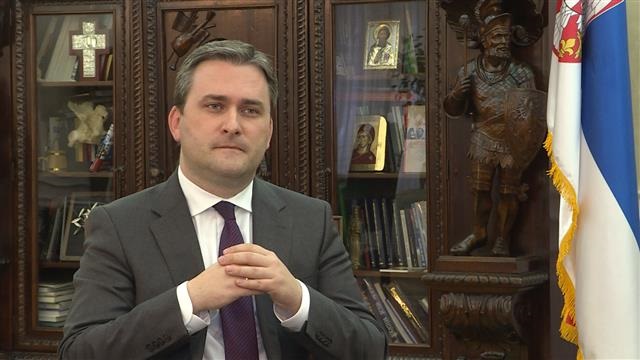
|
|
|
| President Vucic: Serbia to remain on the course of a winning policy of stability |
|
29 December 2020
Preservation of peace, taking care of the health and better living standard are key for Serbia in 2021, underlined President of the Republic Aleksandar Vucic, convinced that even though the completion of this ambitious and by no means easy task will be anything but straightforward, best results can be achieved by working in concert with the Government, while ensuring security and a future of certainty for the citizens.
The President said that Serbia has set for itself great and ambitious goals for the next year, notwithstanding the complex international and regional circumstances, and that it will endeavour to fully preserve peace and stability in the region and the country, while safeguarding the vital national and state interests.
"Serbia will remain on the course of a winning policy - the policy of stability", President Vucic said and stressed that our country remains on the European integration path and that it will carefully foster its friendship with Russia and China, while building a friendship with the United States as well.
According to the President, Serbia will continue to pursue a winning policy, with the country itself as a top priority, i.e., a policy that will enable Serbia to continue being one of the top three countries in Europe in terms of growth rate in the next two years.
A precondition for that, the President noted, is to crack down on criminal groups, but also to ensure even bigger investments in the police and army forces.
"Serbia is the country that recorded the highest growth in Europe in 2020", the President pointed out at the annual press conference and added that he expects to conclude a new arrangement with the IMF, as well as that Serbia, by the end of next year or early 2022, will raise its credit rating to an "investment" one, which will put our country's rating on par with the most developed EU countries.
As the greatest success in 2020, Vucic noted that Serbia will end the year with the highest growth rate in Europe, which, as he said, is expected to be from minus 0.75 percent to minus one.
"I am proud to be the President of a country that is the European champion in terms of GDP", Vucic pointed out and added that German Chancellor Angela Merkel was also pleased with Serbia's success.
According to President Vucic, this result will encourage Serbia to accelerate its European path, while continuing friendships with those who did not turn their backs on Serbia when it was at its darkest hour, namely Russia and China.
The President pointed out that the activities to attract foreign investors will continue, then that work will be done on investments in agriculture, primarily the food industry, new machinery, and digitalization of agriculture. President Vucic also emphasized that the goal is for salaries in the public sector to average between 560 and 570 euros by the end of the year. Only in Belgrade, the average salary would be around 700 euros.
President Vucic reminded that the salaries of health care workers will increase by five percent from January 1, while the salaries of others in the public sector will increase by 3.5 percent and an additional 1.5 percent as of April 1, while corporal, private first class and non-commissioned officer army ranks will get an increase of an additional 10 percent. He noted that the minimum wage will be increased by 6.6 percent and so will pensions from January 1, by 5.9 percent, with the plan that the average pension amounts to 270 euros by the end of 2021. The President especially pointed out investments in health care, reminding that two new covid hospitals have been opened and that the renovation and construction of health facilities continues throughout Serbia, while stressing that Serbia is by far the first in the region in terms of hospitalized persons per 100,000 citizens, which is why it has recorded a low mortality rate, and also that Serbia this year has been among the top three countries in the region according to the number of PCR tests performed.
Speaking about tourism, the President said that, next year, efforts will be made on the development of the Danube basin region, from Apatin to Kladovo, that the Ovcar-Kablar Gorge will be developed, as well as our mountain centers.
Discussing the field of culture and information, President Vucic said that the implementation of the media strategy and the completion of the reconstruction of the National Theater in Subotica are important for next year, and he announced investments in museums, especially emphasizing the relocation of the History Museum to the train station building. He also stated that the floor heating in the Church of Saint Sava will be completed next year.
He pointed out that the state will continue to take care of our citizens in Kosovo and Metohija, that no one can forbid Serbia to help its people, and that Serbia will not give up on helping our people.
As he emphasized, Serbia is ready to send medicines and vaccines to the Albanian population as well, and pointed out that in the upcoming period our country will pursue a policy of peace in the region and will endeavour to cooperate with Zagreb, Sarajevo, Podgorica and others. |
|
|
| Serbian Prime Minister the first PM in Europe to receive a Covid-19 vaccine |
|
Prime Minister of the Republic of Serbia Ana Brnabic received today the first vaccine against the coronavirus made by Pfizer company, at the Torlak Institute of Virology, Vaccines and Sera.
Brnabic, who is the first European Prime Minister to receive the vaccine, pointed out that this day may be the first since 6 March that we have a reason for a smile on our faces as it marks the beginning of the end of the coronavirus pandemic in Serbia, but also in Europe and the world.
As Prime Minister and as someone who leads the COVID-19 Crisis Response Team, I felt obliged to be the first to receive the vaccine, to show that we believe in it, as well as in our institutions - the Medicines and Medical Devices Agency of Serbia and experts who worked round the clock to test the vaccine, she said.
Underlining that it was an honour to do this for her country and be the first to pave the way for all citizens, the Prime Minister said that she agreed with President of the Republic Aleksandar Vucic that the two of them receive different vaccines, so he will most likely receive the next one that arrives, most probably the one produced by China.
At the moment we have the Pfizer-BioNTech consortium vaccine, and the vaccines from the Chinese Sinopharm are expected in the near future, as well as certain quantities of the Russian vaccine Sputnik V.
She expressed her belief that at the end of the first quarter or the beginning of the second quarter of next year we will have the vaccine of the company AstraZeneca, and after that the vaccine manufactured by Moderna.
As we promised, all vaccines licensed in their countries and approved by relevant international agencies will be available to our citizens, and of course they will be tested by all of our agencies and institutes as well, the Prime Minister pointed out.
She said that prior to the vaccination of health care workers, Minister of Health Zlatibor Loncar will also receive a vaccine shot as we endeavour to serve as an example and show how confident we are in the vaccines and institutions.
Brnabic pointed out that Serbia, not counting Great Britain, is the first country in Europe to receive the Pfizer-BioNTech vaccine, and the third to start a mass immunization and campaign for giving the vaccine - after Great Britain and Switzerland.
We achieved something very important and we will not stop even for a moment until the immunization of the population is completed, the Prime Minister said.
She specified that our country will receive another 16,000 doses of Pfizer-BioNTech vaccine in January, as well as that together with other vaccines we will have a total of one million doses in January, and a total of approximately two million doses during the first quarter of next year.
There is a dynamic on which Pfizer delivers vaccines and it varies depending on the production, and this is the case with deliveries to both Serbia and all other countries worldwide. We expected to receive 10,000 doses from Pfizer-BioNTech in December, however 4,807 doses arrived, the Prime Minister explained.
Serbia demonstrated that it is able to fight and succeed if we all work as a team, Brnabic said and called on all not to see the beginning of vaccination as the end of the fight already, but to continue to apply all measures instead.
This is to be certain and to be able to help our health care workers, and once the immunity is acquired we will be able to slowly start taking off the masks in 2021, but until then we should not see this as a victory but as the beginning of the end, the Prime Minister concluded.
After the Prime Minister, vaccine shots were also administered to the Minister of Labour, Employment, Veteran and Social Affairs and a member of the COVID-19 Crisis Response Team Darija Kisic Tepavcevic and to Predrag Kon who is also on the COVID-19 Crisis Response Team.
Furthermore, vaccine shots were also given to Head of the MMA Department for the Prevention and Control of Nosocomial Infections prof. Dr. Vesna Suljagic and academician Predrag Pesko, professor of Belgrade and Heidelberg universities and full member of the Serbian Academy of Sciences and Arts.
The first quantities of the vaccine arrived in Serbia on 22 December, and today they will be administered to patrons of nursing homes in Belgrade and Novi Sad.
Serbia is the first country in the region to receive a shipment of Pfizer-BioNTech vaccine.
In addition to procuring the vaccine among the first countries in the world, even before EU countries, Serbia is one of the rare countries that managed to build and open two covid hospitals in record time. The hospitals with 930 beds in Batajnica and 500 beds in Krusevac are a major contribution to the expansion of capacities and strengthening the health care system in the fight against coronavirus and, as President Vucic said, represent a monument of the future, that will talk about the accomplishments the state made in a short time.
Also, we recall that investments in health infrastructure have been large in Serbia, and since 2016, 80 health centers and clinics have been renovated, and works are underway on six large health centers. This way more than EUR 200 million was invested in the reconstruction, construction and equipping of hospitals and more than 300 million in the renovation of clinics and specialized hospitals, and many have already been completed, such as the University Children's Hospital Tiršova, and KBC Zemun nad KBC "Dragiša Mišović" hospitals.
The absolute priority of the Serbian Government is the successful completion of health infrastructure projects that are underway, but great attention is also paid to health workers, whose salaries have, by 2020, been increased by 56.8% for specialist doctors, and 66.9% for nurses, while significant funding is invested in the education of health professionals, as well as in equipment and working conditions.
Like other countries, Serbia has faced great challenges this year, most notably health challenges, and all factors in the state were focused on preventing the spread of the virus and safeguarding the lives and health of citizens. Serbia has faced these challenges better than many wealthier and more developed countries in Europe and the world.
Belgrade, 24 December 2020 |
|
|
| STATEMENT BY THE MINISTRY OF FOREIGN AFFAIRS |
|
On the occasion of 10 December, the international Human Rights Day, the Ministry of Foreign Affairs of the Republic of Serbia reaffirms its commitment to the principles and values of the Universal Declaration of Human Rights, adopted on this day in 1948.
The principles enshrined in the Universal Declaration of Human Rights have been the foundation for the development of international law in this field, and of the international system for the promotion and protection of human rights, as a unique achievement of modern civilization. It is incumbent upon us today to safeguard and strengthen the international system ensuring respect for human rights, to develop human rights standards, control the implementation of commitments, and also to continue cooperating with international and regional institutions on the protection of human rights.
Serbia is fully committed to the universal values of human rights and implementing in practice the international legal instruments relating to human rights. Our continued cooperation with the Human Rights Council mechanisms in the framework of the United Nations, with the Council of Europe and the mechanisms of the OSCE human dimension, represents an important segment of activities carried out by all state authorities, thus demonstrating our consistent commitment to the implementation of international human rights standards.
The international Human Rights Day is an opportunity to point out once again that Serb and other non-Albanian population is being deprived of its rights in Kosovo and Metohija and to call again on the international community to ensure the respect for the guaranteed international human rights norms and contribute to creating conditions for the return of internally displaced persons and giving them back their usurped property. |
|
|
| Minister of Foreign Affairs Nikola Selaković at the 130th Session of the Committee of Ministers of the Council of Europe |
|
The Minister of Foreign Affairs of the Republic of Serbia Nikola Selaković participated at the 130th Session of the Committee of Ministers of the Council of Europe, held via video-link on 4th November 2020.
In his statement, Minister Selaković said that the Republic of Serbia was committed to continuous co-operation with the European Court of Human Rights and had managed to successfully execute the most complex judgments of the Court. The Minister emphasized that, despite the many challenges and problems it had produced, the COVID-19 pandemic had once again shown the importance of multilateralism and international co-operation. He underlined that the crisis should not lead to marginalisation of existing long-standing problems such as racism, xenophobia, intolerance, hate speech, lacking social cohesion, poverty, various manifestations of discrimination and inequality, etc.
Minister Selaković expressed the support to the Istanbul Convention and declared that Serbia would continue to resolutely support combating violence against women and fighting domestic violence. He informed that with the election of the new Government of the Republic of Serbia, headed by Ms Ana Brnabić, in which 10 out of 23 ministries were headed by women, Serbia had justified its traditional ranking among countries with balanced statistics in terms of equality parameters. The Minister underlined that Serbia had consistently demonstrated its commitment to the principles and values of the Council of Europe and that the new Ministry for Human and Minority Rights and Social Dialogue is formed.
The Minister reminded that Serbia supported every engagement of the Council of Europe in Kosovo and Metohija aimed at promoting standards in the fields of human rights, rule of law and democracy, carried out pursuant to the status-neutral policy of the Council of Europe and co-operation with Provisional Institutions of Self-Government in Pristina in their “functional capacity” in line with the United Nations’ Security Council Resolution 1244, as the framework for all activity of the international presence in the Province.
Greece transferred the six month presidency of the Committee of Ministers of the CoE to Germany. |
|
|
| COMMITTEE OF MINISTERS OF THE COUNCIL OF EUROPE CLOSES CASE OF "ALIŠIĆ V. SERBIA" - STATE SECRETARY OF THE MINISTRY OF FINANCE MR GOJKO STANIVUKOVIĆ AT THE MEETING OF SUPERVISION OF THE EUROPEAN COURT OF HUMAN RIGHTS JUDGMENTS EXECUTION |
|
State Secretary of the Ministry of Finance of the Republic of Serbia Mr Gojko Stanivuković informed the Committee of Ministers of the Council of Europe of the measures that the Republic of Serbia has taken in implementation of the judgment of the European Court of Human Rights "Ališić v. Serbia".
Mr Stanivuković highlighted full commitment of Serbia to the multilateralism, the Council of Europe and the European Court of Human Rights. He also said that Serbia is a proven friend of Convention and a defender of its values. Complying with the Strasbourg Court judgements and holding the Conventions values high is not just a legal obligation of the authorities in Belgrade, but a choice of key importance for the strengthening of democracy, rule of law and human rights, as well as for the progress in the European integration, the State Secretary underlined. Serbia today has a limited number of execution cases pending before the Committee of Ministers.
The Committee of Ministers welcomed the major progress achieved by the Serbian authorities in the execution of the judgment as well as their commitment to continue this work.
Having concluded that the repayment mechanism to recover “old” foreign-currency savings met the criteria set out in the judgment and that the necessary measures had been adopted, the Committee of Ministers decided to close the examination of this case.
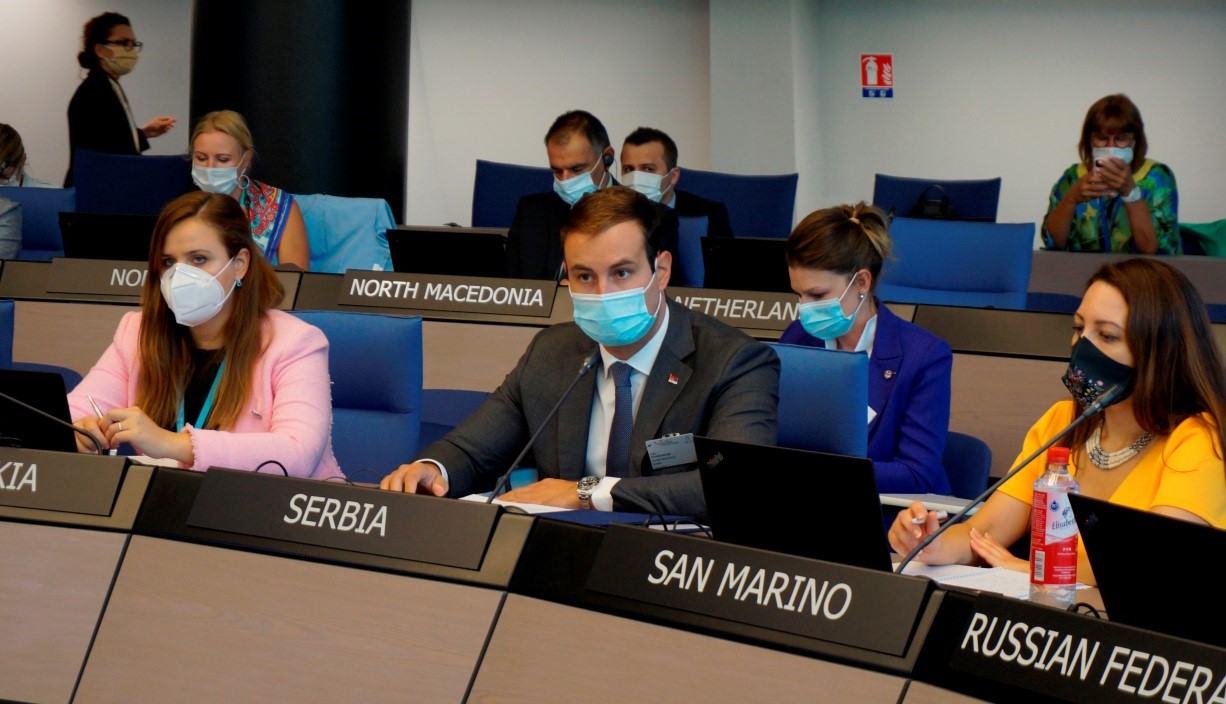 |
|
|
| STATE SECRETARY OF THE MINISTRY OF JUSTICE MR RADOMIR ILIĆ AT THE MEETING ON THE EXAMINATION OF THE EXECUTION OF THE JUDGMENTS OF THE EUROPEAN COURT OF HUMAN RIGHTS - COMMITTEE OF MINISTERS WELCOMES THE ADOPTION OF THE LAW ON DETERMINING THE FACTS CONCERNING THE STATUS OF NEW-BORNS SUSPECTED TO HAVE DISAPPEARED FROM THE MATERNITY WARDS IN THE REPUBLIC OF SERBIA |
|
State Secretary of the Ministry of Justice Radomir Ilić presented at the meeting of the Committee of Ministers of the Council of Europe on March 5 the Law on Determining the Facts Concerning the Status of New-Borns Suspected to Have Disappeared from the Maternity Wards in the Republic of Serbia, adopted by the National Assembly of the Republic of Serbia on February 29, 2020. He informed about further steps that Serbia will take to fully comply with the judgment of the European Court of Human Rights "Zorica Jovanovic v. Serbia". The Action Plan provides for the Government of Serbia to ensure that the investigatory mechanism operates smoothly in Convention compliant fashion, as well as to continue intensive cooperation with the Council of Europe in this process.
The decision of the Committee of Ministers of the Council of Europe, adopted on March 5, expressed great satisfaction that the National Assembly adopted the law setting up an independent investigation mechanism to establish the fate of “missing babies”. It also welcomed the fact that the authorities maintained close cooperation with the Council of Europe Secretariat during the process of adoption of the law so as to ensure a Convention-compliant solution. The Committee of Ministers invited the Serbian authorities to continue this cooperation to ensure full and effective implementation of the judgment, as well as to rapidly take the necessary practical measures to ensure the efficient implementation of the new fact-finding mechanism, in particular setting-up of the DNA database to facilitate the truth-seeking process and training of investigative judges and police to deal with cases of “missing babies”. The Serbian authorities will provide the Committee of Ministers of the Council of Europe with detailed information on the implementation and functioning of the investigative mechanism by October 1.
Due to the positive assessments, the Committee of Ministers decided to transfer the supervision of the execution of this judgment from the enhanced to the standard procedure.
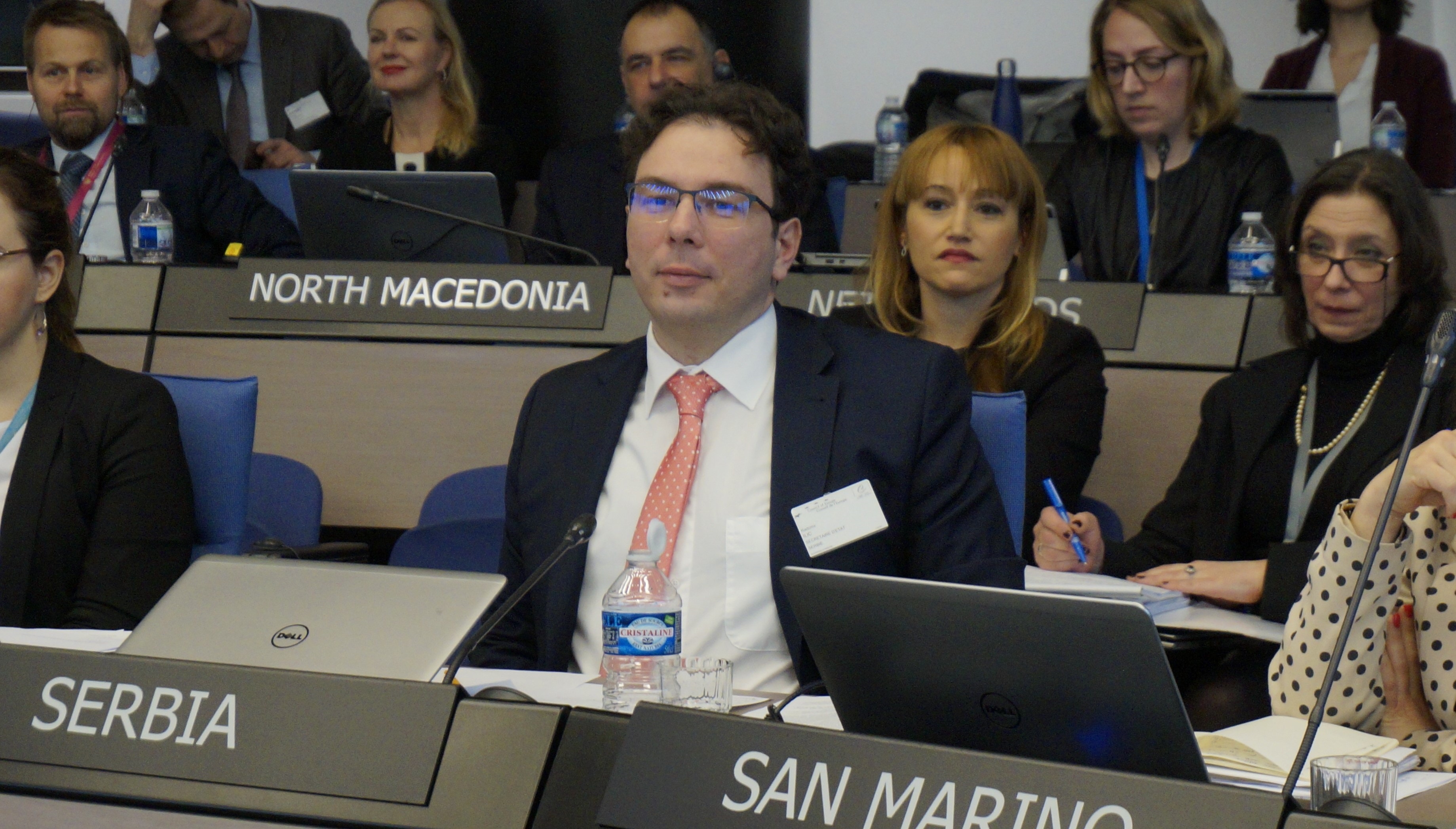 |
|
|
| RECEPTION ON THE OCCASION OF THE NATIONAL DAY OF THE REPUBLIC OF SERBIA |
|
On the occasion of the National Day of the Republic of Serbia, a reception was held at the Palace of Europe in Strasbourg. The reception was attended by around 200 guests, including members of the diplomatic and consular corps, as well as the highest officials of the Council of Europe Secretariat. Among the guests were Ms Marija Pejčinović Burić, Secretary General of the Council of Europe, Mr Rik Daems, President of the Parliamentary Assembly of the Council of Europe and Mr Linos-Alexandre Sicilianos, President of the European Court of Human Rights.
Ambassador Aleksandra Đurović addressed the guests with welcome words, explaining the historical background and the events that the Statehood Day of the Republic of Serbia commemorates. Ambassador notably focused on the first Serbian Constitution, adopted in 1835, as one of the most progressive and liberal Constitutions of that time, as well as one of the first ones of that kind in whole Europe. Ms Đurović also emphasized that through the cooperation with the Council of Europe Serbia promotes the same values as in the time of the adoption of its first Constitution - democracy, rule of law and human rights.
The audience was also addressed by Ms Marija Pejčinović Burić, who noted the importance of the Republic of Serbia's membership in the Council of Europe, as well as the numerous conventions of the Council of Europe that the Republic of Serbia has acceded to.
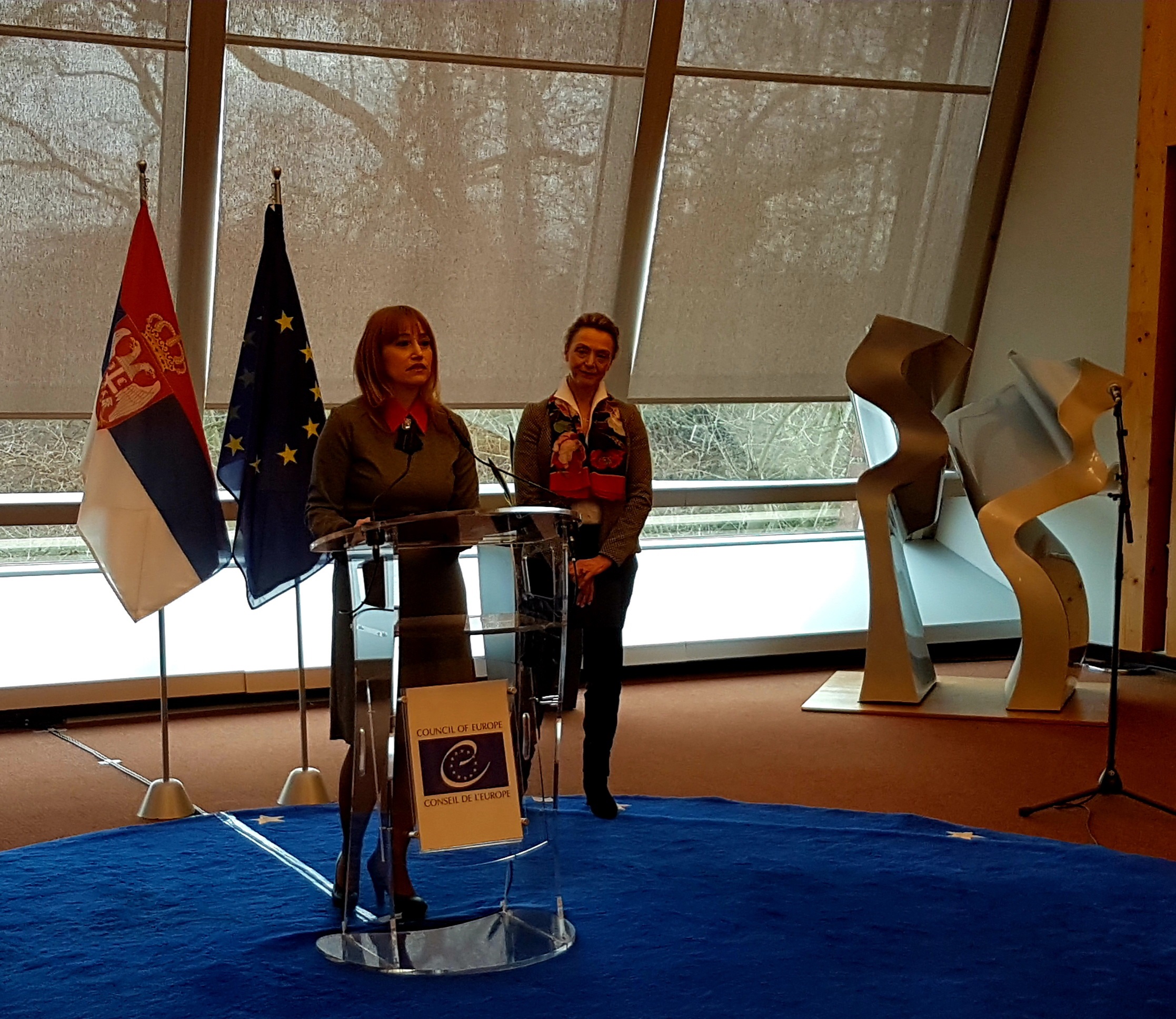
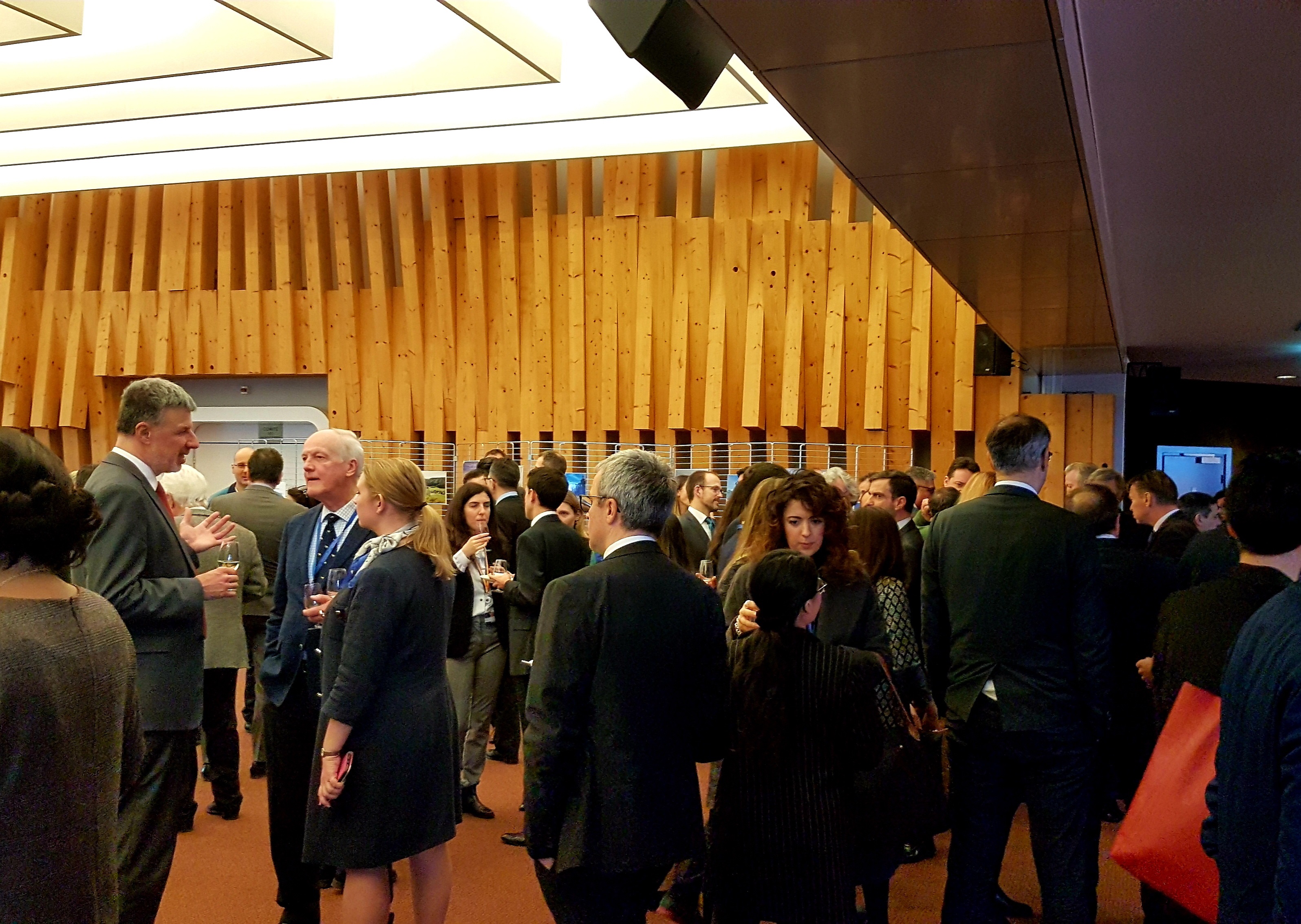
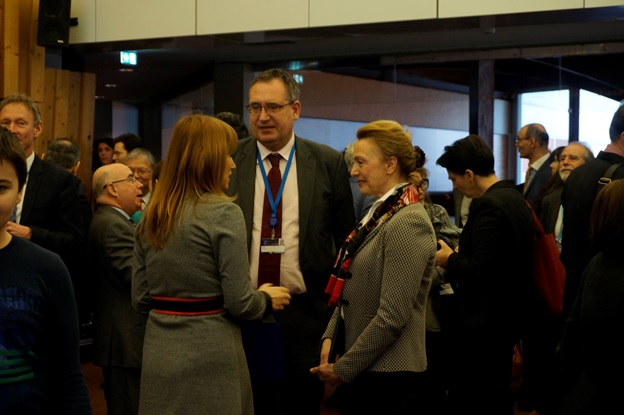
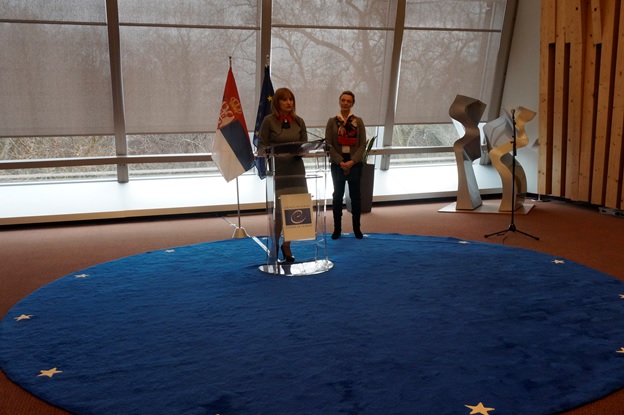
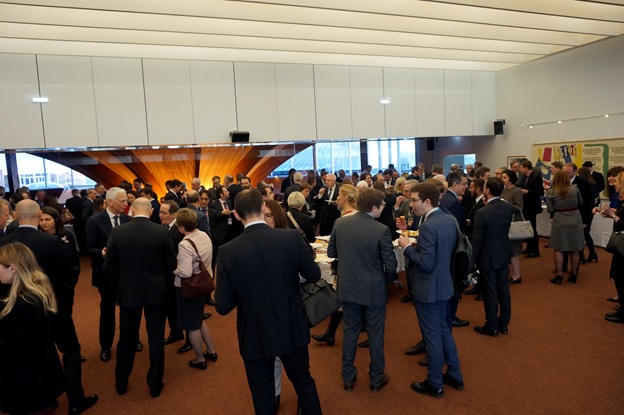
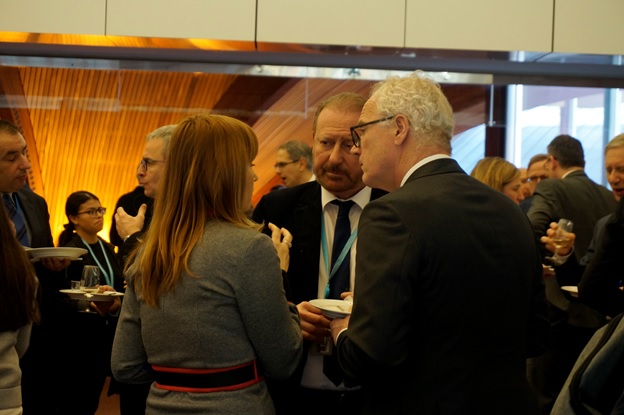
|
|
|
| AMBASSADOR DJUROVIC SIGNED PROTOCOL AMENDING THE CONVENTION FOR THE PROTECTION OF INDIVIDUALS WITH REGARD TO AUTOMATIC PROCESSING OF PERSONAL DATA |
|
Ambassador Aleksandra Djurovic, in the presence of Gabriella Bataini Dragoni, Deputy Secretary General of the Council of Europe, signed the Protocol amending the Convention for the Protection of Individuals with regard to Automatic Processing of Personal Data, adopted in Strasbourg, on the 10th of October 2018.
The Protocol was signed at the Palace of Europe in Strasbourg, on the 22nd of November 2019. So far, 36 States have signed the Protocol, including the Republic of Serbia.
The aim of the Protocol of amendment is to modernise and improve the Convention, taking into account the new challenges to the protection of individuals with regard to the processing of personal data, which have emerged since the Convention was adopted in 1980.
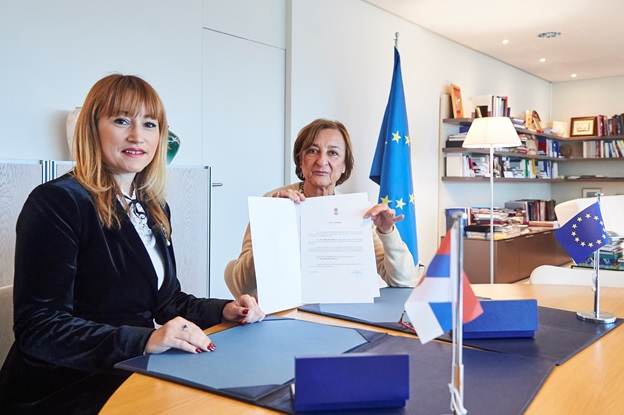
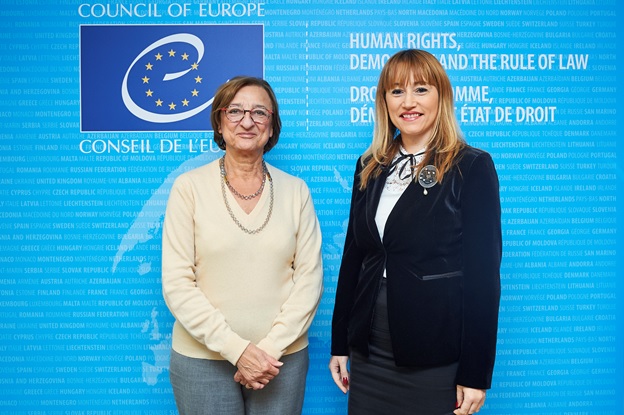
|
|
|
| Informal reception at the Permanent Mission of the Republic of Serbia to the Council of Europe for the participants at the 8th World Forum for Democracy from Serbia |
|
Тhe Permanent Mission of Serbia to the Council of Europe organized an informal reception for the participants at the 8th World Forum for Democracy from “Belgrade Fund for Political Excellence”, on the 6th of November 2019.
Welcoming the guests, Ambassador Aleksandra Djurovic expressed her pleasure that participants from Serbia are present at the 8th World Forum for Democracy. She also stressed the importance of participation from Serbia to different meetings organized by the Council of Europe. This was the opportunity for the guests to hear from the Ambassador about the work of the Permanent Mission of Serbia, as well as the functioning of the Council of Europe, confronted with many challenges while dealing with promotion of human rights, democracy and rule of law.
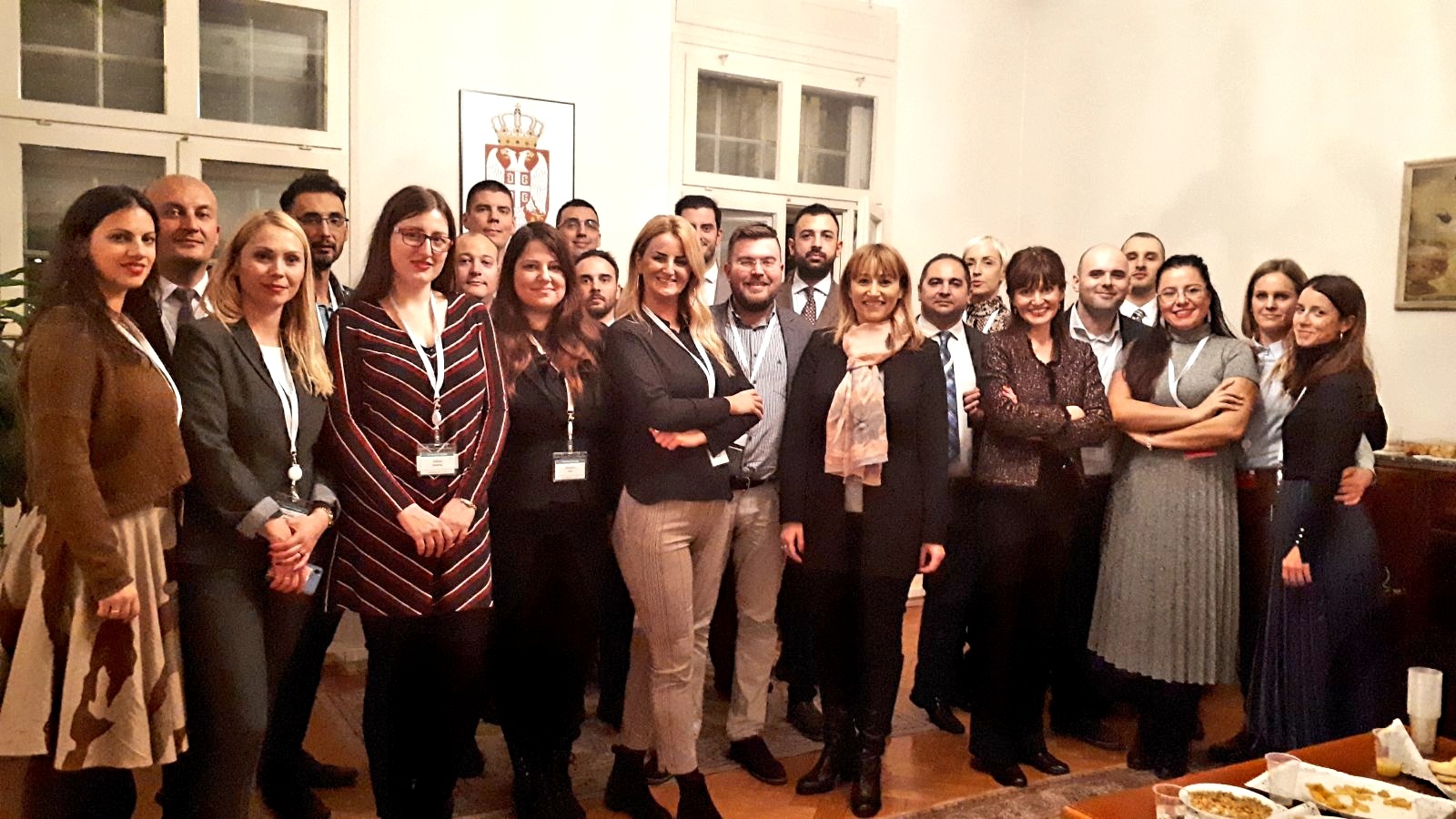
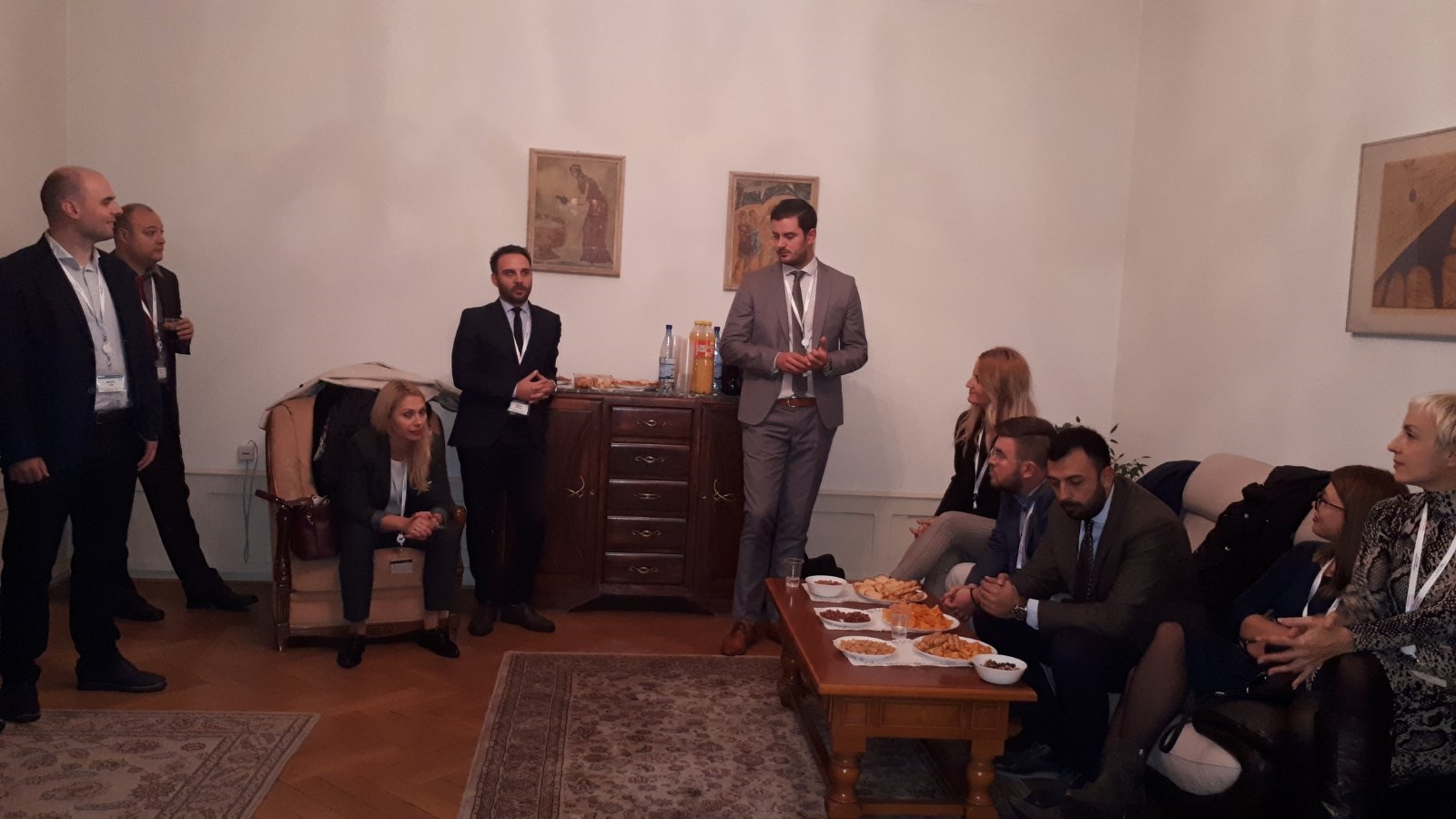
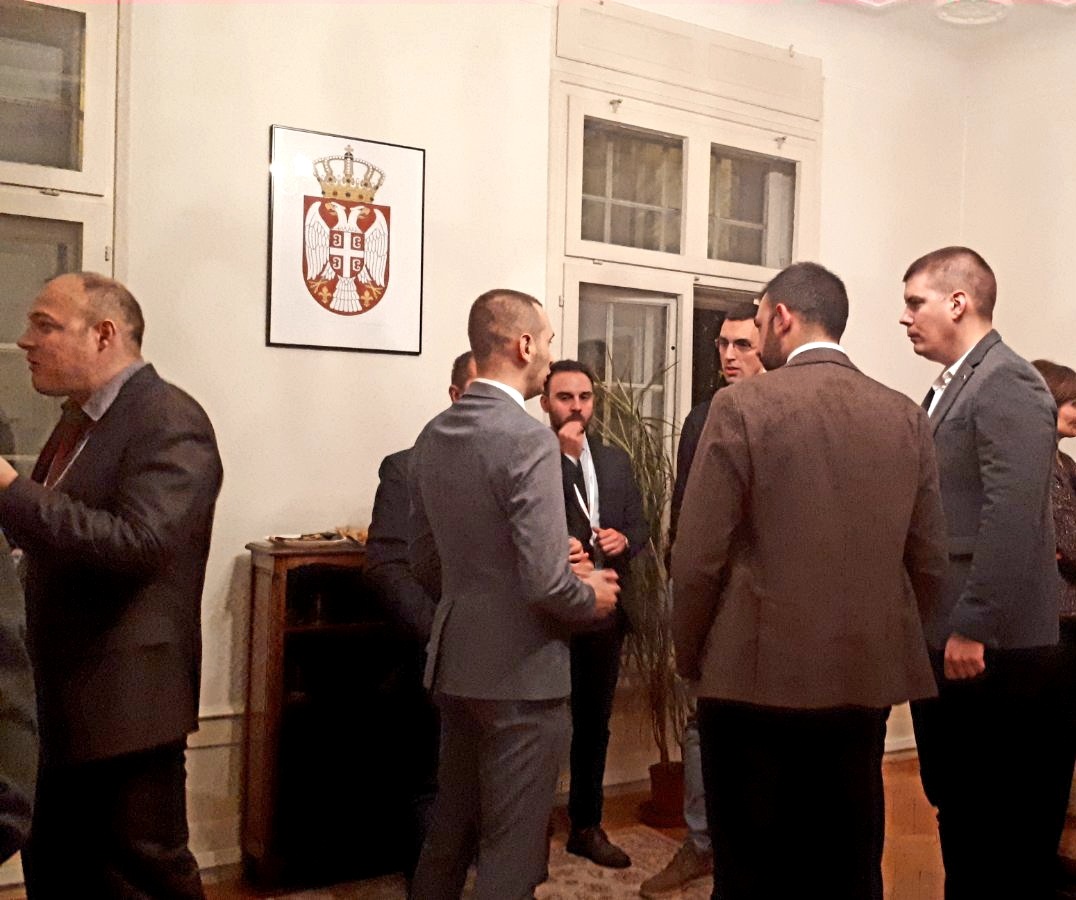
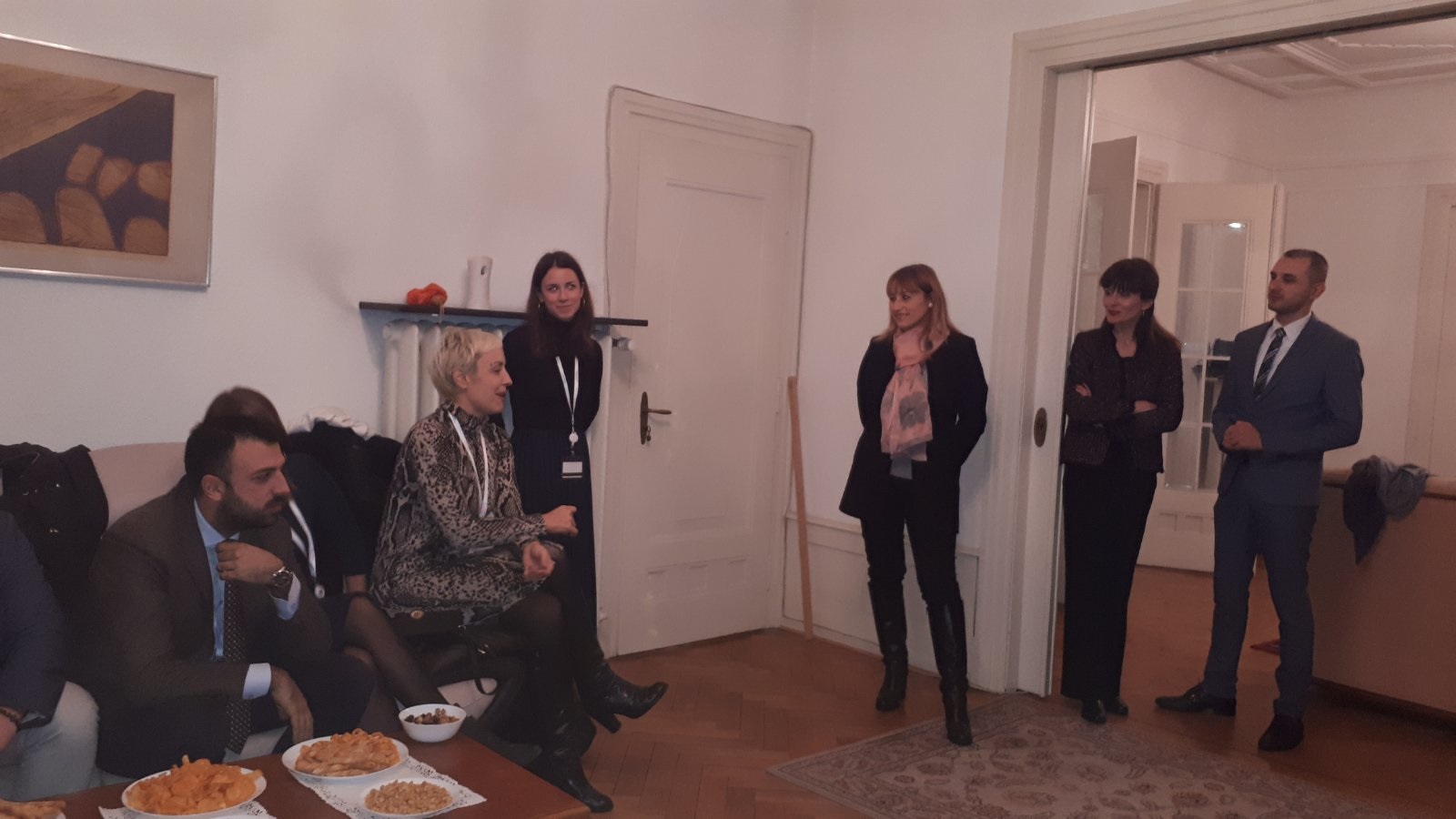 |
|
|
| AMBASSADOR DJUROVIC SIGNED THE COUNCIL OF EUROPE CONVENTION ON THE COUNTERFEITING OF MEDICAL PRODUCTS AND SIMILAR CRIMES INVOLVING THREATS TO PUBLIC HEALTH |
|
Ambassador Alexandra Djurovic, in the presence of Gabriella Bataini-Dragoni, Deputy Secretary General of the Council of Europe, signed the Council of Europe Convention on counterfeiting of medical products and similar crimes involving threats to public health, adopted in Moscow, on the 28th of October 2011, commonly known as Medicrime Convention.
The Convention was signed at the Palace of Europe in Strasbourg, on the 2nd of September 2019, as a part of the “Treaty week” ceremony, organized as a celebration of the 70th anniversary of the founding of the Council of Europe. So far, 32 States have signed the Convention, including the Republic of Serbia, with 16 States having already completed the ratification procedure.
The aim of the Convention is to reduce the risk to human health by establishing a legal framework for cooperation around the world in the fight against counterfeiting of medical products and similar crimes.
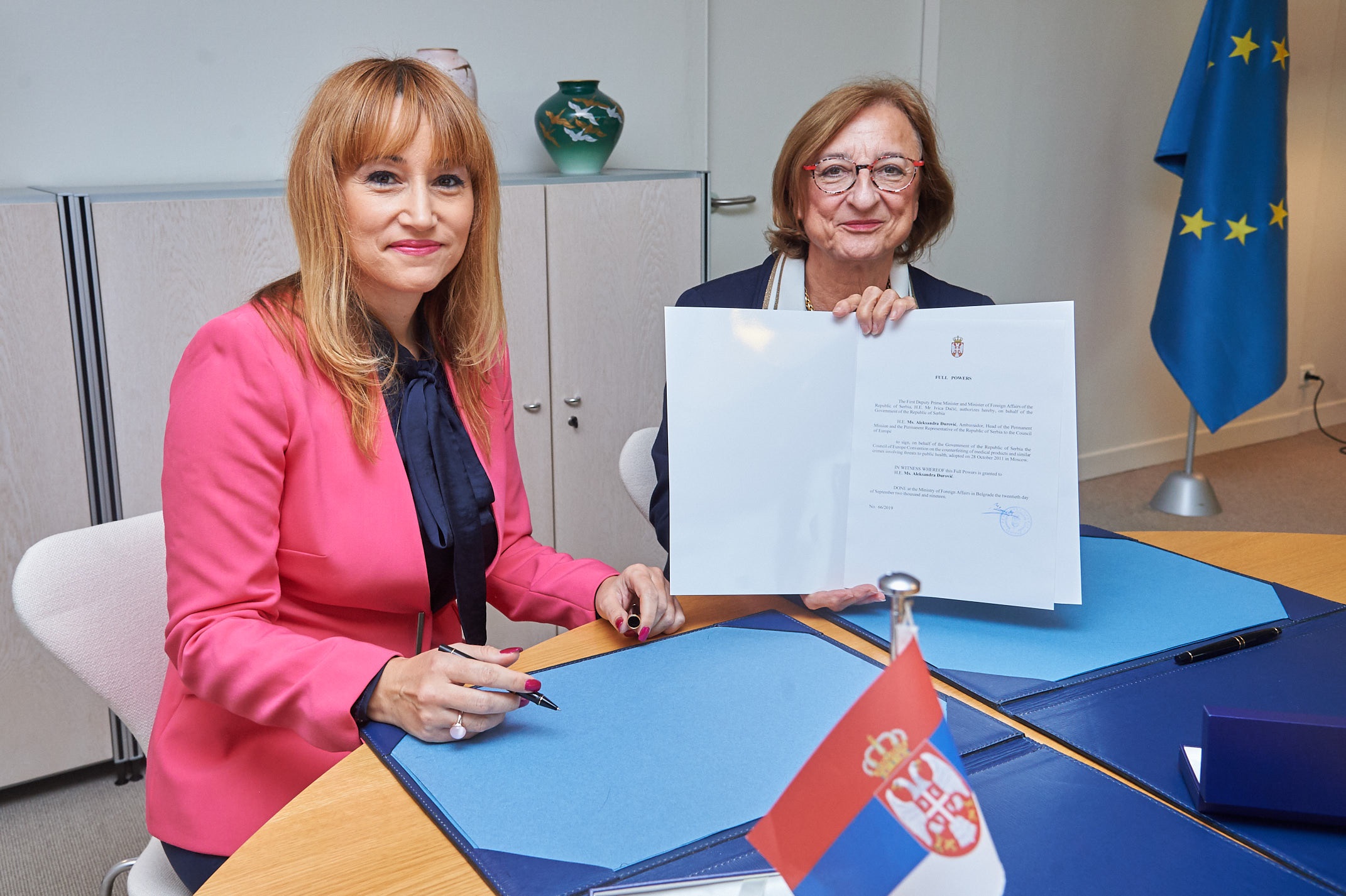
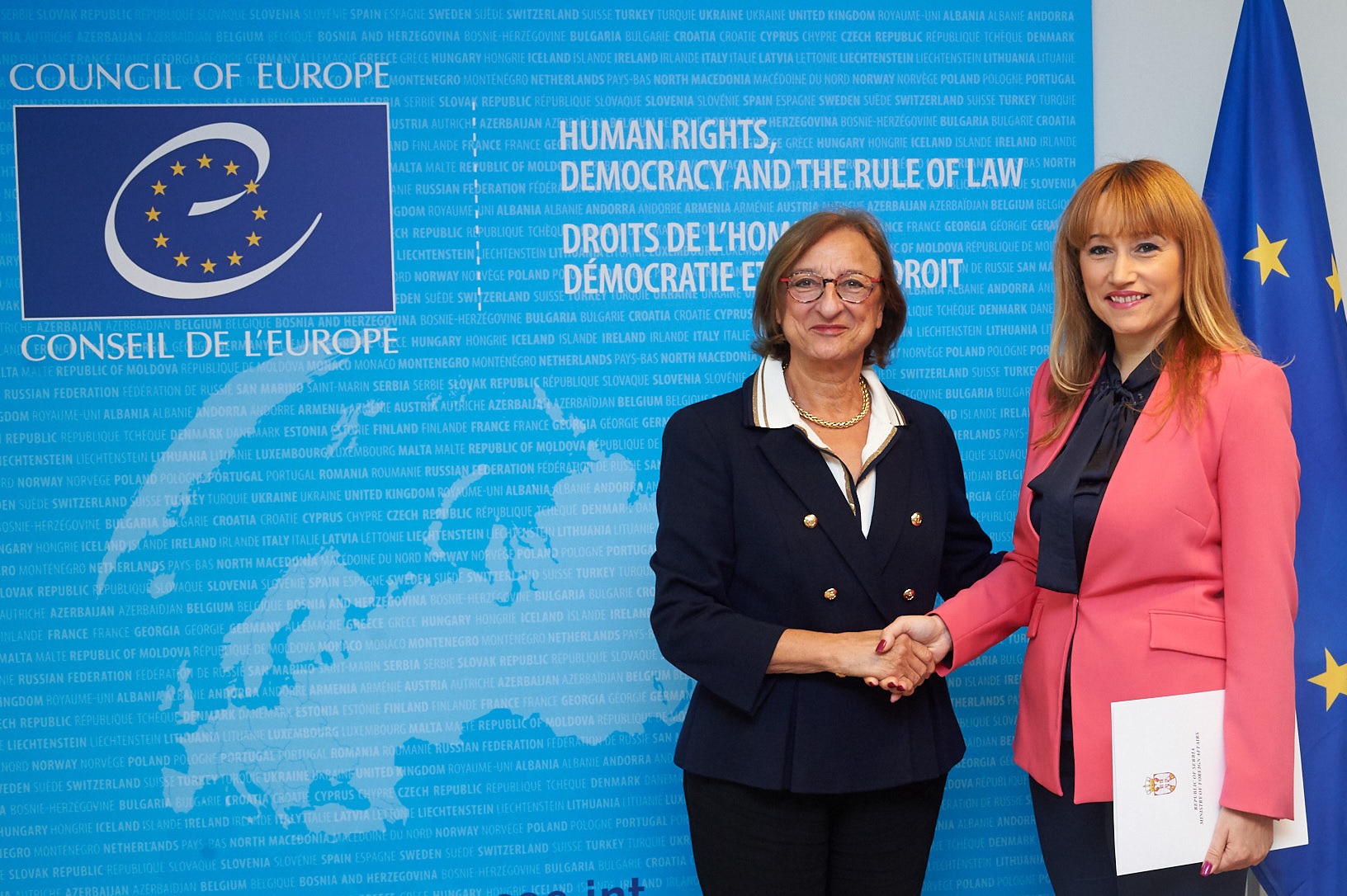
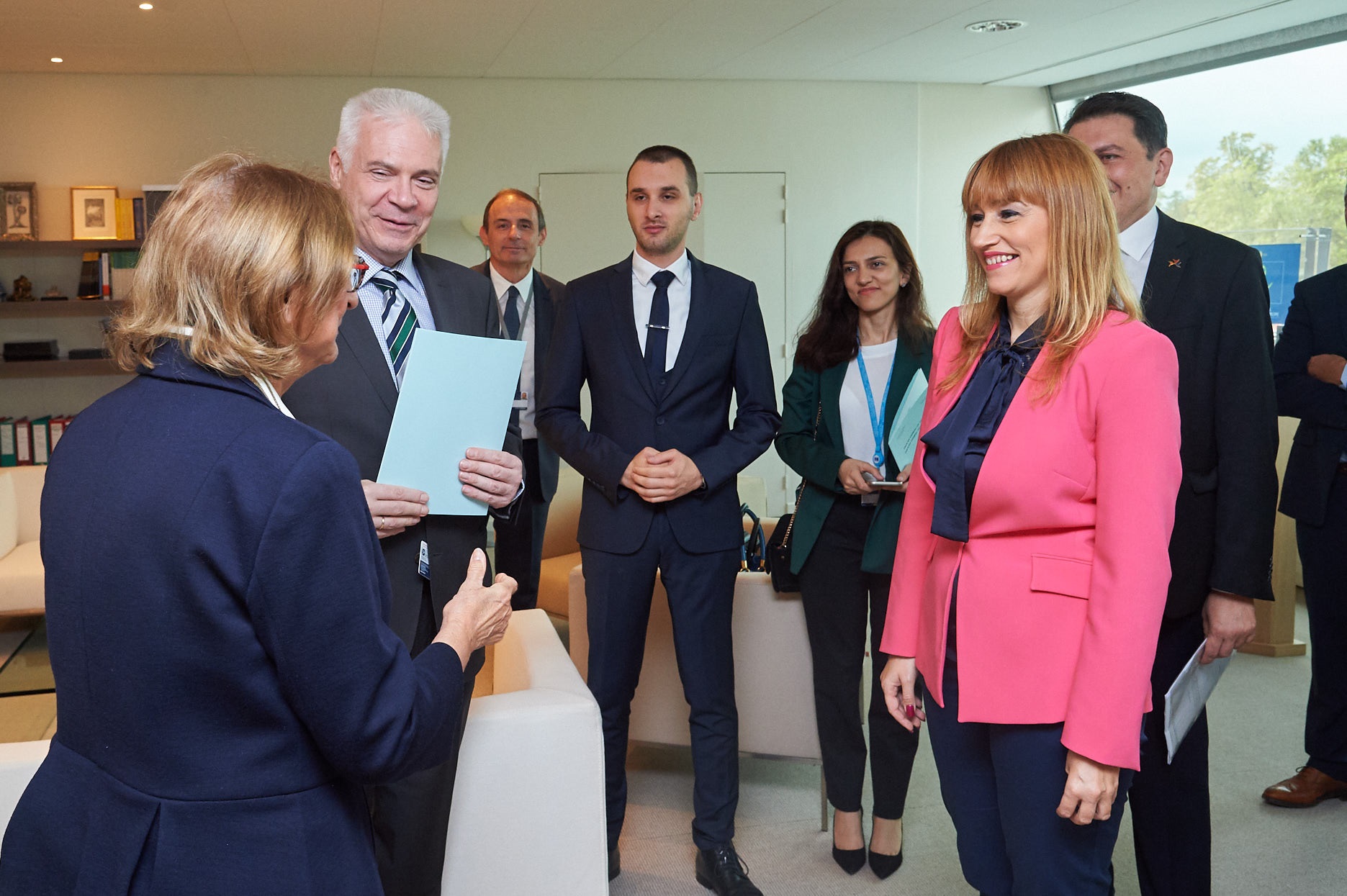
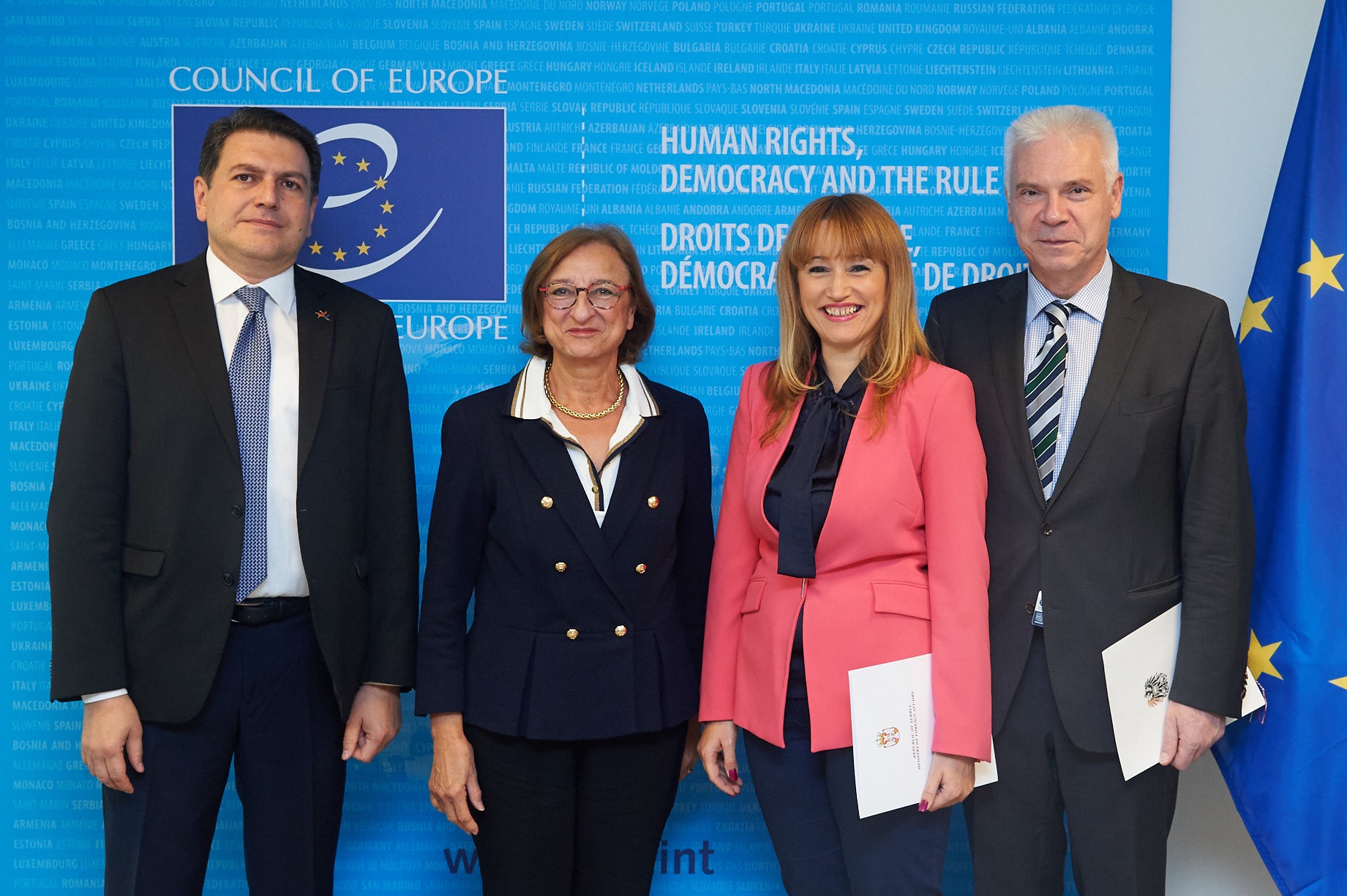 |
|
|
| State Secretary in the Ministry of Foreign Affairs Nemanja Stevanović participated to the 129th Session of the Committee of Ministers in Helsinki |
|
State Secretary in the Ministry of Foreign Affairs Nemanja Stevanović participated to the 129th Session of the Committee of Ministers in Helsinki, from 16 to 17 May 2019. More than thirty ministers of foreign affairs attended the Session, as well.
During the Ministerial Session, the European countries marked 70th anniversary of the Council of Europe, the organization founded to promote democracy, human rights and rule of law. In that context, the ministers adopted the Declaration whose goal is to help resolving the current CoE crisis.
In his statement, State Secretary Nemanja Stevanović was talking about the importance that Serbia attaches to the Council of Europe and its three pillars. He highlighted the improvement that Serbia had made and underlined Serbia’s preparedness to continue its successful cooperation with CoE. He informed the Committee of Ministers on the efforts that the President of the Republic of Serbia Aleksandar Vučić is putting to maintain good relations with neighbours in the region. Consequently, these efforts produced positive results. Nevertheless, he stated that the dialogue with Priština is jeopardized because Priština undermines it and lacks truthful readiness for dialogue and cooperation.
Finland transferred the six month presidency of the Committee of Ministers of the CoE to France.
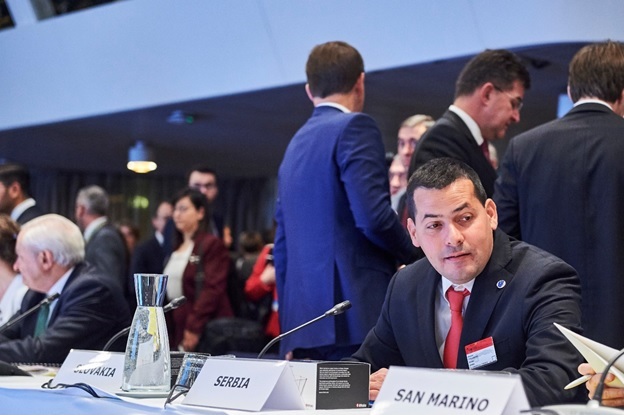
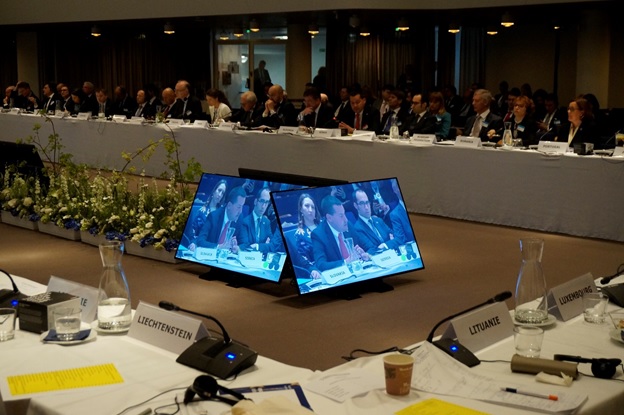
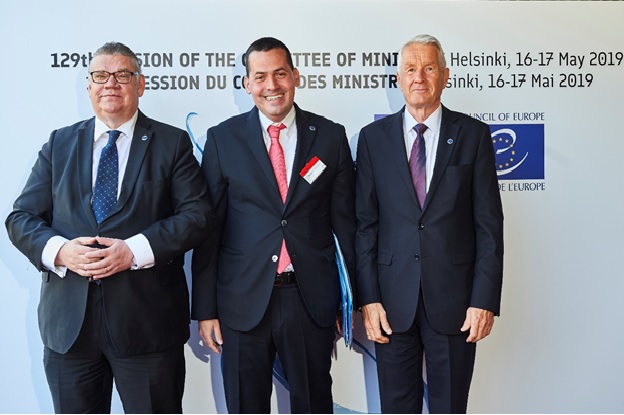
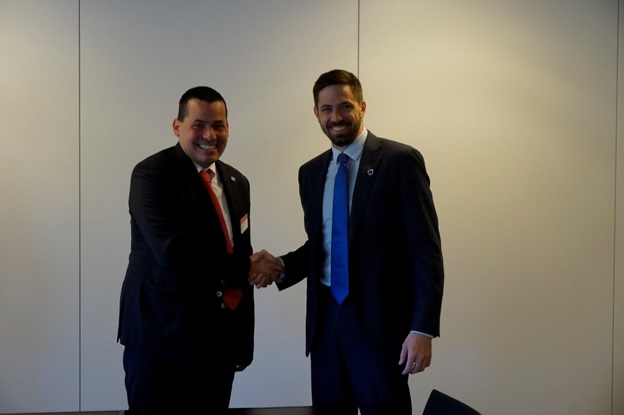
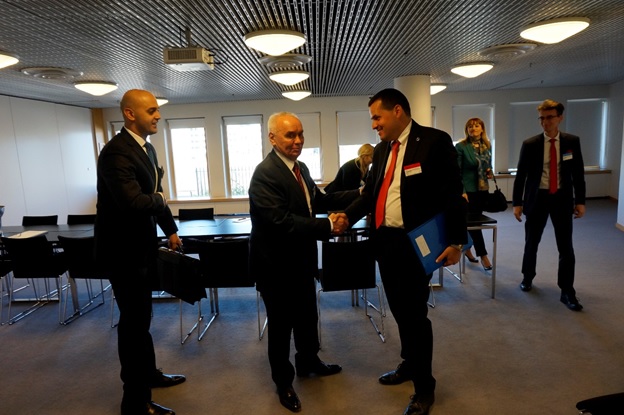
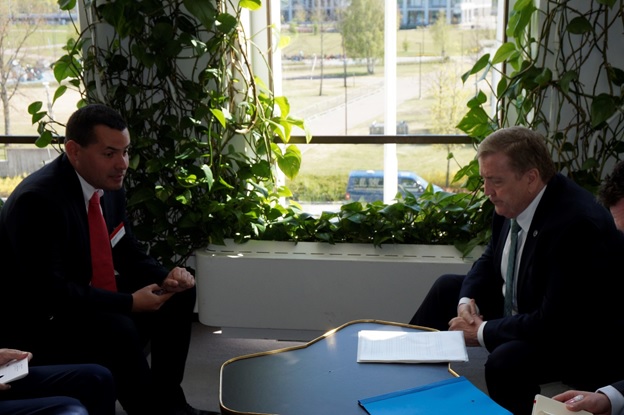 |
|
|
| Serbia marked the Europe Day and 70th anniversary of the Council of Europe |
|
The Permanent Mission of the Republic of Serbia to the Council of Europe, together with other permanent missions to the Council of Europe, participated to the Europe Day and 70th anniversary of the Council of Europe festivities in Strasbourg, on 4 and 5 May 2019.
Firstly, the association “Jedinstvo” from Strasbourg opened the ceremony with the performance of traditional folklore dances “Šumadija“ and “Bunjevka“. Then, many citizens of Strasbourg and Alsace region were been provided information about historical, religious and cultural heritage of Serbia. They had, as well, the opportunity to taste some traditional Serbian food, wine and rakija. The exibition stand of Serbia hosted more than seven hundred visitors, colleagues and friends, among whom was the Deputy Mayor of Strasbourg Ms. Nawel Rafik-Elmrini.
La Serbie a participé à la Fête de l’Europe et le 70ème anniversaire du Conseil de l’Europe
La Mission permanente de la République de Serbie auprès du Conseil de l’Europe, ensemble avec les autres missions permanentes auprès du Conseil de l’Europe, a pris part aux festivités qui ont marqué la Fête de l’Europe et le 70ème anniversaire du Conseil de l’Europe.
Tout d’abord, l’association « Jedinstvo » de Strasbourg a fait l’ouverture de la cérémonie avec les danses folkloriques traditionnelles « Šumadija » et « Bunjevka ». De suite, les nombreux citoyens de Strasbourg et de la région d’Alsace ont été renseignés sur l’héritage historique, religieux et culturel de la Serbie. Egalement, ils ont eu l’occasion de goûter de la nourriture traditionnelle serbe, du vin et de la rakija. La table d’exposition de Serbie a accueilli plus que sept cents visiteurs, collègues et amis, parmi lesquels était le maire adjoint de la Ville de Strasbourg Madame Nawel Rafik-Elmrini.
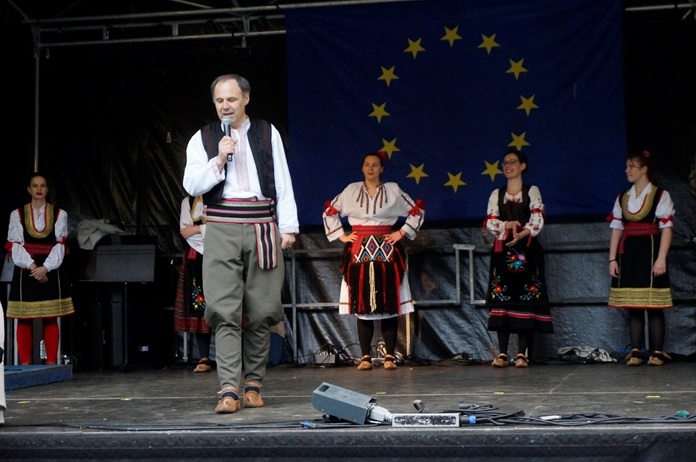
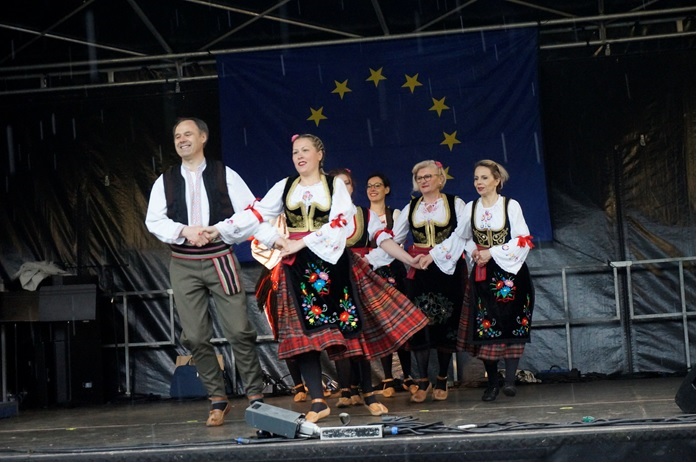
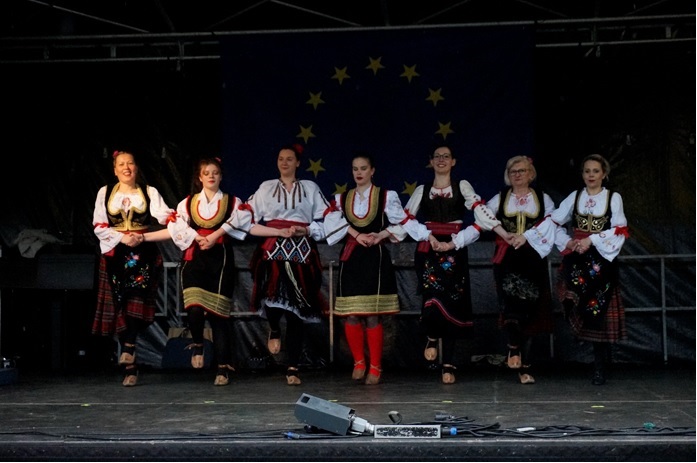
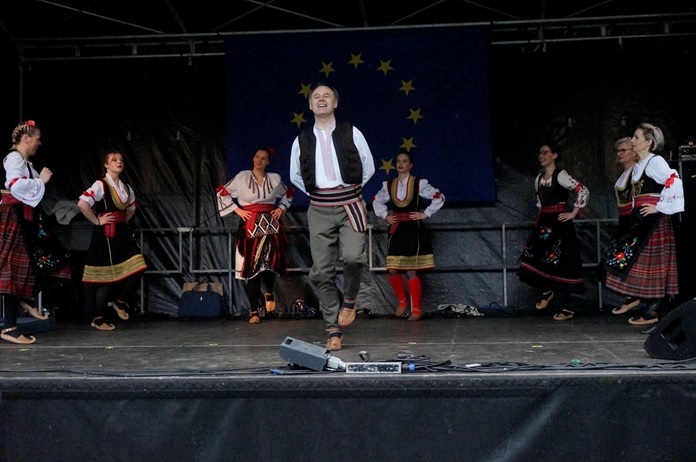
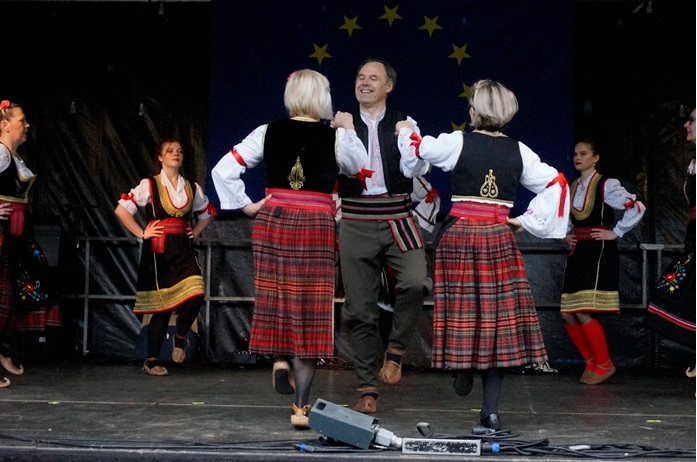
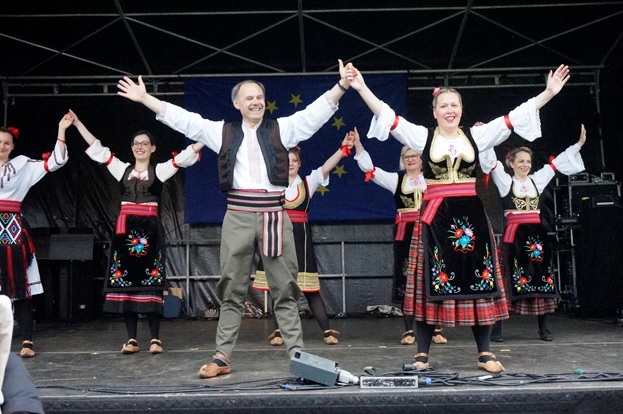
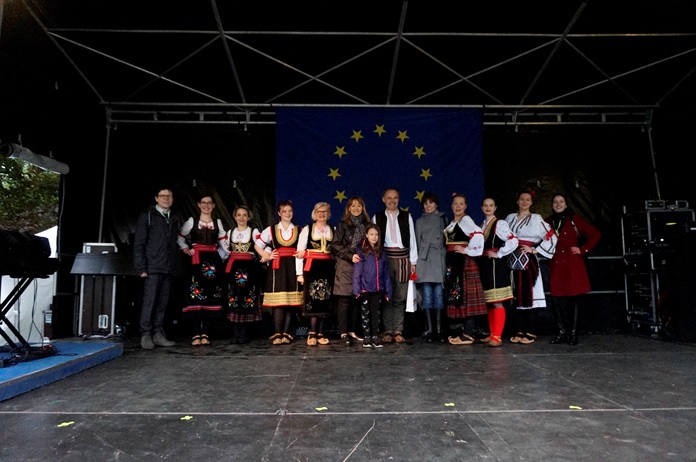
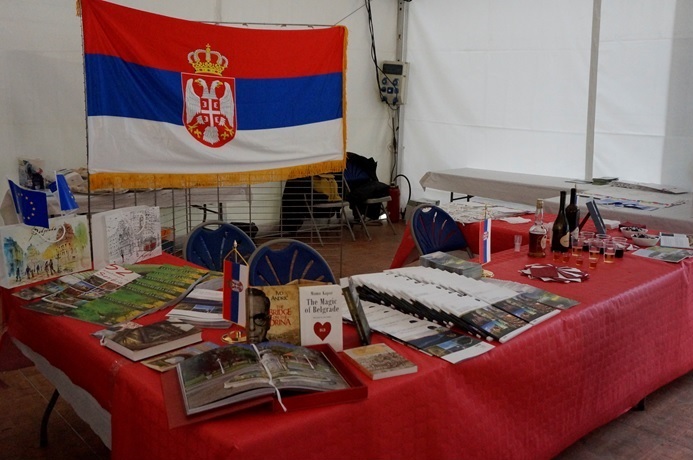
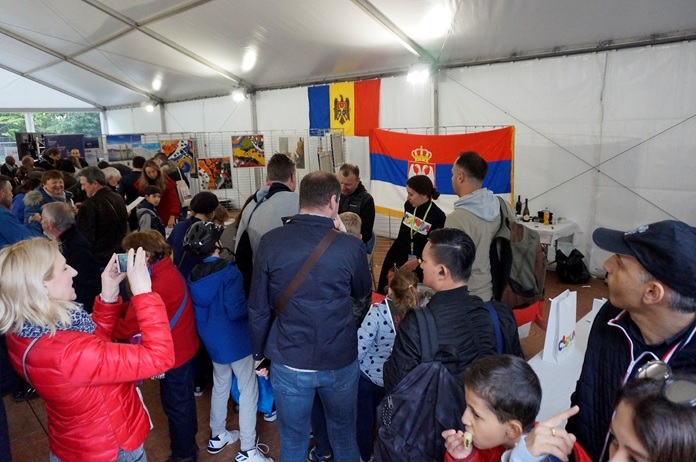
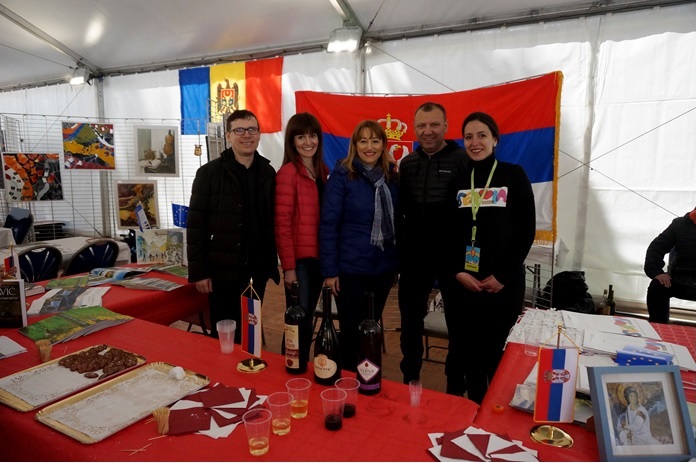
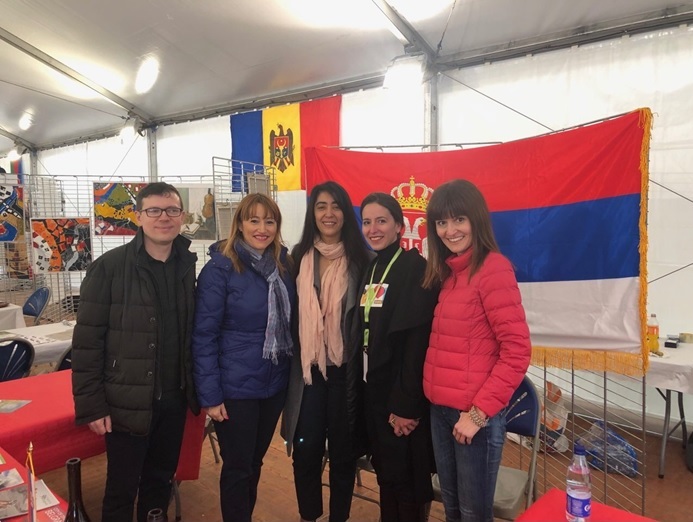
|
|
|
| Reelection of the candidate of Serbia to GREVIO |
|
Ten new members of the Group of Experts on Action Against Violence against Women and Domestic Violence (GREVIO) were elected at 7th meeting of the Committee of the Parties to the Council of Europe Convention on Preventing and Combating Violence against Women and Domestic Violence, held on 1-2 April 2019. Among them was the candidate of the Republic of Serbia, Ms. Biljana Branković, who was reelected.
Ms. Biljana Branković is a renowed expert for the fight against violence against women and domestic violence and she has conducted several researches in this field. During more than twenty years of professional experience in this area, Ms. Biljana Branković has significantly contributed to the enhancement of the position of women, both at national and international level.
Bearing in mind the importance that Serbia attaches to the implementation of the Istanbul Convention, it is a pleasure to note that the expert from Serbia was elected for the second time to GREVIO.
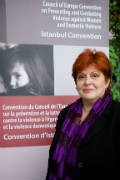 |
|
|
| Students of the Faculty of Law in Nis visited European institutions in Strasbourg |
|
Ninety-five students of the Faculty of Law in Nis participated to a study visit to the European institutions, based in Strasbourg, from 1 to 2 April 2019. With the assistance of the Permanent Mission of the Republic of Serbia to the Council of Europe, they had the opportunity to visit the Council of Europe and the European Parliament. During their visit to the Palace of Europe, two presentations were given on the role and mandate of the Council of Europe. Also, they were briefed on current challenges such as the election of a new Secretary-General, financial crisis resolution, but as well on the importance of the organization when dealing with the protection of personal data, fighting against violence against women, fight against hate speech etc. The students visited separately the European Court of Human Rights.
During their visit to the European parliament, the students had the opportunity to hear about the work of one of the principal institutions of the European Union, particularly with regard to the forthcoming elections, to be held in May 2019.
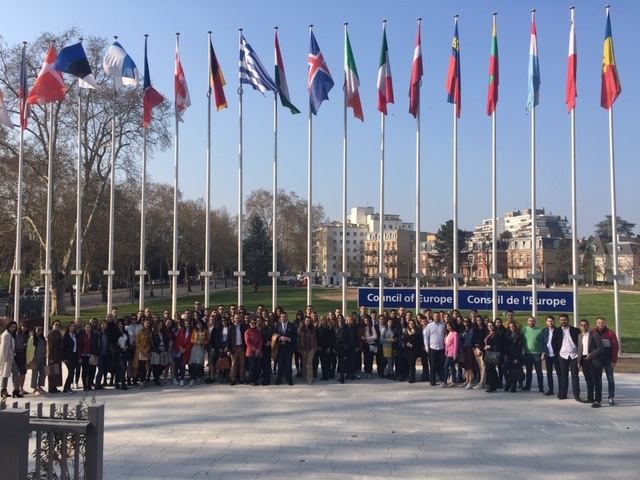
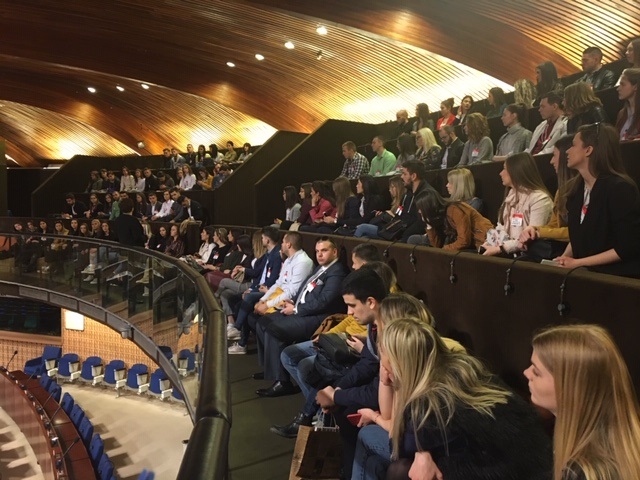
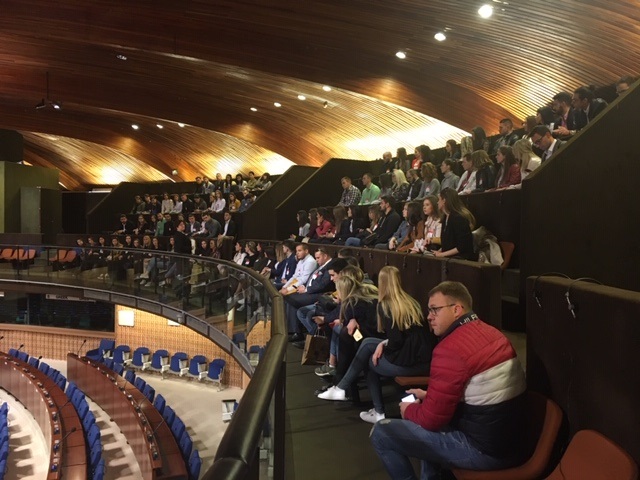
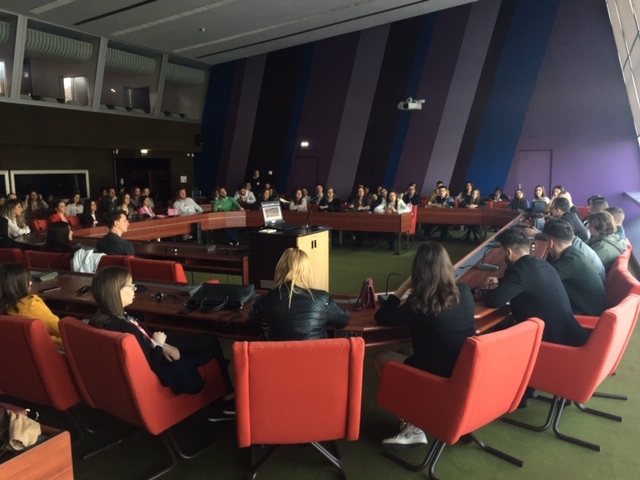
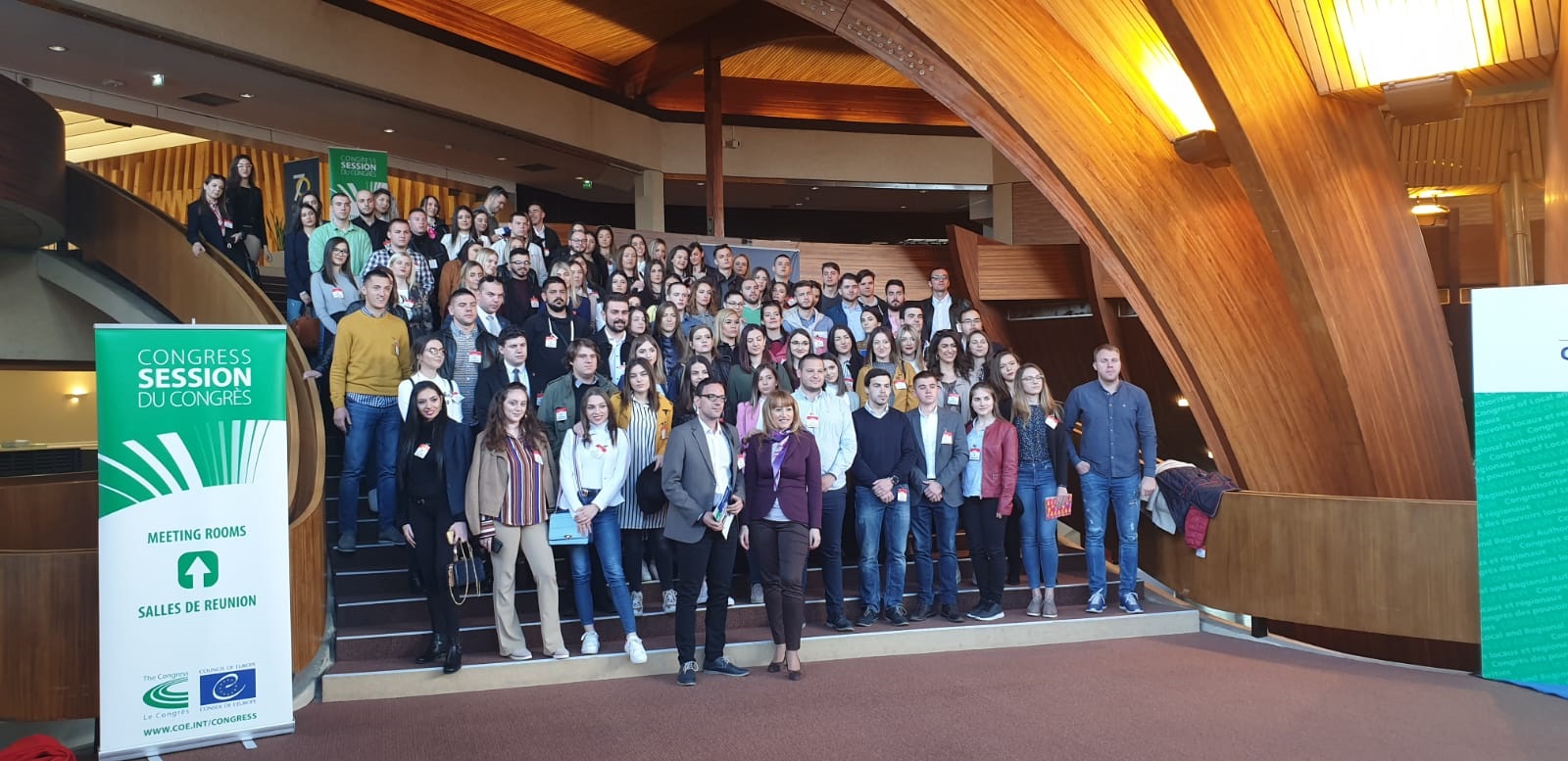 |
|
|
| Presentation of the candidate of the Republic of Serbia for the re-election to the Group of Experts on Action against Violence against Women and Domestic Violence (GREVIO) |
|
With regard to the forthcoming elections for new members of the Group of Experts on Action against Violence against Women and Domestic Violence (GREVIO), during the Meeting of the Committee of Parties to the Council of Europe Convention on Preventing and Combating Violence against Women and Domestic Violence (Istanbul Convention), to be held on 1-2 April 2019, the Permanent Mission of the Republic of Serbia organized the presentation of the candidate of Serbia for the re-election to this expert body, Ms. Biljana Brankovic, who has been its active member since 2015 - namely since its foundation.
At the very beginning, Ambassador Djurovic explained to the guests from permanent missions in Strasbourg about the importance that Serbia attaches to the fight against violence against women and domestic violence, also by reminding that Serbia was among first ten countries to ratify the Istanbul Convention, which enabled its entering into force. Then, she expressed the satisfaction about Serbia`s opportunity to support, for the second time, the candidacy of Ms. Biljana Brankovic, whose professional experience in this field had been recognized both at national and international level.
Ms. Biljana Brankovic presented in details the various aspects of her previous researches and her work conducted in the field of implementation of the Istanbul Convention in Serbia and other countries. Moreover, she shared the experience concerning her work within the GREVIO, including many challenges that the Group of Experts and State Parties of the Convention were facing.
In the discussion which followed the presentation, the participants to the presentation were particularly interested to know more about the definition of physical and other forms of violence, reforms in national criminal codes, as well as about the implementation of good practices in the field of prevention of violence against women and domestic violence.
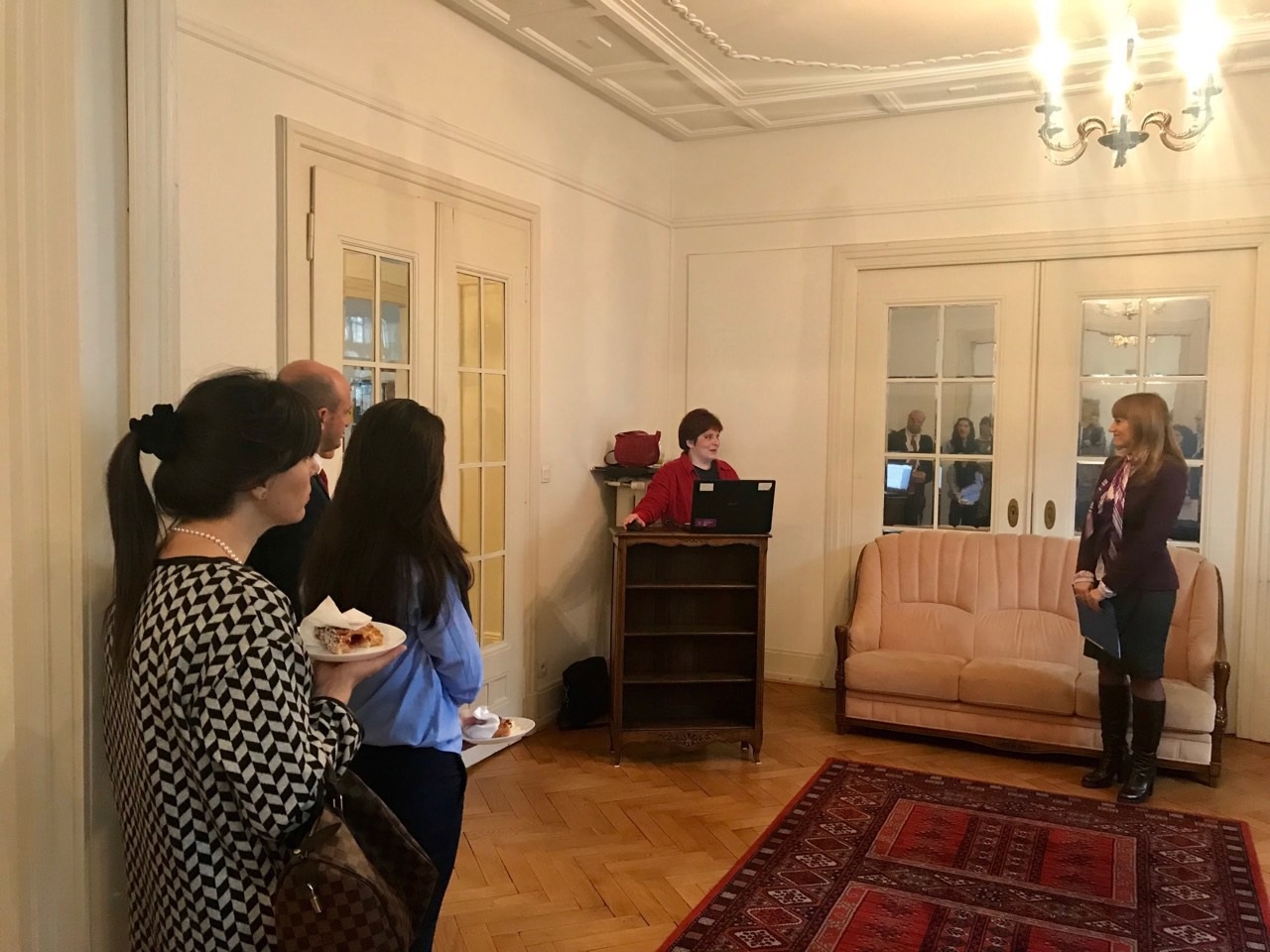
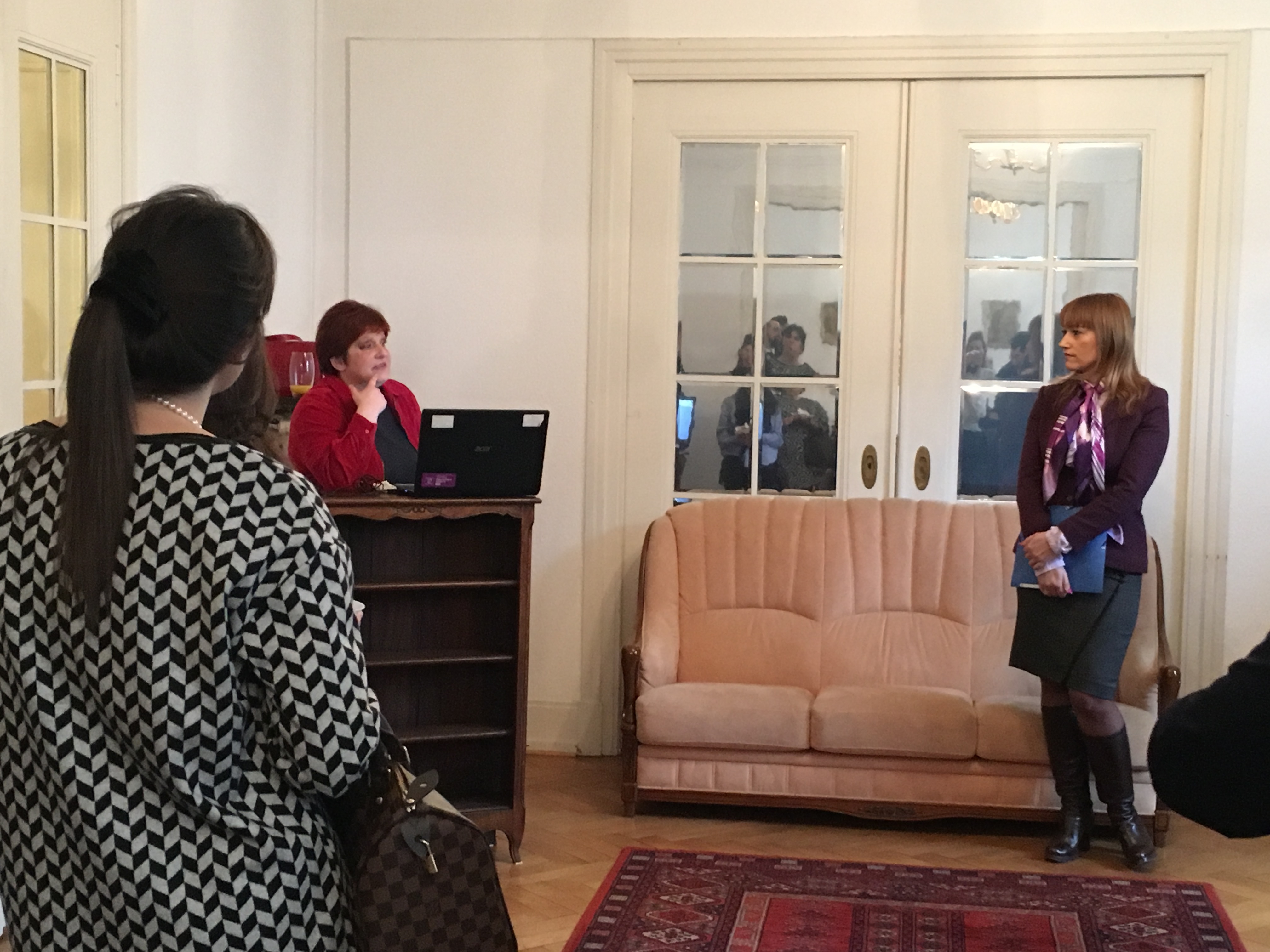
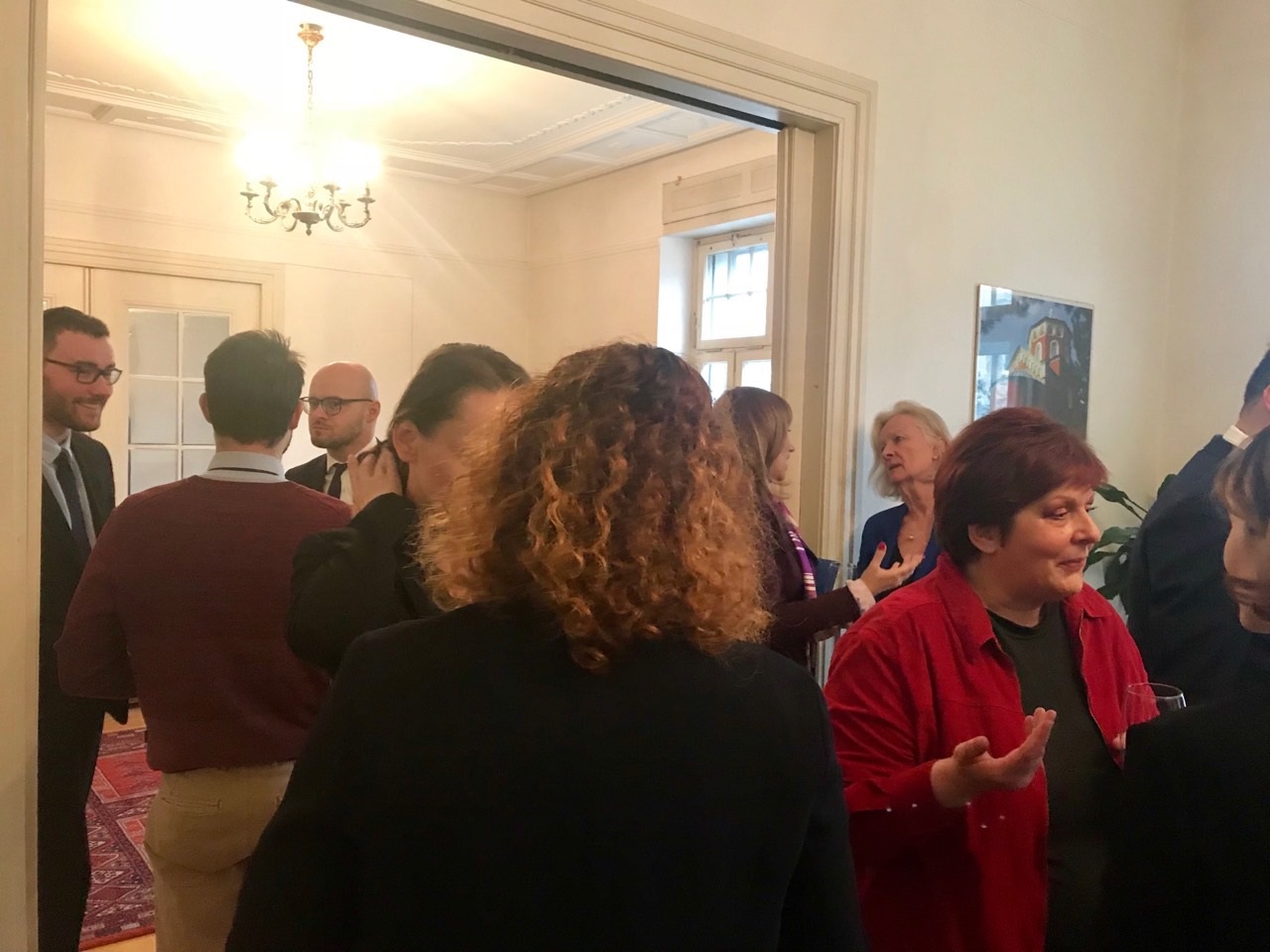
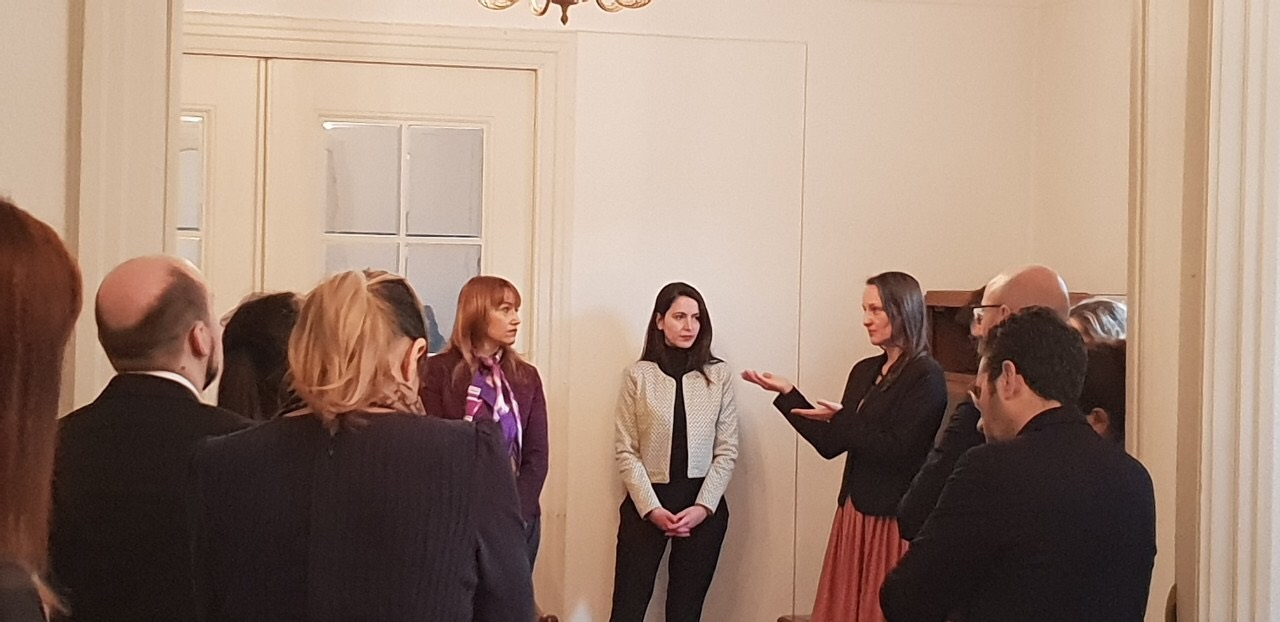
|
|
|
| Reception at the Permanent Mission of the Republic of Serbia to the Council of Europe for the participants to the 7th World Forum for Democracy from Serbia |
|
Like in previous years, the Permanent Mission of Serbia to the Council of Europe organized a reception for the participants to the 7th World Forum for Democracy from “Belgrade Fund for Political Excellence”, on 20 November 2018.
Ambassador Djurovic welcomed the guests to the Permanent Mission of Serbia in Strasbourg and expressed the satisfaction that also this year the participants from Serbia came to the World Forum for Democracy. She also stressed the importance of participation from Serbia to different organs and meetings organized by the Council of Europe. This was the opportunity for the guests to hear from the Ambassador about the work of the Permanent Mission of Serbia, as well as the functioning of the Council of Europe, confronted with many challenges while dealing with promotion of human rights, democracy and rule of law.
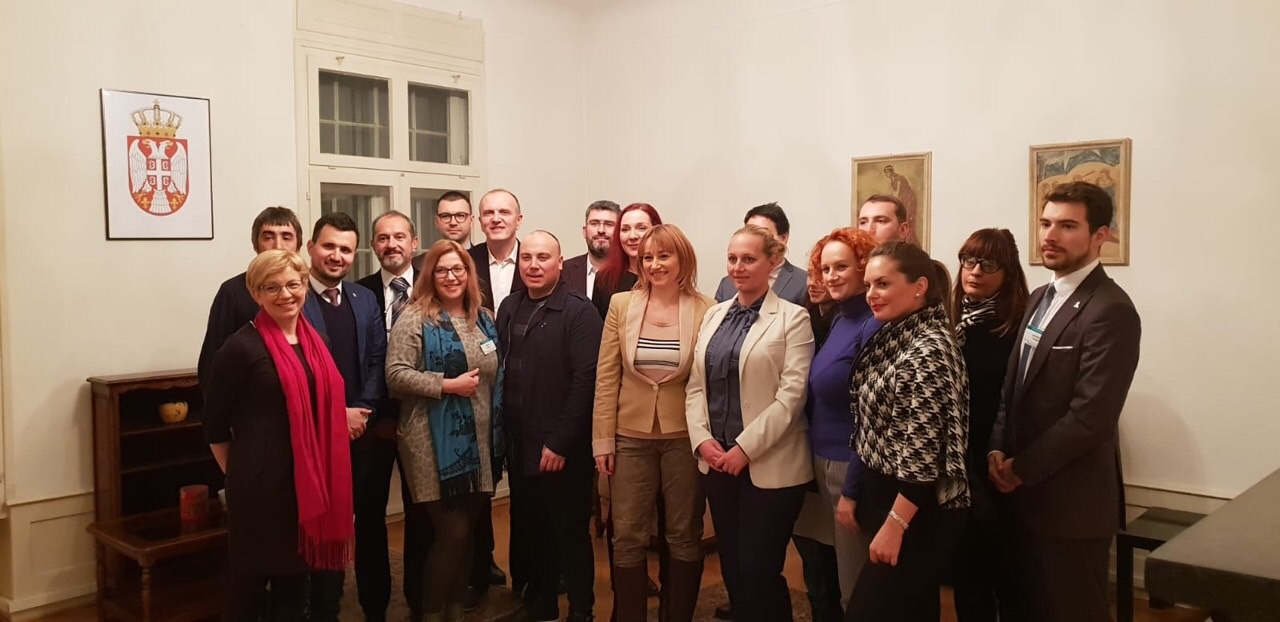 |
|
|
| Reception on the occasion of the 15th anniversary of the admission of the Republic of Serbia to the Council of Europe |
|
The Permanent Mission of the Republic of Serbia, in the presence of the First Deputy Prime Minister and Minister of Foreign Affairs Ivica Dacic, organized a reception on the occasion of the 15th anniversary of the admission of the Republic of Serbia to the Council of Europe, in the Palace of Europe, on 18 October 2018.
While addressing to the numerous guests, Minister Dacic explained that Serbia’s membership to the Council of Europe brought about significant changes in the country and that the citizens of Serbia had benefited the most from that and, above all, through their access to the European Court of Human Rights (ECHR). In this way, Serbian citizens were provided a better protection of their human rights and fundamental freedoms, while the rulings made by the ECHR had a bearing on the changes made to the legislation, judicial practice and the activities of relevant authorities. The progress in this respect is reflected in the fact that Serbia is no longer among the countries with the highest number of complaints before the Court.
Bearing in mind the progress made by Serbia with regard to the implementation of European standards, he expressed the expectations that the Parliamentary Assembly of the Council of Europe (PACE) would finally decide to close the regular monitoring procedure.
While affirming the strong commitment of Serbia to membership to the European Union, Minister Dacic said that Serbia would continue to implement reforms related to the human rights field, democracy and the rule of law. He thanked as well the Council of Europe for its valuable contribution and assistance in this regard.
Speaking about the institutional crisis within the Council of Europe meaning the lack of trust between two statutory organs - the Committee of Ministers and the Parliamentary Assembly, he supported the efforts of the Secretary-General to find a solution for the current crisis and expressed the Serbia`s readiness to responsibly take part into that process, together with other Member States. A prerequisite for that is respect of the Statute. Finally, he added that respect of the opinion of the Legal Service ensures legal certainty, which is at the heart of the rule of law.
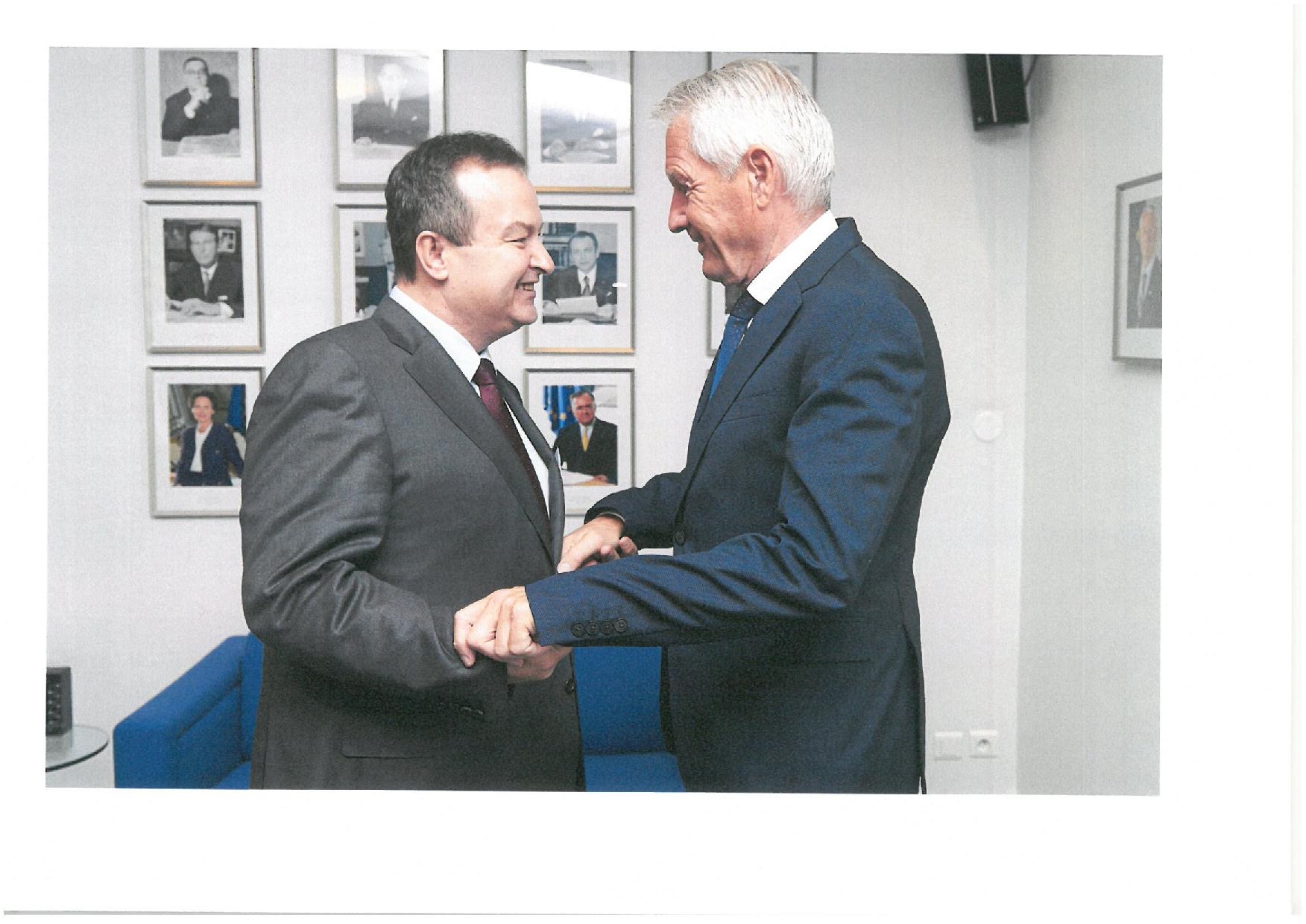
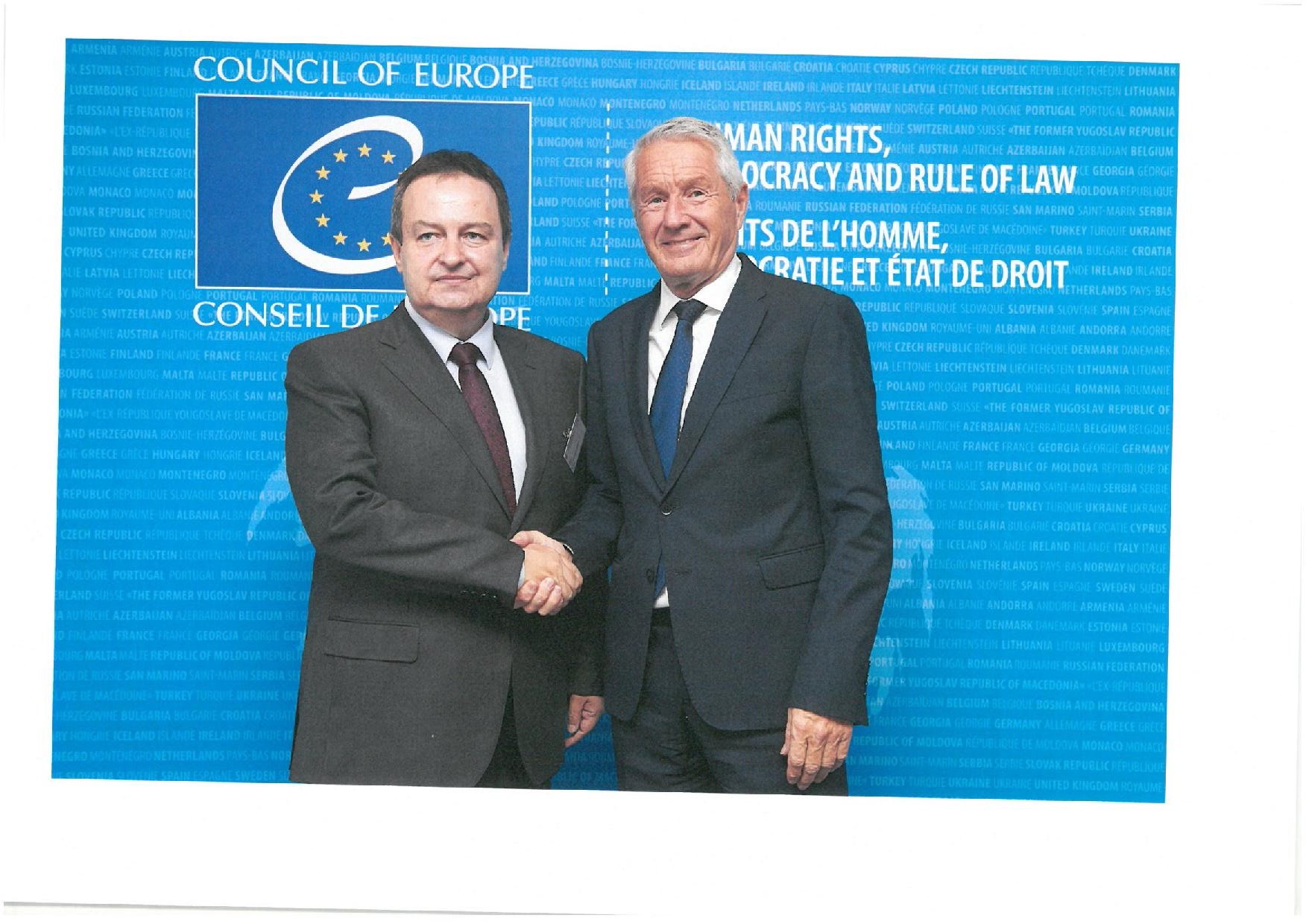
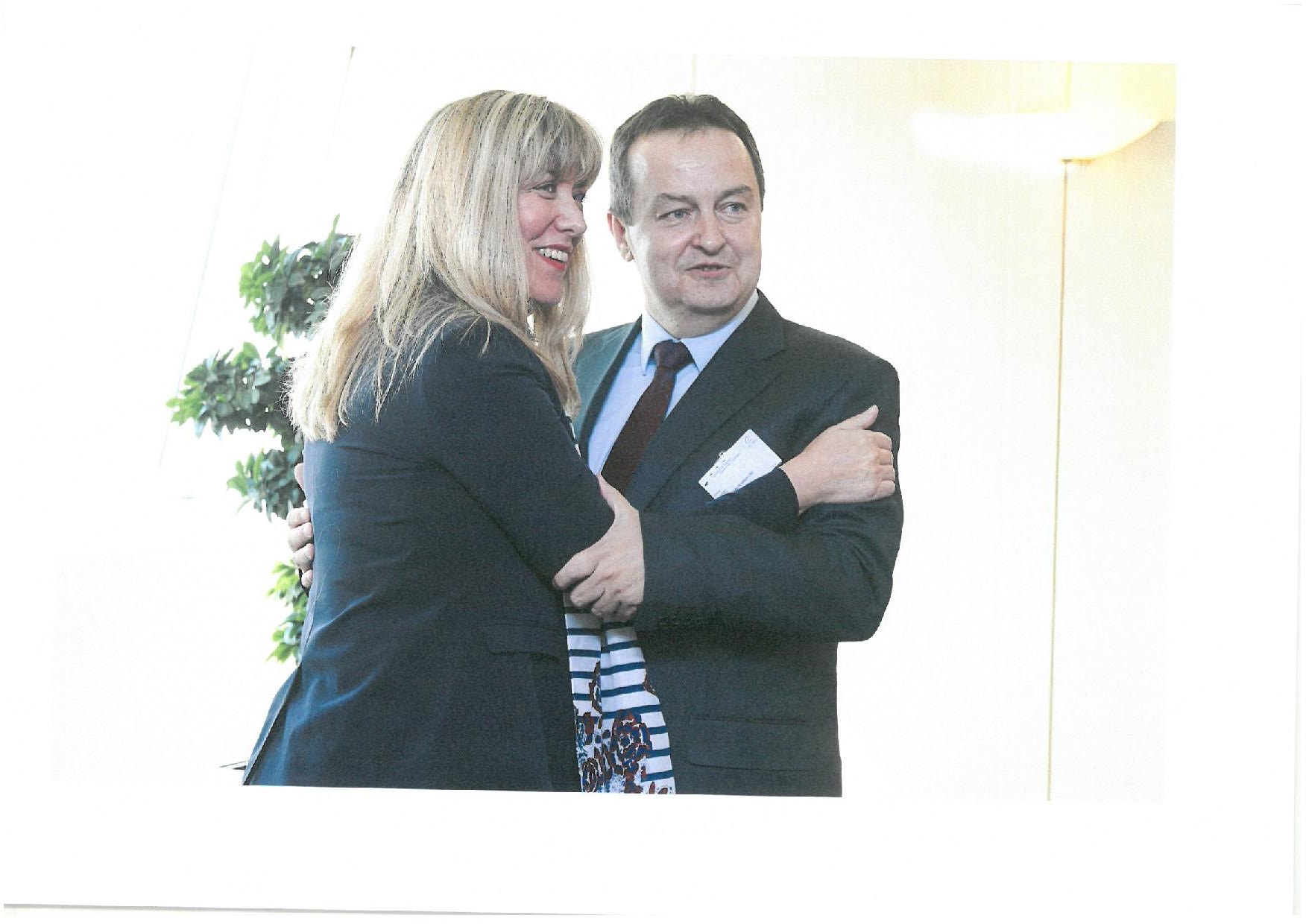
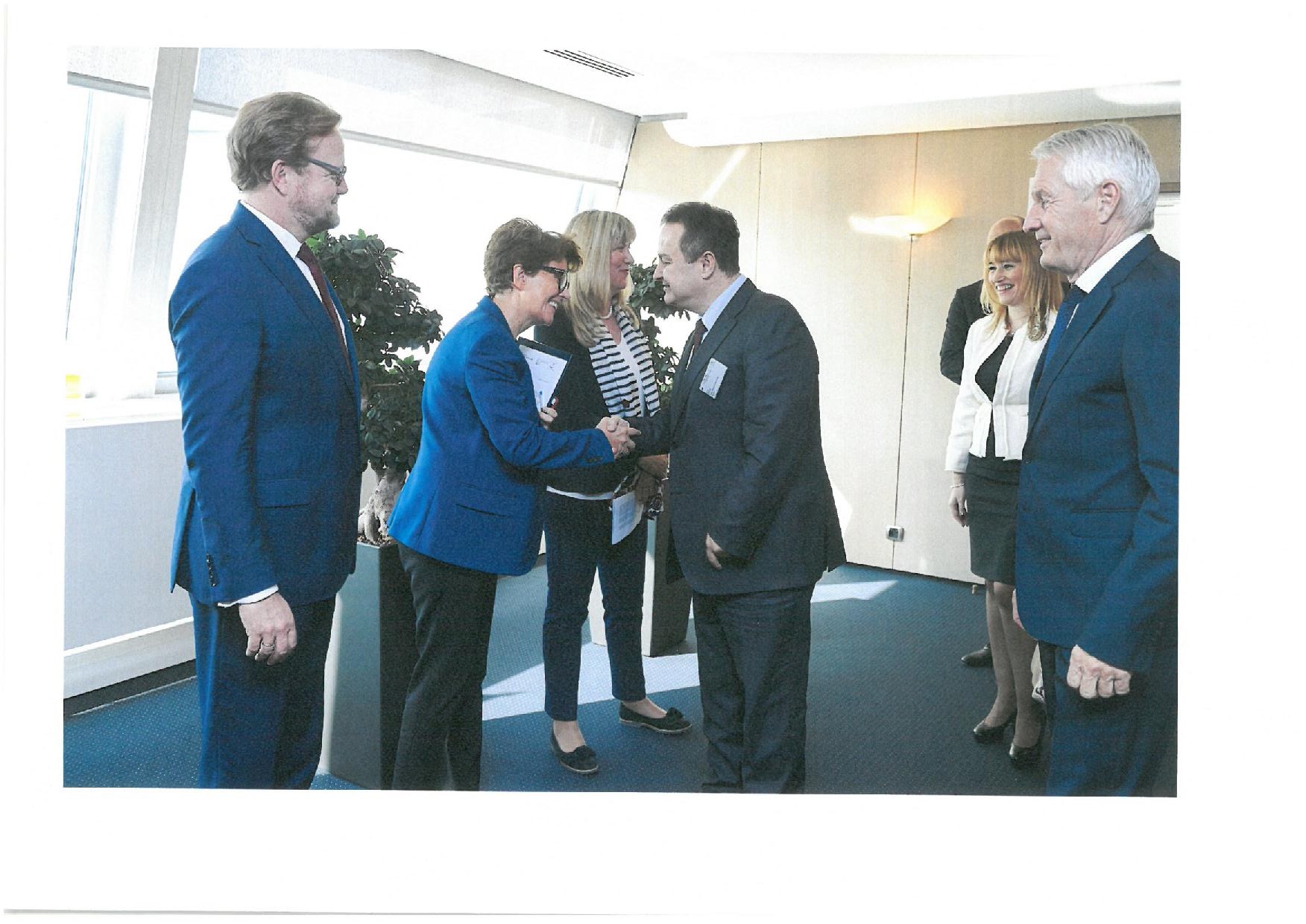
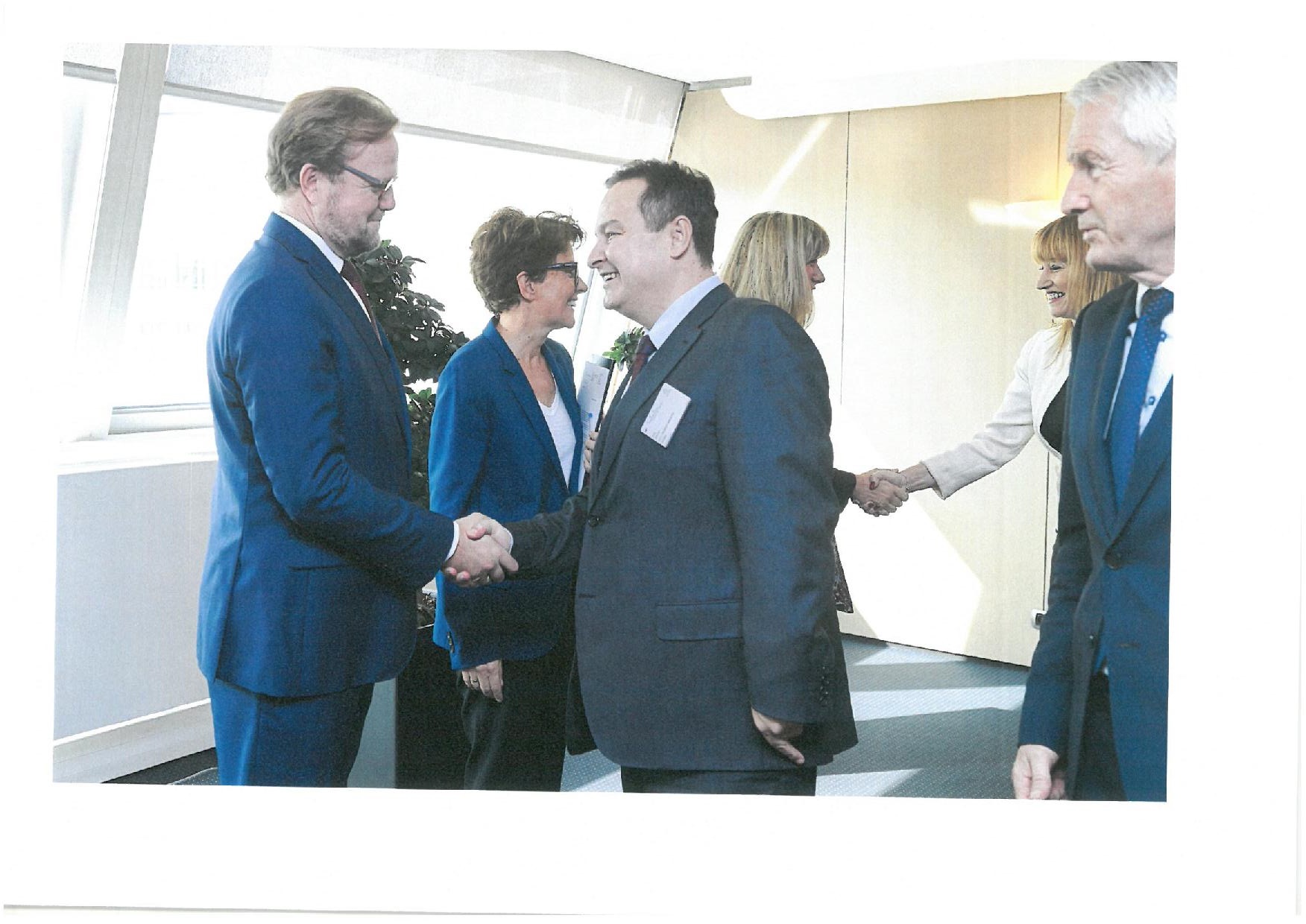
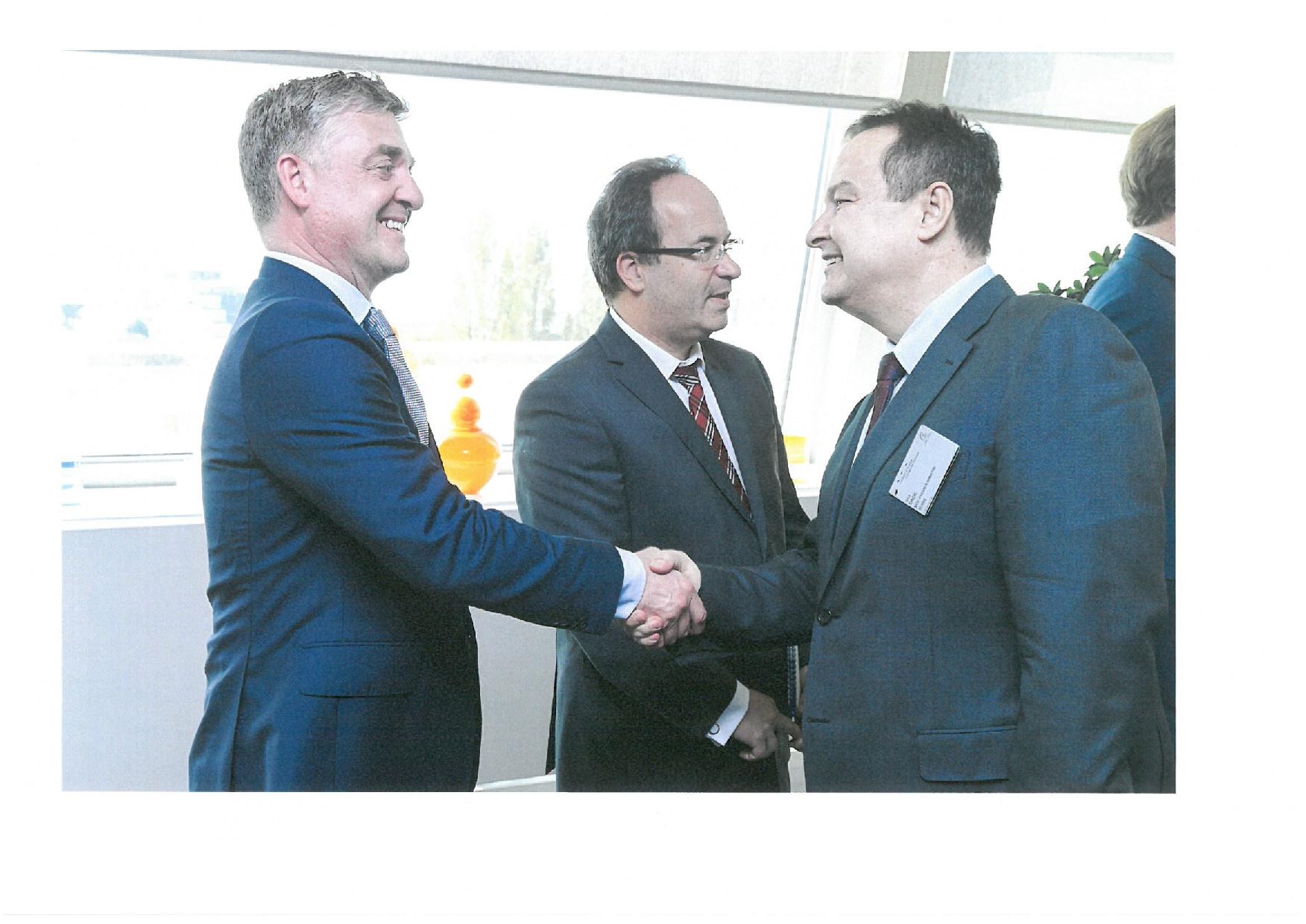
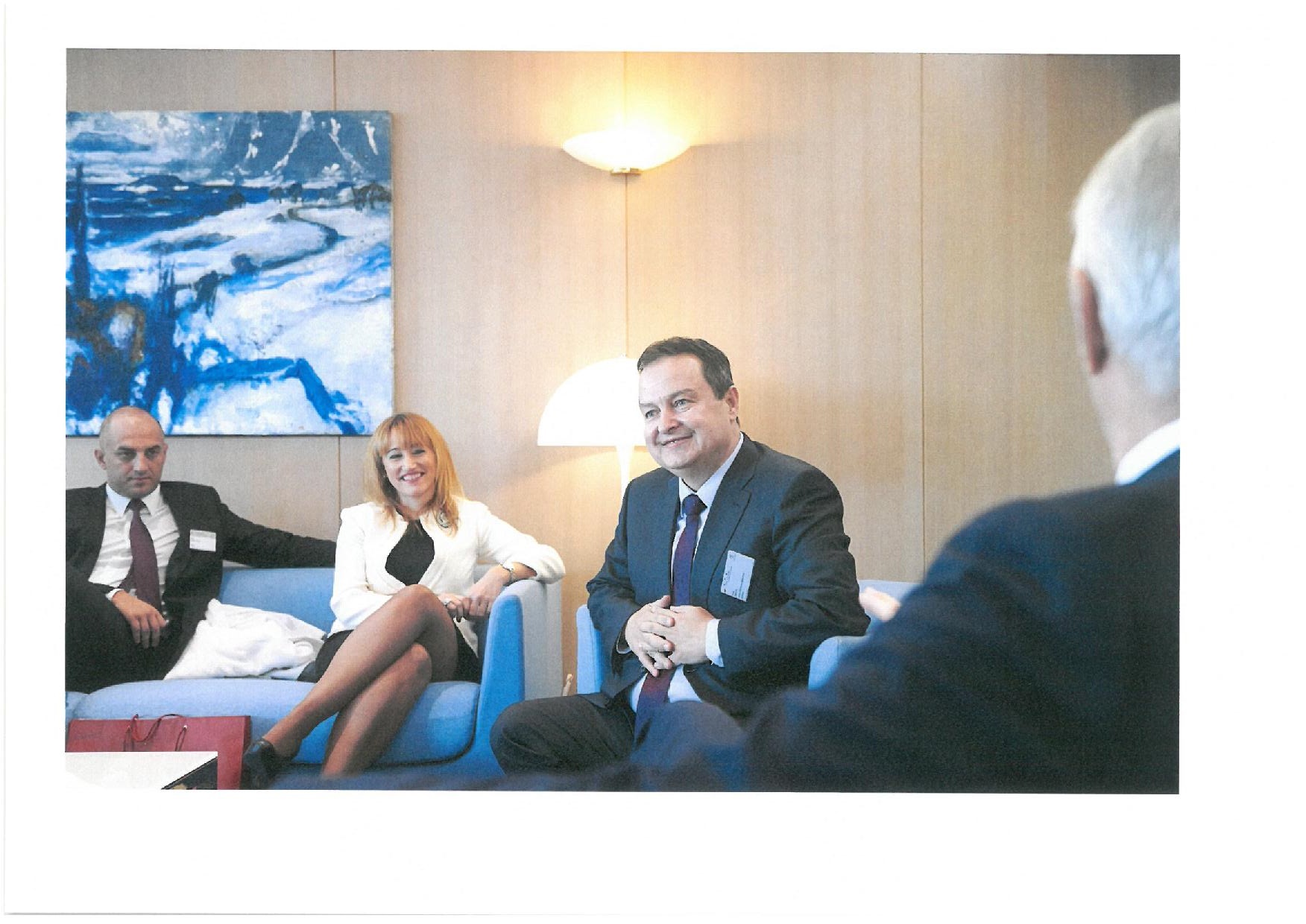
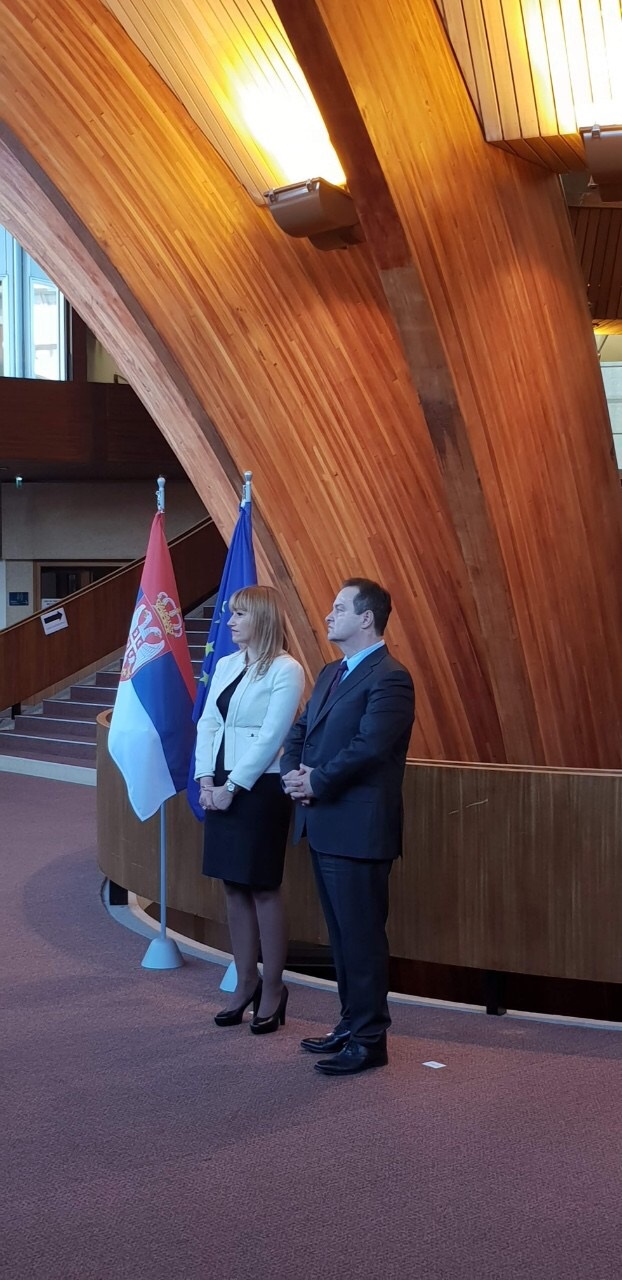
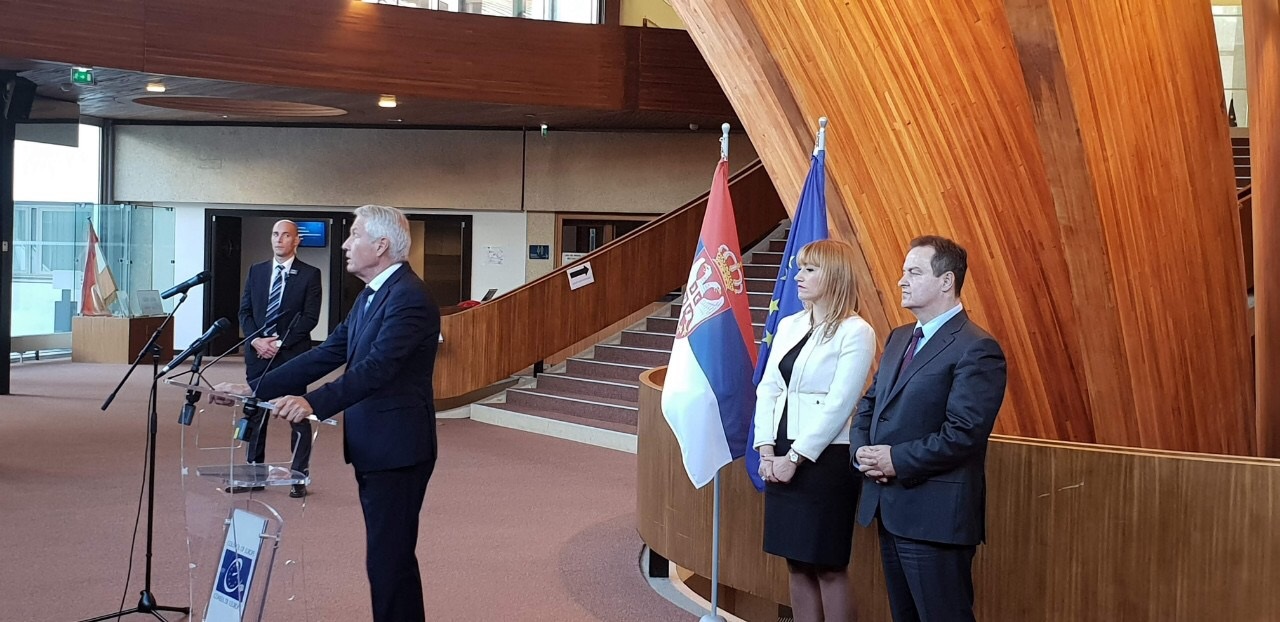
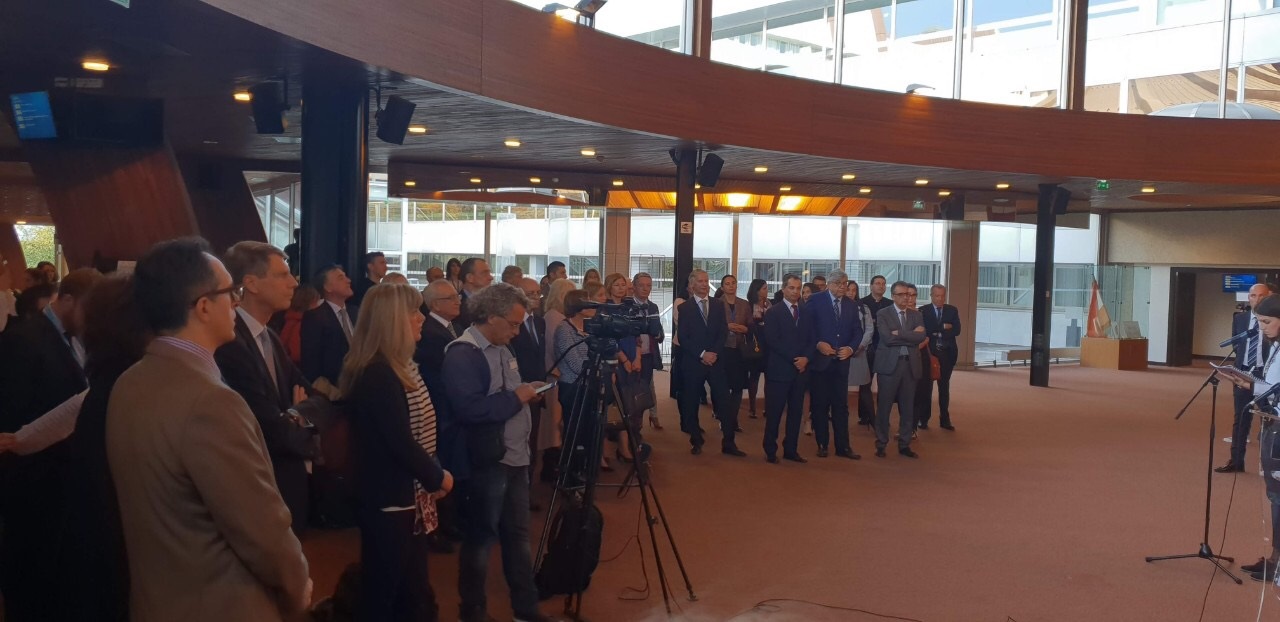
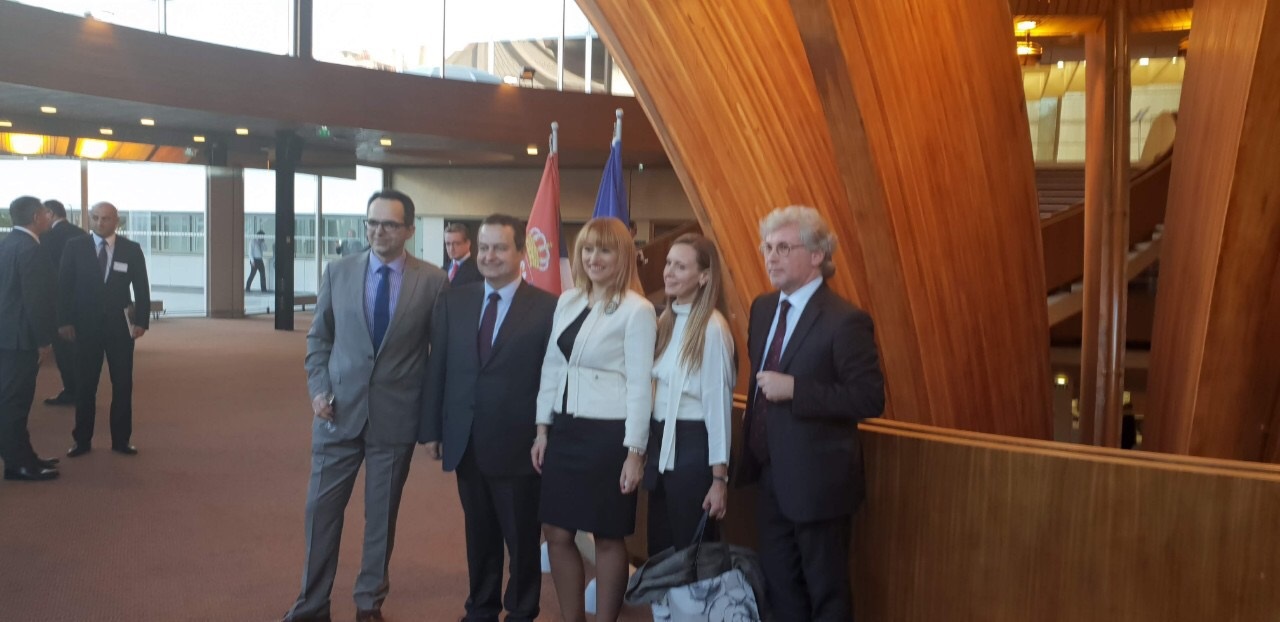
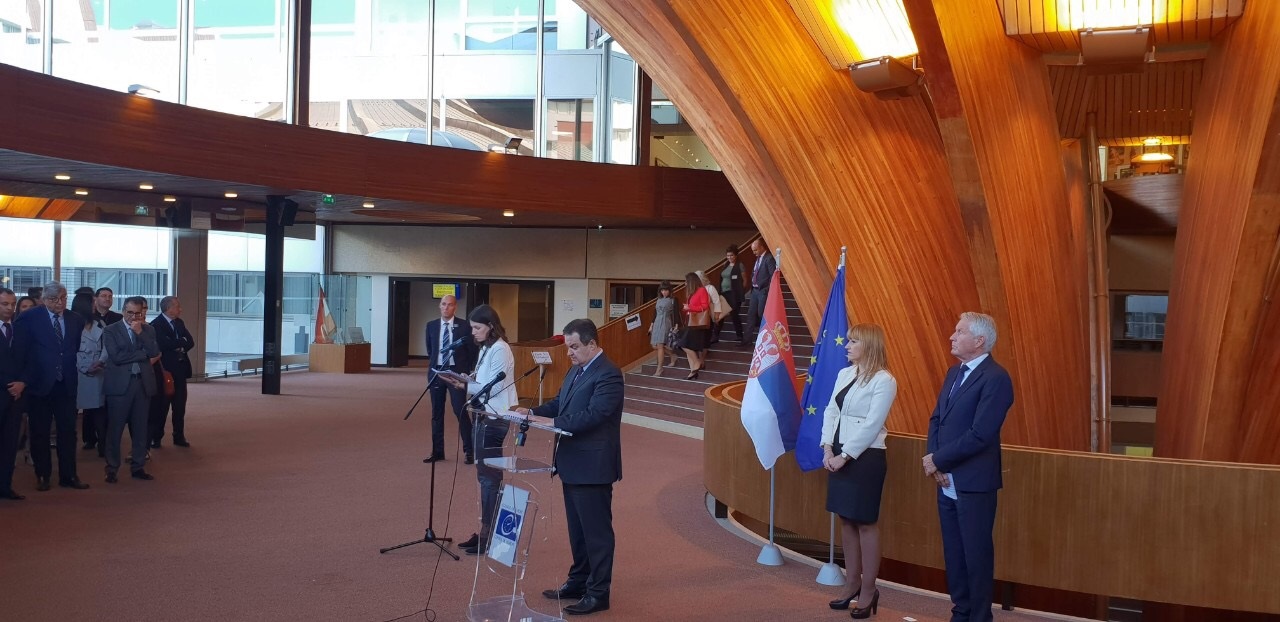
|
|
|
| First Deputy Prime Minister and Minister of Foreign Affairs Ivica Dacic on the 128th Session of the Committee of Ministers of the Council of Europe, in Elsinor |
|
The First Deputy Prime Minister and Minister of Foreign Affairs of the Republic of Serbia Ivica Dacic participated at the 128th Session of the Committee of Ministers of the Council of Europe, in Elsinor (Denmark), held from 17 to 18 May 2018.
While assessing the 128th Session in Elsinor to be an excellent occasion to exchange views on the main current issues and challenges in the field of democracy, rule of law and human rights in Europe and within the Organization, Minister Dacic expressed the support to the proposals of Secretary-General towards seeking solutions to the ongoing crisis in the Organization and joint consideration of the role and objectives of the Council of Europe, aimed at achieving greater unity in Europe. He underlined the importance of the Organization and welcomed the approach focused on strengthening the unity and coordination of the two major Council of Europe statutory bodies – the Committee of Ministers and the Parliamentary Assembly, and is committed to finding constructive, transparent and pragmatic solutions.
Furthermore, the Minister of Foreign Affairs expressed the satisfaction about the fact that Croatia had identified protection of persons belonging to national minorities among its Committee of Ministers Chairmanship as one of the priorities, bearing in mind the fact that Serbia attaches great importance to the promotion and protection of the rights of national minorities. At the same time, he underlined the expectation of Serbia that all rights of persons belonging to the Serbian national minority in neighbouring countries will be fully respected in line with the Council of Europe standards, including the right to use their own language and script.
In addition, he welcomed the adoption of the Copenhague Declaration because it will significantly contribute to the future functioning of the European Court of Human Rights.
Minister Dacic said that Serbia would remain devoted to the promotion of European standards in the field of the protection of human rights and highlighted the results of the cooperation between Serbia and Council of Europe bodies such as the Group of States against Corruption (GRECO) and the European Committee for the Prevention of Torture and Inhuman or Degrading Treatment or Punishment (CPT). He also addressed to the Committee of Ministers the expectations that the CPT would appropriately react to the brutal assault on the Director of the Office for Kosovo and Metohija Mr. Marko Djuric on 26th March, who was subjected to torture and humiliating treatment by the police in Kosovska Mitrovica.
In the end, he reminded that Serbia supported the continuation of the engagement of the Council of Europe in Kosovo and Metohija, in full compliance with the UNSC Resolution 1244 and status-neutral approach.
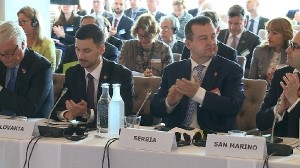
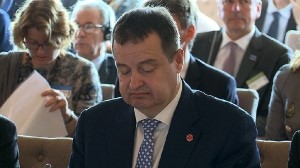
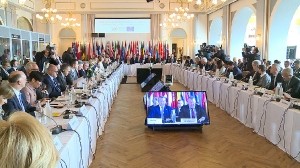
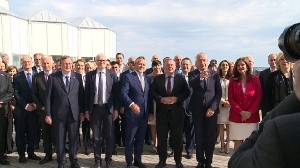 |
|
|
| Ambassador Djurovic in a courtesy visit to the Mayor of the City of Strasbourg |
|
The Permanent Representative of the Republic of Serbia to the Council of Europe Ambassador Aleksandra Djurovic paid a courtesy visit to the Mayor of the City of Strasbourg Mr. Ronald Ries, on 3 January 2018.
In the context of the developed bilateral relations between Serbia and France, and the political dialogue at high and the highest level, Ambassador Djurovic expressed the satisfaction with the support of France to the European Union accession process, and underlined the commitment of Serbia to the European integration. Following the same spirit, the Mayor of Strasbourg said that the excellent cooperation between two countries is developed as well at the local level, particularly in the field of economy, education and culture. Strasbourg is just one of the positive examples.
To the mutual satisfaction, it was accepted to launch the process of twinning of the cities of Novi Sad and Strasbourg.
Ambassadeur Djurovic en visite de courtoisie chez le Maire de la Ville de Strasbourg
Le 3 janvier 2018, la Représentante permanente de la République de Serbie auprès du Conseil de l’Europe Ambassadeur Aleksandra Djurovic était en visite de courtoisie chez le Maire de la Ville de Strasbourg Monsieur Ronald Ries.
Dans le contexte des relations bilatérales développées entre la Serbie et la France, et le dialogue politique mené à haut et le plus haut niveau, Ambassadeur Djurovic a exprimé la satisfaction du support de France à l’adhésion de Serbie à l’Union européenne, et elle a souligné l’engagement déterminé de Serbie à ce procès. Dans le même sens, le Maire de Strasbourg a dit que la coopération excellente entre deux pays est développée aussi au niveau local, surtout dans le champ de l’économie, éducation et culture, en accentuant l’exemple de la Ville de Strasbourg.
L’initiative de jumelage des villes de Novi Sad et de Strasbourg a été acceptée à la satisfaction mutuelle.
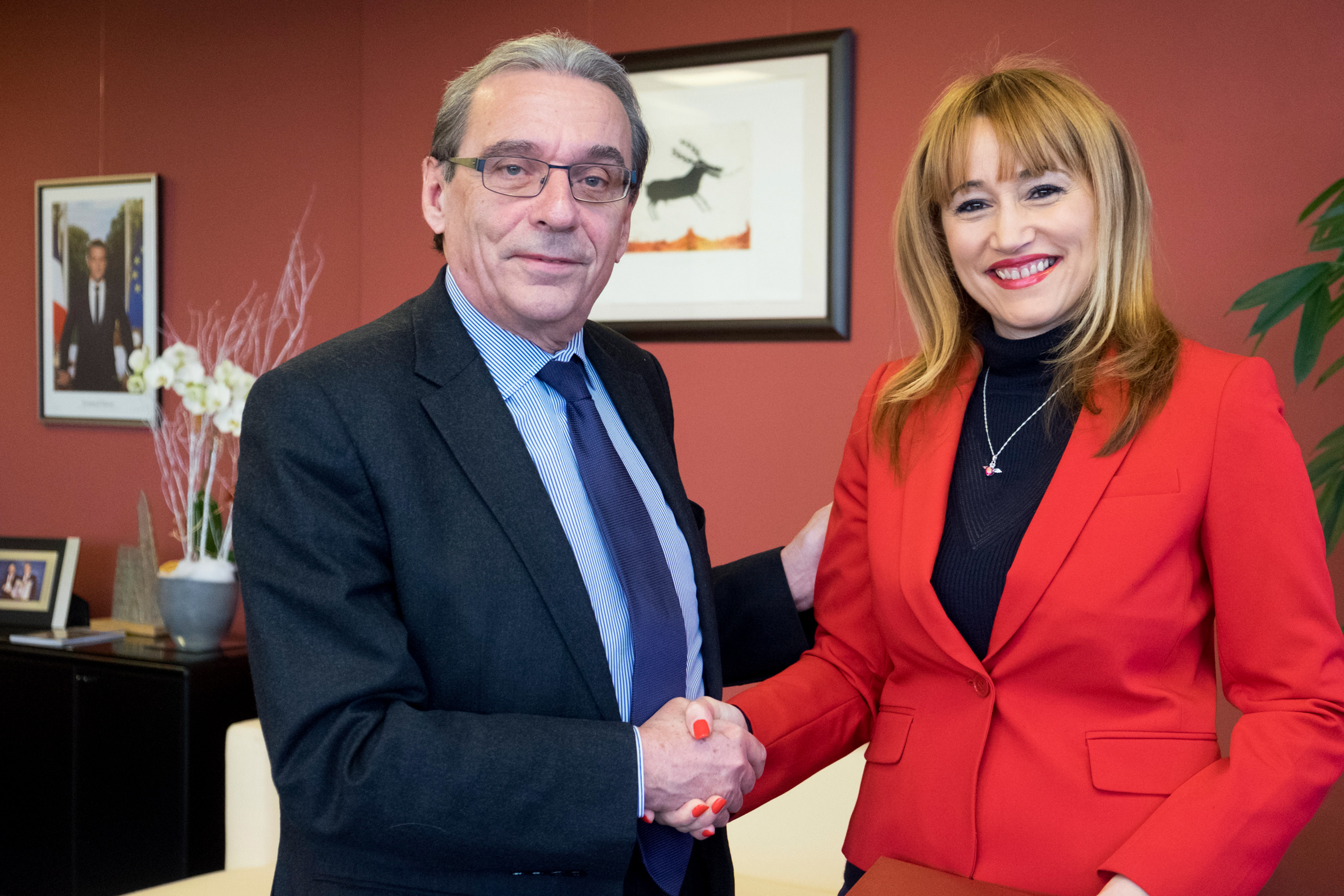
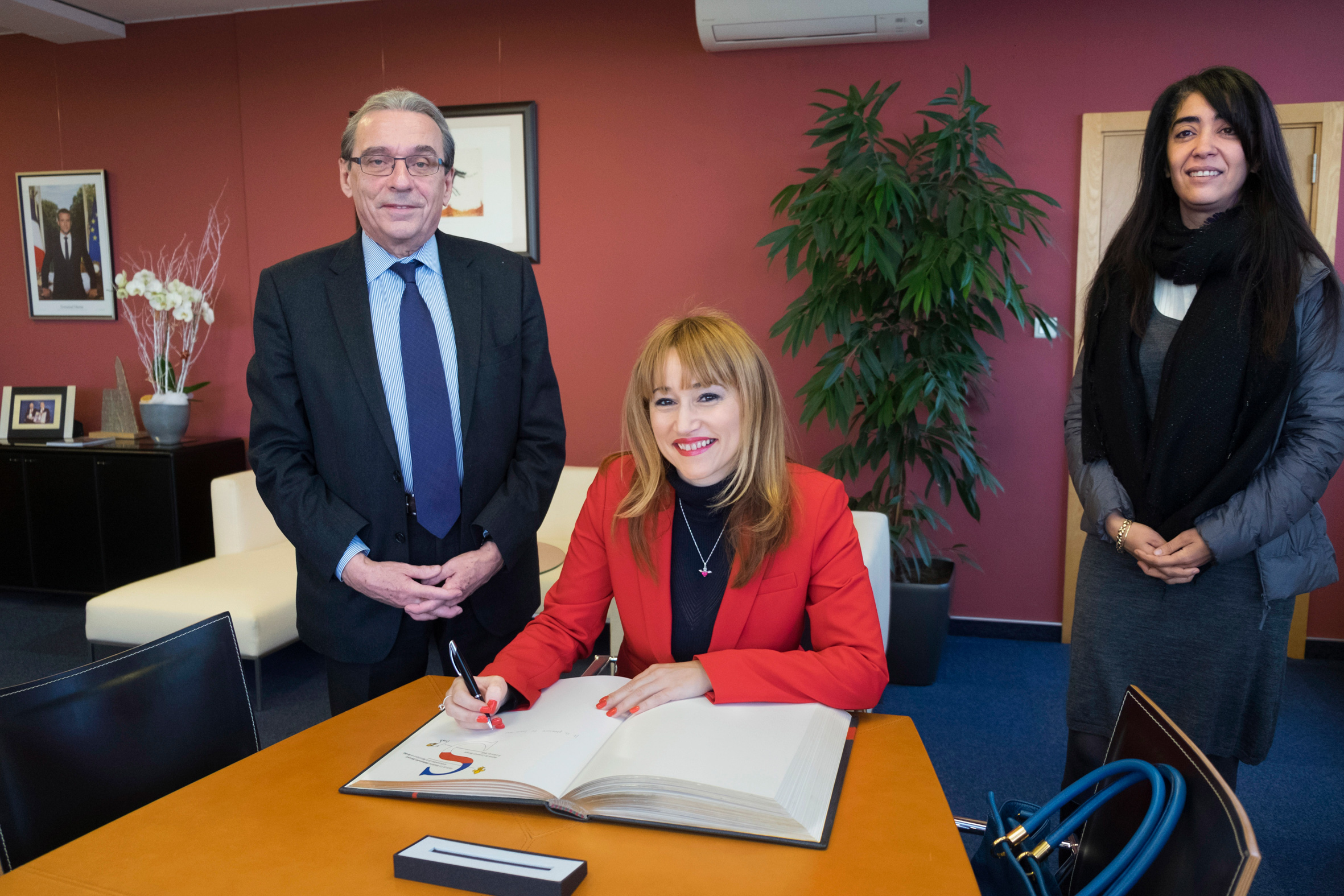
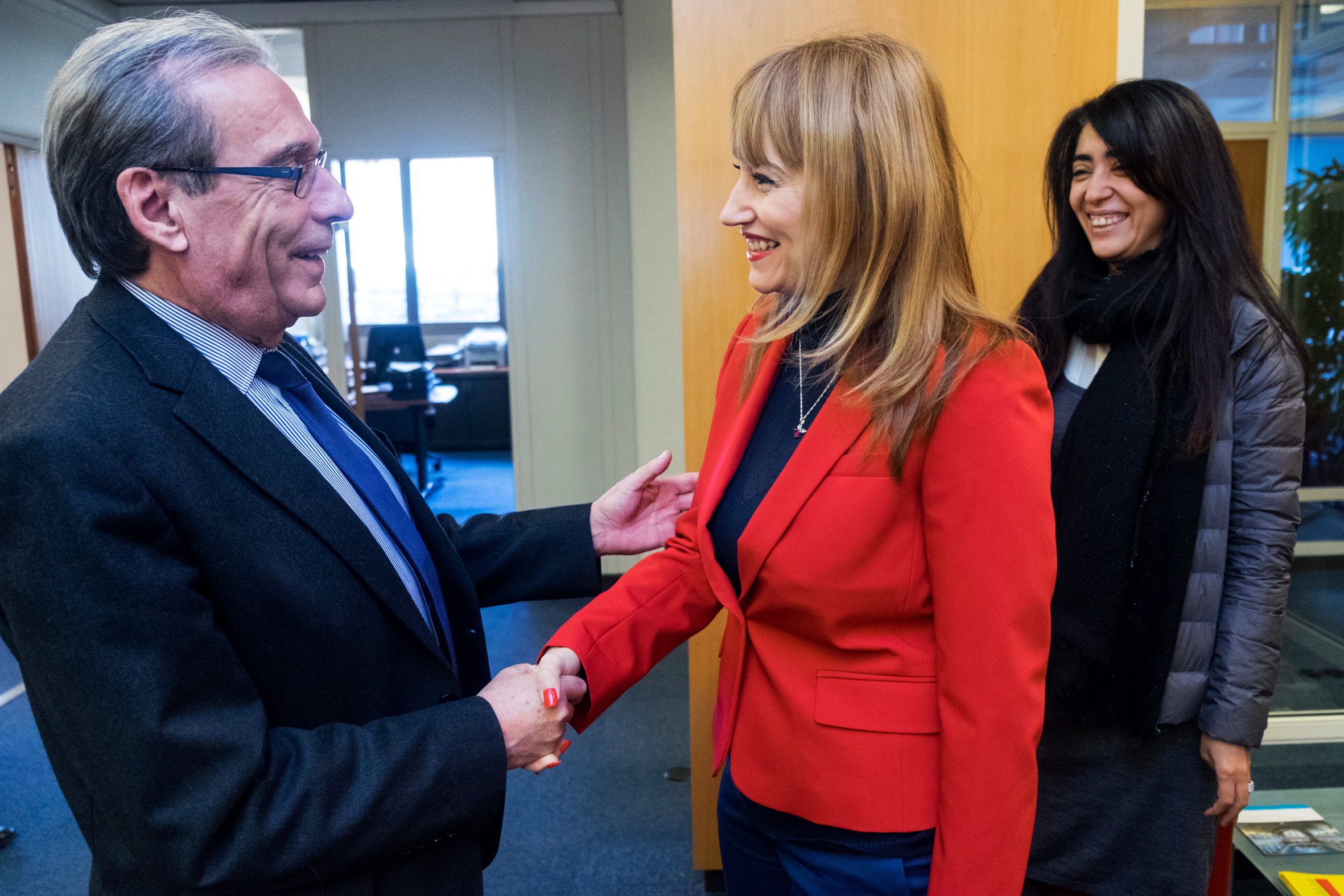
|
|
|
| Ambassador Djurovic presented her letters of credence to the Secretary-General of the Council of Europe Mr. Thorbjørn Jagland |
|
The newly-appointed permanent representative of the Republic of Serbia to the Council of Europe Ambassador Aleksandra Djurovic presented her letters of credence to the Secretary-General of the Council of Europe Mr. Thorbjørn Jagland, on 6 October 2017.
During the warm-hearted conversation, Ambassador Djurovic pointed up the commitments of Serbia to promote and to ensure the rule of law, democracy and respect of human rights. Furthermore, she accentuated the importance of successful cooperation between expert bodies of the Council of Europe and Serbian authorities, like the Venice Commission, while particularly taking into account that the results of the aforementioned cooperation are of great importance for the legal reforms in Serbia, foreseen by the European Union integration process.
The Secretary-General of the Council of Europe welcomed Ambassador Djurovic and expressed his hope that the cooperation between the Council of Europe and the Republic of Serbia, based on constructive dialogue and comprehension, will continue to be enhanced.
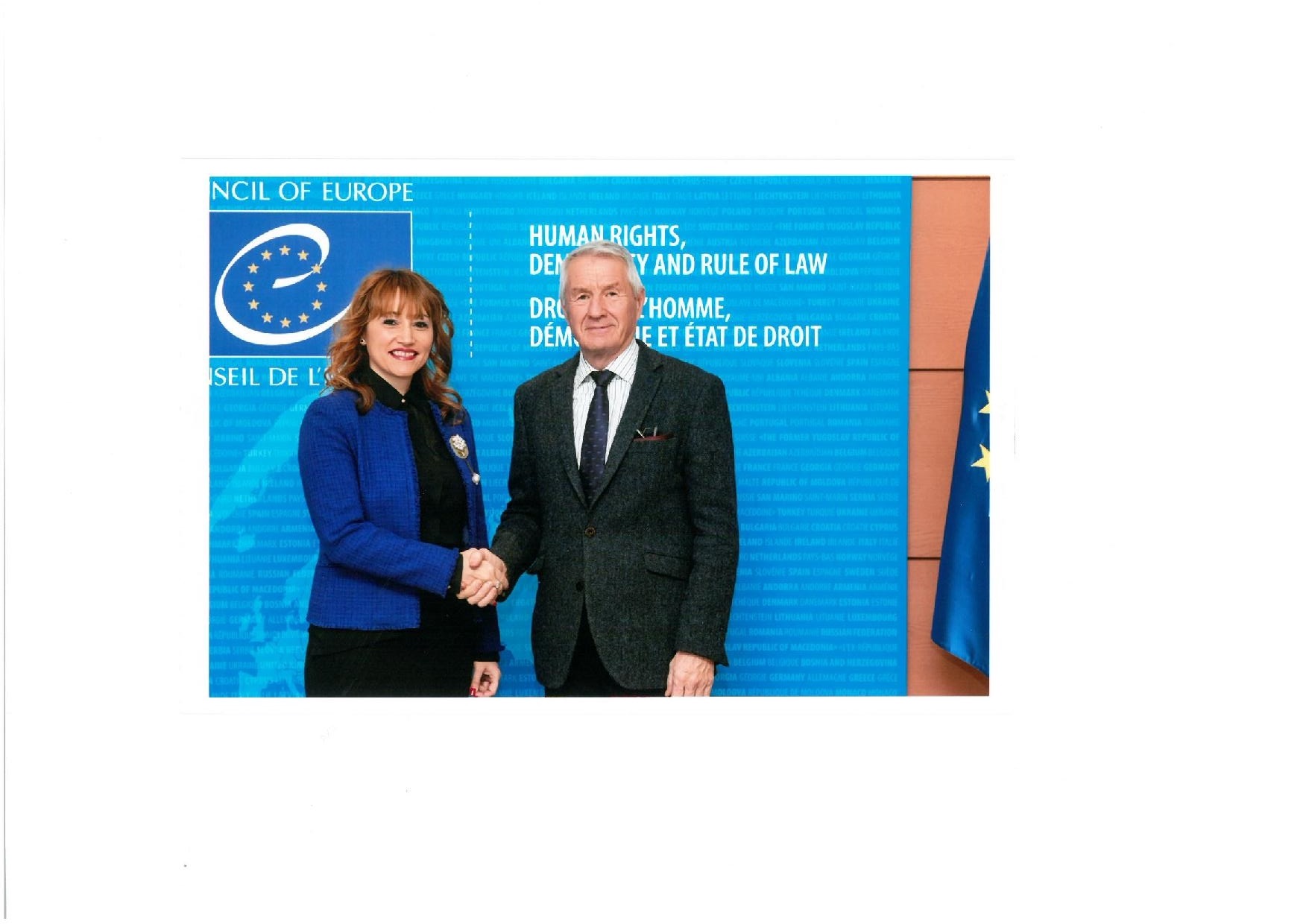 |
|
|
| PUBLIC INTERNATIONAL TWO-PHASE OPEN COMPETITION FOR THE DESIGN OF A CONCEPTUAL SOLUTION FOR THE ZORAN DJINDJIĆ MEMORIAL AT THE STUDENTS SQUARE IN BELGRADE |
|
BELGRADE CITY ADMINISTRATION
Secretariat for Culture
Belgrade, Trg republike 3
announces
PUBLIC INTERNATIONAL TWO-PHASE OPEN COMPETITION FOR THE DESIGN OF A CONCEPTUAL SOLUTION FOR THE ZORAN DJINDJIĆ MEMORIAL AT THE STUDENTS SQUARE IN BELGRADE
Competition organizer:
City of Belgrade - Belgrade City Administration, Secretariat for Culture.
Competition Purpose:
The aim of the competition i to obtain the best quality conceptual solution for the Zoran Djindjić Memorial at the Students Square in Belgrade.
The meaning of the artistic and program solution is to create a dignified memory of Zoran Djindjić, his life, work and social and historical changes he initiated in Serbia, as well as of his tragic death at the entrance to the building of the Government of the Republic of Serbia on March 12, 2003.
The space for which this memorial should be designed is a part of the reconstructed Students Square which is to be transformed into a pedestrian zone, according to the project design made by architect Boris Podrecca.
The memorial is expected to be designed in the tone of contemporary visual art.
Type of Competition:
As for the type, the competition is public.
As for the participants, the competition is open.
As for the form, competition has two phases.
As for the manner and design submission, the competition is anonymous.
Language of the competition for local participants shall be Serbian, and for foreign participiants English.
Documentation:
Competition participants may download the competition material free of charge at the web-portal of the City of Belgrade (http://www.beograd.rs) and Association of Belgrade Architects (http://www.dab.rs/) starting as of March 30, 2017.
Term:
The final deadline for submission of designs in the first phase of the competition is June 15, 2017, till 3 p.m., irrespective of the manner of design submission (direct submission or by mail).
Deadline for the completion of the jury work and publication of the first phase results i June 30, 2017. The final deadline for submission of the design in the second phase of the competition is September 28, 2017, till 3 p.m., irrespective of the manner of design submission (direct submission or by mail).
Deadline for the completion of the jury work and publication of the second phase of the competition is October 16, 2017.
Prize fund:
If minimum 10 designs are submitted by the end of the defined deadline, which meet the propositions of the competition for the second phase, 6 (six) designs will be selected.
Prizes at the total amount of the net prize fund of 19.000 euros shall be granted in the following order:
-First prize 8.000 euros,
-Second prize 5.000 euros,
-Third prize 3.000 euros,
and three equally valuable purchases of 1.000 euros each.
Prize purchase payments for designs whose authors are rezidents of the Republic of Serbia shall be paid in dinar equivalent.
The design is awarded the first prize shall be selected for realisation. |
|
|
| INVITATION TO TENDER |
|
INVITATION TO TENDER FOR THE PROVISION OF REAL ESTATE SALES SERVICES -THE SALE OF DIPLOMATIC REAL ESTATE IN NEW YORK (UNITED STATES OF AMERICA), TOKYO (JAPAN), BONN (GERMANY), AND BERNE (SWITZERLAND) |
|
|
| Non-paper with the argumentation why "Kosovo" is ineligible for membership in UNESCO |
|
Non-paper with the argumentation why "Kosovo" is ineligible for membership in UNESCO - download here |
|
|
|
|
|